lfis Divine Grace A.C. Bhaktivedanta
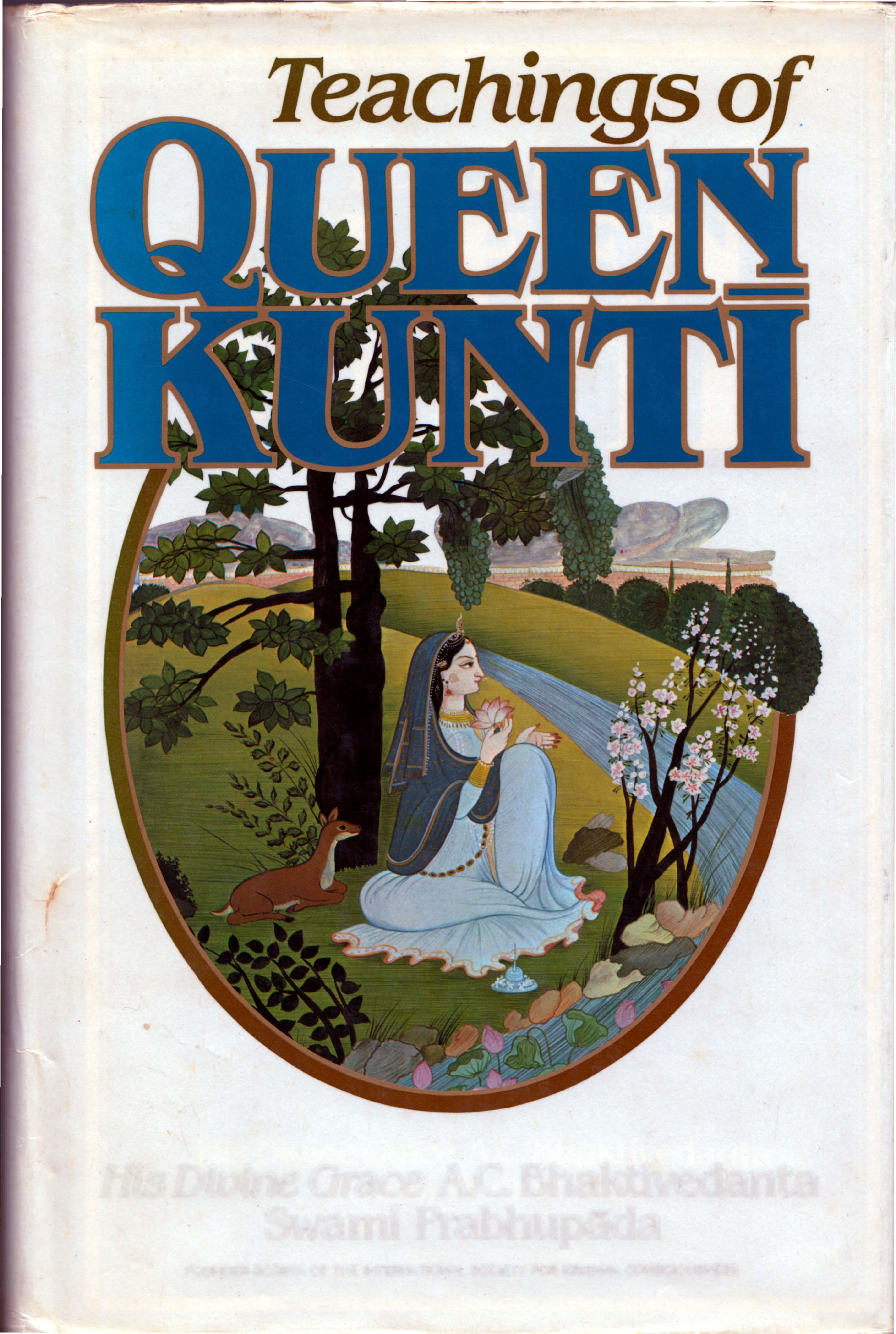
Swami Prabhupada FOUNDER-ACARYA OF THE INTERNATIONAL SOCIETY FOR KRISHNA CONSCIOUSNESS
THE TRAGIC and heroic figure of Queen Kunti emerges &om an explosive era in the history of ancient India. As the wife of King Pal)QU and the mother of five illustrious sons (the Pal)<,lavas), she was a central figure in a complex political drama that fifty centuries ago culminated in the devastating Kuruk�etra War.
At the conclusion of the war, Queen Kunti approaches Lord Knl)a as He prepares to depart &om the scene of battle. Although Kunti is Lord Knl)a's aunt (He incarnated as her brother Vasudeva's son), she perfectly understands His exalted and divine identity as the Supreme Personality of Godhead. She knows full well that He descended from His abode in the spiritual world to rid the earth of demoniac military forces and reestablish peace and righteousness. Thus the prayers she offers Him on this occasion are not the conventional pious solicitations. Rather, they are philosophical reSections, devotional illuminations, even mystical exultations. As such they have been recorded and immortalized in the Srimad-Bhagavatam, India's greatest philosophical and spiritual classic.
Queen Kunti's prayers-the simple and illuminating outpourings of the soul of a great and saintly woman devotee-reveal both the deepest transcendental emotions of the heart and the most profound philosophical and theological penetrations of the intellect. Her words have been recited, chanted, and sung by sages and philosophers in India for thousands of years.
Teachings of Queen Kunti consists of Kunti's celebrated prayers as recorded in the SrimadBhagavatam together with illuminating commentary by His Divine Grace A. C. Bhaktivedanta Swami Prabhupada-Founder-Acarya of the International Society for Krishna Consciousness, the most renowned Vedic scholar and religious leader of our time and author of more than seventy volumes of translation and commentary on India's ancient Vedic literature.
(continued on backflap)
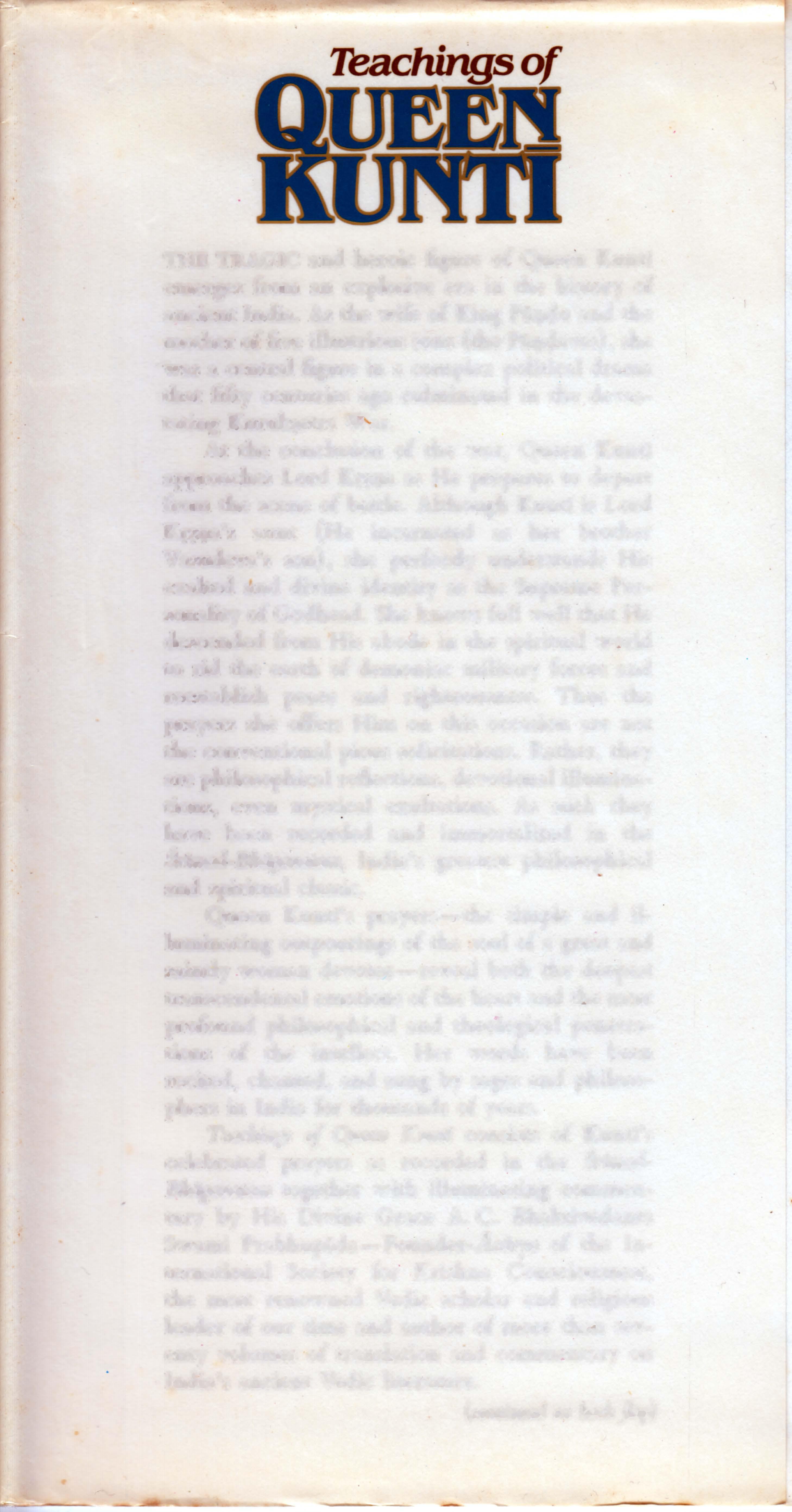







BOOKS by His Divine Grace
A.

C. Bhaktivedanta Swami Prabhupada
Bhagavad-gita As It Is Srimad-Bhagavatam, Cantos 1-10 (50 Vols.)
Sri Caitanya-caritalll{ta (17 Vols.)
Teachings of Lord Caitanya
The Nectar of Devotion
The Nectar oflnstruction
Sri lsopani�ad
Easy Journey to OtherPlanets
Kr�t;ta Consciousness: The Topmost Yoga System
Kr�t;ta, the SupremePersonality of Godhead (3 Vols.)
Perfect Questions,Perfect Answers
Dialectical Spiritualism-A Vedic View ofWesternPhilosophy
Teachings of Lord Kapila, the Son of DevahUti
Transcendental Teachings ofPrahlad Maharaja
Teachings of Queen Kuntl
Kr�t;ta, the Reservoir ofPleasure
The Science of Self-Realization
Life Comes From Life
ThePerfection of Yoga
Beyond Birth and Death
On theWay to Kr�t;ta Geetar-gan (Bengali)
Vairagya-vidya (Bengali)
Buddhi-yoga (Bengali)
Bhakti-ratna-boli (Bengali)
Raja-vidya: The King of Knowledge
Elevation to Kr�t;ta Consciousness




Kr�t;ta Consciousness: The Matchless Gift
Back to Godhead Magazine (Founder)
A complete catalog is available upon request.
Bhaktivedanta Book Trust
3764Watseka Avenue
Los Angeles, California 90034

His Divine Grace A.C. Bhaktivedanta Swami Prabhupada





THE BHAKTIVEDANTA BOOK TRUST Los Angeles • London • Paris • Frankfurt • Bombay
FOUNDER-ACARYA OF THE INTERNATIONAL SOCIETY FOR KRISHNA CONSCIOUSNESS
Readers interested inthe subject matter of this book are invited by the International Society for Krishna Consciousness to correspond with its Secretary.
International Society for Krishna Consciousness
3764 Watseka Avenue
Los Angeles, California 90034
First Printing, 1978: 57 ,300 copies
e> 1978 Bhaktivedanta Book Trust
All Rights Reserved
Printed in the United States of America
Library of Congress Cataloging in Publication Data


Bhaktivedanta Swami, A.C., 1896-1977.
Teachings of Queen Kuntl.
Bibliography: p.
Includes Index.
BL1132.K8845 294.5'43


ISBN 0:89213-102-0


78-20437







Introduction vii Contents 1. The Original Person 1 2. Beyond the Senses 3 3. The Most Intelligent Woman 5 4. Approaching Kr�t;ta, the All-Pervading Truth 11 5. The Vision of Lotuses 21 6. The Master of the Senses 27 7. Dangerous Encounters 35 8. Let There Be Calamities 43 9. Decreasing the Fever of Illusion 53 10. The Property of the Impoverished 61 11. The Touch of Superior Energy 71 12. Bewildering Pastimes 79 13. The Vital Force of the Universe 87 14. Lord Kr�t:ta's Wonderful Activities 97 15. Beyond Birth and Death 105 16. Returning to Our Natural Consciousness 113 17. Lightening the Burden of the World 121 18. Liberation from Ignorance and Suffering 129 19. Crossing Beyond Illusion's Currents 139 20. Full Surrender 147 21. What Is Our Actual Value? 153 22. Beauty in Kr�t:ta's Presence 161 23. Natural Prosperity 169 24. Cutting Off Ties of Affection 177 25. Unalloyed Devotion 187 26. Enchantment by Kr�t:ta's Glories 197 Appendixes The Author 207 Refer�nces 209 Glossary 211 Guide to Sanskrit Pronunciation 215 Index to Sanskrit Verses 217 Synonyms for Sanskrit Verses 219 General Index 225
His Divine Grace
Founder-Actirya of the International Society for Krishna Consciousness
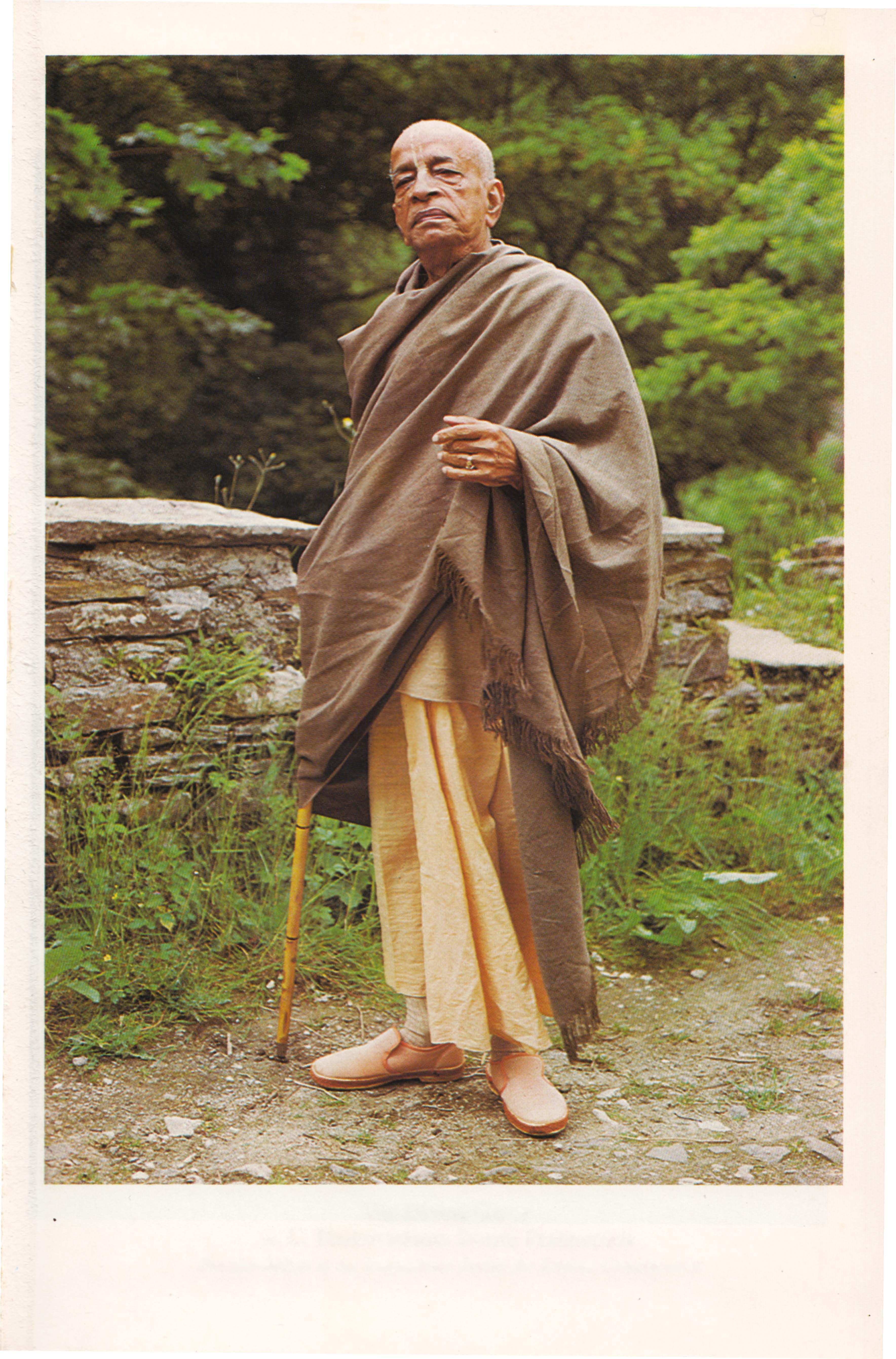 A. C. Bhaktivedanta Swami Prabhupada
A. C. Bhaktivedanta Swami Prabhupada
PLATE ONE


At the end of the eighteenth day of the Battle of Kuru�tra, all the great heroes of the Kuru dynasty and millions of warriors lay dead on the battlefield. Only the five sons of PaJ:.lQU and a small handful of others remained to console the relatives of the slain. Prince Duryodhana's ambitions had been smashed, yet his few surviving followers wished to find him some last revenge. Still, only Asvatthama was rash enough to carry out the scheme to mUrder the PaJ:.lQavas' five children in their sleep arid thus finish the line of succession. He had expected that this would please his master, but Duryodhana was appalled to hear of the atrocity and died in lamentation. Arrested and dragged to the Pal,lQavas' camp like a bound animal, Asvatthama was let free only by the astounding compassion of Draupadi, the slaughtered boys' mother, who pleaded for his life. But the shameless Asvatthama made one more attempt to kill the last heir of the Pal,lQavas, their unborn grandson in the womb of Uttara, by hurling the supreme brahmastra weapon. When she saw the missile flying straight at her, Uttara immediately ran to the shelter of Lord Kr�J:.la, who was just about to depart for His capital city. Kr�J:.la protected the PaJ:.lQavas and their mother Kunti from imminent death by stopping the weapon's uncontrollable heat and radiation with His own Sudarsana disc. Having delivered the PaJ:.lQavas from this last calamity, and seeing that all His plans were fulfilled, Lord Kr�J:.la was again preparing to leave. For years Duryodhana had tormented Queen Kunti's family, but Kr�J:.la had protected them at every turn-and now He was going away. Kunti was overwhelmed, and she approached Kr�J:.la to offer Him prayers from the core of her heart. (p. 1)


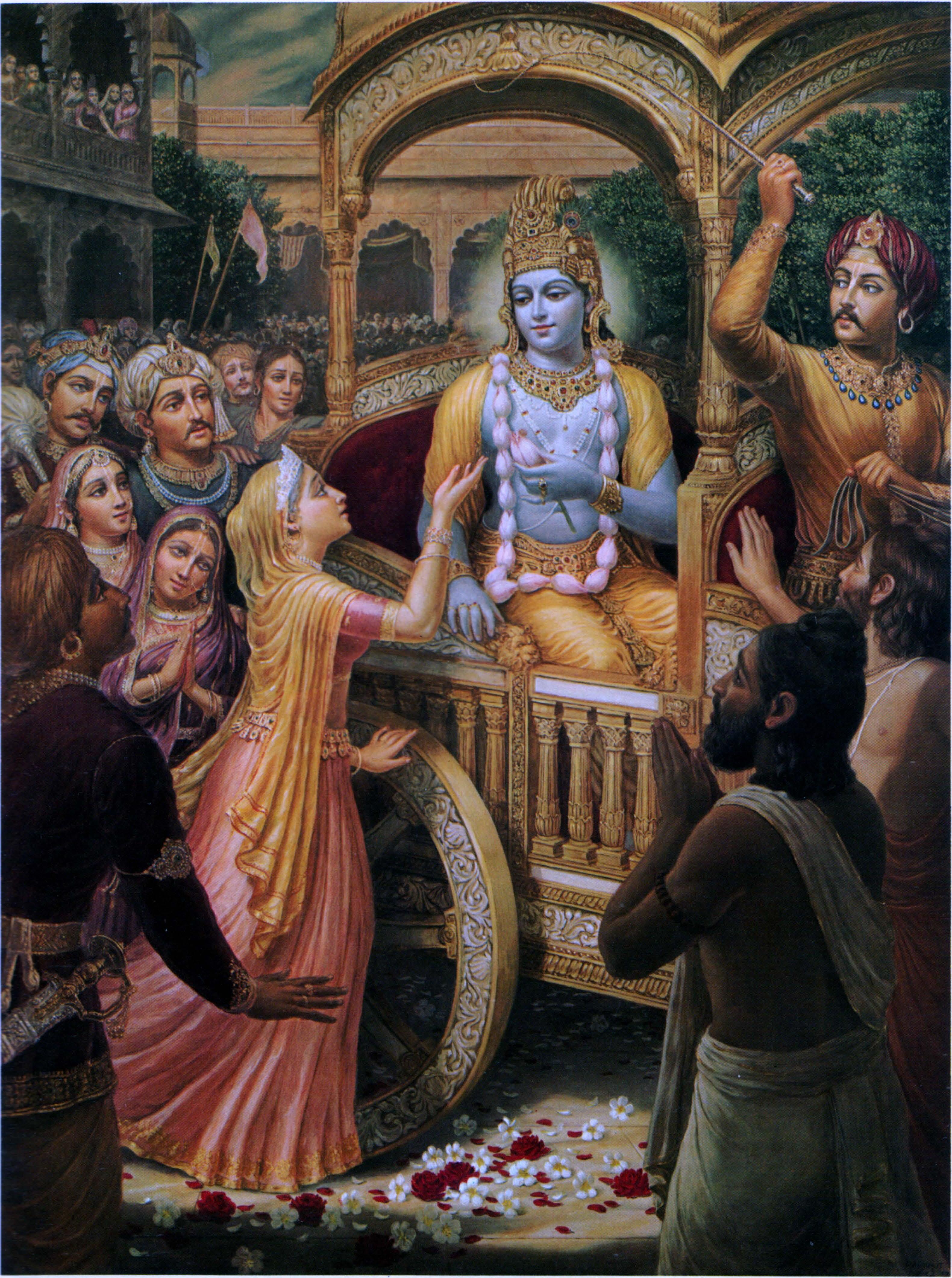
PLATE TWO
As Queen Kunti begins her prayers, she immediately reveals her knowledge of Lord Kr�Q.a's exalted, divine nature: "0 Kr�Q.a, I offer my obeisances unto You because You are the original personality and are unaffected by the qualities of the material world. You are existing both within and without everything, yet You are invisible to all." In His original form as a young cowherd boy, Lord Kr�Q.a always resides in Goloka Vrndavana, the highest of the innumerable planets in the spiritual realm. All ofthese planets are eternal, self-illuminated, and (except for Goloka Vrndavana itself) presided over by one of Kr�Qa's Vi�QU expansions. For the purpose of creating and maintaining the material universes, Kr�Qa expands into a different kind of Vi�Qu form known as Maha-Vi�Qu. Maha-Vi�QU sleeps within the Causal Ocean, and from His transcendental body myriad universes emanate like so many bubbles. Within each of those universal globes, Maha-Vi�QU expands Himself as Garbhodakasayi Vi�Qu, from whose navel a lotus flower grows. Upon that lotus appears Lord Brahma, the secondary creator in each universe. The final Vi�QU expansion is the all-pervading K�Irodakasayi Vi�Q.u, or Supersoul, who resides within every atom and within the heart of all creatures. In this way Kf�Qa is indeed "within and without everything," as Queen Kunti declares. (p. 1)


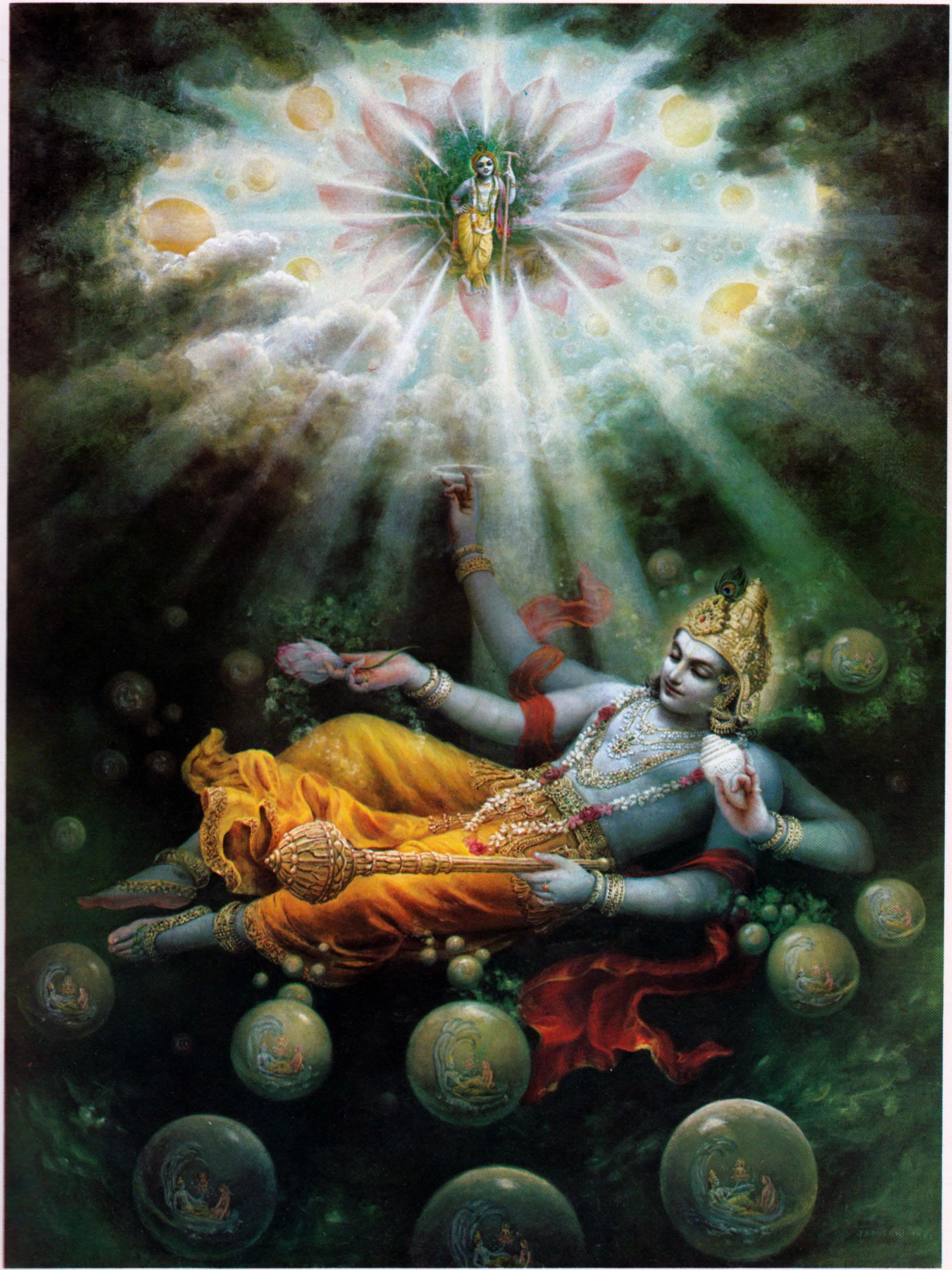
PLATE THREE



Foolish Duryodhana, maddened by greed for the throne, tried in many ways to destroy his imagined rivals the Pal)<;lavas. Queen Kunti recalls how he had tried to entice her sons to meet their death on the pretext of a friendly invitation for them to visit the new provincial palace at Varal)avata. Duryodhana's wicked friends had intentionally constructed this building out of combustible shellac and were planning to burn it down in the middle of the night with their enemies inside. But the saintly uncle of Duryodhana, Mahatma Vidura, gave forewarning to the Pal)<;lavas and Kunti thatthey were likely to meet with danger there. Heeding his advice they excavated a hidden tunnel beneath the palace. On the night secretly designated for the massacre, he sent them the following cryptic message: "Fire can burn a man's body, but not his eternal soul." Thus advised, the brothers and mother managed to escape in time. They thereupon went into hiding to avoid further attacks from their envious cousin. (p. 36)


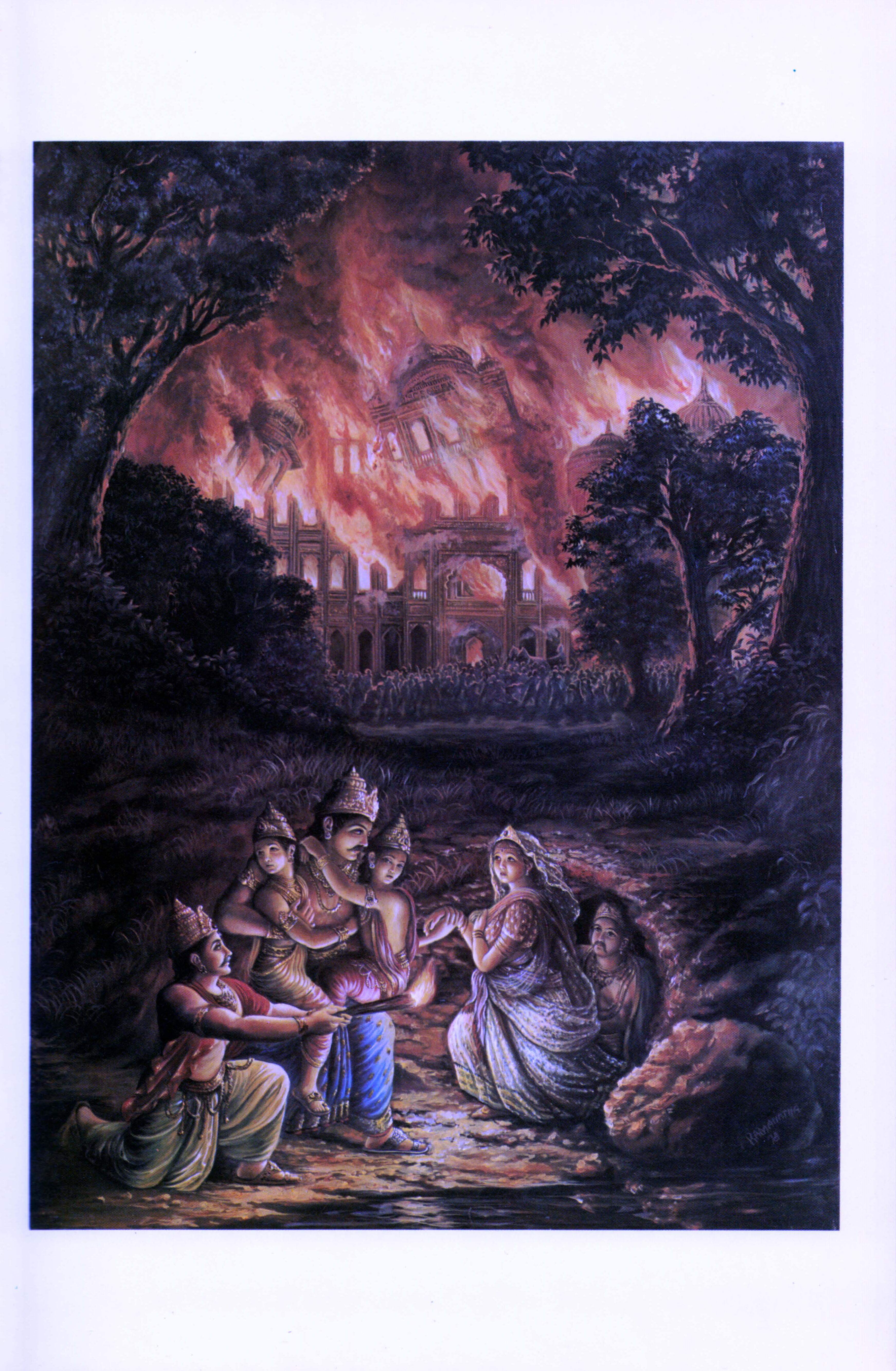
PLATE FOUR
Here Queen Kunti recalls an atrocity that the Kurus (Dhrtara�tra's sons) had perpetrated upon her beloved daughter-in-law Princess DraupadL Once the PaQ.c;lavas (Kunti's sons) were invited to a chess match in the royal assembly of the Kurus. In the heat of the match, the PaQ.c;lavas made the mistake of placing their wife Draupadi as a bet. "Now if you lose," the Kurus told the PaQ.c;lavas, "Draupadi will no longer be your wife." When the Kurus cheated and won the game, two leading Kurus named KarQ.a and DuQ.sasana immediately grabbed DraupadL "Now you no longer belong to your husbands," they told her. "You are our property, and we can deal with you as we like. So now let us see your naked beauty." As DuQ.sasana began to forcibly unwrap Draupadi's siiri, she tried to hold on to it. But what could she do? She was a helpless woman, and DuQ.sasana was a powerful warrior. So she wept in despair and prayed to Kr�Q.a, "0 Lord, please save my honor" -but she was still trying to save herself by holding on to her siiri. Then, realizing how impossible it was to save herself in this way, she let go and raised her arms in utter surrender: "My dear Lord Kr�Q.a, if You like You can save meor if You like You can let me be disgraced. The decision is in Your hands." Then the Lord responded to her prayers and supplied unlimited cloth for the siiri. DuQ.sasana could not come to the end of it, and finally, with heaps of cloth stacked in the room, he became exhausted and realized that he would never see her naked. (pp. 37-38)



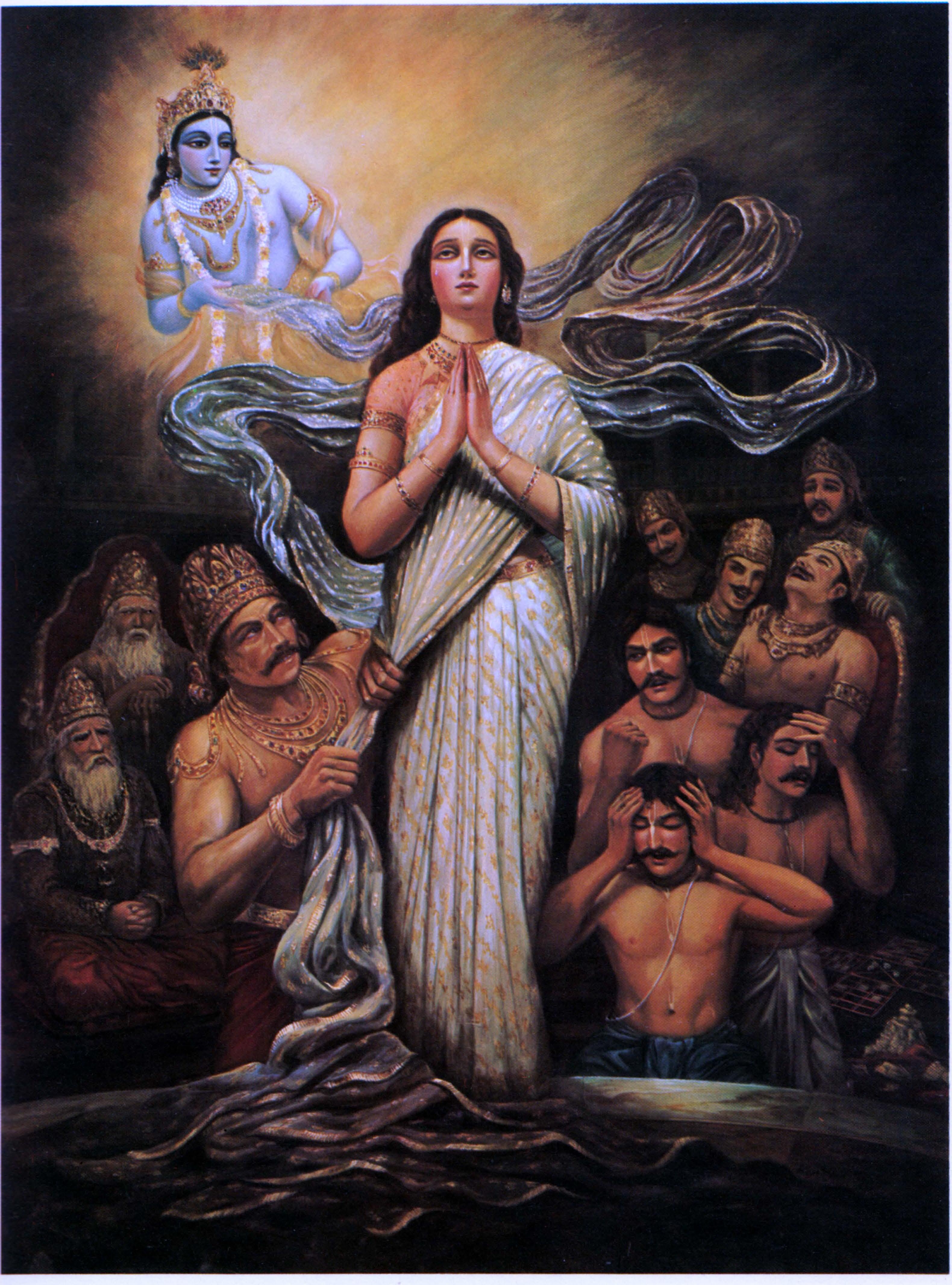
PLATE FIVE
Queen Kunti knew that in reality Kp�I).a was neither her nephew nor an ordinary family member of her paternal house. She knew perfectly well that He was the primeval Lord, who lives in everyone's heart as the Supersoul. Thus she addressed Him as "the supreme controller, without beginning or end, the all-pervasive one." Here we see how Lord Kr�Qa's all-pervasive Supersoul feature is expanded in the hearts of all creatures. In accordance with each living entity's state of consciousness, Lord Kr�Qa creates many kinds of bodies-bodies of human beings, animals, birds, plants, insects, and so on. And in the heart of all these innumerable bodily forms, the Lord resides with the living being as the Supersoul. The Supersoul in every body gives intelligence to the individual soul according to his capacity for understanding, and He manifests Himself to the individual soul according to his degree of austerity, penance, and spiritual realization. According to good or bad karma, the Supersoul directs the wanderings of all living entities, who are seated within the bodily machine made of the material energy. One who sees the Supersoul accompanying the individual soul in all bodies, and who understands that neither the soul nor the Supersoul is ever destroyed, actually sees, and he therefore gradually advances toward spiritual perfection. (p. 71)


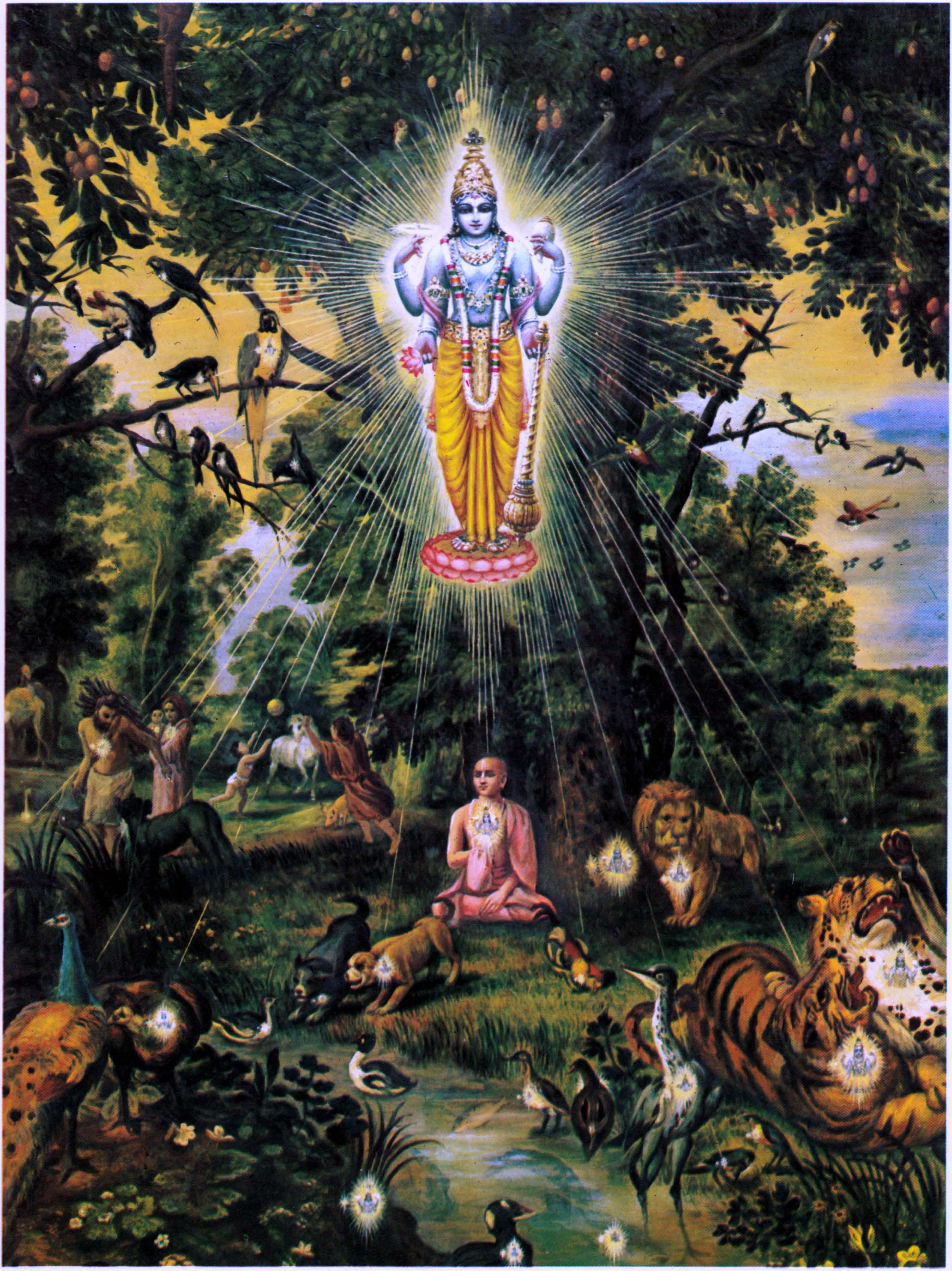
PLATE SIX
"0 Lord," Queen Kunti prayed, "no one can understand Your transcendental pastimes, which appear to be human and so are misleading."
Kunti knew that although Kr�Q.a sometimes plays like an ordinary human being, in fact He is not ordinary, and whenever necessary He displays the powers of God. When sixteen thousand princesses were kidnapped by the demon Bhaumasura, they prayed to Kr�Q.a for deliverance, and in response the Lord went to the demon's fortified city to do battle with him. After smashing the fortifications Kr�Q.a encountered and defeated a fierce five-headed demon named Mura. Finally, the Lord beheaded Bhaumasura and released the frightened princesses. But according to the strict Vedic system, if an unmarried woman leaves her home even for one night, no one will marry her. Therefore when Kr�Q.a told the princesses, "Now you can safely return to your fathers' homes," they declined.
"0 Lord," they replied, "if we return to our fathers' homes, what will be our fate? No one will marry us."
"Then what do you want?" Kr�Q.a asked.
"We want You to become our husband."
And out of His boundless mercy, Kr�Q.a immediately accepted them. (pp. 79-85)







PLATE SEVEN
Queen Kunti was somewhat bewildered by Kr�Q.a's humanlike pastimes, especially His childhood pastimes in Vrndavana. For example, the cowherd boys of Vrndavana were able to play with Him just as if He were an ordinary human child. Of course, neither they nor Kr�Q.a were ordinary boys. The great sages who took birth as Kr�Q.a's friends had spent many, many previous lives performing severe penances and austerities. Thus when Kr�Q.a appeared in Vrndavana, India, some fifty centuries ago they were awarded the greatest possible benediction-the opportunity to play with the Supreme Personality of Godhead on an equal level. By Kr�Q.a's special mercy they did not know that He was the Supreme Personality of Godhead� they simply loved Kr�Q.a, and this was true of everyone in Vrndavana at the time of Kr�Q.a's advent. Kr�Q.a's father and mother loved Kr�Q.a� Kr�Q.a's girl friends loved Kr�Q.a� the trees loved Kr�Q.a� the water loved Kr�Q.a� the flowers, the cows, the calves-everyone and everything loved Kr�Q.a. Not surprisingly, even a great devotee like Queen Kunti could not fully fathom these wonderful relationships between Kr�Q.a and His most intimate associates. (p. 92)

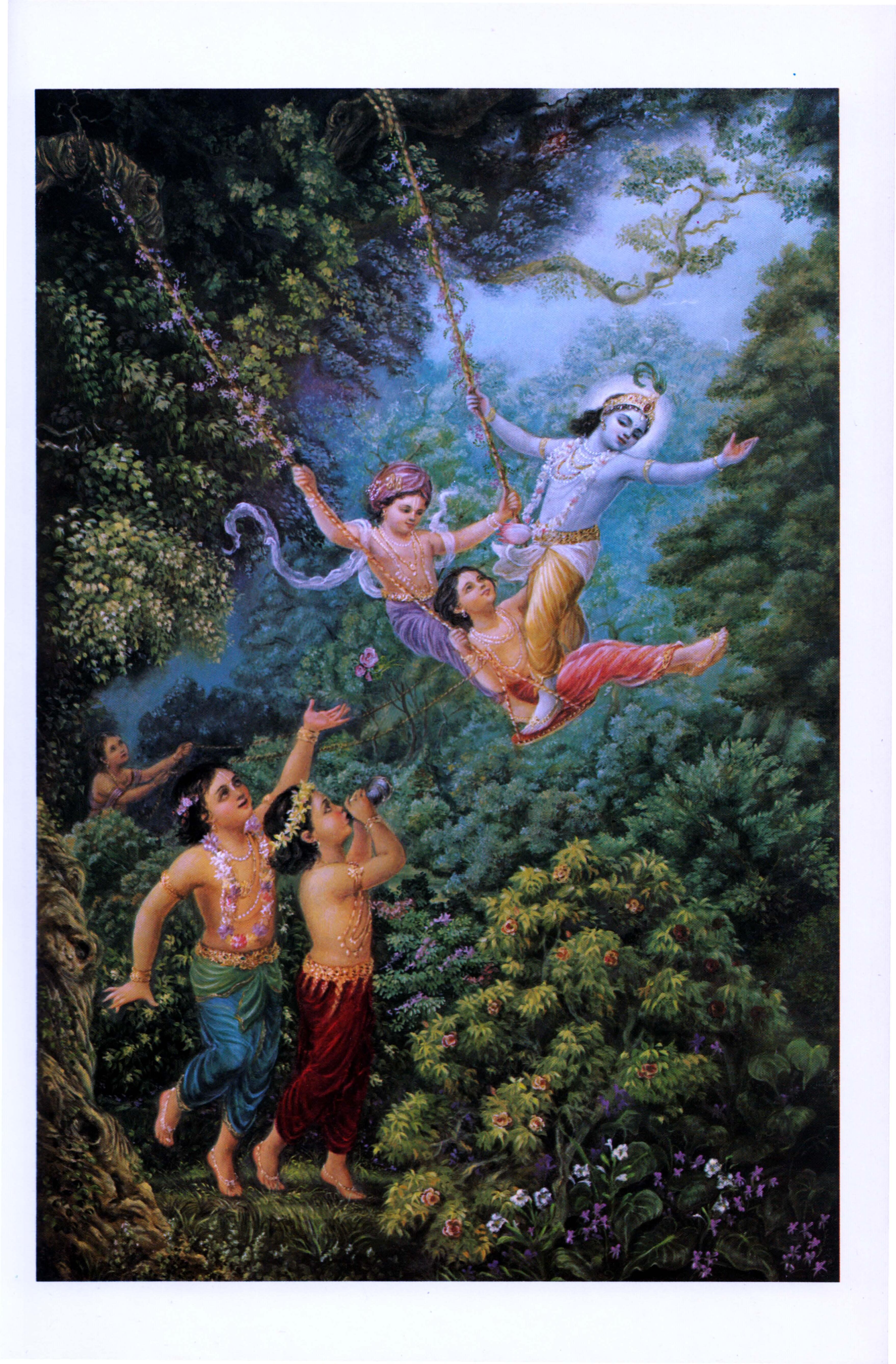
PLATE EIGHT

With maternal affection, Queen Kunti here remembers another of Lord Kr�Q.a's bewildering pastimes. One day, the Lord, playing just like a human child, spoiled the stocked butter· of mother Yasoda by breaking the pots and distributing the contents to His friends and playmates, including the celebrated monkeys of Vrndavana, who took full advantage of the Lord's munificence. Mother Yasoda saw this, and out of her pure love she wanted to make a show of punishment for her transcendental child. She took a rope and threatened to tie Him up, as is generally done with ordinary children who have been naughty. Seeing the rope in her hands, the Lord bowed down His head and began to weep, and as tears rolled down His cheeks they washed off the black ointment smeared about His beautiful eyes. Because Queen Kunti felt maternal love for Kr�Q.a, she adored this image of Him. But because she knew Kr�Q.a's supreme position, she was amazed that although He was feared by fear personified, He appeared to be afraid of His mother, who wanted to punish Him just like an ordinary child. (p. 98)


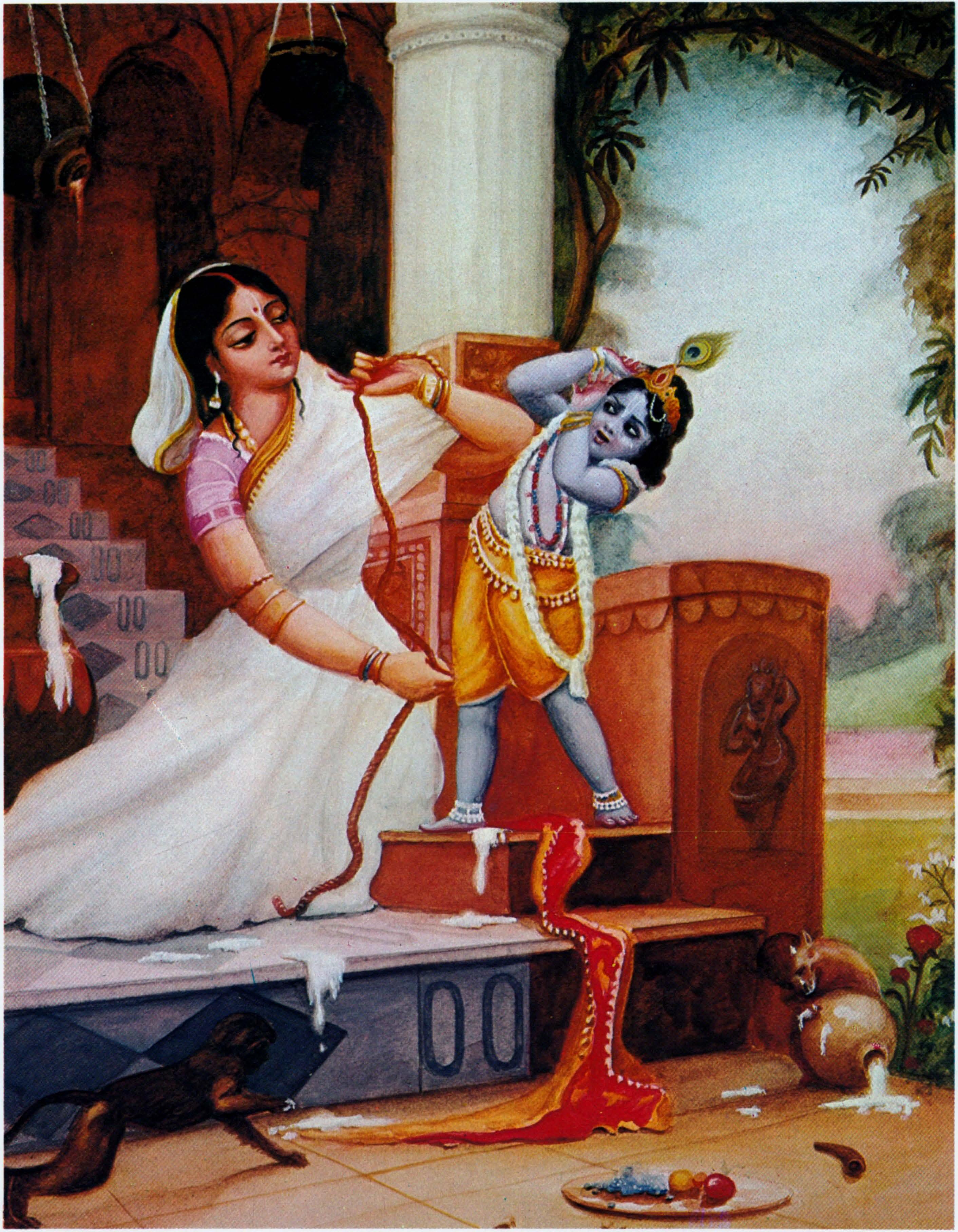
PLATE NINE


One reason why Lord Kr�Q.a's activities appeared bewildering to Queen Kunti was that He came to this world to fulfill many purposes simultaneously. One important purpose was simply to satisfy the desires of His dear devotees Vasudeva and DevakL In their former lives, Vasudeva and Devaki were known as Sutapa and Prsni. They were ordered by Lord Brahma to produce offspring, and so they engaged themselves in severe austerities for thousands of years. Being pleased by their penances, Kr�Q.a came before them and asked them what they wanted. They said, "We want a son like You. That is our desire." Kr�Q.a agreed, and in their next lives Sutapa and Prsni (now Vasudeva and Devaki) had the extraordinary opportunity to play the role of Lord Kr�Q.a's parents. As shown here, Vasudeva and Devaki were within Karhsa's prison when Lord Kr�Q.a in His Vi�I).u form appeared before them as their son. He appeared from the heart of Devaki in the dense darkness of night, like the full moon rising on the eastern horizon. The newborn child had very wonderful lotuslike eyes and bore in His four hands a conchshell, disc, club, and lotus. On His chest was the mark of Srivatsa, and on His neck the brilliant Kaustubha gem. Then, after receiving prayers from Vasudeva and Devaki and instructing them, the Supreme Personality of Godhead, Kr�Q.a, transformed Himself into His original form as a small human child. (p. 118)


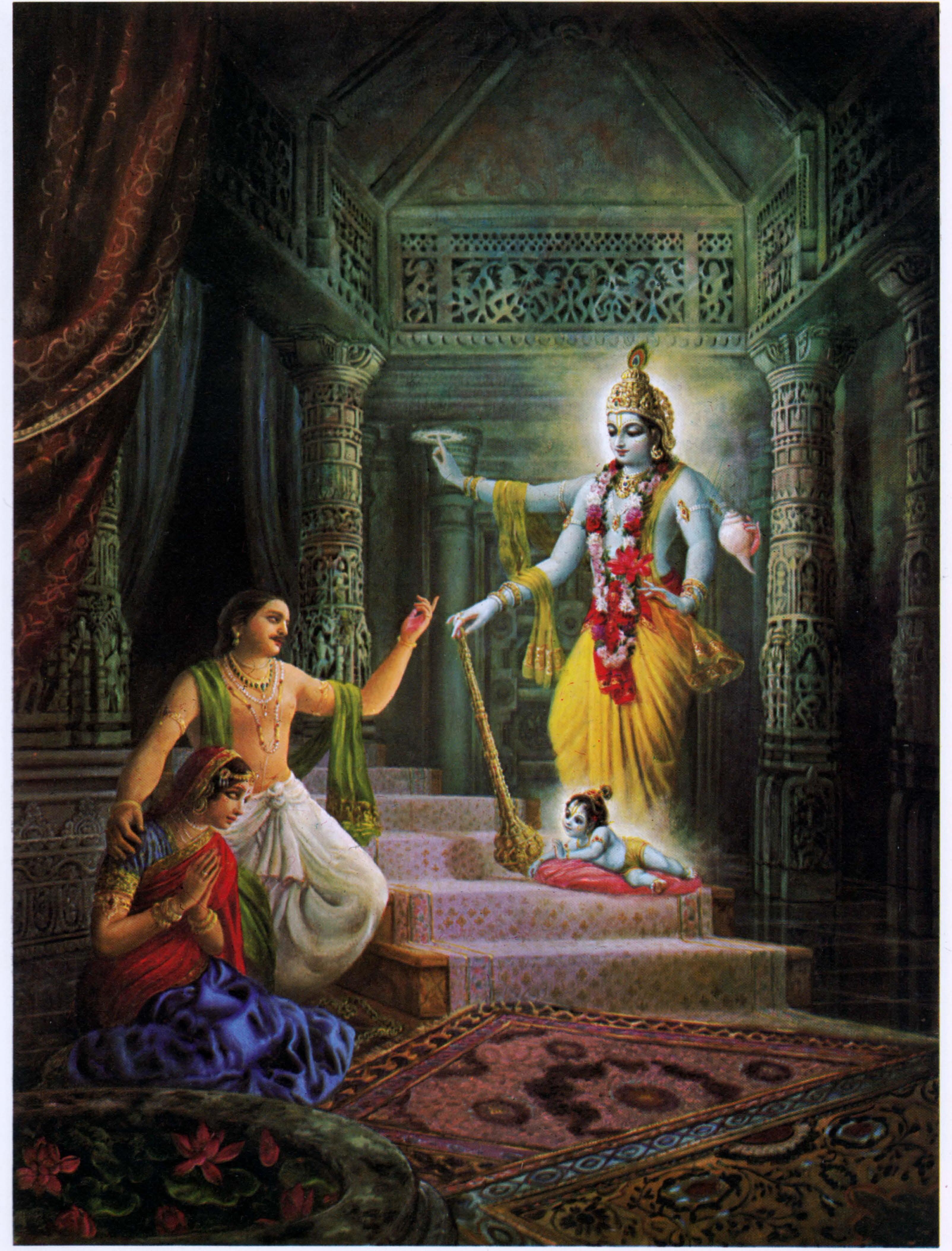
PLATE TEN
Queen Kunu here recalls another reason why the Lord appeared in the world: "Others say that You appeared because the world, being overbur. dened like a boat at sea, was much aggrieved, and that Brahma, who is Your son, prayed for You, and so You appeared to diminish the trouble." Within the halo of the universe there is a transcendental planet known as Svetadvipa, which is the abode of K�Irodakasayi Vi�Q.u, the Supersoul feature of the Supreme Lord. Whenever there is trouble in the universe that cannot be solved by the administrative demigods, they approach Lord Brahma, the secondary creator of the universe, for a solution. If even Lord Brahma cannot solve the problem, then he consults with and prays to K�Irodakasayi Vi�Q.u for an incarnation who can. Such a situation arose when Karhsa and other demons ruled the earth. At that time the earth became distressed by the demons' misdeeds, and Lord Brahma, along with the other demigods, prayed at the shore of the K�Irodaka Ocean. Vi�Q.U then informed Brahma of the imminent descent of Lord Kf�Q.a as the son of Vasudeva and DevakL (pp. 121-22)


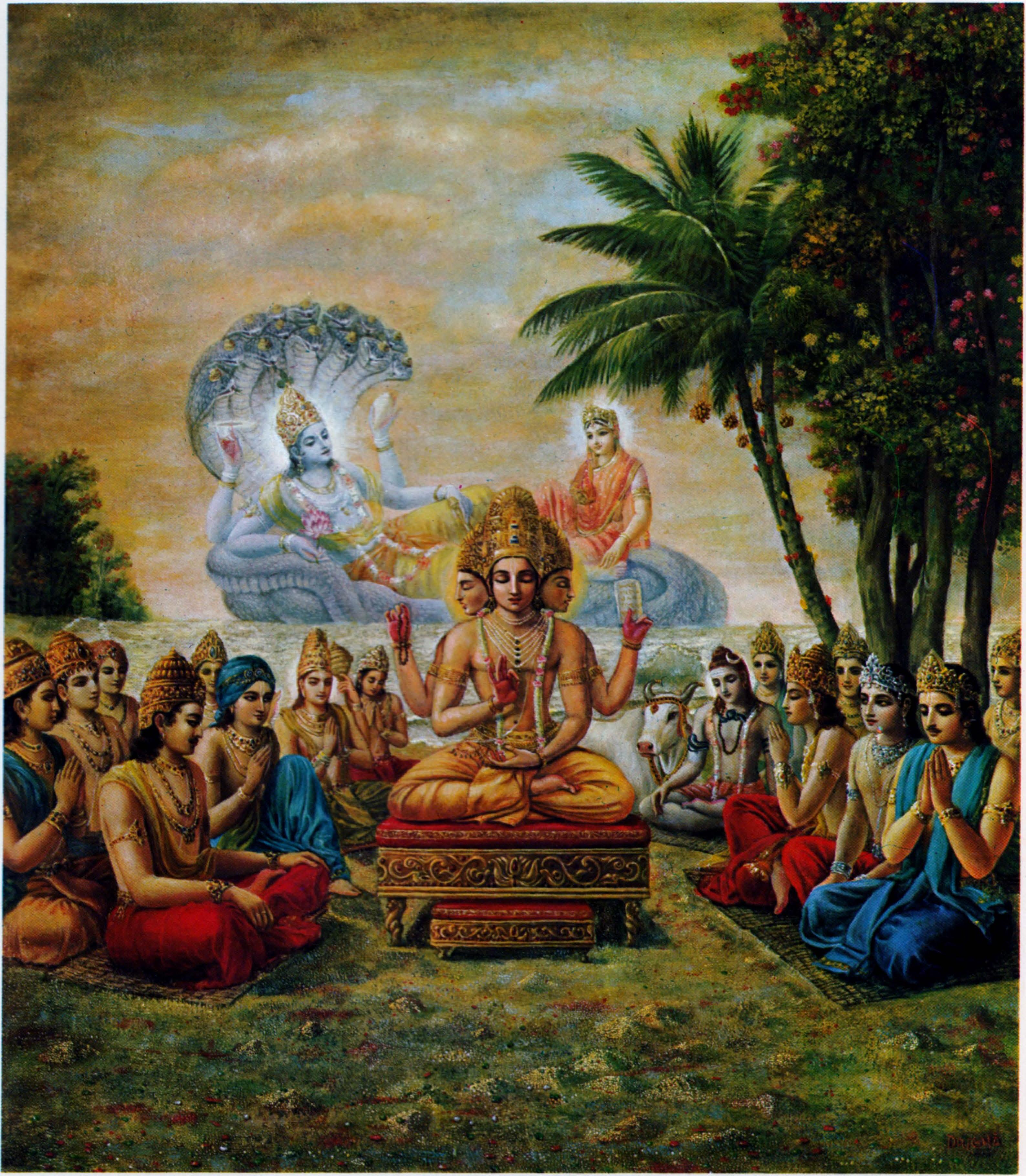
PLATE ELEVEN
At the conclusion of her prayers, Queen Kunti asks Kr�I).a to cut off her mundane attachment to her family members so that she can be attracted to Him alone: "0 Lord of Madhu, as the Ganges forever flows to the sea without hindrance, let my attraction be constantly drawn unto You without being diverted to anyone else." Just to enchant the hearts of pure devotees like Queen Kunti, who possessed maternal affection for Him, Kr�I).a enacted His delightful childhood pastimes in Vrndavana. Here we see how He and His brother Balarama stole butter from the pots hanging in the home of one of His mother's friends. Several of her friends caught Kr�I).a in the act, and later they went to Kr�I).a's mother, Yasoda, and jokingly complained about Him: "My dear mother Yasoda, your son always comes to our houses and steals butter. When we conceal our butterpots in the dark so that He might not see them, somehow He still finds them. We think that the light of His jeweled ornaments helps Him find the butterpots, so could you please remove the jewels from His body?"
Mother Yasoda replied, "Yes, I will take off all His ornaments."

But then the neighbors said, "No, no. On second thoughts, that would be useless. Somehow this boy has an effulgence that emanates from His very body. So He would find the butter even without the ornaments."
(p. 191)



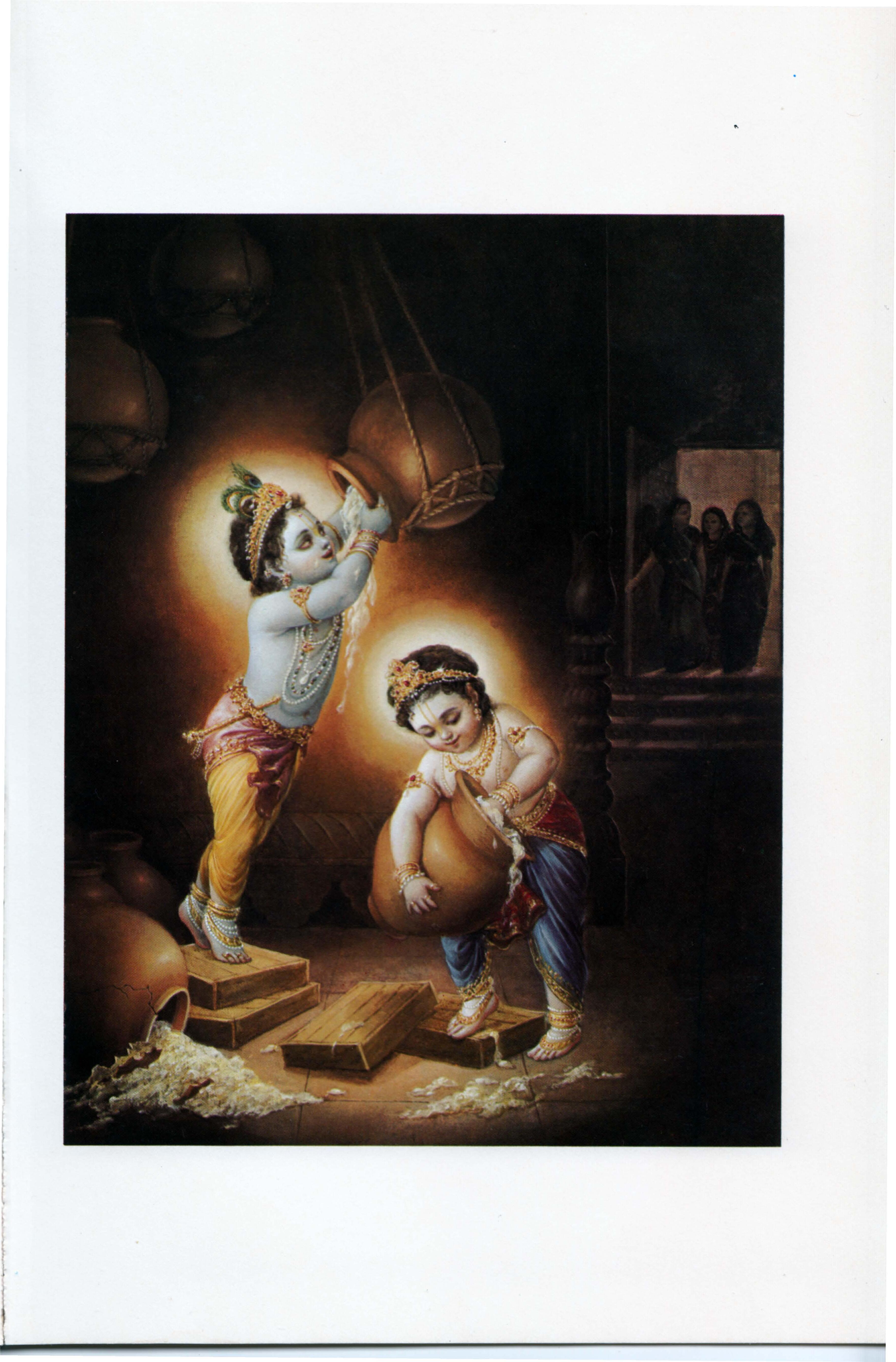
Introduction,
The tragic and heroic figure of Queen Kunti emerges from an explosive era in the history of ancient India. As related in the Mahdbhdrata, India's grand epic poem of 110,000 couplets, Kunti was the wife of King PiiQQU and the mother of five illustrious sons known as the PiiQQavas. As such, she was one of the central figures in a complex political drama that culminated fifty centuries ago in the Kuruk�etra War, a devastating war of ascendancy that changed the course of world events. The Mahdbhdrata describes the prelude to the holocaust as follows:
PiiQQU became king because his elder brother Dhrtara�tra had been born blind, a condition that excluded him from direct succession. Some time after PiiQQU ascended to the throne, Dhrtara�tra married Gandhari and fathered one hundred sons. This was the ruling family of the Kaurava dynasty, of whom the eldest was the ambitious and cruel Duryodhana.
Meanwhile, PiiQQU had taken two wives, Madri and KuntL Originally named Prtha, Kunti was the daughter of Surasena, the chief of the glorious Yadu dynasty. The Mahdbhdrata relates that Kunti "was gifted with beauty and character; she rejoiced in the law [dharma] and was great in her vows." She also possessed an unusual benediction. When she was a child, her' father Surasena had given her in adoption to his childless cousin and close friend Kuntibhoja (hence the name "Kunti"). In her stepfather's house, Kunti's duty was to look after the welfare of guests. One day the powerful sage and mystic Durvasa came there and was pleased by Kunti's selfless service. Foreseeing that she would have difficulty conceiving sons; Durvasa gave her the benediction that she could invoke any demigod and by him obtain progeny.
After Kunti married PiiQQU, he was placed under a curse that prevented him from begetting children. So he renounced the throne and retired with his wives to the forest. There Kunti's special benediction enabled her to conceive (at her husband's request) three glorious sons. First she invoked Dharma, the demigod of religion. After worshiping him and repeating an invocation Durvasa had taught her, she united with Dharma and, in time, gave birth to a boy. As soon as the child was born, a voice with no visible source said, "This child will be called Yudhi�thira, and he will be very virtuous. He will be splendid, determined, renounced, and famous throughout the three worlds."
Having beeq. blessed with this virtuous son, PiiQQU then asked Kunti for a son of great physical strength. Thus Kunti invoked Vayu, the

vii
TEACHINGS OF QUEEN KUNTI
demigod of the wind, who begot the mighty Bhima. Upon Bhima's birth the supernatural voice said, "This child will be the foremost of all strong men."
ThereafterPliQQU consulted with great sages in the forest and then asked Kunu to observe vows of austerity for one full year. At the end of this periodPliQQU said to Kunu, "0 beautiful one, Indra, the King of heaven, is pleased with you, so invoke him and conceive a son." KunU then invoked Indra, who came to her and begot Arjuna. As soon as the prince was born, the same celestial voice boomed through the sky: "0 KunU, this child will be as strong as Kartavirya and Sibi [two powerful kings of Vedic times] and as invincible in battle as Indra himself. He will spread your fameeverywhereand acquire many divine weapons." Subsequently,PaQc;lu's junior wife Madri bore two sons named Nakula and Sahadeva. These five sons of PliQQU (Yudhi�!hira, Bhima, Arjuna, Nakula, and Sahadeva) then came to be known as thePaQc;lavas.
Now, sincePliQQU had retired from the throne and gone to the forest, Dhrtar�!ra had temporarily assumed the throne untilPliQc;lu's eldest son Yudhi�!hira came of age. However, long before that timePliQQU died as a result of the curse, and Madri gave up her life as well by ascending his funeral pyre. That left the fivePliQc;lavas in the care of Queen KuntL
AfterPliQc;lu's death, the sages living in the forest brought the five young princes and Kunu to the Kaurava court at Hastinapura (near present-day Delhi). In Hastinapura, the capital city of the kingdom, the five boys were raised in royal style under the guidance of Dhrtarli�!ra and the noble Vidura,PaQc;lu's half brother.
But a smooth transfer of power was not to be. Although Dhrtarli�!ra had at first recognized the primogeniture of Yudhi�!hira, he later allowed himself to be used by his eldest son, the power-hungry Duryodhana, who wished to ascend the throne in place of Yudhi�!hira. Driven by uncontrollable jealousy, Duryodhana plotted against thePliQc;lavas, and with the hesitant approval of the weak Dhrtar�!ra, he inflicted many sufferings upon them. He made several attempts on their lives in Hastinapura, and then he brought them to a provincial palace and tried to assassinate them by having it set on fire. All the while, the five youthful PaQc;lavas were accompanied by their courageous mother KunU, who suffered Duryodhana's atrocities in the company of her beloved sons.
Miraculously, however, Kunu and thePliQc;lavas repeatedly escaped death, for they were under the loving protection of Lord Kr�Qa, who had incarnated to perform His earthly pastimes. Ultimately Duryodhana, a clever politician, cheated thePliQc;lavas out of their kingdom (and their
viii
freedom) in a gambling match. As a result of the match, the PaQQavas' wife Draupadi was abused by the Kauravas, and the PaQQavas themselves were forced to spend thirteen years in exile in the forest-to the great sorrow of Kunti.
When the thirteen-year exile had ended, the PaQ.c.tavas returned to Hastinapura to reclaim their kingdom. But Duryodhana bluntly refused to relinquish it. Then, after some unsuccessful attempts to quell the hostilities, Yudhi�thira sent Kr�Qa Himself to secure the return of the PaQQava kingdom by peaceful means. But even this effort failedbecause of Duryodhana's obstinacy-and both sides prepared for battle. To place Yudhi�thira on the throne-or to oppose him-great warriors from all corners of the earth assembled, setting the scene for what would prove to be a devastating world war.
Fierce fighting raged for eighteen days on the historic plain of Kuruk�etra (near Hastinapura), and in the end all but a handful of the many millions of warriors were dead. Only Lord Kr�Qa, the PaQQavas, and a few others survived the massacre. The Kauravas (Duryodhana and his brothers) were devastated. In a desperate gesture of revenge, Asvatthama, one of the surviving Kauravas, mercilessly murdered the five sons of Draupadi while they were sleeping. Queen Kunti thus suffered a final blow-the loss of her grandchildren.
Arrested and dragged to the PaQQavas' camp like a bound animal, Asvatthama was let free only by the astounding compassion of Draupadi, the slaughtered boys' mother and Kunti's daughter-in-law, who pleaded for his life. But the shameless Asvatthama made one more attempt to kill the last heir of the PaQQavas, their unborn grandson in the womb of Uttara, by hurling the supreme brahmastra weapon. When she saw the missile flying straight at her, Uttara immediately ran to the shelter of Lord Kr�Qa, who was just about to depart for Dvaraka, His majestic capital city. Kr�Qa protected the PaQQavas and their mother Kunti from imminent death by stopping the weapon's uncontrollable heat and radiation with His own Sudarsana disc.
Having delivered the PaQQavas from this last calamity, and seeing that all His plans were fulfilled, Lord Kf�Qa was again preparing to leave. For years Duryodhana had tormented Queen Kunti's family, but Kr�Qa had protected them at every turn-and now He was going away. Kunti was overwhelmed, and she prayed to Kf�Qa from the core of her heart.
Kunti was Lord Kf�Qa's aunt (He had incarnated as the son of her brother Vasudeva), yet despite this conventional tie with the Lord, she fully understood His exalted and divine identity. She knew full well that







Introduction ix
TEACHINGS OF QUEEN KUNTI
He had descended from His abode in the spiritual world to rid the earth of demoniac military powers and reestablish righteousness.Just before the great war, Kf!?l)a had revealed all this to her son Arjuna in words immortalized in the Bhagavad-gita (4.7-8):
Whenever and wherever there is a decline in religious practice, 0 descendant of Bharata, and a predominant rise of irreligion-at that time I incarnate Myself.In order to deliver the pious and annihilate the miscreants, as well as to reestablish the principles of religion, I advent Myself millennium after millennium.
Kf!?l)a had accomplished His purpose of'' annihilating the miscreants'' by orchestrating the destruction of the unholy Kauravas.Then He installed Yudhi!?thira on the throne to establish the Plii)Qava reign, and He consoled the slain warriors' relatives. The scene of the Lord's imminent departure provides the setting for Queen Kunti's exalted prayers.
As Kunti approached the Lord's chariot and began to address Him, her immediate purpose was to persuade Him to remain in Hastinapura and protect the Plii)Qava government from reprisals:
0 my Lord ...are You leaving us today, though we are completely dependent on Your mercy and have no one else to protect us, now when all kings are at enmity with us? (SrimadBhdgavatam 1.8.37)
From this supplication we should not mistakenly conclude that Kunti's prayers were self-serving. Although her sufferings were far greater than those any ordinary person could endure, she does not beg relief.On the contrary, she prays to suffer even more, for she reasons that her suffering will increase her devotion to the Lord and bring her ultimate liberation:
My dear Kf!?l)a, Your Lordship has protected us from the poisoned cake, from a great fire, from cannibals, from the vicious assembly, from sufferings during our exile in the forest, and from the battle where great generals fought....I wish that all those calamities would happen again and again so that we could see You again and again, for seeing You means that we will no longer see repeated births and deaths. (Bhag. 1.8.24-25)
X
Kunti's words-the simple and illuminating outpourings of the soul of a great and saintly woman devotee-reveal both the deepest transcendental emotions of the heart and the most profound philosophical and theological penetrations of the intellect. Her words are words of glorification impelled by a divine love steeped in wisdom:
0 Lord of Madhu, as the Ganges forever flows to the sea without hindrance, let my attraction be constantly drawn unto You without being diverted to anyone else. (Bhag. 1.8.42)
Kunti's spontaneous glorification of Lord Kr�IJ.a and her description of the spiritual path are immortalized in the Mahabharata and the Bhagavata PuraiJa (Srfmad-Bhagavatam), and they have been recited, chanted, and sung by sages and philosophers for thousands of years.
As they appear in the First Canto of the Bhagavatam, Queen Kunti's celebrated prayers consist of only twenty-six couplets (verses 18 through 43 of the Eighth Chapter), yet they are considered a philosophical, theological, and literary masterpiece. The present book (Teachings of Queen Kuntl) includes those inspired verses and illuminating commentary by His Divine Grace A. C. Bhaktivedanta Swami Prabhupada, Founder-Acarya of the International Society for Krishna Consciousness and the most renowned Vedic scholar and spiritual leader of our time. In addition to this commentary (originally written in 1962), Teachings of Queen Kuntf contains further explanations that Srila Prabhupada gave more recently in an absorbing se�ies of lectures. In those memorable talks, delivered in the spring of 1973 at ISKCON's Western world headquarters in Los Angeles, he analyzed the verses in significantly greater detail and shed even more light upon them.
This new Bhaktivedanta Book Trust publication, complete with eleven color prints of exquisite original oil paintings, will be a prized addition to the libraries of all those who seek a deeper understanding of life's mysteries. Written by a man of profound devotion and erudition, it will provide every reader with firm guidance along the universal path to genuine wisdom and spiritual enlightenment.
-The Publishers



Introduction xi
1. The Original Person









kunty uvaca namasye puru�rh tvadyam iSvararh prakrtetz param alak$yarh sarva-bhutanam antar bahir avasthitam



Srimati Kunti said: 0 KnQa, I offer my obeisances unto You because You are the original personality and are unaffected by the qualities of the material world. You are existing both within and without everything, yet You are invisible to all.
-Srimad-Bhagavatam 1.8.18
Srimati Kuntidevi was quite aware that Kr�Qa is the origina� Personality of Godhead, although He was playing the part of her nephew. Such an enlightened lady could not commit a mistake by offering obeisances unto her nephew. Therefore, she addressed Him as the original puru� beyond the material cosmos. Although all living entities are also transcendental, theyareneitheroriginalnorinfallible. Thelivingentities areapt to falldown undertheclutchesofmaterialnature, butthe Lordis never like that. In the Vedas, therefore, He is described as the chief
1
TEACHINGS OF QUEEN KUNTI
among all living entities (nityo nitytintim cetanas cetantintim). Then again He is addressed as iSvara, or the controller. The living entities or the demigods like Candra and Surya are also to some extent isvara, but none of them is the supreme isvara, or the ultimate controller. Kr!?I).a is the paramesvara, or the Supersoul. He is both within and without. Although He was present before Srimati Kunti as her nephew, He was also within her and everyone else. In the Bhagavad-gitti (15.15) the Lord says, ''I am situated in everyone's heart, and only due to Me one remembers, forgets, and is cognizant, etc. Through all the Vedas I am to be known because I am the compiler of the Vedas, and I am the teacher of the Vedanta." Queen Kunti affirms that the Lord, although both within and without all living beings, is still invisible. The Lord is, so to speak, a puzzle for the common man. Queen Kunti experienced personally that Lord Kr!?I)a was present before her, yet He entered within the womb of Uttara to save her embryo from the attack of Asvatthama's brahmtistra. Kunti herself was puzzled about whether Sri Kr!?I)a is all-pervasive or localized. In fact, He is both, but He reserves the right of not being exposed to persons who are not surrendered souls. This checking curtain is called the mtiyti energy of the Supreme Lord, and it controls the limited vision of the rebellious soul. It is explained as follows.


2
2. Beyond the Senses




maya-javanikacchannam ajfiadhok�ajam avyayam na lak�yase mu{lha-drsa nato na{Ya-dharo yatha
Being beyond the range of limited sense perception, You are the eternally irreproachable factor covered by the curtain of deluding energy. You are invisible to the foolish obsener, exactly as an actor dressed as a player is not recognized.

-Srimad-Bhagavatam1.8.19
In the Bhagavad-gita Lord Sri Kr�IJ.a affirms that less intelligent persons mistake Him to be an ordinary man like us, and thus they deride Him. The same is confirmed herein by Queen Kunti. The less intelligent persons are those who rebel against the authority of the Lord. Such persons are known as asuras. The asuras cannot recognize the Lord's authority. When the Lord Himself appears among us, as Rama, Nrsirilha, Varaha, or in His original form as Kr�IJ.a, He performs many wonderful acts which are humanly impossible. As we shall find in the Tenth Canto of this great literature, Lord Sri Kr�IJ.a exhibited His humanly impossible activities even from the days of His lying on the lap of His mother. He
3
TEACHINGS OF QUEEN KUNTI
killed the Piitana witch, although she smeared her breast with poison just to kill the Lord. The Lord sucked her breast like a natural baby, and He sucked out her very life also. Similarly, He lifted the Govardhana Hill, just as a boy picks up a frog's umbrella, and stood several days continuously just to give protection to the residents ofVrndavana. These are some of the superhuman activities of the Lord described in the authoritative Vedic literatures like the Purd"(las, ltihdsas (histories), and Upani�ads. He has delivered wonderful instructions in the shape of the Bhagavad-gitd. He has shown marvelous capacities as a hero, as a householder, as a teacher, and as a renouncer. He is accepted as the Supreme Personality of Godhead by such authoritative personalities as Vyasa, Devala, Asita, Narada, Madhva, Sati.kara, Ramanuja, Sri Caitanya Mahaprabhu, Jiva Gosvami, Visvanatha Cakravarti, Bhaktisiddhanta Sarasvati, and all other authorities of the line. He Himself has declared as much in many places of the authentic literatures. And yet there is a class of men with demoniac mentality who are always reluctant to accept the Lord as the Supreme Absolute Truth. This is partially due to their poor fund of knowledge and partially due to their stubborn obstinacy, which results from various misdeeds in the past and present. Such persons could not recognize Lord Sri Kr�r:ta even when He was present before them. Another difficulty is that those who depend more on their imperfect senses cannot realize Him as the Supreme Lord. Such persons are like the modern scientist. They want to know everything by their experimental knowledge. But it is not possible to know the Supreme Person by imperfect experimental knowledge. He is described herein as adhok�aja, or beyond the range of experimental knowledge. All our senses are imperfect. We claim to observe everything and anything, but we must admit that we can observe things under certain material conditions only, which are also beyond our control. The Lord is beyond the observation of sense perception. Queen Kunti accepts this deficiency of the conditioned soul, especially of the woman class, who are less intelligent. FOr the less intelligent there must be such things as temples, mosques, or churches so that they may begin to recognize the authority of the Lord and hear about Him from authorities in such holy places. For the less intelligent, this beginning of spiritual life is essential, and only foolish men decry the establishment of such places of worship, which are required to raise the standard of spiritual attributes for the mass of people. For less intelligent persons, bowing down before the authority of the Lord, as generally done in the temples, mosques, or churches, is as beneficial as it is for the advanced devotees to meditate upon Him by active service.
4
3. The Most Intelligent Woman

tatha paramahamsanam
munfnam amalatmanam
bhakti-yoga-vidhdnartham katham pasyema hi striyal,l
You Yourself descend to propagate the transcendental science of devotional service unto , the hearts of the advanced transcendentalists and mental speculators, who are purified by being able to discriminate between matter and spirit. How, then, can we women know You perfectly?
-Srimad-Bhagavatam 1.8.20
Even the greatest philosophical speculators cannot have access to the region of the Lord. It is said in the Upani$ads that the Supreme Truth, the Absolute Personality of Godhead, is beyond the range of the thinking power of the greatest philosopher. He is unknowable by great learning or by the greatest brain. He is knowable only by one who has His mercy. Others may go on thinking about Him for years together, yet He is unknowable.· This very fact is corroborated by the Queen, who is playing
5
TEACHINGS OF QUEEN KUNTI
the part of an innocent woman. Women in general are unable to speculate like philosophers, but they are blessed by the Lord because they believe at once in the superiority and almightiness of the Lord, and thus they offer obeisances without reservation. The Lord is so kind that He does not show special favor only to one who is a great philosopher. He knows the sincerity of purpose. For this reason only, women generally assemble in great number in any sort of religious function. In every country and in every sect of religion it appears that the women are more interested than the men. This simplicity of acceptance of the Lord's authority is more effective than showy insincere religious fervor.
Kuntidevi prayed to the Lord very submissively, and this is the symptom of a Vai�l).ava. The Lord, Kr�l).a, had come to Kuntidevi tooffer respect to her by taking the dust of her feet. Because Kf�l).a considered Kuntidevi His aunt, He used to touch her feet. But although Kuntidevi, a great devotee, was in such an exalted position, practically on the level of Yasodamayi, Kr!1l).a's mother, she was so submissive that she prayed, "Kf!1l).a, You are meant to be understood by the paramahamsas, the most advanced transcendentalists, but I am a woman, so how can I see You?"
According to the Vedic system, there are four social divisions (ctiturvan}yam maya smam). The highest members of the social order are the brtihmaiJas, those who are intelligent, and then come the k:jatriyas (military men and administrators), the vaisyas (farmers and businessmen), and finally the sudras (ordinary laborers). One's place in this system is determined by one's qualities and work (gu1Ja-karma). The Bhagavadgitii mentions striyo vaisyiis tathii sudrti�, and the Srimad-Bhiigavatam speaks of stri-sudra-dvijabandhuniim. According to these .references women, sudras, and dvija-bandhus are considered to belong to the same category. The word dvija-bandhu refers to one who is born in an exalted briihma1Ja or k:jatriya family but who has no qualifications of his own. One's social standing, according to the Vedic system, is determined by one's qualifications. This is very practical. Suppose a man is born the son of a high-court judge. This does not mean that he himself is also a highcourtjudge. Yet because one happens to take birth in a brtihmaiJa family, even if he has no qualifications and is rascal number one, he claims to be a brtihmaiJa, and althoughhisqualifications are less than those of a sudra, people accept him as a brtihma1Ja. This has caused the downfall of the Vedic civilization. The brtihmaiJaS in India are sometimes very much against my movement because Itrainand accept briihmaiJaS from Europe and America. But we do not care about their arguments, nor will any other reasonable man. Sri Caitanya Mahaprabhu said:
6
prthivfte ache yata nagaradi grama sarvatra pracara haibe mora nama


"In every town, city, and village of the world, the Kr�Q.a consciousness movement will be preached." How is it, then, that Europeans and Americans will not become brahmaftas? In fact, one who comes to Kr�Q.a consciousness has already surpassed brahmaQ.ism. As stated in Bhagavad-gfta (14.26):
marh ca yo 'vyabhicarefta bhakti-yogena sevate sa guftan samatftyaitan brahma-bhtlyaya kalpate
"One who takes to bhakti-yoga surpasses the modes of material nature and comes immediately to the transcendental platform [brahma-bhuta]." Not to speak of becoming a brahmafta, the person who fully engages in bhaktiyoga attains the highest transcendental platform.
The stereotyped, crippled idea that only a person born in a brahmafta family can become a brahmafla has killed Vedic civilization, but now we are reviving the correct understanding that the attainment of perfection is meant for everyone. In Bhagavad-gfta (9.32) Lord Kr�Q.a says:
marh hi partha vyapasritya
ye 'pi syu� pdpa-yonaya� striyo vaiiyas tatha sudras te 'pi yanti pararh gatim
"0 son ofPrtha, those who take shelter in Me-though they be lowborn, women, vaisyas, or sudras-can approach the supreme destination." Thus although women, sudras, and vaiiyas are ordinarily considered to belong to a lower class, when one becomes a devotee he or she goes beyond such designations. Women, sudras, and vaisyas are ordinarily regarded as less intelligent, but if one takes to Kr�Q.a consciousness one is the most intelligent, as stated in the Caitanya-caritamrta (kr$fta yei bhaje sei batja catura). And Caitanya Mahaprabhu says:
ei rupe brahmaft{fa bhramite kona bhagyavan jfva guru-kr$fla-prasade paya bhakti-lata-bya
The Most Intelligent Woman
7
"Among all the living entities wandering throughout the universe, one who is very fortunate receives, by the mercy of the spiritual master and the mercy of Kf�I).a, the seed of devotional service." (Cc. Madhya 19.151) The Kr�I).a consciousness movement does not consist of wretched, unfortunate men. No. It consists of the most fortunate. One who has taken to Kf�I).a consciousness is to be considered the most fortunate because he has found the way to act so that his life will be perfect. One who is Kr�I).a conscious and discharging his duties nicely is the most fortunate and the most perfect. This is humbly stated here by KuntidevL
Although Kunti had the body of a woman, she was a devotee. Therefore she was not like an ordinary unintelligent woman. Rather, she was the most intelligent, for she recognized Kr�I).a to be the Supreme Godhead: "He has come to me to offer me respect, materially appearing to be my nephew, but He is the Supreme Personality of Godhead." Therefore in a previous verse she said, alak�yarh sarva-bhuttintim antar bahir avasthitam: "You fire not seen by ordinary men, although You are everywhere, inside and outside." In another verse also she said, na lak�yase mu{lha-drsti: "Fools and rascals cannot see You." This indicates that Kunti saw Him. Unless she were able to see Kf�I).a as He is, how could she say, na lak�yase mu{lha-drsti? She also said, prakrteb param: "You are transcendental to this material creation."
Now here also, in this verse, Kunti continues to express herself with humility. This humility is very good in devotional service. Therefore Sri Kf�I).a Caitanya Mahaprabhu teaches us, tnztid api sunicena taror api sahi��unti: "One should be more tolerant than the tree and humbler than the grass to make progress in spiritual life." This is necessary because for one who is living in this material world there will be so many disturbances, just as if one were traveling on the ocean. One cannot expect a very peaceful situation on the ocean; even a big ship may also be unsteady, and at any moment there may be tumultuous waves. Similarly, in this material world we should always expect danger; one cannot expect a very peaceful life within this material world. The sastra, the Vedic literature, says, padarh padarh yad vipadtim (Bhtig. 10.14.58): at every step there is danger. But if one becomes a devotee, then one can escape (mtiytim ettirh taranti te).
If one takes to Kf�I).a consciousness, in the beginning there will be many disturbances caused by Maya, the material energy of illusion. Maya will test us to see how firmly we are fixed in Kf�I).a consciousness. Because she is also ·an agent of Kf�I).a, she does not allow anyone the freedom to disturb Kf�I).a. Therefore she tests very rigidly to see whether



8
TEACHINGS OF QUEEN KUNTl
we have taken to K{�Q.a consciousness to disturb Kr�Q.a or are actually serious. That is Maya's business. So in the beginning there will be tests by Maya, and we shall feel so many disturbances while making progress in Kf�Q.a consciousness. But if we follow the rules and regulations and chant regularly as prescribed, then we shall remain steady. If we neglect these principles, Maya will capture us immediately. Maya is always ready. We are in the ocean, and at any moment we may be disturbed. Therefore one who is not disturbed at all is called paramaharilsa.
Kuntidevi therefore says, tatha paramaharhsanam: "You are meant to be understood by the paramaharhsas." The word parama means "ultimate," and harhsa means "swan." So paramaharhsa means "the perfect swan." If we give a swan milk mixed with water, the swan will take the milk and leave aside the water. Similarly, this material world is made of two natures-the inferior nature and the superior nature. The superior nature means spiritual life, and the inferior nature is material life. Thus a person who gives up the material part of this world and takes only the spiritual part is called paramaharhsa.

One should know that the activities of the body are due to the soul within the body. That is the real fact. The body is only the outward covering. Similarly, one should know that Kr�Q.a is the real center of all activities, and one who knows this is a paramaharilsa. Thus bhakti-yoga is for the paramaharhsa, one who knows that Kr�Q.a is the central fact. Kf�Q.a says in Bhagavad-gita, aharh sarvasya prabhavo matta/:1 sarvarh pravartate: "I am the source of everything; everything emanates from Me." So one who knows, not only theoretically but practically, that Kf�Q.a is the cause of all causes-one who is convinced of this-is a paramaharilsa.
Kuntidevi says, "You are meant for the paramaharhsas, not for the rascals and fools. You are meant for the paramaharhsas and munis." The word muninam refers to those who are thoughtful or to mental speculators, and the word amalatmanam refers to one who has no dirty things in his heart. The heart of a materialistic person is full of dirty things. What are those dirty things? Lust and greed. All materialistic persons are lusty and greedy, and therefore their hearts are understood to be full of dirty things, but amalatmanam refers to those who are freed from these two contaminations.
Bhakti-yoga is meant for those whose hearts are cleansed, not for the lusty and greedy. Of course, those who are lusty and greedy may try to advance, and graduallytheymay doso, but once one is situatedin bhaktiyoga there is no more lust or greed. Viraktir anyatra ca (Bhag. 11.2.42).
This is the test-when one is free from lusty desires and greed, then he is
The Most Intelligent Woman 9
TEACHINGS OF QUEEN KUNTI






situated in bhakti-yoga and is actually a paramaharhsa. Kuntidevi humbly submits, "You are meant for the paramaharhsas and munis, those who are cleansed in heart and are engaged in bhakti-yoga. But what are we? We are simply women. We are in a lower class. How can we understand You?" Although she understands everything, she still takes the position of an ordinary woman and says, "How can I understand You?" This is humility.

10
4. Approaching Kr�oa, The All-pervading Truth



kr$-ruiya wisudevdya devaki-nandandya ca nanda-gopa-kumdrdya govinddya namo nama!:z
Let me therefore offer my respectful obeisances unto the Lord, who has become the son ofVasudeva, the pleasure of Devaki, theboy of Nanda and the other cowherd men ofVrndivana, and the enlivener of the cows and the senses.
-Srimad-Bhagavatam 1.8.21
The Lord, being thus unapproachable by any material assets, out of unbounded and causeless mercy descends on the earth as He is in order to show His special mercy upon His unalloyed devotees and to diminish the upsurges of the demoniac persons. Queen Kunti specifically adores the incarnation, or descent, of Lord ��Q.a above all other incarnations because in this particular incarnation He is more approachable. In the Rama incarnationHeremained a king's son from His very childhood, but in the incarnation of ��Q.a, although He was the son of a king, He at once left the shelter of His real father and mother (King Vasudeva and Queen
11
TEACHINGS OF QUEEN KUNTI
Devaki) just after His appearance and went to the lap of Yasodamayi to play the part of an ordinary cowherd boy in the blessed Vrajabhii.mi, which is very sanctified because of His childhood pastimes. Therefore Lord Kr�Qa is more merciful than Lord Rama. He was undoubtedly very kind to Kunti's brother Vasudeva and the family. Had He not become the son of Vasudeva and Devaki, Queen Kunti could not claim Him to be her nephew and thus address Kr�Qa in parental affection. But Nanda and Yasoda are more fortunate because they could relish the Lord's childhood pastimes, which are more attractive than all other pastimes. There is no parallel to His childhood pastimes as exhibited at Vrajabhii.mi, which are the prototypes of His eternal affairs in the original Kr�Qaloka, described as the cintdma"(li-dhdma in the Brahma-samhitd. Lord Sri Kp�Qa descended Himself at Vrajabhumi with all His transcendental entourage and paraphernalia. Sri Caitanya Mahaprabhu therefore confirmed that no one is as fortunate as the residents of Vrajabhumi, and specifically the cowherd girls, who dedicated their everything for the satisfaction of the Lord. His pastimes with Nanda and Yasoda and His pastimes with the cowherd men and especially with the cowherd boys and the cows have caused Him to be known as Govinda. Lord Kr�Qa as Govinda is more inclined to the brdhma"(las and the cows, indicating thereby that human prosperity depends more on these two items, namely brahminical culture and cow protection. J.-ord Kr�Qa is never satisfied where these are lacking.
In the beginning of her prayers, Kuntidevi said, namasye puru�am tvddyam isvaram prakrte/:1 param: "I offer my obeisances unto the person, puru�a, who is prakrte/:1 param, beyond this material manifestation." Thus in the beginning Kuntidevi gave us the understanding that God is the supreme puru�a, the Supreme Person. He is not impersonal. He is a person, but He is not a person of this material world or this material creation, and He does not have a material body. This is to be understood. The poor fund of knowledge held by the impersonalists cannot accommodate how the Supreme Absolute Truth can be a person, because whenever they think of a person they think of a person of this material world. That is their defect. Why should God be a person of this material world? Therefore in the beginning Kuntidevi cleared away this misunderstanding by saying that the Lord is prakrte/:1 param, beyond this material creation. Yet He is a person, and now by the grace of Kunti we can understand that this Supreme Person, although a/ak$Jam, invisible, has now visibly appeared as Kr�Qa.
Kuntidevi says, kr�"(ldya vdsudevdya. The word vdsudeva is sometimes understood to mean "the all-pervading." The impersonalists have this


12
conception of Vasudeva, and therefore Kuntidevi points out, "That Vasudeva, the all-pervading, is Kr�Qa." lsvara� sarva-bhutanam hrd-dde 'tjuna ti:Jfhati: Kr�Qa, the Supreme Lord, is present in everyone's heart. Thus He is all-pervading.
Kf�Q.a, the original person, exists in three features: as the Supreme Personality of Godhead, as the all-pervading Pararnatma (the Supersoul), and as the impersonal Brahman effulgence. Those who are interested in bhakti-yoga have no interest in the impersonal Brahman effulgence, which is for common men. If one were an inhabitant of the sun, what interest would he have in the sunshine? That would be most insignificant for him. Similarly, those who are advanced in spiritual life are not interested in the impersonal Brahman effulgence. Rather, they are interested in puru:ja, the Supreme Person, Vasudeva. As stated in Bhagavad-gita, this realization of the Supreme Person takes place after many, many births (bahunam janmanam ante). The jfianfs, the impersonalists, who are attached to the Brahman effulgence, try to understand the Absolute Truth by dint of their knowledge, but they do not know that their knowledge is imperfect and limited whereas Kf�Qa, the Absolute Truth, is unlimited. We cannot approach the unlimited by our limited knowledge. That is not possible.
By the grace of devotees like Kuntidevi, we can understand that the all-pervading Absolute Truth, Vasudeva, Paramatma, is present as Kr�Qa (kmzaya vasudevaya). This realization of Vasudeva is not possible for impersonalists very easily. Kf�Q.a says in Bhagavad-gita (7.19):
bahunamjanmanam ante jfianavan mam prapadyate vasudeva� sarvam iti sa mahatma sudur/abha�
"After many births and deaths, he who is actually in knowledge surrenders unto Me, knowing Me to be the cause of all causes and all that is. Such a great soul-is very rare." The word mahatma means "broadminded." One who cannot understand Kr�Qa is not broad-minded but cripple-minded. If one becomes broad-minded, then by the grace of Kr�Qa one can understand Kr�Qa.
The process of understanding Kr�Q.a is sevonmukha-by rendering service. Sevonmukhe hi jihvadau. Realization of Vasudeva is possible by rendering service, beginning with the tongue. The tongue has two functions-to vibrate and to taste. So if one repeatedly hears and vibrates the
Approaching Kmza, the All-Pervading Truth 13
TEACHINGS OF QUEEN KUNTI




Hare Kr�Q.a mantra and tastes prasada, food offered to Kr�Q.a, by this very simple method one will realize Vasudeva, Kf�Q.a. Kr�Q.a will reveal Himself. It is not that by our endeavor alone we can understand Kr�Q.a, but our endeavor in loving service will make us qualified, and then Kr!?Q.a will reveal Himself (svayam eva sphuraty adab).
Kr!?Q.a is very much anxious to take us back home, hack to Godhead, but we are stubborn and do not wish to go. Therefore He is always looking for the opportunity to take us back home. He is just like an affectionate father. When a son who is a rascal leaves his father and goes loitering in the street, with no food and no shelter, and suffers very much, the father is always anxious to bring the boy back home. Similarly, Kr!?Q.a is the supreme father, and all the living entities within this material world are exactly like misled children of a wealthy man who have left home to loiter in the street. Therefore the greatest benefit one can bestow upon one's fellow human being is to give him Kr!?Q.a consciousness. No kind of material profit will satisfy the living entity, but if he is given Kr!?Q.a consciousness he will actually be satisfied. A bewildered boy loitering in the street may be reminded, "My dear boy, why are you suffering so much? You are the son of a very rich man who has so much property. Why are you loitering in the street?" And if he comes to understand, "Yes, I am the son of this important man. Why shall I loiter in the street?" he may then return home. Therefore the best service is to inform those who have forgotten Kr�Q.a, "You are part and parcel of Kr�x;ta. You are the son of Kr!?x:ta, who is full in all opulence. Why are you rotting in this material world?" This is the greatest service. Maya, illusion, is very strong, but it is the duty of every devotee of Kr�x:ta to try to enlighten everyone to Kr�x:ta consciousness. Kuntidevi, for example, first said that although Kr�Q.a, the Supreme Person, is within and without, to rascals and fools He is invisible. Therefore she points out, "Here is the Lord-Kr�Q.a."
Kr�Q.a is the all-pervading Supreme Personality of Godhead (kmlaya vasudevaya), but He is very much pleased to become the son of Devaki (devaki-nandanaya). Devakl-nandana is also mentioned in the Atharva Veda. Kr�Q.a comes as Devakl-nandana, and His father is Nanda-gopa, Nanda Maharaja. Kr�Q.a likes to b� related with His devotees who act as father and mother. Although here in this material world we try to make our relationship with the Supreme by accepting Him as father, Kr�x:ta wants to become the son. He takes pleasure in becoming the son of a devotee. Ordinary men want God as their father, but that is not very pleasing to Kr�Q.a because the son always bothers the father: "Give me this, give me this, give me this."
14
Of course, Kr�Q.a has immense potencies by which He can supply as much as everyone wants. Eko bahuntirit yo vidadhtiti ktimtin. He supplies food to the elephant, and He supplies food to the ant, so why not to the human being? But rascals do not know this. They work like asses day and night to find bread, and if they go to church, there also they pray, "Give me bread." They are concerned only with the bread problem.


Although the living entity is the son of the richest, most opulent person, he has created a bread problem. This is called ignorance. He thinks, "If I do not solve my bread problem, if I do not drive my trucks day and night, how can I live?" This is the nonsense of our modern civilization. Where is there a bread problem? Kr�Q.a can supply unlimited amounts of bread. There are thousands of elephants in Africa, and Kr�Q.a supplies food to them. So if He can supply food to the elephants, why not to the human beings? The Bhtigavatam therefore says, "Don't waste your time with this bread problem."
We should not waste our time with solving economic problems. Economic development is nonsense. Of course, this proposal is very revolutionary, and people may even hate me for it. "What is Svamiji saying?" they may ask. But actually it is a fact. This economic development is madness. Suppose one has a rich father and enough food. Suppose one knows, "My father is the richest man in the city." Then where is one's economic problem? Actually, that is our position. We have no economic problem. Everything is completely provided. We want water. Just seethere are oceans of water. Of course, we want pure water, and although the ocean has so much water, when water is scarce we shall have to take help from Kr�Q.a, who will evaporate the water and turn it into clouds, and then when the rain falls down the water will be sweet. Otherwise we cannot drink it. -
Everything is under control, and everything-water, light, heat, and so on-is complete.
om piir!lam·adab piir!lam idarit piir!llit piir!lam udacyate piir!lasya piir!lam tidtiya piir!lam evtivasiwate
Approaching Kmza, the All-Pervading Truth 15
tasyaiva hetob prayateta kovido na /abhyate yad bhramattim upary adhab
TEACHINGS OF QUEEN KUNTI
"The Personality of Godhead is perfect and complete, and because He is completely perfect, all emanations from Him, such as this phenomenal world, are perfectly equipped as complete wholes. Whatever is produced of the complete whole is also complete in itself. Because He is the complete whole, even though so many complete units emanate from Him, He remains the complete balance." Usopani$ad, Invocation) Kr�Q.a's stock is never exhausted. We must simply become obedient to Him, and the supply will be there. Therefore a Kr�Q.a conscious person has no economic problem; everything is sufficiently supplied by Kr�Q.a. In Los Angeles the neighbors of our temple are sometimes very envious. "You do not work," they say to our Kr�Q.a conscious devotees. "You have no anxiety. You have four cars. You are eating so nicely. How is that?" Actually, they are right. Somehow or other we are getting everything we need, and we have no problems, for if one simply becomes a sincere servant of Kr�Q.a, everything is provided. They are envious of us because we do not work but still we have so much. But why don't they comejoin us? That they will not do. "Come with us," we say. "Chant Hare Kr�Q.a."
"No, no, no. That I cannot do." "All right. Then work with your trucks." By zooming around in their cars and trucks, they have made their own lives dangerous, and they have created danger for others also. At any moment there may be an accident. But they say that this is civilization. Nonsense. This is not civilization. Civilization means calmness, prosperity, and santi, peac�. In peace and prosperity one should be Kr�Q.a conscious always.
People work so hard, day and night, simply for a little food, not knowing that their food has already been provided. Avidya karma-samjfianya trtiya saktir i$yate ( Vi$!JU Purd!Ja 6. 7.61). This material world is full of ignorance (avidya). Therefore our endeavor should be to become free from this ignorance. It is only for this reason that we should work-to come out of ignorance. We are thinking, "I am this material body. I have to work day and night, and then I shall get my food, and I shall live." This is ignorance. We have lived this life of ignorance in forms other than that of a human being. We have lived in bird life, in beast life, and so on, but now, in this life, we should be peaceful, calm, and quiet, and should simply inquire about the Absolute Truth (Jivasya tattva-jijfiasa, athato brahma-jijfiasa). That should be one's occupation.
We are simply sitting down and inquiring about Kr�Q.a, and this is what one should do. This is life. Why should one work day and night like an ass? What kind of life is this? No. This is not life. Therefore the Bhagavatam says to one who is intelligent (kovida), "Your life should be
16
engaged for this purpose-for understanding the Absolute Truth.'' Then how will my economic problem be solved? The answer is that the happiness one desires from economic development will come automatically in due course of time. Tal labhyate dubkhavad anyatab (Bhtig. 1.5.18). We are looking for happiness. Are you looking for distress? "No, sir." Then why does distress come upon you? If you are not eager for calamities and distress, why do they come upon you? According to our karma, our life holds some portion of happiness and some portion of distress. Therefore, if distress comes without invitation, happiness will also come without invitation.
We are already destined to have a certain amount of happiness and a certain amount of distress, and we cannot change that. The change we should make, therefore, is to get free from this material condition of life. That should be our only business. According to our karma, we are sometimes taking birth in a higher planetary system as demigods and sometimes taking birth as cats and dogs or as germs in stool. Therefore
Caitanya Mahaprabhu said:
ei rupe brahmd!J{ia bhramite kona bhdgyavdn}iva guru-kr$1Ja-prasdde pdya bhakti-/atd-bfja

"According to their karma, all living entities are wandering throughout the entire universe. Some of them are being elevated to the upper planetary systems, and some are going down into the lower planetary systems. Out of many millions of wandering living entities, one who is very fortunate gets an opportunity to associate with a bona fide spiritual master by the grace of Kr�Qa. By the �ercy of both Kr�Qa and the spiritual master, such a person receives the seed of the creeper of devotional service."
(Cc. Madhya 19.151) Only a fortunate living entity gets the opportunity to associate with Kr�Qa and Kr�Qa's devotee, and in this way he gets the seed of devotional service, the chanting of the Hare Kr�Qa mantra, and then his life becomes sublime.
Kuntidevi, ther�fore, is pointing our attention toward Kr�Qa, the Supreme Person, who is alak$Ja, invisible to all. Who is that invisible person? Here-Kf�Qa. "Oh, Kr�Qa," one may say. "There are so many Kr�Qas." Therefore Kuntidevi says, "I am offering my prayers to Vasudeva, the son of Vasudeva." "There are many Vasudevas." "No. Nanda-gopa-kumdrdya: I am praying to the foster son of Maharaja Nanda." In this way, three times she points out, "Here is Kf�Qa."
Kr�Qa officially takes birth as the son of Devaki and Vasudeva, but in

Approaching Km1a, the All-Pervading Truth 17
TEACHINGS OF QUEENKUNTI
His childhood He enjoys the company of mother Yasoda and Nanda Maharaja. This is Kr�Q.a's pastime. Ananda-lflamaya-vigrahaya:Kr�Q.a's pastimes are all jubilant. Anandamayo 'bhyasdt ( Veddnta-sutra 1.1.12): He is by nature full of bliss. We shall never findKr�Q.a unhappy.Kr�Q.a is always happy, and whoever associates with Him is also happy. Therefore He is known as Govinda. The word go means "senses." We are looking for sense gratification, and if we associate withKr�Q.a we shall enjoy our senses abundantly, just like the gopis who are dancing withKr�Q.a. Thus there is no scarcity of sense gratification, but this sense gratification in association with Kr�Q.a is not gross sense gratification; rather, it is the spiritual sense gratification enjoyed in the spiritual world. Ananda-cinmaya-sad-l.(jjvala-vigrahasya. That ananda, or pleasure, is not the thirdclass dnanda we enjoy with our bodily senses. Such bodily enjoyment is not dnanda but illusion. We are thinking, "I am enjoying," but that ananda is not factual, because we cannot enjoy this material pleasure of the senses for long. Everyone has experience that this material pleasure comes to an end. Spiritual enjoyment, however, does not end; rather, it increases. That is the difference. Ananda-cinmaya-sad-ujjva/a-vigrahasya govindam ddi-puru$(lm tam aham bhajami (Brahma-samhitd 5 .32) . Therefore we have to associate with Govinda.
Here also it is said, govinddya namo nama�: "I offer my respectful obeisances to Govinda." TheKr�Q.a consciousness movement is so sublime that it puts one directly in contact with. Govinda. The worship of the Deity of Kr�Q.a in the temple is also direct contact with Govinda. Sri-vigraharddhana-nitya-nana-srngara-tan-mandira-mdrjanddau (Sri-gurva$!aka 3). The vigraha, the Deity ofKr�Q.a, appears byKr�Q.a's mercy. Because Kr�Q.a is alak$ya, invisible, He becomes visible to give us the facility to see Him. It is not thatKr�Q.a is stone, wood, or metal.Kr�Q.a is alwaysKr�Q.a, but because we cannot see anything beyond material elements like wood, stone, and metal, He appears in a form made of these elements. But He is neither wood, metal, nor stone. When we associate with the Deity, we associate withKr�Q.a personally. BecauseKr�Q.a is invisible, He very kindly takes a form that is visible to us. This isKr�Q.a's mercy. Do not think, "Oh, here is a stoneKr�Q.a."Kr�Q.a is everything, and therefore Kr�Q.a is stone also, but He is not the kind of stone that cannot act. Even in the form of stone or metal,Kr�Q.a can act asKr�Q.a, and one who worships the Deity will perceive that. Svayam eva sphuraty ada�. The Deity, although apparently stone, may speak with a devotee. There are many instances in which this has happened.
I am very pleased, therefore, when my disciples nicely dress the Deity,
18
offer the Deity nice foodstuffs, and keep the temple very clean. Sri-mandira-marjanadau. Marjana means "cleansing." Whether one dresses Kf!iQ.a or cleanses the temple, the spiritual benefit one receives is the same. Don't think, "I am only a cleanser, and he is a dresser." No, the person who is dressing the Deity and the person who is cleansing the temple are the same because Kr!iQ.a is absolute. Therefore, one should engage in Kf!iQ.a's service in any way, and one's life will be successful. This is the Kf!iQ.a consciousness movement.

By the grace of Kuntidevi we can understand that Kr!iQ.a, Vasudeva, is the Supreme Personality of Godhead. The word vasudeva also indicates that the Lord is understood when one comes to the platform of pure goodness, which is also called vasudeva, or visuddha-sattva. Sattvam visuddharh vasudeva-5abditam (Bhag. 4.3.23). To understand the Supreme Lord, we must first come to the platform of sattva, goodness, but goodness here in the material world is sometimes contaminated by the lower qualities ignorance and passion. By hearing about Kf!iQ.a, however, one comes to the platform of pure goodness. Snzvatarh sva-kathtib kmzab puf)ya-sravaf)a-kirtanab. We should try to hear and chant about Kf!iQ.a always, twenty-four hours a day, and in this way the dirty things will be cleansed from our hearts. It is not that one should only attend a bhagavatasaptaha, an official reading of Srimad-Bhagavatam for seven days. That is another form of exploitation. In the Bhtigavatam it is said, na�fa-praye�v abhadre�u nityarh bhagavata-sevaya. The word nityam means "daily" or "twenty-four hours a day." One should always read Srimad-Bhagavatam and carry out the order of one's spiritual master. The word bhagavata may refer either to the spiritual master or to the book SrimadBhagavatam. So one should always serve the person bhagavata or the book Bhtigavata. Bhagavaty uttama-sloke bhaktir bhavati nai�!hiki. Then one will be fixed immovably (nai�!hikl) in devotional service to the Supreme Personality of Godhead.
In this way, one should realize the benefits of the Kf!iQ.a consCiousness movement by the prescribed spiritual process and try to distribute these benefits to other people. To awaken the dormant Kf!iQ.a consciousness of others is the greatest welfare activity in the world. We can actually see that devotees who were not Kf!iQ.a conscious four or five years ago have been awakened and are now Kf!iQ.a conscious. Similarly, others can be awakened also. There is no difficulty. The process is the same.
By following in the footsteps of devotees like Kunti, we shall be able to understand Kf!iQ.a's identity. For example, we may ask a person's identity by asking, "What is your father's name?" So Srimad-Bhagavatam
Approaching Kmza, the All-Pervading Truth 19
TEACHINGS OF QUEEN KUNTI
presents God with Hisfather's name, His mother's name, and even His· address. We are not impersonalists with a vague idea of God. If one takes advantage of the K{�J)a consciousness movement, one can understand God perfectly and completely.





20
5. The V·ision of Lotuses

namab pankaja-niibhiiya namab pankaja-miiline namab pankaja-netriiya namas te pankajiinghraye
My respectful obeisances are unto You, 0 Lord, whose abdomen is marked with a depression like a lotus flower, who are always decorated with garlands of lotus flowers, whose glance is as cool as the lotus, and whose feet are engraved with lotuses.
-Srimad-Bhagavatam 1.8.22
Here are some of the specific symbolical marks on the spiritual body of the Personality of Godhead which distinguishes His body from the bodies of all others. They are all special features of the body of the Lord. The Lord may appear as one of us, but He is always distinct by His specific bodily features. Srimati Kunti claims herself unfit to see the Lord because of her being a woman. This is claimed because women, sudras

21
TEACHINGS OF QUEEN KUNTI
(the laborer class), and the dvija-bandhus, or the wretched descendants of the higher three classes, are unfit by intelligence to understand transcendental subject matter concerning the spiritual name, fame, attributes, forms, etc., of the Supreme Absolute Truth. Such persons, although they are unfit to enter into the spiritual affairs of the Lord, can see Him as the arcii-vigraha, who descends on the material world just to distribute favors to the fallen souls, including the above-mentioned women, sudras, and dvija-bandhus. Because such fallen souls cannot see anything beyond matter, the Lord condescends to enter into each and every one of the innumerable universes as the Garbhodakasayi Vi�Q.U, who grows a lotus stem from the lotuslike depression in the center of His transcendental abdomen, and thus Brahma, the first living being in the universe, is born. Therefore, the Lord is known as the Pailkajanabhi. The Pailkajanabhi Lord accepts the arcii-vigraha (His transcendental form) in different elements, namely a form within the mind, a form made of wood, a form made of earth, a form made of metal, a form made of jewels, a form made of paint, a form drawn on sand, etc. All such forms of the Lord are always decorated with garlands of lotu& flowers, and there should be a soothing atmosphere in the temple of worship to attract the burning attention of the nondevotees always engaged in material wranglings. The meditators worship a form within the mind. Therefore, the Lord is merciful even to the women, sudras, and dvija-bandhus, provided they agree to visit the temple and worship the different forms made for them. Such temple visitors are not idolaters, as alleged by some men with a poor fund of knowledge. All the great iiciiryas established such temples of worship in all places just to favor the less intelligent, and one should not pose himself as transcending the stage of temple worship while one is actually in the category of the sudras and the women or less. One should begin to see the Lord from His lotus feet, gradually rising to the thighs, waist, chest, and face. One should not try to look at the face of the Lord without being accustomed to seeing the lotus feet of the Lord. Srimati Kunti, because of her being the aunt of the Lord, did not begin to see the Lord from the lotus feet because the Lord might feel ashamed, and thus Kuntidevi, just to save a painful situation for the Lord, began to see the Lord just above His lotus feet, i.e., from the waist of the Lord, gradually rising to the face, and then down to the lotus feet. In the round, everything there is in order.
If one sees a lotus flower, one can immediately remember Kr�Q.a. For example, if one loves one's child and one sees any of the child's garments, or his shoes or a small ship or any of his playthings, one will im-
22
mediately remember the child: "Oh, these are my child's shoes. These are my child's playthings. This is his garment." This is the nature of love. So if one actually loves God, Kr�Qa, one can remember Him always.
It is not difficult to remember Kr�Qa. Here Kuntidevi describes Kr�Qa with reference to lotus flowers. Similarly, when Kr�Qa describes Himself in Bhagavad-gita, He says, raso 'ham apsu kaunteya: "I am the taste of liquids." So one can remember Kr�Qa by tasting water. Even if one is drinking liquor, if he thinks, "The taste of this drink is Kr�Qa," he will one day turn out to be a great saintly person. So I can request even drunkards to become Kr�Qa conscious, what to speak of others, because Kf�Qa says, raso 'ham apsu kaunteya: "I am the taste of liquids." Generally in this context "liquid" is taken to mean water. But liquor is also liquid; it is only sugar and molasses or some other combination fermented and distilled. Of course, it is bad because it creates intoxication. Although in one sense nothing is bad, liquor is bad because it creates bad effects. In America there are many drunkards. There is no scarcity of them. But I may request even the drunkards, "When drinking wine, kindly remember that the taste of this drink is Kf�Qa. Just begin in this way, and one day you will become a saintly, Kf�Qa conscious person."
So Kr�Qa is available under any circumstances, if we want to catch Him. Kr�Qa says.in Bhagavad-gita (10.10):
te�am satata-yuktanam
bhajatam priti-purvakam dadami buddhi-yogam tam yena mdm upaydnti te
"To those who are constantly devoted and who worship Me with love, I give the understanding by which they can come to Me." If one is actually very serious in searching for Kf�Qa, Kf�Qa is everywhere. A(l{idntarastha-paramdfJu-caydntara-stham govindam ddi-puru�am tam aham bhajdmi (Brahma-samhitd 5.35). Kr�Qa is present within the universe, within our hearts, and even within the atom. So it is not difficult to find Him, but one must know the process by which to do so. This process is very simple, and by the order of Sri Caitanya Mahaprabhu we are distributing this process to everyone, without charge. The process is to chant Hare Kr�Qa.
As soon as one chants Hare Kr�Qa, one will immediately understand Kr�Qa.
Similarly, simply by hearing or chanting the verses of SrimadBhdgavatam, one can be purified. Whatever knowledge exists in the
Vision of Lotuses 23
The
TEACHINGS OF QUEEN KUNTI
world is present in Srfmad-Bhagavatam. It includes literature, poetry, astronomy, philosophy, religion, and love of Godhead. Srfmad-bhdgavatam prama�am amalam. If one simply reads Srfmad-Bhdgavatam, he gains the topmost education, for if one studies Srfmad-Bhagavatam he will be well versed in every subject matter. Even if one does not understand a single word of the mantras of Srfmad-Bhdgavatam, the vibrations themselves have such power that simply by chanting one will be purified. Sr�vatam sva-kathab kr��ab pu�ya-srava�a-kfrtanab. The word pu�ya means "pious," srava�a means "hearing," and kfrtana means "chanting." One who chants or hears the verses of Srfmad-Bhdgavatam becomes pious automatically. To become pious one generally has to endeavor a great deal, but if one simply hears the verses of SrfmadBhagavatam or Bhagavad-gfta one becomes pious automatically. Therefore it is a rigid principle in every temple of our Kp�Qa consciousness movement that there must be a daily class for hearing and chanting. Our movement is meant for training spiritual leaders, but without hearing and chanting it is impossible to become a leader. Of course, in the material world it is possible, but not in the spiritual world.
malf haifa sei bfja kare aropa�a srava�a-kfrtana-jale karaye secana (Cc. Madhya 19.152)
Hearing and chanting waters the seed of devotional service, which develops one's original consciousness.

So here, in these prayers, Kuntidevi, a great devotee, is giving us an opportunity to become Kr�Qa conscious simply by concentrating our mind on pankaja, the lotus flower. Panka means "mud," andja means "generate." Although the lotus flower is generated from mud, it is a most important flower, and Kr�Qa likes it very much. Kuntidevi therefore describes all the parts of Kr�Qa's body with reference to lotus flowers, so that as soon as one sees a lotus flower one will immediately think of Kr�Qa: "Oh, Kp�Qa's navel is just like a lotus, and from Kr�Qa's navel grew the stem of the lotus upon which Brahma, the creator of this universe, was born. This universe includes so many planets, seas, mountains, and cities with motorcars and other paraphernalia, but the entire universe began from that lotus."
Namab pankaja-maline. From Kr�Qa comes the wonderful lotus flower that contains the seed of the entire universe. But He is not the source of only one such flower. Kr�Qa is not so poor that He simply produces one lotus flower and then is finished. No. Just as there may be a garland with
24
many flowers, Kr�1,1a is the source of innumerable universes, which may be compared to a big garland of lotuses. This is God. Yasyaika-nisvasitaka/am athdvalambya/ jfvanti Joma-vilaja jagadaf){ia-natha� (Brahmasamhita5.48). Kr�l,la is unlimited. We are very much concerned with this one planet, but Kr�1,1a's creation contains an unlimited number of planets. We cannot count how many planets there are, any more than one can count how many hairs there are on one's head. This is the nature of K{�l,la's creation. To give another example, on one tree there is an unlimited number of leaves. Similarly, there is an unlimited number of planets, and there are unlimited universes. Therefore, Kr�1,1a is unlimited.


Kf�l,la's navel resembles a lotus, He is garlanded with lotuses, and His eyes are also compared to the petals of a lotus (alola-candraka-lasadvanamalya-vamsi, Brahma-samhita5.31). So if we simply think of only this one verse, which describes Kr�1,1a's body with reference to the lotus, we can meditate our whole life on how beautiful Kr�1,1a is, how wise Kr�1,1a is, and how Kr�l,la manifests His creation. This is meditationthinking of Kr�1,1a. Dhyanavasthita-tad-gatenamanasapasyanti'yamyogina�. A yogi is one who always thinks of Kr�1,1a.
Those who think of something impersonal are not yogis. Their meditation simply involves undergoing more and more labor (kleso 'dhikaras te$dmavyaktasakta-cetasam), and they cannot reach anything substantial. Therefore after meditation they say, "Come on, give me a cigarette. Come on, my throat is now dry. Give me a cigarette." That is not meditation. Meditation means thinking of Kr�1,1a always (satatam cintayanto mam) and endeavoring to advance in Kr�1,1a consciousness with a firm vow (yatantascadr{lha-vrata�).
We have to be purified. Parambrahmaparamdhamapavitramparamam bhavan. Because Kr�l,la is pure, we cannot approach Kr�1,1a impurely. But if we think of Kr�l,la always and meditate upon Kr�1,1a, then we shall be purified. PufJya-sravafJa-kfrtana�. That meditation can be possible by hearing and chanting, and then thinking of K{�l,la will automatically come. That is the process of Kr�1,1a consciousness. SravafJamkfrtanam vi$fJO� smaraf)am. The word smarafJam means "remembering." If we chant and hear, then remembrance will automatically come, and then we shall engage in worshiping Kr�1,1a's lotus feet (sevanam). Then we shall engage in the temple worship (arcanam) and offering prayers (vandanam). We shall engage ourselves as Kr�1,1a's servants (dasyam), we shall become Kr�1,1a's friends (sakhyam), and we shall surrender everything to K{�l,la (atma-nivedanam). This is the process of Kr�l,la consciousness.
The VisionofLotuses 25
6. The Master of the Senses
yathii hr$fkeSa khalena devakf kamsena ruddhiiticiram suciirpitii vimocitiiham ca sahiitmajii vibho tvayaiva niithena muhur vipad-ga(liit
0 Hp�ikesa, master of the senses and Lord of lords, You have released Your mother, Devaki, who was long imprisoned and distressed by the envious King Karilsa, and me and my children from a series of constant dangers.






-Srimad-Bhagavatam 1.8.23
Devaki, the mother of Kpjl)a and sister of King Karhsa, was put into prison along with her husband, Vasudeva, because the envious King was afraid of being killed by Devaki's eighth son (Kr�Qa). The King killed all the sons of Devaki who were born before Kr�Qa, but Kr�Qa escaped the danger of child-slaughter because He was transferred to the house of Nanda Maharaja, Lord Kr�Qa's foster father. Kuntidevi, along with her children, was also saved from a series of dangers. But Kuntidevi was shown far more favor because Lord Kr�Qa did not save the other children of Devaki, whereas He saved the children of Kuntidevi. This was done
27
TEACHINGS OF QUEEN KUNTI
because Devaki's husband, Vasudeva, was living, whereas Kuntidevi was a widow and there was none to help her except Kr�l)a. The conclusion is that Kr�l)a bestows more favor upon a devotee who is in greater dangers. Sometimes He puts His pure devotees in such dangers because in that condition of helplessness the devotee becomes more attached to the Lord. The more the attachment is there for the Lord, the more success is there for the devotee.
Devaki, the devotee who became the mother of Kr�l)a, was not an ordinary woman. After all, who can become the mother of the Supreme Personality of Godhead? Kr�l)a agrees to become the son only of the most advanced devotee. In their previous lives, Devaki and her husband underwent severe austerities, and when Kr�l)a therefore appeared before them, wanting to give them a benediction, they told Him that they wanted a son like God. But where can there be another person equal to God? That is not possible. God is asamaurdhva; that is, no one can be equal to or greater than Him. There cannot be any competition. One cannot say, "I am God, you are God, he is God, we are all God." No. One who says this is a dog, not God, for God is great, and He has no competitor. No one is equal to Him; everyone is lower. Eka/e fsvara km:za dra saba bhrtya: the only master is Kr�l)a, God, and everyone else is His servant, including even great demigods like Brahma, Vi�l)u, and Siva, not to speak of others: Siva-virifici-nutam. In the siistra, the Vedic scriptures, it is said that Lord Kr�l)a is offered respect even by Lord Siva and Lord Brahma, the topmost demigods.
Above the human beings there are demigods. As we human beings are above the lower animals, above us there are demigods, the most important of whom are Lord Brahma and Lord Siva. Lord Brahma is the creator of this universe, Lord Siva is its destroyer, and Lord Vi�l)u, who is Kr�l)a Himself, is its maintainer. For the maintenance of this material world there are three gw:zas, or modes of material nature-sattva-gu�a (the mode of goodness), rajo-gu�a (the mode of passion), and tamo-gu�a (the mode of ignorance). Lord Vi�l)u, Lord Brahma, and Lord Siva have each taken charge of one of these modes-Lord Vi�I)U of sattva-gu�a. Lord Brahma of rajo-gu�a. and Lord Siva of tamo-gu�a. Yet these three controllers are not under the influence of the gu�as. Just as the superintendent of a jail is not a prisoner but the controlling officer, so Lord Siva, Lord Vi�I)U, and Lord Brahma control these three gu�as and are not under the control of the gu�as.
But above all others, the supreme controller is K�;�l)a, who is known as Hr�Ikesa. The word hrf#ka means "senses." We are enjoying our senses,
28
but ultimately the controller of the senses is Kf�l)a. Consider my hand, for example. I claim, "This is my hand. I can fight you with a good fist." I am very much proud. But I am not the controller� the controller is Kf�l)a, because if He withdraws my hand's power to act, the hand will be paralyzed. Although I claim, "It is my hand, andI shall use it," when it is paralyzed I cannot do anything. Therefore, I should understand that although I possess this hand by the grace of Kf�l)a, I am not its controller. This is Kf�l)a consciousness.

A sane man will think, "If this hand is ultimately controlled by Kf�l)a, then it is meant for Kf�J)a." This is a commonsense understanding. I claim, "This is my hand, this is my leg, this is my ear." Even a child will speak this way. If we ask a child, "What is this?" he will say, "It is my hand." But regardless of what we claim, actually it is not our hand� it is given to us. Because I wanted to use my hand in so many ways, Kf�l)a has given it to me: "All right, take this hand and use it." So it is a gift from Kf�l)a, and therefore a sane man always consciously thinks, "Whatever I have in my possession, beginning with this body and my senses, is actually not mine. I have been given all these possessions to use, and if everything ultimately belongs to Kf�l)a, why not use everything for Kf�l)a?" This is intelligence, and this is Kf�l)a consciousness.
Everyone is part and parcel of Kf�l)a (mamaivtimso jiva-loke jivabhutab), and therefore everyone's senses are also Kf�l)a's. When we use the senses for Kf�l)a's service, we attain the perfection of life. Therefore, hr�ike!Ja hr�ikesa-sevanam bhaktir ucyate: when by our senses (hr�ike!Ja) we serve Hf�ikesa, the real master of the senses, that service is called bhakti. This is a very simple definition of bhakti. Hr�ikesa-sevanam, not hr�ika-sevanam-service to the supreme master of the senses, not to the senses themselves. When we use our senses for sense gratification, we are in mdyd, illusion, but when we use our senses for the gratification of the master of the senses, that service is called bhakti.

In this material world, everyone is generally using his senses for sense gratification. That is mdyd, illusion, and that is the cause of one's bondage. But when one comes to Kf�l)a consciousness, when one becomes purified and understands that these senses are actually meant for satisfying Kf�l)a, then he is a liberated person (mukta-puru$Q).
ihd yasya harer ddsye karma!Jd manasd gird nikhildsv apy avasthdsu jivan-mukta}J sa ucyate
The Master of the Senses 29
TEACHINGS OF QUEEN KUNTI
"A person who acts in the service of K��l).a with his body, mind, intelligence, and words is a liberated person, even within the material world." One should come to understand, "My senses are meant to serve the master of the senses, H��ikesa." The master of the senses is sitting within everyone's heart. In the Bhagavad-gitii (15.15) the Lord says, sarvasya ciiharh hrdi sannivi$/O: "I am seated in everyone's heart." Mattab smrtir jfiiinam apohanarh ca: "And from Me come remembrance, knowledge, and forgetfulness."
K��l).a is so merciful that if we want to use our senses in a certain way, He will give us the chance to do so. The senses are not ours; they are ��!).a's, but K��l).a gives us the opportunity to use them according to our desires. For example, each of us has a tongue, and suppose we want to eat stool. We may say, "K��l).a, I want to taste stool," and K��l).a will say, "Yes, take this body of a hog and eat stool." The master is presentK��Q.a. He will give us an appropriate body and remind us, "My dear living entity, you wanted to eat stool. Now you have the proper body in which to do so." Similarly, if one wants to become a demigod, K��l).a will give one a chance to do that also. There are 8,400,000 forms of life, and if one wants to engage one's senses in a particular type of body, K��l).a will give one the chance: "Come on. Here is the body you want. Take it." But eventually one will become exasperated by using one's senses. Ultimately one will become senseless. Therefore K��l).a says, sarva-dharmiin parityajya miim ekarh sara!Jarh vraja: "Don't act like this. Your senses are meant for serving Me. You are misusing your senses and are therefore being entrapped in different types of bodies. Therefore, to get relief from this tedious business of accepting one body and then giving it up to accept another and again another in continued material existence, just give up this process of sense gratification and surrender unto Me. Then you will be saved." This is K��l).a consciousness.
At the present moment, our senses are contaminated. I am thinking, "I am American, so my senses should be used for the service of my country, my society, my nation." Or else I am thinking, "I am Indian, and my senses are Indian senses, and therefore they should be used for India." In ignorance, one does not know that the senses belong to Kr�lJ.a. Instead, one thinks that one has American senses, Indian senses, or African senses. This is called miiyii, illusion. In material life, the senses are covered by designations such as "American," "Indian," and "African," but when our senses are no longer contaminated by all these designations (sarvopiidhi-vinirmuktam), bhakti begins.
To think "I am an American. Why shall I take to Kr�lJ.a consciousness



30
and worship a Hindu god?" is foolishness. If one thinks, "I am Muhammadan," "I am Christian," or "I am Hindu," one is in illusion. One must purify the senses so that one can understand, "I am a spirit soul, and the supreme spirit soul isKr�t;ta. I am part and parcel ofKr�t;ta, and therefore it is my duty to serveKr�t;ta." When one thinks in this way, one immediately becomes free. At that time, one is no longer American, Indian, African, this, or that. At that time, one isKr�t;ta-ized, orKr�t;ta conscious. That is what is wanted. Therefore Kuntidevi says, "My dear Kr�t;ta, Hr�Ikesa, You are the master of the senses."
For sense gratification we have fallen into this material condition and are suffering in different varieties of life. Because this is the material world, evenKr�t;ta's mother was put into suffering. Devaki was so advanced that she became the mother ofKr�t;ta, but still she was put into difficulties by her own brother,Karilsa. That is the nature of this material world. The living entities in_ this world are so jealous that if one's personal interest is hampered, one will immediately be ready to give trouble to others, even to one's nearest relatives.
The word khala means "jealous." This material world is a world of jealousy and envy. I am envious of you, and you are envious of me. The Kr�t:ta consciousness movement, however, is meant for one who is no longer jealous or envious. By becoming free from jealousy and envy, one becomes a perfect person. Dharmab projjhita-kaitavo 'tra paramo nirmatsarti!Jtiril sattim (Bhtig. 1.1.2). Those who are jealous and envious are within this material world, and those who are not are in the spiritual world. Therefore, we can test ourselves. If we are jealous or envious of our friends or other associates, we are in the material world, and if we are not jealous we are in the spiritual world. There need be no doubt of whether we are spiritually advanced or not. We can test ourselves. Bhaktib parestinubhavo viraktir anyatra ca (Bhtig. 11.2.42). When we eat, we can understand for ourselves whether our hunger is satisfied; we don't have to take a certificate from others. Similarly, we can test for ourselves whether we are in the material world or the spiritual world. If we are jealous or envious, we are in the material world, and if we are not we are in the spiritual world.
If one is not jealous, one can serveKr�t:ta very well, because jealousy and envy begin with being jealous ofKr�t;ta. For example, some philosophers think, "Why shouldKr�t;ta be God? I am also God." This is the beginning of material life-to be envious ofKr�t;ta. "Why shouldKr�t:ta be the enjoyer?" they think. "I shall also be the enjoyer. Why should Kr�t;ta enjoy the gopis? I shall becomeKr�t:ta and make a society of gopis
The Master ofthe Senses 31
and enjoy." This is maya. No one but K��Q.a can be the enjoyer. K��Q.a therefore says in Bhagavad-gita, bhoktararh yajfia: "I am the only enjoyer." If we supply ingredients for K��Q.a's enjoyment, we attain the perfection of life. But if we want to imitate K��Q.a, thinking, "I shall become God and enjoy like Him," then we are in maya. Our natural position is to provide enjoyment for Kp�Q.a. In the spiritual world, for example, K��Q.a enjoys, and the gopis, the transcendental cowherd girls, supply the ingredients for K��Q.a's enjoyment. This is bhakti.
Bhakti is a relationship between master and servant. The servant's duty is to serve the master, and the master supplies whatever the servant needs.
nityo nityanarh cetanas cetananam eko bahunam yo vidadhati kaman (Katha Up. 2.2.13)
The Vedic literature informs us that K��l).a can supply all the necessities for one's life. There is no scarcity and no economic problem. We simply have to try to serve K��Q.a, and then everything will be complete.
If K��Q.a desires, there may be ample supplies. In America, for example, there is an ample supply of everything needed, although in other countries this is not so. For instance, when I went to Switzerland I saw that everything there is imported. The only thing supplied locally is snow. This is all under K��Q.a's control. If one becomes a devotee, one will be amply supplied with food, and if one does not become a devotee one will be covered with snow. Everything is under K��Q.a's control, so actually there is no scarcity. The only scarcity is a scarcity of K��Q.a consciousness.
Of course, the world is full of dangers. But Kuntidevi says, "Because Devaki is Your devotee, You saved her from the distresses imposed upon her by her envious brother." As soon as Devaki's brother heard that his sister's eighth son would kill him, he was immediately ready to kill Devaki. But Devaki's husband pacified him. It is the duty of a husband to protect his wife, and therefore Devaki's husband said, "My dear brother-in-law, why are you envious of your sister? After all, your sister will not kill you; it is her son who will kill you. That is the problem. So I shall deliver all the sons to you, and then you may do whatever you like with them. Why should you kill this innocent, newly married girl? She is your younger sister, and you should protect her, just as you would protect your daughter. Why should you kill her?" In this way he placated
32
TEACHINGS OF QUEEN KUNTi
Karhsa, who believed Vasudeva's word that he would bring all the sons so that ifKarhsa wanted he could kill them. Vasudeva thought, ''Let me save the present situation. After all, ifKarhsa later gets a nephew, he may forget this envy." ButKarhsa never forgot. Instead, he kept Devaki and Vasudeva in prison for a long time (aticiram) and killed all their sons. Finally,Kr�Q.a appeared and saved Vasudeva and Devaki. Therefore, we must depend onKr�Q.a, like Devaki andKunti. After Kunti became a widow, the envious Dhrtarawa was always planning ways to kill her sons, the five PaQ.<;tavas. "Because by chance I was born blind," he thought, "I could not inherit the throrie of the kingdom, and instead it went to my younger brother. Now he is dead, so at least my sons should get the throne." This is the materialistic propensity. One thinks, "I shall be happy. My sons will be happy. My community will be happy. My nation will be happy." This is extended selfishness. No one is thinking of Kr�Q.a and how Kr�Q.a will be happy. Rather, everyone is thinking in terms of his own happiness: "How shall I be happy? How will my children, my community, my society, and my nation be happy?" Everywhere we shall find this. Everyone is struggling for existence, not thinking of how Kr�Q.a will be happy. Kf�Q.a consciousness is very sublime. We should try to understand it from Srimad-Bhtigavatam and Bhagavad-gitti and try to engage our senses for the service of the master of the senses (hr$iket�a hr$ike5a-sevanam). Then we shall actually be happy.






The Master of the Senses 33
7. Dangerous Encounters


vi$dn mahagne}J puru$dda-darsandd asat-sabhaya vana-vasa-krcchrata}J mrdhe mrdhe 'neka-maharathastrato drawry-astratas casma hare 'bhirak$itd}J
My dear KnQa, Your Lordship has protected us from a poisoned cake, from a great fire, from cannibals, from the vicious assembly, from sufferings during our exile in the forest, and from the battle where great generals fought. And now You have saved us from the weapor;a of Asvatthimi.
-Srimad-Bhtigavatam 1.8.24
The list of dangerous encounters is submitted herein. Devaki was once put into difficulty by her envious brother, otherwise she was well. But Kuntidevi and her sons were put into one difficulty after another for years and years together. They were put into trouble by Duryodhana and his party due to the kingdom, and each and every time the sons of Kunti were saved by the Lord. Once Bhima was administered poison in a cake,

35
once they were put into the house made of shellac and set afire, and once Draupadi was dragged out, andattempts were made to insult her bystripping her naked in the vicious assembly of the J<.urus. The Lord saved Draupadi by supplying an immeasurable length of cloth, and Duryodhana's party failed to see her naked. Similarly, when they were exiled in the fore�t, Bhima had to fight with the man-eater demon Hi<;limba Rak�asa, but the Lord saved him. So it was not finished there. After all thesetribulations, there was the great Battle of Kuruk�etra, and Arjuna had to meet such great generals as Dr01;1a, Bhi�ma, and Kan;�.a, all powerful fighters. And at last, even when everything was done away with, there was the brahmastra released by the son of DroQ.acarya to kill the child within the womb of Uttara, and so the Lord saved the only surviving descendant of the Kurus, Maharaja Parik�it.
Here Kunti remembers all the dangers through which she passed before the PaQ.<;lavas regained their kingdom. In Bhagavad-gitd Lord Kr�Q.a says, kaunteya pratijdnihi na me bhakta/:1 prar;aiyati: "My dear Arjuna, you may declare to the world that My devotee is never vanquished." The PaQ.<;lavas, the sons of PaQ.<;lu, were great devotees of Lord Kp�Q.a, but because people in the material world are interested in material things, the PaQ.<;lavas were put into many dangers. Their materialistic uncle Dhrtar�tra was always planning to kill them and usurp the kingdom for his own sons. That was his policy from the very beginning.
Once Dhrtara�tra constructed a house of lac, which was so inflammable that when touched with a match it would immediately burst into fire. Then he told his nephews and his sister-in-law, Kunti, "I've constructed a very nice house, and you should go live there for some time." But Dhrtar�tra'sbrother Vidura informed them of Dhrtara�tra's policy: ''Hewants you togo to that house so that you mayburntoashes.'' When Dhrtara�tra's son Duryodhana understood that Vidura had thus informed the PaQ.<;lavas, he was very angry. Such is the nature of politics. Then, although the PaQ.<;lavas knew, "Our uncle's plan is to send us into that house and set it afire," they agreed to go there. After all, Dhrtara�tra was their guardian, and they did not want to be disobedient to the order of a superior. But they dug a tunnel under that house, and when the house was set on fire they escaped.
Another time, when the PaQ.<;lavas were at home, Dhrtarawa gave them poison cakes, but they escaped from being poisoned. Then puru�da-dar5anat: they met a man-eating demon named Hi<;limba Rak�sa, but Bhima fought with him and killed him.

On another occasion, the PaQ.<;lavas were cheated in a game of chess in

36
TEACHINGS OF QUEEN KUNTI
the royal assembly of the Kurus. Dhftara�tra, Bhi�madeva, DroQ.acarya, and other elderly persons were present, and somehow or otherDraupadi, the wife of the PiiQ.Qavas, was placed as a bet. "Now if you lose," the Kurus told the PiiQ.Qavas, "Draupadi will no longer be your wife." So when the PiiQ.Qavas lost the game, Kal'Q.a and Dul:tsasana immediately captured her. "Now you no longer belong to your husbands," they told her. "You are our property..We can deal with you as we like."
Previously, KarQ.a had been insulted duringDraupadi's svayamvara. In those days a very qualified princess would select her own husband in a ceremony called a svayamvara. In modern America, of course, any girl may select a husband as she likes, although for a common girl this is actually not very good. But even in those times an uncommon, highly qualified girl who knew how to select a good husband was given the chance to do so. Even this, however, was limited by very strict conditions. Draupadi's father, for example, placed a fish on the ceiling, and he stipulated that in order to qualify to marry his daughter, a prince had to shoot an arrow and pierce the eye of the fish, without directly seeing the fish but seeing only its reflection in a pot of water on the floor. When these conditions were declared, many princes came to compete, for responding to a challenge is a principle for a k!}atriya, a heroic leader.
In the assembly for Draupadi's svayamvara, Kan).a was present. Draupadi's real purpose was to accept Arjuna as her husband, but KarQ.a was there, andshe knew that if he competed, Arjuna would not be able to succeed. At that time it was not known that KarQ.a was a k!}atriya. He was born the son of Kunti before her marriage, but that was a secret. KarQ.a had been maintained by a carpenter, and therefore he was known as a sudra, a member of the lowest occupational division of society. Draupadi took advantage of this by saying, "In this assembly, only k!JQtriyas may compete. I do not want any carpenter to come here and take part in the competition." In this way, KarQ.a was excluded.
KarQ.a regarded this as a great insult, and therefore whenDraupadi was lost in the game, he was the first to come forward. He was Duryodhana's great friend, and he said, "Now we want to see the naked beauty of Draupadi." Present at that meeting were elderly persons like Ohftara�tra, Bhi�ma, and DroQ.acarya, but they did not protest. They did not say, "What is this? You are going to strip a lady naked in this assembly?" Because they did not protest, they are described as asat-sabhayab, an assembly of uncultured men. Only an uncultured man wants to see a woman naked, although nowadays that has become fashionable. According to the Vedic culture, a woman is not supposed to be naked before
Dangerous Encounters 37
anyone except her husband. Therefore, because these men wanted to see Draupadi naked in that great assembly, they were all rascals. The word sat means "gentle," and asat means "rude." Therefore Kuntidevi prays to Lord Kf�I,la, "You saved Draupadi in that assembly of rude men." When the Kurus were taking away Draupadi's sari to see her naked, Kp�1,1a supplied more and more cloth for the sari, and therefore they could not come to the end of it. Finally, with heaps of cloth stacked in the room, they became tired and realized she would never be naked. They could understand, "It is impossible."
At first, Draupadi had tried to hold on to her sari. But what could she do? After all, she was a woman, and the Kurus were trying to strip her naked. So she cried and prayed to Kf�I,la, "Save my honor," but she also tried to save herself by holding on to her sari. Then she thought, "It is impossible to save my honor in this way," and she let go and simply raised her arms and prayed, "Kf�I,la, if You like You can save me." Thus the Lord responded to her prayers.
Therefore, it is not very good to try to save oneself. Rather, one should simply depend on Kr�1,1a: "Kf�I,la, if You save me, that is all right. Otherwise, kill me. You may do as You like." As Bhaktivinoda Thakura says:


manasa, deha, geha-yo kichu mora arpilwi tuya pade, nanda-kisora
"My dear Lord, whatever I have in my possession I surrender unto You. And what do I have? I have this body and mind, I have a little home and my wife and children, but whatever I have, I surrender everything unto You." This is full surrender.
A devotee of Kr�1,1a surrenders unto Kf�I,la without reservation, and therefore he is called akificana. The word kificana refers to something one reserves for oneself, and akificana means that one does not keep anything for oneself. Of course, although actually one should surrender in this way, in the material world one should not artificially imitate those who are fully surrendered. According to the example set by ROpa Gosvami, whatever possessions one has, one should give fifty percent for Kf�I,la and twenty-five percent for one's relatives, who will also expect something, and one should keep twenty-five percent for personal emergencies. Before his retirement, ROpa Gosvami divided his money in this way, although later, when his brother Sanatana Gosvami, another great devotee, was arrested, ROpa Gosvami spent everything. This is full surrender. Similarly, Draupadi fully surrendered to Kf�I,la without trying
:I 38
TEACHINGS OF QUEEN KUNTI
to save herself, and then unlimited yards of cloth were supplied, and the Kurus could not see her naked.
But then, in the next game of chess, the bet was that if the PaQ.Qavas lost the game they would go to the forest for twelve years. Thereafter they were to remain incognito for one year, and if detected they would have to live in the forest again for another twelve years. This game also the PaQ.Qavas lost, so for twelve years they lived in the forest and for one year incognito. It was while they were living incognito that Arjuna won Uttara.
These incidents are all recorded in the book known as the Mahabharata. The word maha means "great" or "greater," and bharata refers to India. Thus the Mahabharata is the history of greater India. Sometimes people regard these accounts as stories or mythology, but that is nonsense. The Mahabharata and the Pural)as are histories, although they are not chronological. If the history of such a vast period of time was recorded chronologically, how many pages would it have to be? Therefore, only the most important incidents are selected and described in the Mahabharata.
Kunti prays to Kr!?Q.a by describing how He saved the PaQ.Qavas on the Battlefield ofKuruk!?etra. Mrdhe mrdhe 'neka-maharathastrataft. On the Battlefield of Kuruk!?etra there were great, great fighters called maharathas. Just as military men in modern days are given titles like lieutenant, captain, commander, and commander-in-chief, formerly there were titles like eka-ratha, ati-ratha, and maha-ratha. The word ratha means "chariot." So if a warrior could fight against one chariot, he was called eka-ratha, and if he could fight against thousands of chariots he was called maha-ratha. All the commanders on the Battlefield ofKuruk!?etra were maha-rathas. Many ofthem are mentioned in Bhagavad-gfta. Bhi!?ma,KarQ.a, and DroQ.acarya were especially great commanders. They were such powerful fighters that although Arjuna was also a maha-ratha, before them he was nothing. But by the grace ofKr!?Q.a he was able to kill KarQ.a, Bhi!?ma, DroQ.acarya, and the others and come out victorious. While speaking with Sukadeva Gosvami, Maharaja Parik!?it also referred to this. "The Battlefield ofKuruk!?etra," he said, "was just like an ocean, and the warriors were like many ferocious aquatic animals. But by the grace of Kr�Q.a, my grandfather Arjuna crossed over this ocean very easily."
This is very significant. We may have many enemies who may be very powerful fighters, but if we remain under the protection ofKr�Q.a, no one can do us any harm. Rakhe kr$1JO mare ke mare kr$1JO rakhe ke. "He

Dangerous Encounters 39
whom Kr�Q.a protects, no one can kill, but if Kr�Q.a wants to kill someone, no one can give him protection." For example, suppose a very rich man is suffering from disease. He may have a first-class physician, medicine, and hospital available for him, but still he may die. This means thatKr�Q.a desired, "This man must die." Therefore, the so-called protective methods we have devised will be useless if Kr�Q.a does not desire us to live. The demon Raval).a was very powerful, but when Kr�Q.a in the form of Lord Ramacandra desired to kill him, no one could protect him. RavaQ.a was a great devotee of Lord Siva and was praying to Lord Siva, "Please come save me from this danger." But Lord Siva did not come. Then Parvati, Lord Siva's wife, asked Lord Siva, "What is this? He is such a great devotee and has served you so much, and now he is in danger and is asking your help. Why are you not going to help him?" Then Lord Siva replied, "My dear Parvati, what shall I do? I cannot give him protection. It is not possible. Why shall I go?" Therefore, if God wants to kill someone, no one can give him protection, and if God wants to protect someone, no one can kill him. Rakhe km�a mare ke mare kmza rakhe ke.
Thus Kunti is remembering how Kr�Q.a saved her and her sons one time after another. This is smaraf)am, thinking ofKr�Q.a. "Kr�Q.a,You are so kind to us thatYou saved us from many great dangers.WithoutYou there was no hope."


Then the last danger was drautzy-astra, the weapon of Asvatthama, the son of Drol).a. Asvatthama performed a most abominable act by killing the five sons of thePal).gavas.Of course, in the Battle of Kuruk�etra both sides belonged to the same family, and practically everyone was killed, but the five son� of thePaQ.gavas survived. So Asvatthama thought, "Ifl kill these five sons of the PaQ.gavas and present their heads to Duryodhana, he will be very much pleased." Therefore, when the five sons were sleeping, he severed their heads, which he then presented to Duryodhana. At that time, Duryodhana was incapacitated. His spine was broken, and he could not move. Asvatthama said, "I have brought the five heads of the PaQ.gavas, my dear Duryodhana.'' At first, Duryodhana was very glad, but he knew how to test the heads to see whether they were in fact the heads of thePaQ.Qavas.When he pressed the heads, the heads collapsed, and Duryodhana said, "Oh, these are not the heads of thePal).gavas. They must be the heads of their sons."When Asvatthama admitted that this was so, Duryodhana fainted, and when he revived he said, "You have killed all our hopes. I had hoped that in our family at


40
OF
KUNTI
TEACHINGS
QUEEN
least these five sons would survive, but now you have killed them." Thus in lamentation he died.

Subsequently, Arjuna arrested Asvatthama and was going to kill him. In fact, Kr�Qa ordered, "Kill him. He is not a brahmaf}a; he is less than a sudra." But then Draupadi said, "I am suffering because of the death of my sons, and this rascal is the son of our guru-maharaja, DroQ.acarya, who has done so much for us. If Asvatthama dies, then DroQ.acarya's wife, our mother guru, will be very much unhappy. So release him and let him go away." Thus Arjuna freed Asvatthama. But then Asvatthama, having been insulted, retaliated by unleashing a brahmastra. The brahmastra is something like a nuclear weapon. It can go to the enemy, wherever he is, and kill him. Asvatthama knew, "The lastdescendantof the Kuru family is Parik�it, the son of Abhimanyu. He is in the womb of Uttara, so let me kill him also, and then the entire dynasty will be finished."
When that weapon was unleashed, Parik�it Maharaja's mother, Uttara, felt that she was going to have a miscarriage, and therefore she approached Kr�Q.a, saying, "Please save me." Kr�Q.a, by His mystic power, therefore entered the womb of Uttara arid saved the child. After the Battle of Kuruk�etra, Parik�it Maharaja, who was still in the womb of his mother, was the last remaining descendant of the PaQ.<;lavas, and in mature time, when he was born, only his grandfathers were still alive. Parik�it Maharaja was the son of Abhimanyu, who was the son of Arjuna and Subhadra, Kr�Q.a's sister. When Abhimanyu was sixteen years old, he went to fight, and seven great commanders joined forces to kill him. Subhadrahad only onegrandchild, Parik�it Maharaja. As soon as he grew up, the entire estate of .the PaQ.<;lavas was entrusted to him, and all the PaQ.<;lavas left home and went to the Himalayas. This history is described in the Mahabharata. Many great misfortunes befell the PaQ.<;lavas, but in all circumstances they simply depended on Kr�Q.a, who always saved them. Queen Kunti's response to these misfortunes is recorded in the next verse.
Dangerous Encounters 41
8. Let There Be Calamities

vipadal:z santu tal:z sasvat tatra tatra jagad-guro bhavato darsanam yat syad apunar bhava-dar5anam
I wish that all those calamities would happen again and again so that we could see You again and again, for seeing You means that we will no longer see repeated births and deaths.
-Srimad-Bhagavatam 1.8.25
Generally, the distressed, the needy, the intelligent, and the inquisitive who have performed some pious activities worship or begin to worship the Lord. Others, who are thriving on misdeeds only, regardless of status, cannot approach the Supreme due to being misled by the illusory energy. Therefore, for a pious person, if there is some calamity there is no other alternative than to take shelter of the lotus feet of the Lord. Constantly remembering the lotus feet of the Lord means preparing for liberation from birth and death. Therefore, even though there are socalled calamities, they are welcome because they give us an opportunity to remember the Lord, which means liberation.
43
One who has taken shelter of the lotus feet of the Lord, which are accepted as the most suitable boat for crossing the ocean of nescience, can achieve liberation as easily as one leaps over the holes made by the hooves of a calf. Such persons are meant to reside in the abode of the Lord, and they have nothing to do with a place where there is danger in every step.
This material world is certified by the Lord in the Bhagavad-gita as a dangerous place full of calamities. Less intelligent persons prepare plans to adjust to those calamities, without knowing that the nature of this place is to be full of calamities. They have no information of the abode of the Lord, which is full of bliss and without trace of calamity. The duty of the sane person, therefore, is to be undisturbed by worldly calamities, which are sure to happen in all circumstances. Suffering all sorts of unavoidable misfortunes, one should make progress in spiritual realization, because that is the mission of human life. The spirit soul is transcendental to all material calamities; therefore, the so-called calamities are called false. A man may see a tiger swallowing him in a dream, and he may cry for this calamity. Actually there is no tiger and there is no suffering; it is simply a case of dreams. In the same way, all calamities of life are said to be dreams. If someone is lucky enough to get in contact with the Lord by devotional service, it is all gain. Contact with the Lord by any one of the nine devotional services is always a forward step on the path going back to Godhead.
In this very interesting verse, it is described that vipada�-calamities or dangers-are very good if such dangers and calamities remind us of Kf�Qa.
tat te ' nukampam susamik�ama(lo bhufijana evatma-krtam vipakam (Bhag. 10.14.8)
How does a devotee receive dangers? There must be dangers because this material world is full of dangers. But foolish people who do not know this try to avoid the dangers. Thus they struggle for existence. Everyone is trying to become happy and avoid danger. This is our material business. Everyone is trying for atyantikam sukham, ultimate happiness. A working man thinks, "Let me work very hard now and put money in the bank, so that when I get old I shall enjoy life without working." This is the inner intention of everyone. No one wants to work; as soon as one gets some money, he wants to retire from work and become happy. But
44
TEACHINGS OF QUEEN KUNTl
that is not possible. One cannot become happy in that way.
Here Kuntidevi speaks of apunar bhava-darsanam. The prefix a means "not," and punar bhava means "repetition of birth and death." The real danger is the repetition of birth and death. That must be stopped.
The material world is full of dangers (padam padam yad vipadam). For example, if one is on the ocean one may have a very strong ship, but that ship can never be safe; because one is at sea, at any time there may be dangers. The Titanic was safe, but on its first voyage it sank, and many important men lost their lives. So danger there must be, because we are in a dangerous position. This material world itself is dangerous. Therefore, our business now should be to cross over this sea of danger as soon as possible. As long as we are at sea, we are in a dangerous position, however strong our ship may be. That's a fact. But we should not be disturbed by the sea waves; instead, we should just try to cross over the sea and get to the other side. That should be our business.
As long as we are in this material world, there must be calamities because this is the place of calamity. But even with calamities our business should be to develop our Kr�Q.a consciousness, so that after giving up this body we may go back home, back to Kr�Q.a.
On the Battlefield of Kuruk�etra, Arjuna said to Kr�Q.a, "Whatever You are saying is all right. I am not this body. I am a soul, and this is also true of everyone else. So when the body is annihilated, the soul will continue to exist. But when I see that my son is dying or my grandfather is dying and that I am killing, how can I be solaced simply by knowing that they are not dying, but that only their bodies are changing? I am accustomed to thinking of them with affection in terms of the body, and so there must be grief and suffering."
Kr�Q.a did not deny what Arjuna said. "Yes," He replied. "That's a fact. Because you are in the bodily concept of life, there must be suffering. So you must tolerate it, that's all. There is no other remedy." As mentioned in Bhagavad-gfta (2.14), Lord Kr�Q.a told Arjuna:
mdtrd-sparsas tu kaunteya sfto$�a-sukha-du�kha-dd� dgamdpdyino 'nityds tams titik$asva bharata
''0 son of Kunti, the nonpermanent appearance of heat and cold, happiness and distress, and their disappearance in due course, are like the appearance and disappearance of winter and summer seasons. They arise

Let There Be Calamities 45
from senseperception, 0 scion of Bharata, and one mustlearn to tolerate them without being disturbed."
In America it may sometimes be very chilly in the morning, and that maymake taking one's morning bath a little difficult. But does that mean that those who are devotees will stop taking their prescribed morning bath? No. Even if it is chilly, they must take this regular bath. The duty must be done, even if there is a little suffering involved. That is called tapasya, or austerity. Tapasya means that we must proceed with our business of Kr��a consciousness despite all the dangers andcalamities of this world. This is called tapasya, or voluntary acceptance of the difficulties of life.
Sometimes those who have undertaken strict vows of tapasya will ignite a ring of fire all around themselves, and in the scorching heat of the sun in the hot summer they will sit down in the midst of that fire and meditate. Similarly, in the chilly cold of winter they will immerse themselves in water up to the neck and meditate. Such vows are prescribed in strict systems of tapasya. But Lord Caitanya Mahaprabhu does not give us such a prescription. Instead, He gives us a very nice program: chant, dance, and take prasdda, food offered first to Lord Kr!?�a. But still we are unwilling. We are so fallen that we cannot accept even this tapasya. Although this kind of tapasya is very easy to perform and very pleasant (susukham kartum avyayam), still we are not agreeable. We may even prefer to rot in the street. Some people prefer to drink and have sex and live in the street. So what can be done?
The Kr!?�a consciousness movement is giving all facilities so that people may come here, chant, dance, live very peacefully, take kmzaprasada, and be happy, but people willnot accept it. That is called misfortune. Caitanya Mahaprabhu, portraying the people of this age, therefore said, "I am so unfortunate that I have no attachment for chanting Hare Kr��a." Lord Caitanya prayed:
namnam akiiri bahudhti nija-sarva-saktis
tatriirpitii niyamital:z smaratze na kiila/:1 etiidrsi tava krpa bhagavan mamapi

durdaivam fdrsam ihiijani nanuraga!:z (Sik$d$!aka 2)
Kr$tza, the transcendental holy name of God, has all potencies, Lord Caitanya said. Kr��a has unlimited potencies, and similarly in the holy name of Kr��a there are unlimited potencies. Kr��a has thousands and

46
TEACHINGS OF QUEEN KUNTI
thousands of names, of which the name Kr�"(la is the chief, and there are no hard and fast rules for chanting. It is not that one must chant at a certain time. No. At any time one may chant. Furthermore,Kr�J:.la's name is identical withKnJ:.laHimself.Therefore the holyname ofKr�J:.la isKr�J:.la. We should not think that Kr�J:.la is living in His abode, Goloka Vrndavana, and that His name is different from Him. In the material world, of course, in the material conception, a name is different from the fact it represents. But in the absolute world there are no such differences. The name is as potent asKr�J:.la is. We have a tongue, and if we use this tongue to chant HareKr�J:.la, we shall immediately come directly in touch withKr�J:.la, because the name Kr�"(la and the personKr�J:.la are not different. We may think that Kr�J:.la is far, fat away, but in fact Kr�J:.la is within us. He is far away, but at the same time He is the nearest. But even if we think thatKr�J:.la is far, far away, His name is present. We can chant Hare Kr�J:.la, and Kr�J:.la will immediately become available. Kr�J:.la is available in this easy way, for which there are no hard and fast rules. We can chant at any time and immediately getKr�J:.la. Just see the mercy of Kr�1.1a!

Therefore Caitanya Mahiiprabhu says, etddrsf tava krpti bhagavan mamtipi durdaivam idrsam ihtijani ntinurtiga/:1: "My dear Lord, You have given me such generous facilities by which to contact You, but I am so unfortunate that I have no attachment for these things. I have attachment for so many other things, but I have no attachment for chanting HareKr�J:.la. This is my misfortune."Kr�J:.la is so magnanimous that He is present before us by the transcendental vibration of His name, which has all the potencies ofKr�J:.la Himself, and if we remain in contact with that name we shall get all the benefits ofKr�J:.la's benedictions. But still we are not inclined to chant the HareKr�J:.la mantra. This is our misfortune.
A devotee, however, is never disturbed by dangers, reverses, or calamities. Rather, he welcomes them. Because he is a surrendered soul, he knows that both dangers and festivals are but different demonstrations ofKr�J:.la, who is absolute. In the stistra, the Vedic literature, it is said that religion and irreligion, which are complete opposites, are merely the front portion and the back portion of God. But is there any difference between God's front and God's back? God is absolute, and therefore a devotee, either in opulence or in danger, is undisturbed, knowing that both of these areKr�J:.la.
When a devotee is in danger, he thinks, "Now Kr�J:.la has appeared before me as danger." In His form of Nrsirhhadeva, the Lord was dangerous to the demon HiraJ:.lyakasipu, but the same Nrsirilhadeva was
Let There Be Calamities 47
the supreme friend to the devoted Prahlada Maharaja. God is never dangerous to the devotee, and the devotee is never afraid of dangers, because he is confident that the danger is but anoth,er feature of God. "Why should I be afraid?" the devotee thinks. "I am surrendered to Him."
Therefore Kuntidevl says, vipadal:z santu: "Let there be calamities." Vipadal:z santu ttil:z 5asvat: "Let all those calamities happen again and again." Because she knows how to remember Kr�Qa at times of danger, she is welcoming danger. "My dear Lord," she says, "I welcome dangers, because when dangers come I can remember You." When Prahlada Maharaja's father was putting him into dangerous predicaments, Prahlada was always thinking of Kr�Qa. So if we are put into a dangerous position and that danger gives us an impetus to remember Kr�Qa, that is welcome: "Oh, I am getting this opportunity to remember Kr�Qa." Why is this welcome? It is welcome because seeing Kr�Qa or remembering Kr�Qa means advancing in spiritual life so that we will not have to suffer any more of these dangers. Tyaktvti deharil punar janma naiti mtim eti so 'fjuna (Bg. 4.9). If one becomes advanced in Kr�Qa consciousness, the result will be that after giving up the body (tyaktvti deham) one will not have to take birth again in this material world (punar janma naiti). This is to be desired.
Suppose I am very comfortable at the present moment. My body may be comfortable, but there will be death, and then another birth. After giving up my present body, if I get the body of a cat or a dog, what is the meaning of my comfortable position? Death is sure, and after death one must surely accept another body. We may not know what kind of body we shall get, but we can know from the stistra, the Vedic literature. The stistra says that according to our particular mentality, we will get a particular kind of body. Although I may be in a comfortable position, if I keep myself in the mentality of a dog, I shall get my next life as a dog. Therefore, what is the value of this comfortable position? I may be in a comfortable position for twenty years, thirty years, fifty years, or at the utmost one hundred years. Yet if, when I give up this body, my mentality causes me to become a cat, a dog, or a mouse, what is the benefit of this comfortable position? But people do not consider this. They think, especially in the present age, "I am now in a comfortable position. I have enough money and a good estate. I have ample comforts and enough food. When this body is finished, I am not going to take birth again, so as long as I am living, let me enjoy life." This is the modern philosophy of hedonism, but it does not correspond to the facts.
Kunti, however, is aware of birth and death, and she is anxious not to

48
TEACHINGS OF QUEEN KUNTI
repeat this process. This is indicated by the words apunar bhava-dar5anam. If one always sees Kr�Q.a, one is in Kr�Q.a consci'ousness, for Kr�Q.a consciousness means always thinking of Kr�Q.a. One's consciousness should be absorbed in Kr�Q.a thought. Therefore the spiritual master gives different varieties of engagements to devotees in Kp?Q.a consciousness. For example, under the direction of the spiritual master the devotees may sell books in Kr�Q.a consciousness. But if the devotees think that the energy invested in selling books should be diverted into selling jewelry, that is not a very good idea. Then they would become nothing more than jewelers. We should be very much careful not to be diverted from Kr�Q.a consciousness. Even if there is danger or suffering in Kr�Q.a consciousness, we should tolerate it. We should even welcome such danger, and we should pray in appreciation to Kr�Q.a.

How should we pray? Tat te 'nukampiim susamfk�amiiQaf!: "My dear Lord, it is Your great mercy that I have been put into this dangerous position." That is the viewpoint of a devotee. He doesn't regard danger as danger. Rather, he thinks, "It is Kr�Q.a's mercy." What kind of mercy?
Bhufijiina eviitma-krtam vipiikam: "Because of my past activities, I was meant to suffer very much. But You are mitigating that suffering and giving me only a little." In other words, by the grace of Kr�Q.a a devotee may receive only token punishment.
In court an important man is sometimes found to be a culprit, and the judge may be able to fine him a hundred thousand dollars and know that the man can pay it. But he may tell the man, "You just give one cent." That is also punishment, but it is greatly minimized. Similarly, we have to suffer for our past deeds. That is a fact, and we cannot avoid it. But karmiiQi nirdahati kintu ca bhakti-bhiijiim (Brahma-samhitii 5.54): the sufferings of those who engage in devotional service in Kr�Q.a consciousness are minimized. For example, one may have been destined to be killed, but instead of being killed with a knife, he may instead get some little cut on his finger. In this way, for those who engage in devotional service, the reactions of past activities are minimized. Lord Kr�Q.a assures His devotees, aham tviim sarva-piipebhyo mok�ayi�iimi: "I shall give you protection from the reactions of sinful life." So even if a devotee has a history of very grievous criminal activities behind him, instead of being killed he may only get a little cut on his finger. Why then should a devotee fear danger?
We should simply depend on Kr�Q.a consciousness, because if we live Kr�Q.a consciously under all circumstances, we shall not return to this material world (apunar bhava-darianam). If we repeatedly think of
Let There Be Calamities 49
TEACHINGS OF QUEEN KUNTI
Kr�I}.a, see Kr�I}.a, read of Kr�I}.a, work for Kr�I}.a, and somehow or other remain in Kr�I}.a consciousness, we benefit in such a way that we shall be saved from taking birth again in the material world. That is true benefit. But if we become a little comfortable because of other, materialistic engagementsand we forget Kr�I}.a and haveto take birthagain,then what is our benefit? We should be very careful about this. We should act in such a way that our Kr�I}.a consciousness can under no circumstances be disturbed, even if there is heavy suffering. That is the instruction of KuntidevL
Before winning the Battle of Kuruk�etra, all the Pal}.<;iavas were put into many dangers, as already described in the previous verses. They were given poison, they were put into a house of lac that was later set afire, and sometimes they were even confronted with great man-eating demons. They lost their kingdom, they lost their wife, they lost their prestige, and they were exiled to the forest. But throughout all those dangers, Kr�I}.a was there. When the Kauravas were trying to strip Draupadi naked, Kr�I}.a was there supplying cloth to protect her honor. Kr�I}.a was always there.
Therefore, when the Pal}.<;lavas went to see their grandfather, Bhi�madeva, on his deathbed, Bhi�madeva began to cry. "These boys, my grandsons,, are all very pious," he said. "Maharaja Yudhi�thira, the oldest of the brothers, is the most pious person. He is even called Dharmaraja, the king of religion. Bhima and Arjuna are both devotees, and they are such powerful heroes that they can kill thousands of men. Their wife, Draupadi, is directly the goddess of fortune, and it has been enjoined that wherever she is,there will be no scarcity of food. Thus they all form a wonderful combination, and moreover, Lord Kr�I}.a is always with them. But still they are suffering." Thus he began to cry, saying, "I do not know what is Kr�l).a's arrangement, because such pious devotees are also suffering."
Therefore, we should not think, "Because I have become a devotee, there will be no danger or suffering.'' Prahlada Maharaja suffered greatly, and so did other devotees like the Pal}.<;lavas and Haridasa Thakura. But we should not be disturbed by such sufferings. We must have firm faith, firm conviction, knowing, "Kr�I}.a is present,andHe will give me protection." Don't try to take the benefit of any shelter other than Kr�I}.a. Always take to Kr�I}.a.
In Bhagavad-gfta Lord Kr�I}.a says, kaunteya pratijanfhi na me bhaktab pra(laSyati: "My dear Arjuna, you may declare to the worldthat My devotee is never vanquished." Now, one may ask, why did Kr�I}.a advise Ar-
50
juna to declare this? Why did He not declare it Himself? The answer is that if Kr�Q.a Himself made this declaration, it might be suspect, because Kr�Q.a sometimes violates His own promise. But the promise of a devotee will never be violated. This is Kr�Q.a's concern. "Oh, My devotee has declared this. I must see that his word is kept." This is Kr�Q.a's position because of His affection for His devotee. Therefore Lord K�Q.a said, "You declare it. If I declare it, people may not believe it, but if you declare it they will believe you because you are a devotee." Even though Kr�Q.a may break His own promise, He wants to see that the promises of His devotees are fulfilled.
Therefore, we must take to Kr�Q.a consciousness and adhere to this consciousness under all circumstances, even in the most dangerous position. We must keep our faith in Kr�Q.a's lotus feet, and then there will be no danger.
Let There Be Calamities 51
9. Decreasing The Fever of Illusion


janmaisvarya-sruta-sribhir edhamana-mada/.1 puman naivarhaty abhidhaturh vai tvam akificana-gocaram
My Lord, Your Lordship can easily be approached, but only by �hose who are materially exhausted. One who is on the path of (material] progress, trying to improve himself with respectable parentage, great opulence, high education, and bodily beauty, cannot approach You with sincere feeling.
-Srimad-Bhagavatam 1.8.26
Beingmateriallyadvanced meanstaking birthinanaristocraticfamily and possessing great wealth, an education, and attractive personal beauty. Allmaterialistic men are mad after possessingall these material opulences, andthisisknownastheadvancementofmaterialcivilization. Buttheresultisthatbypossessingallthesematerialassetsonebecomes artificiallypuffedup, intoxicatedbysuchtemporarypossessions. Consequently, such materially puffed up persons areincapableof uttering the
53
holy name of the Lord by addressing Him feelingly, ''0 Govinda, 0 Kr�l)a." It is said in the sastras that by once uttering the holy name of the Lord, the sinner gets rid of a quantity of sins that he is unable to commit. Such is the power of uttering the holy name of the Lord. There is not the least exaggeration in this statement. Actually the Lord's holy name has such powerful potency. But there is a quality to such utterances also. It depends on the quality of feeling. A helpless man can feelingly utter the holy name of the Lord, whereas a man who utters the same holy name in great material satisfaction cannot be so sincere. A materially puffed up person may utter the holy name of the Lord occasionally, but he is incapable of uttering the name in quality. Therefore, the four principles of material advancement, namely (1) high parentage, (2) good wealth, (3) high education, and (4) attractive beauty, are, so to speak, disqualifications for progress on the path of spiritual advancement. The material covering of the pure spirit soul is an external feature, as much as fever is an external feature of the unhealthy body. The general process is to decrease the degree of the fever and not to aggravate it by maltreatment. Sometimes it is seen that spiritually advanced persons become materially impoverished. This is no discouragement. On the other hand, such impoverishment is a good sign as much as the falling of temperature is a good sign. The principle of life should be to decrease the degree of material intoxication which leads one to be more and more illusioned about the aim of life. Grossly illusioned persons are quite unfit for entrance into the kingdom of God.
In one sense, of course, material opulences are God's grace. To take birth in a very aristocratic family or nation like America, to be very rich, to be advanced in knowledge and education, and to be endowed with beauty are gifts of pious activities. A rich man attracts the attention of others, whereas a poor man does not. An educated man attracts attention, but a fool attracts no attention at all. Materially, therefore, such opulences are very beneficial. But when a person is materially opulent in this way, he becomes intoxicated: "Oh, I am a rich man. I am an educated man. I have money."
One who drinks wine will become intoxicated and may think that he is flying in the sky or that he has gone to heaven. These are effects of intoxication. But an intoxicated person does not know that all these dreams are within the limits of time and will therefore come to an end. Because he is unaware that these dreams will not continue, he is said to be in illusion. Similarly, one is intoxicated by thinking, "I am very rich, I am very educated and beautiful, and I have taken birth in an aristocratic familr in
54
TEACHINGS OF QUEEN KUNTI
a great nation." That's all right, but how long will these advantages exist? Suppose one is an American and is also rich, beautiful, and advanced in knowledge. One may be proud of all this, but how long will this intoxication exist? As soon as the body is finished, it will all be finished, just like the intoxicated dreams of a person who has been drinking.
These dreams are on the mental platform, the egoistic platform, and the bodily platform. But I am not the body. The gross body and subtle body are different from my actual self. The gross body is made of earth, water, fire, air, and ether, and the subtle body is made of mind, intelligence, and false ego. But the living being is transcendental to these eight elements, which are described in the Bhagavad-gitii as the inferior energy of God.
Even if one is mentally very advanced, he does not know that he is under the influence of the inferior energy, just as an intoxicated person does not know what condition he is in.Opulence, therefore, places one in a position of intoxication. We are already intoxicated, and modern civilization aims at increasing our intoxication. In truth we should become free from this intoxication, but modern civilization aims at increasing it so that we may become more and more intoxicated and go to hell.
Kuntidevi says that those who are intoxicated in this way cannot feelingly address the Lord. They cannot feelingly say, jaya riidhiimiidhava: "All glories to Radha and Kr!1Q.a!" They have lost their spiritual feeling. They cannot feelingly address the Lord, because they do not have knowledge. "Oh, God is for the poor man," they think. "The poor do not have sufficient food. Let them go to the church and pray, '0 God, give us our daily bread.' But I have enough bread. Why should I go to church?" This is their opinion.
Nowadays, therefore, because we are in a time of economic prosperity, no one is interested in going to the churches or temples. "What is this nonsense?" people think. "Why should I go to the church to ask for bread? We shall develop our economic condition, and then there will be a sufficient supply of bread." In Communist countries this mentality is especially prevalent. The Communists make propaganda in the villages by asking people to go to church and pray for bread. So the innocent people pray as usual, "0 God, give us our daily bread." When the people come out of the church, the Communists ask, "Have you gotten bread?"
"No, sir," they reply.

"All right," the Communists say. "Ask us."
Then the people say, "0 Communist friends, give us bread."
Decreasing the Fever of Illusion 55
The Communist friends, of course, have brought a whole truckload of bread, and they say, "Take as much as you like. Now, who is better-the Communists or your God?"
Because the people are not very intelligent, they reply, "Oh, you are better." They don't have the intelligence to inquire, "You rascals, wherefrom have you brought this bread? Have you manufactured. it in your factory? Can your factory manufacture grains?" Because they are sudras (people who have very little intelligence)' they don't ask these questions. A brtihmq!la, however, one who is advanced in intelligence, will immediately inquire, "You rascals, wherefrom have you brought this bread? You cannot manufacture bread. You have simply taken the wheat given by God and transformed it, but this does not mean that it has become your property."
Simply transforming one thing into something else does not make the final product one's own property. For example, ifl give a carpenter some wood, some tools, and a salary and he makes a very beautiful closet, to whom will the closet belong-to the carpenter or to me, the person who has supplied the ingredients? The carpenter cannot say, "Because I have transformed this wood into such a nice closet, it is mine." Similarly, we should say to atheistic men like the Communists, "Who is supplying the ingredients for your bread, you rascal? It is all coming from K��1,1a. In Bhagavad-gitti K��1,1a says, 'The elements of this material creation are all My property.' You have not created the sea, the land, the sky, the fire, or the air. These are not your creations. You may mix and transform these material things. You may take earth from the land and water from the sea, mix them and put them in a fire to make bricks, and then you may pile up all these bricks to make a skyscraper and claim that the skyscraper is yours. But where did you get the ingredients for the skyscraper, you rascal? You have stolen the property of God, and now you are claiming that it is your property." This is knowledge.
Unfortunately, those who are intoxicated cannot understand this. They think, "We have taken this land of America from the Red Indians, and now it is our property." They do not know that they are thieves. The Bhagavad-gitti clearly says that one who takes the property of God and claims it as his own is a thief (stena eva saM.
The devotees of K��1,1a, therefore, have their own form of communism. According to ��1,1a conscious communism, everything belongs to God. Just as the Russian and Chinese Communists think that everything belongs to the state, we think that everything belongs to God. This is merely an extension of the same philosophy, and to understand it o�e

56
TEACHINGS OF QUEEN KUNTi
simply needs a little intelligence. Why should one think that his state belongs to only a small number of people? In fact this is all the property of God, and every living entity has a right to use this property because every living being is a child of God, who is the supreme father. In Bhagavad-gltd (14.4), Lord Kf�Qa says, sarva-yoni�u kaunteya... aharh bfja-prada/:1 pita: "I am the seed-giving father of all living entities. In whatever forms they may live, all living entities are My sons."
We living entities are all sons of God, but we have forgotten this, and therefore we are fighting.In a happy family, all the sons know, "Father is supplying food to us all. We are brothers, so why should we fight?" Similarly, if we become God conscious, Kp�Qa conscious, the fighting in the world will come to an end. "I am American," "I am Indian," "I am Russian," "I am Chinese"-all these nonsensical designations will be finished. The Kr�Qa consciousness movement is so purifying that as soon as people become Kr�Qa conscious their political and national fighting will immediately be over, because they will come to their real consciousness and understand that everything belongs to God. The children in a family all have the right to accept privileges from the father. Similarly, if everyone is part and parcel of God, if everyone is a child of God, then everyone has the right to use the property of the father. That right does not belong only to the human beings; rather, according to Bhagavad-glta, that right belongs to all living entities, regardless of whether they are in the bodies of human beings, animals, trees, birds, beasts, insects, or whatever. That is Kr�Qa consciousness.
In Kr�Qa consciousness we do not think, "My brother is good, and I am good, but all others are bad." This is the kind of narrow, crippled consciousness we reject. Rather, in Kr�Qa consciousness we look equally toward all living entities. As stated in Bhagavad-glta (5.18):
vidya-vinaya-sampanne
brdhma�e gavi hastini suni caiva svapdke ca pa�{litd/:1 sama-darsina/:1
sage,
of true knowledge, sees with equal vision a learned and gentle brahma�a. a cow, an elephant, a dog, and a dog-eater
One who is pa�{lita, one who is learned, sees all living entities to be on an equal level. Therefore, because a Vai�Qava, or devotee, is learned, he is compassionate (/okanarh hita-kari�au), and he can work in such a way
Decreasing the Fever of Illusion 57
"The humble
by virtue
[outcaste]."
as to actually benefit humanity. A Vai�Qava feels and actually sees that all living entities are part and parcel of God and that somehow or other they have fallen into contact with this material world and have assumed different types of bodies according to different karma.



Those who are learned (palJflitti/:1) do not discriminate. They do not say, "This is an animal, so it should be sent to the slaughterhouse so that a man may eat it." No. Why should the animals be slaughtered? A person who is actuallyKr�Qa conscious is kind to everyone. Therefore one tenet of our philosophy is "No meat-eating." Of course, people may not accept this. They will say, "Oh, what is this nonsense? Meat is our food. Why should we not eat it?" Because they are intoxicated rascals (edhamtina-mada/:1), they will not hear the real facts. But just consider: if a poor man is lying helpless in the street, can I kill him? Will the state excuse me? I may say, "I have only killed a poor man. There was no need for him in society. Why should such a person live?" But will the state excuse me? Will the authorities say, "You have done very nice work"? No. The poor man is also a citizen of the state, and the state cannot allow him to be killed. Now, why not expand this philosophy? The trees, the birds, and the beasts are also sons of God. If one kills them, one is as guilty as one who kills a poor man on the street. In God's eyes, or even in the vision of a learned man, there is no discrimination between poor and rich, black and white. No. Every living entity is part and parcel of God. And because a Vai�Qava sees this, he is the only true benefactor of all living entities.

A Vai�Qava tries to elevate all living beings to a platform ofKr�Qa consciousness. A Vai�Qava does not see, "Here is an Indian, and there is an American." Someone once asked me, "Why have you come to America?" But why should I not come? I am a servant of God, and this is the kingdom of God, so why should I not come? To hinder the movements of a devotee is artificial, and one who does so commits a sinful act. Just as a policeman may enter a house without trespassing, a servant has the right to go anywhere, because everything belongs to God. We have to see things in this way, as they are. That isKr�Qa consciousness.
Now,Kuntidevi says that those who are increasing their own intoxication cannot becomeKr�Qa conscious. A fully intoxicated person may talk nonsense, and he may be told, "My dear brother, you are talking nonsense. Just see. Here is your father, and here is your mother." But because he is intoxicated, he will not understand, nor will he even care to understand. Similarly, if a devotee tries to show a materially intoxicated rascal, "Here is God," the rascal will not be able to understand it.
58
TEACHINGS OF QUEENKUNTI
Therefore Kuntidevi says, tvam akincana-gocaram, indicating that to be free from the intoxication caused by high birth, opulence, education, and beauty is a good qualification.
Nonetheless, when one becomes Kr�r;ta conscious, these same material assets can be used for the service of Kr�r;ta. For example, the Americans who have joined the Kr�r;ta consciousness movement were materially intoxicated before they became devotees, but now that their intoxication is over, their material assets have become spiritual assets that may be helpful in furthering the service of Kr�r;ta. For example, when these American devotees go to India, the Indian people are surprised to see that Americans have become so mad after God. Many Indians strive to imitate the materialistic life of the West, but when they see Americans dancing in Kr�r;ta consciousness, then they realize that this is what is actually worthy of being followed.
Everything can be used in the service ofKr�r;ta. If one remains intoxicated and does not use one's material assets for the service ofKr�r;ta, they are not very valuable. But if one can use them for the service of Kr�r;ta, they become extremely valuable. To give an example, zero has no value, but as soon as the digit one is placed before the zero, the zero immediately becomes ten. If there are two zeros, they become one hundred, and three zeros become one thousand. Similarly, we are intoxicated by material assets that are actually no better than zero, but as soon as we add Kr�r;ta, these tens and hundreds and thousands and millions of zeros become extremely valuable. The Kr�r;ta consciousness movement therefore offers a great opportunity to the people of the West. They have an overabundance of the zeros of materialistic life, and if they simply add Kr�r;ta their life will become sublimely valuable.

the Fever of Illusion 59
Decreasing
10. The Property Of the Impoverished




namo 'kiiicana-vittiiya nivrtta-gut�a-vrttaye iitmiiriimiiya siintiiya kaivalya�pataye namab
My obeisances are unto You, who are the property of the materially impoverished. You have nothing to do with the actions and reactions of the material modes of nature. You are selfsatisfied, and therefore You are the most gentle and are master of the monists.
-Srimad-Bhiigavatam 1.8.27
A living being is finished as soon as there is nothing to possess. Therefore a living being cannot be, in the real sense of the term, a renouncer. A living being renounces something for gaining something more valuable. A student sacrifices his childish proclivities to gain better education. A servant gives up his job for a better job. Similarly, a devotee renounces the material world not for nothing but for something tangible in spiritual value. Srila Rupa Gosvami, Sanatana Gosvami, and Srila Raghunatha dasa Gosvami and others gave up their worldly pomp and prosperity for the sake of the service of the Lord. They were big men . in
61
TEACHINGS OF QUEEN KUNTi



the worldly sense. The Gosvamis were ministers in the government service of Bengal, and Srila Raghunatha dasa Gosvami was the son of a big zamindar of his time. But they left everything to gain something superior to what they previously possessed. The devotees are generally without material prosperity, but they have a very secret treasure-house in the lotus feet of the Lord. There is a nice story about Srila Sanatana Gosvami. He had a touchstone with him, and this stone was left in a pile of refuse. A needy man took it, but later on wondered why the valuable stone was kept in such a neglected place. He therefore asked Sanatana Gosvami for the most valuable thing, and then he was given the holy name of the Lord. Akificana means "one who has nothing to give materially." A factual devotee, or mahatma, does not give anything material to anyone, because he has already left all material assets. He can, however, deliver the supreme asset, namely the Personality of Godhead, because He is the only property of a factual devotee. The touchstone of Sanatana Gosvami, which was thrown in the rubbish, was not the property of the Gosvami, otherwise it would not have been ke�t in such a place. This specific example is given for the neophyte devotees just to convince them that material hankerings and spiritual advancement go ill together. Unless one is able to see everything as spiritual in relation with the Supreme Lord, one must always distinguish between spirit and matter. A spiritual master like Srila Sanatana Gosvami, although personally able to see everything as spiritual, set this example for us only because we have no such spiritual vision.
Advancement of material vision or material civilization is a great stumbling block for spiritual advancement. Such material advancement entangles the living being in the bondage of a material body followed by all sorts of material miseries. Such material advancement is called anartha, or things not wanted. Actually this is so. In the present context of material advancement one uses lipstick at a cost of fifty cents, and there are so many unwanted things which are all products of the material conception of life. By diverting attention to so many unwanted things, human energy is spoiled without achievement of spiritual realization, the prime necessity of human life. The attempt to reach the moon is another example of spoiling energy because even if the moon is reached, the problems of life will not be solved. The devotees of the Lord are called akificanas because they have practically no material assets. Such material assets are all products of the three modes of material nature. They foil spiritual energy, and thus the less we possess such products of material nature, the
62
more we have a good chance for spiritual progress.

The Supreme Personality of Godhead has no direct connection with material activities. All His acts and deeds, which are exhibited even in this material world, are spiritual and without affection for the modes of material nature. In the Bhagavad-gftd the Lord says that all His acts, even His appearance and disappearance in and out of the material world, are transcendental, and one who knows this perfectly shall not take his birth again in this material world, but will go back to Godhead.
The material disease is due to hankering after and lording it over material nature. This hankering is due to an interaction of the three modes of nature, and neither the Lord nor the devotees have attachment for such false enjoyment. Therefore, the Lord and the devotees are called nivrtta-gu�Ja-vrtti. The perfect nivrtta-gu�Ja-vrtti is the Supreme Lord because He never becomes attracted by the modes of material nature, whereas the living beings have such a tendency. Some of them are entrapped by the illusory attraction of material nature.
Because the Lord is the property of the devotees, and the devotees are the property of the Lord reciprocally, the devotees are certainly transcendental to the modes of material nature. That is a natural conclusion. Such unalloyed devotees are distinct from the mixed devotees who approach the Lord for mitigation of miseries and poverty or because of inquisitiveness and speculation. The unalloyed devotees and the Lord are transcendentally attached to one another. For others, the Lord has nothing to reciprocate, and therefore He is called dtmdrdma, selfsatisfied. Self-satisfied as He is, He is the master of all monists who seek to merge into the existence of the Lord. Such monists merge within the personal effulgence of the Lord called the brahmajyoti, but the devotees enter into the transcendental pastimes of the Lord, which are never to be misunderstood as material.
To be materially impoverished is the first qualification of a devotee. One who does not possess anything in this material world but simply possesses Kr�1.1a is called akificana. The word akificana means "one who has lost all material possessions." As long as we have even the slightest tinge of an idea of becoming happy materially in some way or other, we shall have to accept a material body. Nature is so kind that according to the way we want to enjoy this material world, she will give us a suitable body, under the direction of the Lord. Because the Lord is situated in everyone's heart, He knows everything. Therefore, knowing that we still want something material, He will give us another material body: "Yes,
The Property of the Impoverished 63
take it." Kf�Qa wants us to have full experience through which to understand that by material gain we shall never be happy. This is Kf�Qa's desire.
Because we are part and parcel of Kf�Qa, who has full freedom, we too have full freedom, although the quantity of that freedom is quite minute. Although the quantity of salt in a drop of seawater is not comparable to the quantity of salt in the ocean, the chemical composition of both the drop and the ocean is the same. Similarly, whatever we have in a minute quantity is present in its fullness in Kf�Qa (janmady asya yatafz). For example, we have a propensity to steal, to take things that belong to others. Why? Because Kf�Qa has the same propensity. Unless the propensity to steal is present in the Absolute Truth, how can it be present in us? Kf�Qa is known as "the butter thief." But Kf�Qa's stealing and our stealing are different. Because we are materially contaminated, our stealing is abominable, whereas on the spiritual, absolute platform the same stealing is so nice that it is enjoyable. Mother Yasoda therefore enjoys Kf�Qa's activities of stealing. This is the difference between material and spiritual. Any activities that are spiritual are aU-good, and any activities that are material are all-bad. This is the difference between spiritual and material. The so-called morality and goodness of this material world is all bad, but in the spiritual world even so-called immorality is good. This we must understand. For example, to dance with the wives of others at the dead of night is immoral, at least according to the Vedic civilization. Even today in India, a young woman will never be allowed to go to a young man at the dead of night to dance with him. But we shall find in Srimad

Bhagavatam that as soon as all the gopis, the young cowherd girls of Vrndavana, heard Kf�Qa's flute, they immediately came to dance with Him. Now, according to material conceptions this is immoral, but from the spiritual point of view this is in accord with the greatest morality. Caitanya Mahaprabhu therefore said, ramya kacid upasana vraja-vadhiivarge�a ya kalpita: "Oh, there is no better mode of worship than that which was conceived by the vraja-vadhiis, the damsels of Vrndavana." After Caitanya Mahaprabhu accepted the renounced order of life, He very strictly avoided association with women. Even in His family life, He never played any jokes with women. He was very humorous, but only with men, not with women. Once He spoke some joking words with His wife, Vi�Qupriya. When Sacimata, Lord Caitanya's mother, was searching for something, He jokingly said, "Maybe your daughter-in-law has taken it.'' But in His whole life these are the only joking words we find in relation to women. He was very strict. After He accepted sannyasa, t}?.e

64
OF
TEACHINGS
QUEEN KUNTI
renounced order, no woman could even come near Him to offer obeisances� rather, they would offer obeisances from a distant place. Nonetheless, Caitanya Mahaprabhu said, ramya kacid upasana vrajavadhii-varget�a yti kalpita: "There is no conception of worship better than that which was conceived by the damsels ofVrndavana." What was their conception? They wanted to love Kp�Q.a, at any risk. And this is never immoral.
That which is in relationship to Kr�Q.a can never be immoral. To give another example, Lord Kr�Q.a in His incarnation as NfSirilhadeva killed HiraQ.yakasipu, the father of Prahlada Maharaja, while Prahlada Maharaja stood nearby without protesting. Now, is this moral? Who would like to see his own father being killed? Who would just stand there and not protest? No one would approve of such behavior and say that it is moral. Nonetheless, this actually happened. Not only that, but Prahlada Maharaja even made a garland to place upon the neck of the killer. "My dear Lord Killer," he said, "please take this garland. You have killed my father, and You are very good." This must be understood spiritually. If one's father is being attacked and one cannot protect him, one must protest and cry for help. But because Prahiada Maharaja's father was killed by KnQ.a in the form of Lord Nrsirilhadeva, Prahlada Maharaja prepared a garland for the killer. After his father was killed, Prahlada said to Nrsirilhadeva, "My dear Lord, now that my father has been killed, everyone is happy. Now please withdraw Your angry mood."
A stidhu, a saintly person, never approves of killing, not even the killing of an animal, but Prahlada Maharaja said, modeta sddhur api vrscikasarpa-hatyti: "Even a saintly person is pleased when a scorpion or a snake is killed." A scorpion or a snake is also a living entity, and a stidhu is never satisfied when he sees another living entity killed, but Prahlada Maharaja said, "Even a sadhu is pleased when a snake or a scorpion is killed. My father was just like a snake or a scorpion, and therefore now that he has been killed, everyone is happy." HiraQ.yakasipu was a very dangerous demon who gave trouble to devotees, and when such a demon is killed even saintly persons are satisfied, although ordinarily they never want anyone killed. Therefore, although it may appear that Lord Kr�Q.a or Prahlada Maharaja acted immorally, in fact they acted in accord with the highest morality.
Kr�Q.a is akiiicana-vitta, the only solace for one who has lost everything material. In the Caitanya-caritamrta, Lord Kr�Q.a says, "If someone wants Me but at the same time wants material prosperity, he is a fool."
Kr�Q.a is so kind that if one wants material prosperity but at the same time

The Property of the Impoverished 65
wants to become a devotee, Kr�Q.a makes him a failure in material life. Therefore people are very much afraid of coming to Kr�Q.a consciousness. "Oh," they think, "my material prosperity will be finished."
Generally, people go to a church or temple to pray to God for material prosperity: "0 God, give us our daily bread." But although they are approaching God for material prosperity-"Give me this, give me that"they are also considered pious because they approach God, unlike the atheists, who never approach Him. "Why shall I approach God?" the atheist says. "I shall create my own wealth, and by advancement of scienceI shall behappy."One who thinks "For my own prosperity Ishall depend on my own strength and my own knowledge" is a du�krtf, a most sinful person, but one who thinks "My prosperity depends on the mercy of God" is pious.
It is a fact that without the sanction of God, nothing can be achieved. Tdvat tanur idam taniipek�itdndm. We have discovered many methods by which to counteract distress, but when freedom from such distress is not sanctioned by God, these methods will fail. For example, a sick man may have very good medicine and a qualified physician, but if we ask the physician, "Can you guarantee the life of this patient?" the doctor will always say, "No, I cannot do so. I try my best. That's all." An intelligent doctor knows, "The ultimate sanction is in the hand of God. I am simply an instrument. If God does not want the patient to live, then all my medicines and all my scientific medical knowledge will fail."
The ultimate sanction, therefore, is Kr�Q.a. Those who are foolish do not know this, and therefore they are called mii{iha, rascals. They do not know that althoughwhatever they are doing may be very good, if it is not ultimately sanctioned by God, by Kr�Q.a, it will all be a failure. On the other hand, a devotee knows, "With whatever intelligence I have I may try to become happy, but without Kr�Q.a's sanction I shall never be happy." This is the distinction between a devotee and a nondevotee.
As mentioned before, Kr�Q.a says, "One who tries to approach Me to become Kr�Q.a conscious but at the same time wants to become materially happy is not very intelligent. He is wasting his time." Our main business is to become Kr�Q.a conscious. That is the main business of human life. If.we waste our time striving for material improvement and forget to chant Hare Kr�Q.a, that will be a great loss. Therefore Kr�Q.a says, dmi-vijfia, ei miirkhe 'vi�aya' kena dibd (Cc. Madhya22.39): "A rascal may ask some material prosperity from Me in exchange for discharging devotional service. But why shall I give him material prosperity? Rather, whatever he has I shall take away."
66
TEACHINGS OF QUEEN KUNTI
When our material assets are taken away, we become very morose. But· that is the test. That was stated by Kf�l)a Himself to Yudhi�thira Maharaja. Yudhi�thira Maharaja inquired from Kf�l)a, "We are completely dependent on You, but still we are suffering materially so much. Our kingdom has been taken away, our wife has been insulted, and our enemies attempted to burn us in our house. How can this be so?" Kr�l)a replied, yasyaham anugrh!ltimi hari�e tad-dhanaril SanaitJ: "Yes, that is My first business. If I especially favor someone, then I take away all his sources of income and place him into great difficulty." In this way, Kf�l)a is very dangerous.
I have actual experience in this connection. I do not wish to narrate this whole story, but it is a fact that I received Kf�l)a's special favor in this way. When I was twenty-five years old, my Guru Maharaja, my spiritual master, ordered me to go preach. But I thought, "First of all I shall become a rich man, and then I shall use my money to finance the preaching work." I had good opportunities to become a very rich businessman. An astrologer even told me that I should have become as rich as the wealthiest man in India. There were very good chances. I was the manager of a big chemical factory. I started my own factory, and the business was very successful. But eventually everything collapsed, and in this way I was forced into the position of carrying out the orders of my Guru Maharaja. When all my material assets were taken away, then I approached Kf�l)a, saying, "You are the only shelter." Therefore Kf�l)a is akificana-vitta, the property of the materially impoverished. When one is bereft of all material opulences, then one turns to Kf�l)a. And now I am realizing that I have not lost but gained.
So to lose material opulences for K�l)a's sake is not a loss. Rather, it is the greatest gain. When one becomes akiflcana, having nothing to possess, Kf�l)a becomes one's only riches. Expressing this understanding, Narottama dasa Thakura says:
ha ha prabhu nanda-suta vr�bhtinu-suta-yuta
karu!lti karaha ei-btira
narottama dasa kahe na fheliya ranga-paya
tumi vina ke ache amara
"Kf�l)a, but for You I have nothing to claim. I have no possessions. You are my only possession, so please don't neglect me."
This position is very nice. When one does not depend on anything material but simply depends on Kf�l)a, one has attained the first-class
The Property of the Impoverished 67
position of K.r�t;ta consciousness. Therefore K.r�t;ta is addressed as akiflcana-vitta. "When one becomes materially impoverished, You are the only wealth." Namo 'kiflcana-vittaya nivrtta-gu�a-vrttaye. "When one takes You as one's only possession, one immediately becomes free from the activities of the material nature." In other words, by accepting K.r�t;ta in this way, one attains the transcendental position of the Absolute. Atmaramaya: "At that time, one becomes happy with You.Kr�t;ta, You are happy with Yourself, and one who surrenders to You becomes happy, as You are." There is no difference betweenKr�t;ta's body andKr�t;ta Himself. He is entirely self, entirely spirit. We, on the other hand, have a body that is different from ourselves. I am self, but I possess a material body. But when we actually become dependent onKr�t;ta, who is completely self-satisfied, we can also be self-satisfied withKr�t;ta. ·
Kaivalya-pataye namab. The Mayavadi philosophers, the monists, want to become one with the Supreme. The Supreme is self-satisfied, and they also want to be self-satisfied by becoming one with the Supreme. Our philosophy ofKr�t;ta consciousness is the same, but instead of becoming one withKr�t;ta, we depend onKr�t;ta. That is actual oneness. If we simply agree to abide by the orders ofKr�t;ta and have no disagreement with Him, we are situated in actual oneness.
The Mayaviidi philosophers think, "Why shall I keep my individual, separate existence? I shalt merge into the Supreme." But that is not possible. From the very beginning, we are separated parts of Kr�t;ta. K.r�t;ta therefore says in Bhagavad-gita, "My dear Arjuna, you should know that you, I, and all the persons assembled on this battlefield were individuals in the past, we are individuals at present, and in the future we shall continue to remain individuals."
Nityo nityanam cetanas cetananam. Kr�r:ta is the supreme nitya, the supreme living force, among the innumerable living forces. We living entities (jiva) are innumerable (ananta); there is no counting how many we are. Similarly, Kr�t;ta is also a living entity, but He is the chief, the supreme living entity. That is the difference. One leader may have many followers. Similarly, Kr�t;ta, the supreme living entity, is the supreme leader, and we are subordinate, dependent living entities.
That we are dependent is not very difficult to understand. IfKr�t;ta does not supply us food, we shall starve, because independently we cannot produce anything. Eko bahunam yo vidadhdti kaman:K�t;ta is maintaining everything, and we are being maintained. ThereforeKr�t;ta is the real predominator, and we should be willing to be predominated. That is our natural constitutional position. If we falsely want to become predomina-
68
TEACHINGS OF QUEEN KUNTi
tors in this material world, we are in illusion. We must give up this illusion and always try to be predominated by KrfQa, Then our life will be suceessful.

�··-"�'-' .�""''";
oftheImpoverished 69
TheProperty
11. The Touch Of Superior Energy

manye twim ka/am iSanam
anadi-nidhanam vibhum samam carantam sarvatra
bhutanam yan mithab kalib
My Lord, I consider Your Lordship to be eternal time, the supreme controller, without beginning and end, the allpervasive one. In distributing Your mercy, You are equal to everyone. The dissensions between living beings are due to social intercourse.
-Srimad-Bhtigavatam 1.8.28
Kuntidevi knew that K��Q.a was neither her nephew nor an ordinary family member of her paternal house. She knew perfectly well that K��Q.a is the primeval Lord who lives in everyone's heart as the Supersoul, Paramatma. Another name of the Paramatma feature of the Lord is kala, or eternal time. Eternal time is the witness of all our actions, good and bad, and thus resultant reactions are destined by Him. It is no use saying that we do not know why we are suffering. We may forget the misdeed for which we may suffer at this present moment, but we must remember that Paramatma is our constant companion and therefore He knows everything-past, present, and future. And because the Paramatma feature of
71
TEACHINGS OF QUEEN KUNTI
Lord Kr�Qa destines all actions and reactions, He is the supreme controller also. Without His sanction not a blade of grass can move. The living beings are given as much freedom as they deserve, and misuse of that freedom is the cause of suffering. The devotees of the Lord do not misuse their freedom, and therefore they are the good sons of the Lord. Others, who misuse freedom, are put into miseries destined by the eternal kala. The kala offers the conditioned souls both happiness and miseries. It is all predestined by eternal time. As we have miseries uncalled for, so we may have happiness also without being asked, for they are all predestined by kala. No one is therefore either an enemy or friend of the Lord. Everyone is suffering and enjoying the result of his own destiny. This destiny is made by the living beings in course of social intercourse. Everyone here wants to lord it over the material nature, and thus everyone creates his own destiny under the supervision of the Supreme Lord. He is all-pervading and therefore He can see everyone's activities. And because the Lord has no beginning or end, He is known also as the eternal time, kala.
What is explained herein by the devoted Kunti is exactly confirmed by the Lord Himself in Bhagavad-gita (9.29). There the Lord says:
samo 'ham sarva-bhute$u na me dve$yo 'sti na priya� ye bhajanti tu marh bhaktya mayi te te$U capy aham
"I envy no one, nor am I partial to anyone. I am equal to all. But one who renders service unto Me in devotion is a friend, is in Me, and I am also a friend to him." God cannot be partial. Everyone is God's son, so how can God favor one son above another? That is not possible. But human beings discriminate. We write, "In God we trust," but one who trusts in God must be equally kind and merciful toward all living entities. That is God consciousness.
Kr�Qa says, "I have no enemies, nor have I friends." Na me dve$yo 'sti na priya�. The word dve$J1a means "enemy." We are envious of our enemies and friendly toward our friends, but because Kr�Qa is absolute, even when He appears to be inimical toward some demon He is actually a friend. When Kr�Qa kills a demon, the demon's demoniac activities are killed, and he immediately becomes a saint and merges into the supreme impersonal effulgence, the brahmajyoti.
The brahmqjyoti is one of three features of the Absolute Truth.
72
vadanti tat tattva-vidas tattvamyaj jfitinam advayam brahmeti paramtitmeti bhagavtin iti 5abdyate (Bhtig. 1. 2.11)

The Absolute Truth is one, but is perceived in three features, known as Brahman, Paramatma, and Bhagavan. The original, complete feature of the Absolute Truth is Bhagavan, the Supreme Personality of Godhead, and His plenary representation is Paramatma, K�irodakasayi Vi�QU, who is situated in everyone's heart (iSvara� sarva-bhilttintimhrddese 'rjuna ti$thati). The third feature of the Absolute Truth is Brahman, the all-pervading impersonal effulgence of the Absolute.
The Absolute Truth is equal to everyone, but one will realize the Absolute according to the way one approaches Him (ye yathti mtim prapadyante). According to one's capacity for understanding, the Absolute Truth is revealed either as the impersonal Brahman, as the localized Paramatma, or ultimately as Bhagavan..
To explain this by an example, we may sometimes see hills from our room, although we may not see them distinctly. In Los Angeles there are many hills, but when we see the hills from a distant place they look like something cloudy. However, if we go further toward a hill, we shall find that there is something distinct-a hill. And if we go all the way to the hill itself, we shall find many people working there, many houses, streets, cars, and so many varied things. Similarly, when one wants to know the Absolute Truth by one's tiny brain and thinks, "I shall conduct research to find the Absolute Truth," one will have a vague, impersonal idea. Then if one goes further and becomes a meditator, one will find that God is situated within one's heart. Dhytintivasthita-tad-gatena manasti paiyanti yamyogina�. Yogis-real yogis-see the form ofVi�QU within the heart by meditation. The devotees, however, meet the Supreme Person face to face, just as we meet face to face and speak face to face. The Supreme Personality of Godhead orders, "Supply Me this," and the devotee directly serves the Lord by supplying what He wants. Thus there are different realizations of the Absolute Truth, and although He is equal to everyone it is up to us to understand Him according to our advancement. Therefore Kunti says, samam carantam sarvatra: "In distributing Your mercy, You are equal to everyone."
The word carantam means "moving." The Lord moves everywherewithin and without-and we simply have to make our vision clear so that
The Touch of Superior Energy
73
TEACHINGS OF QUEEN KUNTI


we may see Him. By devotional service, we can purify our senses so that we may perceive the presence of God. Those who are less intelligent simply try to find God within, but those who are advanced in intelligence can see the Lord both within and without.
The yogic system of meditation is actually meant for those who are less intelligent. One who practices meditation in yoga must control the senses (yoga indriya-samyamafl). Our senses are very restless, and by practicing the different tisanas, or sitting postures, one must control the mind and senses so that one can concentrate upon the form of Vi�Qu within the heart. This is the yoga system recommended for those who are too much absorbed in the bodily concept of life. However, because bhaktas, devotees, are more advanced, they do not need to undergo a separate process to control their senses; rather, by engaging in devotional service they are already controlling their senses.
For example, if one is engaged in worshiping the Deity, cleansing the temple, decorating the Deity, cooking for the Deity, and so on, one's senses are already engaged in the service of the Absolute Truth, so where is the chance of their being diverted? Hr$fke(la hr$ikeSa-sevanam bhaktir ucyate: bhakti, devotional service, simply means engaging our senses (hr$fka) in the service of the master of the senses (hr$fkesa). Now our senses are engaged in sense gratification. I am thinking that because I am this body, I must satisfy my senses. In fact, however, this is a contaminated stage of life. When one comes to the understanding that he is not this body but a spiritual soul, part and parcel of God, he knows that his spiritual senses should be engaged in the service of the supreme spiritual being. Thus one attains liberation (mukti).

One attains liberation when one gives up the false idea that the body is the self and when one resumes his actual position of service to the Lord (muktir hitvtinyathti riipam svariipe(la vyavasthitifl, Bhtig. 2.10.6). When we are conditioned, we give up our original constitutional position, which is described by Caitanya Mahaprabhu as being that of eternal service to KnQa (jivera svariipa haya-kr$(1era 'nitya-dasa,. But as soon as we employ ourselves in the service of the Lord, we are liberated immediately. There is no need to pass through some preliminary process. This very act of engaging one's senses in the service of the Lord is evidence that one is liberated.
This liberation is open for everyone (samam carantam). In Bhagavadgitti Kr�Qa does not say to Arjuna, "Only you may come to Me and become liberated." No, the Lord is available for everyone. When He says, sarva-dharmtin parityajya mtim ekam sara(lam vraja- "Give up all other

74
duties and surrender unto Me"-He is speaking not only to Arjuna but to everyone. Arjuna was the original target, but in fact Bhagavad-gitii was spoken for everyone, for all human beings, and therefore one must take advantage of it.
Kf�Q.a's impartiality is compared to that of the sun. The sun does not consider, "Here is a poor man, here is a low-class man, and here is a hog. I shall not distribute my sunshine to them." No, the sun is equal toward all, and one simply has to take advantage of it. The sunshine is available, but if we close our doors and want to keep ourselves in darkness, that is our decision. Similarly, Kf�Q.a is everywhere, Kf�Q.a is for everyone, and Kf�Q.a is ready to accept us as soon as we surrender. Samam carantam. There is no restriction. People may make a distinction between lower class and higher class, but K�Q.a says, miim hi piirtha vyapiisritya ye 'pi syutz piipa-yonayatz (Bg. 9.32): "Even though one may supposedly be of a lower class, that doesn't matter. If he surrenders to Me he is also eligible to come back home, back to Godhead."
That same Kf�Q.a is described by Kuntidevi as eternal time. Everything takes place within time, but our time ca�culations of past, present, and future are relative. A small insect's measurement of past, present, and future is different from our past, present, and future, and similarly the past, present, and future of Brahma, the chief creative living being within this universe, are different from ours. But K�Q.a has no past, present, or future. Therefore He is eternal. We have a past, present, and future because we change from one body to another. The body we have now is dated. At a certain date I was born of my father and mother, and now this body will stay for some time. It will grow, it will produce some byproducts, then it will become old and dwindle and then vanish, and then I shall have to accept another body. When the past, present, and future of my present body are finished, I shall accept another body, and again my past, present, and future will begin. But Kf�Q.a has no past, present, or future, because He does not change His body. That is the difference between ourselves and Kf�Q.a.
The eternal position of Kf�Q.a is revealed in Bhagavad-gitii. There Kf�Q.a said to Arjuna, "In the past, millions of years ago, I spoke this philosophy of Bhagavad-gitii to the sun-god." Arjuna appeared not to believe this. Of course, Arjuna knew everything, but for our education he said to Kf�Q.a, "Kf�Q.a, we are contemporaries, and since we were born at practically the same time, how can I believe that You spoke this philosophy so long ago to the sun-god?" Then K{�Q.a replied, "My dear Arjuna, you were also present then, but you have forgotten, whereas I
The Touch of Superior Energy 75
have not. That is the difference." Past, present, and future pertain to persons who forget, but for one who does not forget, who lives eternally, there is no past, present, or future.
Kunti therefore addressesKr��a as eternal (manye tvam kalam). And because He is eternal, He is the full controller (iSanam). ByK(��a's extraordinary behavior,Kunti could understand thatKr��a is eternal and thatK(��a is the supreme controller. He has no beginning and no end (anadi-nidhanam), and therefore He is vibhu, the Supreme, the greatest.
We are a�u. the smallest, andKr��a is vibhu, the greatest. We are part and parcel ofK(��a, and thereforeKr��a is both the smallest and the greatest, whereas we are only the smallest. Vibhu, the greatest, must be all-inclusive. If one has a large bag one can hold many things, whereas in a small bag one cannot. BecauseKr��a is vibhu, the greatest, He includes everything, even past, present, and future time, and He is all-pervading, present everywhere.
WithoutK(��a, matter cannot develop. Atheistic scientists say that life comes from matter, but that is nonsense. Matter is one energy ofK(��a, and spirit is another. The spirit is superior energy, and matter is inferior energy. The matter develops when the superior energy is present. For example, two or three hundred years ago the land of America was not developed, but because some superior living entities from Europe came here, America is now very much developed. Therefore the cause of development is the superior energy. In Africa, Australia, and many other places there is still vacant land that is undeveloped. Why is it undeveloped? Because the superior energy of advanced living entities has not touched it. As soon as the superior energy touches it, the same land will develop so many factories, houses, cities, roads, cars, and so on.

The point of this example is that matter cannot develop by itself. That is not possible. Superior energy must touch it, and then it will be active. To give another example, a machine is matter-it is inferior energy-and therefore unless an operator comes to touch the machine, it will not act. One may have a very costly car, but unless a driver comes, in millions of years it will never go anywhere.
Thus it is common sense to understand that matter cannot work independently; it cannot work unless the superior energy, the living entity, touches it. So how can we conclude that life develops from matter? Rascal scientists may say this, but they do not have sufficient knowledge.
All the universes have developed because of Kr��a's presence, as mentioned in the Brahma-samhita (a�{lantara-stha-parama�u-cayantarastham). The scientists are now studying atoms, and they are finding that


76
TEACHINGS OF QUEENKUNTI
electrons, protons, and other particles act in so many ways. Why are these particles active? Because Kr�t;ta is presentthere.Thisisrealscientific understanding.




One should scientifically understand Kma. Kma has no past, present, and future. He is eternal time, with no beginning and no end, and He is equal to everyone. We simply have to prepare ourselves to see Kr�t;ta and understand K�t;ta. That is the purpose of Kr$t;ta consciousness.

The Touch ofSuperior Energy 77
12. Bewildering Pastimes
na veda kascid bhagavams cikfr$itam tavehamtinasya nnuim vir,lambanam na yasya kascid dayito 'sti karhicid dve$yas ca yasmin Vi$amti matir nr{ltim
0 Lord, no one can understand Your transcendental pastimes, which appear to be human and so are misleading. You have no specific object of favor, nor do You have any object of envy. People only imagine that You are partial.
-Srimad-Bhiigavatam 1. 8. 29
The Lord's mercy upon the fallen souls is equally distributed. He has no one as the specific object of hostility. The very conception of the Personality ofGodhead as a human being is misleading. His pastimes appear to be exactly like a human being's, but actually they are transcendental and without any tinge of material contamination. He is undoubtedly known as partial to His pure devotees, but in fact He is never partial, as much as the sun is never partial to anyone. By utilizing the sunrays, sometimes even the stones become valuable, whereas a blind man
79
cannot see the sun, although there are enough sunrays before him. Darkness and light are two opposite conceptions, but this does not mean that the sun is partial in distributing its rays. The sunrays are open to everyone, but the capacities of the receptacles differ. Foolish people think that devotional service is flattering the Lord to get special mercy. Factually the pure devotees who are engaged in the transcendental loving service of the Lord are not a mercantile community. A mercantile house renders service to someone in exchange for values. The pure devotee does not render service unto the Lord for such exchange, and therefore the full mercy of the Lord is open for him. Suffering and needy men, inquisitive persons, or philosophers make temporary connections with the Lord to serve a particular purpose. When the purpose is served, there is no more relation with the Lord. A suffering man, if he is pious at all, prays to the Lord for his recovery. But as soon as the recovery is over, in most cases the suffering man no longer cares to keep any connection with the Lord. The mercy of the Lord is open for him, but he is reluctant to receive it. That is the difference between a pure devotee and a mixed devotee. Those who are completely against the service of the Lord are considered to be in abject darkness, those who ask for the Lord's favor only at the time of necessity are partial recipients of the mercy of the Lord, and those who are cent-percent engaged in the service of the Lord are full recipients of the mercy of the Lord. Such partiality in receiving the Lord's mercy is relative to the recipient, and it is not due to the partiality of the all-merciful Lord.
When the Lord descends on this material world by His all-merciful energy, He plays like a human being, and therefore it appears that the Lord is partial to His devotees only, but that is not a fact. Despite such an apparent manifestation of partiality, His mercy is equally distributed. In the Battlefield of Kuruk�tra all persons who died in the fight before the presence of the Lord got salvation without the necessary qualifications, because death before the presence of the Lord purifies the passing soul from the effects of all sins, and therefore the dying man gets a place somewhere in the transcendental abode. Somehow or other if someone puts himself open in the sun rays, he is sure to get the requisite benefit both by heat and byultraviolet rays. Therefore, the conclusion is that the Lord is never partial. It is wrong for the people in general to think of Him as partial.
The Lord says in Bhagavad-gitti (4.8):

80
TEACHINGS OF QUEEN KUNTi
paritrdf�dya stidhuntim vintistiya ca du$krttim
"In order to deliver the pious and to annihilate the miscreants, as well as to reestablish the principles of religion, I advent Myself millennium after millennium."

When God incarnates, He has two missions-to vanquish the demons and deliver the siidhus, the faithful devotees. The word stidhuntim, which means "saintly persons," refers to devotees. It has nothing to do with worldly honesty or dishonesty, morality or immorality; it has nothing to do with material activities. Sometimes we may think that the word stidhu refers to a person who is materially good or moral, but actually the word stidhu refers to one who is on the transcendental platform. A stidhu, therefore, is a devotee, because one who engages in devotional service is transcendental to material qualities (sa gw:ztin samatityaittin).
Now, the Lord comes to deliver the devotees (paritrti�tiya stidhuntim), but it is clearly stated in Bhagavad-gitti (14.26) that a devotee transcends the material qualities (sa gu�tin samatityaittin). A devotee is in a transcendental position because he is no longer under the control of the three material modes of nature-goodness, passion, and ignorance. But if a stidhu is already delivered, being on the transcendental platform, then where is the necessity of delivering him? This question may arise. The Lord comes to deliver the devotee, but the devotee is already delivered. Therefore the word vi{lambanam, meaning "bewildering," is used in this verse because this appears contradictory.
The answer to this contradiction is that a stidhu, a devotee, does not require deliverance, but because he is very much anxious to see the Supreme Lord face to face, Kr�Q.a comes not to deliver him from the clutches of matter, from which he has already been delivered, but to satisfy his inner desire. Just as a devotee wants to satisfy the Lord in all respects, the Lord even more wants to satisfy the devotee. Such are the exchanges of loving affairs. Even in our ordinary dealings, if we love someone we want to satisfy him or her, and he or she also wants to reciprocate. So if the reciprocation of loving affairs exists in this material world, in what an elevated way must it exist in the spiritual world. There is a verse in which the Lord says, ''The stidhu is My heart, and I am also the stidhu's heart." The stidhu is always thinking of K�Q.a, and Kr�Q.a is always thinking of the stidhu, His devotee.
The appearance and disappearance of the Lord within this material world are called cikir�itam, pastimes. It is Kf�Q.a's pastime that He comes. Of course, when the Lord comes He has some work to perform-to
Bewildering Pastimes dharma-samsthtipantirtAaya sambhavtimi yuge yuge 81
protect the stidhu and kill those who are against the stidhu-but both of these activities are His pastimes.
The Lord is not envious. The killing of the demons is also a display of His affection. Sometimes we may punish our children by giving them a very strong slap because of love. Similarly, whenK{�t;ta kills a demon this killing is not on the platform of materialjealousy or envy, but on the platform of affection. Therefore it is mentioned in the Stistras, the Vedic literatures, that even the demons killed by the Lord attain immediate salvation. Putana, for example, was a demoniac witch who wanted to kill K{�t;ta. WhenK{�t;ta was performing pastimes as a small child, she coated the nipple of her breast with poison and approached K{�t;ta's home to offer the milk of her breast. "When K{�t;ta sucks my nipple," she thought, "the child will immediately die." But that was not possible. Who can killK{�t;ta? Instead she herself was killed, forK{�t;ta sucked the nipple and also sucked out her life altogether. But what was the result? K{�t;ta took the bright side. "This demoniac woman came to kill Me," He thought, "but somehow or other I have sucked her breast milk, so she is My mother." Thus Pii.tana attained the position ofK{�t;ta's mother in the spiritual world. This is explained in the Srimad-Bhtigavatam, where Uddhava says to Vidura thatK{�t;ta is so kind, God is so kind, that even the witch who wanted to kill Him with poison was accepted as His mother. "SinceK{�t;ta is such a kind God," he said, "whom else shall I worship butK{�t;ta?"
Kuntidevi says, na yasya kascid dayita�. The word dayita means · "favor."K{�t;ta favors no one. Dve$J1as ca: and no one is His enemy. We expect some benediction or profit from a friend and harmful activities from an enemy, butK{�t;ta is so perfect that no one can harm Him nor can anyone give Him anything. So who can be His friend or enemy? Na yasya kascid dayito 'sti: He doesn't need anyone's favor. He is complete. I may be a very poor man, and therefore I may expect some favor from a friend, but that is because I am imperfect. Because I am not full, because I am deficient in so many ways, I am always needy, and therefore I want to create some friend, and similarly I hate an enemy. But sinceK{�t;ta is the Supreme, no one can harm K{�t;ta, nor can anyone give K{�t;ta anything.
Why then are we worshipingK{�t;ta in the temple by offeringK{�t;ta so many comforts, dressing Him, decorating Him, and giving Him nice food? We should try to understand thatK{�t;ta does not need our offerings of nice garments, flowers, or food, but if we give such offerings to K{�t;ta, we shall benefit. Thus it isK{�t;ta's favor that He accepts such

82
TEACHINGS OF QUEENKUNTI
offerings. If one decorates oneself, one's reflection in a mirror will also appear decorated. Similarly, since we are reflections of Kt�r;ta, if we decorate Kr�Qa we also shall be decorated. In the Bible it is said that man was made in the image of God, and this means that we are reflections of God's image. It is not that we invent or imagine some form of God according to our own form. Those who adhere to the Mayavada philosophy of anthropomorphism say, "The Absolute Truth is impersonal, but because we are persons we imagine that the Absolute Truth is also a person." This is a mistake, and in factjust the opposite is true. We have two hands, two legs, and a head because God Himself has these same features. We have personal forms because we are reflections of God. Furthermore, we should philosophically understand that if the original person benefits, the reflection also benefits. So if we decorate Kr�r;ta, we also shall be decorated. If we satisfy Kr�Qa, we shall become satisfied. If we offer nice food to Kr�Qa, we shall also eat the same food. Those who live outside the temples of Kr�Qa consciousness may never have imaginedsuch palatable foodas the food we areoffering to Kr�Qa, but because it is being offered to Kr�Qa, we also have the opportunity to eat it. So we should try to satisfy Kr�r;ta in all respects;and then we shall be satisfied in all respects.
Kr�Qa does not need our service, but He kindly accepts it. When Kr�a asks us to surrender unto Him (sarva-dharman parityqjya mam ekam 5ara1Jarh vrqja), this does not mean that Kr�Qa is lacking servants and that if we surrender He will profit. Kr�r;ta can create millions of servants by His mere desire. So that is not the point. But if we surrender to K�r;ta, we shall be saved, for Kr�Qa says, aliam tvam sarva-papebhyo mok$0Yi$ylimi: "I shall free you from all sinful reactions." We are suffering here in this material worldwithout anyshelter. We evensee many people loitering in the street, with no aim in life. When we go walking by the beach in the early morning, we see many youngpeoplesleeping or loitering there, aimless, confused, and not knowing what to do. But if we take shelter of Kr�Qa, then we shall know, "Oh, now I have found shelter." Then there will be no more confusion, no more hopelessness. I receive so many letters daily from people expressing how they have found hope in Kr�Qa consciousness. Therefore, it is not a fact that Kr�Qa descended here merely to collect some servants. Rather, He descended for our benefit.
Unfortunately, however, instead of becoming Kt�r;ta's servants, we are becoming servants of so many other things. We are servants of our senses and the sensual activities of lust, anger, greed, and illusion.

Bewildering Pastimes 83
Actually the whole world is serving in this way. But if we engage our senses in the service of K{�Qa, we shall no longer be servants of the senses, but masters ofthe senses. When we have thestrength to refuse to allow our senses to be engaged other than in the service of K{�Qa, then we shall be saved.

Here Kuntidevi says, "Your appearance in this material world is misleading, bewildering." We think, "Kf�Qa has some mission, some purpose, and therefore He has appeared." No, it is for His pastimes that He appears. For example, sometimes a governor goes to inspect a prison. He gets reports from the prison superintendent, so he has no business going there, but still he sometimes goes, thinking, "Let me see how they are doing." This may be called a pastime because he is going by his free will. It is notthat he has become subject to the laws of the prison.But still a foolish prisoner may think, "Oh, here the governor is also in prison. So we are equal. I am also governor." Rascals think like that. "Because K{�Qa has descended as an avatara," theysay, "I am alsoan avatara." So here it is said, na veda kascid bhagavams cikir:,itam: "No one knows the purpose of Your appearance and disappearance." Tavehamanasya nnzam vir,lambanam: the Lord's pastimes are bewildering. No one can understand their real purpose.

The real purpose of the Lord's pastimes is His free will. He thinks, "Let Me go and see." He doesn't need to come to kill the demons. He has so many agents in the material nature that can kill them. For example, in a moment He can kill thousands of demons merely by a strong wind. Nor does He need to come to give protection to the devotees, for He can do everything simply by His will. But He descends to enjoy pleasure pastimes. "Let Me go and see."
Sometimes K{�Qa even wants to enjoy the pleasure pastimes of fighting. The fighting spirit is also in Kf�Qa, otherwise wherefrom have we gotten it? Because we are part and parcel of K{�Qa, all the qualities of K{�Qa are present in minute quantity within us.We are samples of K{�Qa. Wherefrom do we get the fighting spirit? It is present in K{�Qa. Therefore, just as a king sometimes engages a wrestler to fight with him, K{�Qa also engages living entities to engage in fighting. The wrestler is paid to fight with the king. He is not the king's enemy; rather, he gives pleasure to the king by mock fighting. But when K{�Qa wants to fight, who will fight with Him? Not anyoneordinary.If a king wants to practice mock fighting, he will engage some very qualified wrestler. Similarly, K{�Qa does not fight with anyone ordinary, but rather with some of His great devotees. Because K{�Qawants to fight, some of His devotees come


84
TEACHINGS OF QUEEN KUNTI
down to this material world to become His enemies and fight with Him. For example, the Lord descended to kill HiraQ.yaka5ipu and HiraQ.yiik�. Should we think that these were ordinary living entities? No, they were the great devotees Jaya and Vijaya, who came to this world because Kr�Q.a wanted to fight. In the VaikuQ.tha world, the spiritual world, there is no possibility of fighting, because everyone there engages in �Q.a's service. With whom will He fight? Therefore He sends some devotee in the garb of an enemy and comes here to this material world to fight with him. At the same time, the Lord teaches us that becoming His enemy is not very profitable and that it is better to become His friend. Kuntidevi therefore says, na veda kascid bhagavams cikir$itam: "No one knows the purpose of Your appearance and disappearance." Tavehamanasya nr�am vi{lambanam: "You are in this world just like an ordinary human being, and this is bewildering."
Because Kr�Q.a sometimes appears like an ordinary man, people sometimes cannot believe or understand His activities. They wonder, "How can God become an ordinary person like us?" Butalthough Kf�Q.a sometimes plays like an ordinary person, in fact He is not ordinary, and whenever necessary He displays the powers of God. When sixteen thousand girls were kidnapped by the demon Bhaumiisura, they prayed to Kr�Q.a, and therefore Kr�Q.a went to the demon's palace, killed the demon, and delivered all the girls. But according to the strict Vedic system, if an unmarried girl leaves her home even for one night, no one will marry her. Therefore when KnQ.a told the girls, "Now you can safely return to your fathers' homes," they replied, "Sir, if we return to the homes of our fathers, what will be our fate? No one will marry us, because this man kidnapped us."
"Then what do you want?" Kf�Q.a asked. The girls replied, "We want You to become our husband." And Kr�Q.a is so kind that He immediately said yes and accepted them.
Now, when K�Q.a brought the girls back home to His capital city, it is not that each of the sixteen thousand wives had to wait sixteen thousand nights to meet Kr�Q.a. Rather, Kr�Q.a expanded Himself into sixteen thousand forms, constructed sixteen thousand palaces, and lived in each palace with each wife.
Although this is described in Srimad-Bhagavatam, rascals cannot understand this. Instead they criticize Kr�Q.a. "He was very lusty," they say. "He married sixteen thousand wives." But even if He is lusty, He is unlimitedly lusty. God is unlimited. Why sixteen thousand? He could marry sixteen million and still not reach the limits ofHis perfection. That
Bewildering Pastimes 85
is Kr�Qa. We cannot accuse Kr�Qa of being lusty or sensuous. No. There are so many devotees of Kr�Qa, and Kr�Qa shows favor to all of them. Some ask Kf�Qa to become their husband, some ask Kr�Qa to become their friend, someaskKf�Qa to become their son,and some ask Kf�Qa to become their playmate. In this way, there are millions and trillions of devotees all over theuniverse, and Kr�Qa hastosatisfythem all. Hedoes not need any help from these devotees, but because they want to serve Him in a particular way, the Lord reciprocates. These sixteen thousand devotees wanted Kr�Qa as their husband, and therefore Kr�Qa agreed.
Thus KnQa may sometimes act like a common man, but as God He expanded Himself into sixteen thousand forms. Once the great sage Narada went to visit Kf�Qa and His wives. "Kr�Qa has married sixteen thousand wives," he thought. "Let me see how He is dealing with them." Then he found Kr�Qa living differently in each of the sixteen thousand palaces. In one palace He was talking with His wife, in another He was playing with His children, in another He was arranging for the marriage of His sons and daughters, and in this way He was engaged in varied pastimes in all of the sixteen thousand palaces. Similarly, in His childhoodKr�Qaplayedjust likean ordinary child, but when Hismother, Yasoda, wantedHim toopenHismouth sothatshecouldseewhether He had eaten dirt, withinHismouthHe showedher all the universes. Thisis Kr�Qa.Although He playsjust like anordinary human being, when there is need He shows His nature as God. To give another example, Kr�Qa acted as the chariot driver of Arjuna, but when Arjuna wanted to see Kf�Qa's universal form, Kr�Qa immediately showed him a cosmic form with thousands and millions of heads, legs, arms, and weapons. This is Kr�Qa.
Kf�Qa is completely independent, and He has no friends or enemies, but He plays for the benefit of both His friends and enemies, and when He acts for the benefit of either, the result is the same. That is Kr�Qa's absolute nature.
86
TEACHINGS OF QUEEN KUNTi
13. The Vital Force Of the Universe
janmakarmacavisvtitmann ajasyiikarturiitmanab tiryan-nf�i�uyiidabsu tadatyanta-vi{lambanam

Ofcourseitisbewildering, 0 soulof theuniverse,thatYouwork,though Youareinactive,andthatYoutake birth,thoughYouarethevitalforceand theunborn.YouYourselfdescend amonganimals,men,sages,and aquatics.Verily,thisisbewildering.
-Srimad-Bhtigavatam 1.8.30
The transcendental pastimes of the Lord are not only bewildering but also apparently contradictory. In other words, they are all inconceivable to the limited thinking power of the human being. The Lord is the allprevailing Supersoul of all existence, and yet He appears in the form of a boar among the animals, in the form of a human being as Rama, KtlQa, etc., in the form of a r�i like NarayaQa, and in the form of an aquatic like a fish. Yet it is said that He is unborn, and He has nothing to do. In the sruti-mantra it is said that the Supreme Brahman has nothing to do. No one is equal to or greater than Him. He has manifold energies, and everything is performed by Him perfectly by automatic knowledge, strength,
J
87
and activity. All these statements prove without any question that the Lord's activities, forms, and deeds are all inconceivable to our limited thinking power, and because He is inconceivably powerful, everything is possible in Him. Therefore no one can calculate Him exactly; every action of the Lord is bewildering to the common man. He cannot be understood by the Vedic knowledge, but He can be easily understood by the pure devotees because they are intimately related with Him. The devotees therefore know that although He appears among the animals, He is not an animal or a man or a r$i or a fish. He is eternally the Supreme Lord, in all circumstances.
Kunti addresses Kr�Qa as visvatman, the vital force of the universe. In everyone's body there is a vital force. That vital force is the atma-the living being, the living entity, the soul. It is because of the presence of that vital force, the soul, that the whole body works. Similarly, there is a supreme vital force. That supreme vital force is Kr�Qa, the Supreme Personality of Godhead. Therefore, where is the question of His taking birth? In Bhagavad-gita (4.9) the Lord says:
janma karma ca me divyam evam yo vetti tattvatab tyaktva deham punar janma naiti mam eti so 'tjuna
"One who knows the transcendental nature of My appearance and activities does not, upon leaving the body, take his birth again in this material world, but attains My eternal abode, 0 Arjuna."
In this verse the word divyam especially indicates that the Lord's appearance and activities are spiritual. And elsewhere in the Bhagavad-gita it is said, ajo 'pi sann avyayatma. The word aja means "unborn," and avyayatma means "not subject to destruction." This is the nature of Kf�Qa, whose transcendental nature is further described by Kuntidevi in her prayers to the Lord.
In the beginning of her prayers, Kuntidevi said to the Lord, "You are within, and You are without, but still You are invisible." Kr�Qa is within everyone's heart (iSvarab sarva-bhutanam hrd-dese 'tjuna ti${hati, sarvasya caham hrdi sannivi$!ab). Indeed, He is within everything, even within the atom (al){iantara-stha-paramdl)u-cayantara-stham). Kr�Qa is within and He is also without. Thus Kf�Qa showed Arjuna His external feature as the visva-rupa, the gigantic cosmic manifestation.
This external body of Kr�Qa is described in the Srimad-Bhagavatam.

88 TEACHINGS
OF QUEEN KUNTI
There the hills and mountains are described as the bones of the Lord. Similarly, the great oceans have been described as different holes in the Lord's universal body, and the planet known asBrahmaloka has been described as the upper portion of His skull. Those who cannot see God have thus been advised to see Him in many ways in terms of the material cosmic manifestation, according to the instructions given in the Vedic literature.

There are those who can simply think of God as being great but do not know how great He is. When they think of greatness, they think of very high mountains, the sky, and other planets. Therefore the Lord has been described in terms of such material manifestations so that while thinking of these different manifestations one can think of the Lord. That is also Kr�Qa consciousness. If one thinks, "This mountain is the bone of �Qa," or if one thinks of the vast Pacific Ocean asKr�r,.a's navel, one is inKr�Qa consciousness. Similarly, one may think of the trees and plants as the hairs onKr�r,.a's body, one may think ofBrahmaloka as the top of Kr�r,.a's skull, and one may think of the Piitalaloka planetary system as the soles ofKr�r,.a's feet. Thus one may think ofKf�Qa as greater than the greatest (mahato mahfyan). ·
Similarly, one may think ofKr�Qa as smaller than the smallest. That is also a kind of greatness. Kr�Qa can manufacture this gigantic cosmic manifestation, and He can also manufacture a small insect. In a book one may sometimes find a small running insect smaller than a period. This is Kr�r,.a's craftsmanship. AIJor aiJfyan mahato mahfyan (Ka{ha Up. 1.2.20): He can create something greater than the greatest and smaller than the smallest. Now human beings have manufactured the 747 airplane, which according to their conception is very big. But can they produce an airplane as small as a flying insect? That is not possible. Actual greatness, however, is not onesided. One who is actually great can become greater than the greatest and smaller than the smallest.
But even the great things men can manufacture in the modern age are still not the greatest things man has created. We have information from the Srimad-Bhagavatam thatKardama Muni, the father of the great sage Kapiladeva, manufactured a huge plane that resembled a great city.lt included lakes, gardens, streets, and houses, and the whole city was able to fly all over the universe. In that plane,Kardama Muni traveled with his wife and showed her all the planets. He was a great yogi, and his wife, Devahiiti, was the daughter of Sviiyambhuva Manu, a great king.Kardama Muni had desired to marry, and Devahiiti told her father, "My dear father, I want to marry that sage." Thus Sviiyambhuva Manu
The Vital Force of the Universe 89
TEACHINGS OF QUEEN KUNTi

brought his daughter to Kardama Muni and said, "Sir, here is my daughter. Please accept her as your wife." She was a king's daughter and was very opulent, but when she joined her austere husband, she had to serve so much that she became lean and thin. In fact, even with insufficient food she was working day and night. Thus Kardama Muni became compassionate. "This woman who has come to me is a king's daughter," he thought, "but under my protection she is not receiving any comfort. So I shall give her some comfort." Thus he asked his wife, "What will make you comfortable?" A woman's nature, of course, is that she wants a good house, good food, fine garments, good children, and a good husband. These are a woman's ambitions. Thus Kardama Muni proved to her that she had received the best husband. By yogic powers he created for her this great airplane and gave her a big house with maidservants and all opulences. Kardama Muni was merely a human being, but he could perform such wonderful things by yogic powers.
Kr�Q.a, however, is Yogesvara, the master of all yogic powers. If we get a little mystic power we become important, but Kr�Q.a is the master of all mystic powers. In Bhagavad-gftd it is said that wherever there is Yogesvara, Kr�Q.a, the Supreme Personality of Godhead, the master of all mystic powers, and wherever there is Arjuna, who is also known as Partha or Dhanur-dhara, everything is present.
We should always remember that if we can keep ourselves always in company with Kr�Q.a,' we shall attain all perfection. And especially in this age, Kr�Q.a has incarnated as the holy name (kali-kdle ndma-rupe kr$1JO· avatdra, Cc. Adi. 17.22). Therefore Caitanya Mahaprabhu says:
ndmndm akdri bahudhd nija-sarva-saktis
tatrdrpitd niyamitab smarat)e n.a kdlab

"My dear Lord, You are so kind that You are giving me Your association in the form of Your holy name, and this holy name can be chanted in any situation." There are no hard and fast rules for chanting Hare Kr�Q.a. One can chant Hare Kr�Q.a anywhere. Children, for example, also chant and dance. It is not at all difficult. While walking, our students take their beads with them and chant. Where is the loss? But the gain is very great, for by chanting we associate with Kr�Q.a personally. Suppose we were to associate personally with the President. How proud we would feel. "Oh, I am with the President." So should we not feel very much proud if we were to associate with the supreme president, who is able to create many millions of presidents like those of this world? This chanting is our op-

90
portunity to do so. Therefore Caitanya Mahaprabhu says, etadrsi tava kr¢ bhagavan mamapi: "My dear Lord, You are so kind to me that You are always prepared to give me Your association." Durdaivam idrSilm ihtijani nanuragatz: "But I am so unfortunate that I do not take advantage of this opportunity."
Our K{�l,la consciousness movement is simply requesting people, "Chant Hare K{�l,la." There was a cartoon in some newspaper that depicted an old lady and her husband sitting face to face. The lady is requesting her husband, "Chant, chant, chant." And the husband is answering, "Can't, can't, can't." So in this same way, we are requesting everyone, "Please chant, chant, chant." But they are replying, "Can't, can't, can't." This is their misfortune.



Still, it is our duty to make all such unfortunate creatures fortunate. That is our mission. Therefore we go into the street and chant. Although they say "Can't," we go on chanting. That is our duty. And if somehow or other we place some literature in someone's hand, he becomes fortunate. He would have squandered his hard-earned money in so many nasty, sinful ways, but if he purchases eyen one book, regardless of the price, his money is properly utilized. This is the beginning of his Kr�1,1a consciousness. Because he gives some of his hard-earned money for the Kr�1,1a consciousness movement, he gets some spiritual profit. He is not losing; rather, he is gaining some spiritual profit. Therefore our business is somehow or other to bring everyone to this Kr�1,1a consciousness movement so that everyone may spiritually profit.
When K{�l,la appeared on earth, not everyone knew that He was the Supreme Personality of Godhead. Although when there was need He proved Himself the Supreme Godhead, He generally appeared to be just like an ordinary human being. Therefore Sukadeva Gosviimi, while describing how Kr�1,1a played as one of the cowherd boys, points out K{�1,1a's identity. Who is this cowherd boy? Sukadeva Gosviimi says, ittharh satarh brahma-sukhqnubhutya. The impersonalists meditate upon the impersonal Brahman and thus feel some transcendental bliss, but Sukadeva Gosvami points out that the source of that transcendental bliss is here-Kr�1,1a.
Kr�1,1a is the source of everything (aham sarvasya prabhavatz), and therefore the transcendental bliss that the impersonalists try to experience by meditating on the impersonal Brahman in fact comes from K{�l,la. Sukadeva Gosviimi says, "Here is the person who is the source of brahma-sukha, the transcendental bliss that comes from realization of Brahman."










The Vital Force of the Universe 91
TEACHINGS OF QUEEN KUNTI
A devotee is always prepared to render service to the Lord (dtisyarh gattintirh para-daivatena), but for those who are under the spell of illusory energy, He is an ordinary boy (mtiytisrittintirh nara-dtirake!la). Ye yathti mtirh prapadyante ttirhs tathaiva bhajtimy aham: Kr�Q.a deals with different living entities according to their conceptions. For those who regard Kr�Q.a as an ordinary human being, Kr�Q.a will deal like an ordinary human being, whereas devotees who accept Kr�Q.a as the Supreme Personality of Godhead will enjoy the association of the Supreme Personality of Godhead. Of course, the object of the impersonalist is the brahmajyoti, the impersonal effulgence of the Supreme, but Kr�Q.a is the source of that effulgence. Therefore Kr�Q.a is everything (brahmeti paramtitmeti bhagavtin iti 5abdyate).
Yet the cowherd boys are able to play with that same Kr�Q.a, the exalted Personality of Godhead. How have they become so fortunate that they are able to play with Him?
ittharh sattirii brahma-sukhtinubhutyti dtisyarh gattintirh para-daivatena mtiytisrittintirh nara-dtirake!la stirdharh vijahrufz krta-pu!lya-pufijtifz (Bhtig. 10.12.11)

The cowherd boys playing with KnQ.a are also not ordinary, for they have attained the highest perfection of being able to play with the Supreme Personality of Godhead. How did they achieve this position? Krta-pu!lyapunjtifz: by many, many lives of pious activities. For many, many lives these boys underwent austerities and penances to achieve the highest perfection of life, and now they have the opportunity to play with Kr�Q.a personally on an equal level. They do not know that Kr�Q.a is the Supreme Personality of Godhead, for that is the nature of vrndtivana-lnti, Kr�Q.a's pastimes in the village ofVrndavana.
Not knowing Kr�Q.a's identity, the cowherd boys simply love Kr�Q.a, and their love is unending. This is true of everyone inVrndavana. For example, Ya8odamata and Nanda Maharaja, Kr�Q.a's mother and father, love Kr�Q.a with parental affection. Similarly Kr�Q.a's friends love K�Q.a, Kr�Q.a's girl friends love Kr�Q.a, the trees love Kr�Q.a, the water loves Kr�Q.a, the flowers, the cows, the calves-everyone loves Kr�Q.a. That is the nature ofVrndavana. So if we simply learn how to love Kr�Q.a, we can immediately transform this world intoVrndavana.
This is the only central point-how to love Kr�Q.a (premti pum-tirtho


92
mahan). People are generally pursuing dharma, artha, kama, mok$1lreligiosity, economic development, sense gratification, and liberation. But Caitanya Mahaprabhu disregarded these four things. "These are not what is to be achieved in life," He said. The real goal of life is love of Kr�Qa.
Of course, human life does not actually begin until there is some conception of religion (dharma). But in the present age, Kali-yuga, dharma is practically nil-there is no religion or morality, and there are no pious activities-and therefore according to Vedic calculations the present human civilization does not even consist of human beings. Formerly people would care about morality and immorality, religion and irreligion, but with the progress of Kali-yuga this is all being vanquished, and people can do anything, without caring what it is. Srimad-Bhagavatam says, and we can actually see, that in Kali-yuga about eighty percent of the people are sinful. Illicit sex life, intoxication, meat-eating, and gambling are the four pillars of sinful life, and therefore we request that one first break these four pillars, so that the roof of sinful life will collapse. Then by chanting Hare Kr�Qa one can r�main established in a transcendental position. It is a very simple method.
One cannot realize God if one's life is sinful. Therefore Kr�Qa says:
ye$(im tv anta-gatam papam jananam pu!lya-karma!lam te dvandva-moha-nirmukta bhajante mam dr{iha-vratal:z
"Persons who have acted piously in previous lives and in this life, whose sinful actions are completely eradicated, and who are freed from the duality of delusion engage themselves in My service with determination."
(Bg. 7.28)


The word anta-gatam means "finished." One can engage in devotional service if one has finished with his sinful life. Who can finish with sinful life? Those who engage in pious activities. One must have activities, and if one engages in pious activities one's sinful activities will naturally vanish. On one side, one should voluntarily try to break the pillars of sinful life, and on another side one must engage himself in pious life.
If one has no pious engagement, it is not that one can become free from sinful activities simply by theoretical understanding. For example, the American government is spending millions of dollars to stop the use of LSD and other such intoxicants, but the government has failed. How
The Vital Force of the Universe 93
is it that simply by passing laws or giving lectures one can make people give up these things? It is not possible. One must give people good engagements, and then they will automatically give up the bad ones. For example, we instruct our students, "No intoxication," and they immediately give it up, even though the government has failed to stop them. This is practical.
Param dr�!vti nivartate. If someone isn't given good engagement, his bad engagements cannot be stopped. That is not possible. Therefore we have two sides-prohibition of sinful activities, and engagement in good activities. We don't simply say, "No illicit sex," "No intoxication," and so on. Mere negativity has no meaning; there must be something positive, because everyone wants engagement. That is because we are living entities, not dead stones. By meditation the impersonalist philosophers try to become dead stones: "Let me think of something void or impersonal.'' But how can one artificially make oneself void? The heart and mind are full of activities, so these artificial methods will not help human society.
Methods of so-called yoga and meditation are all rascaldom because they provide one no engagement. But in Kr�IJ.a consciousness there is adequate engagement for everyone. Everyone rises early in the morning to offer worship to the Deities. The devotees prepare nice food for Kr�IJ.a, they decorate the temple, make garlands, go out chanting, and sell books. They are fully engaged twenty-four hours a day, and therefore they are able to give up sinful life. If a child has in his hands something that he is eating but we give him something better, he will throw away the inferior thing and take the better thing. So in Kr�IJ.a consciousness we offer better engagement, better life, better philosophy, better consciousness-everything better. Therefore those who engage in devotional service can give up sinful activities and promote themselves to Kr�IJ.a consciousness.
Activities intended to promote all living entities to Kr�IJ.a consciousness are going on not only in human society but even in animal society also. Because all living entities here are part and parcel of Kr�IJ.a but are rotting in this material world, Kr�IJ.a has a plan, a big plan to deliver them. Sometimes He comes to this world personally, and sometimes He sends His very confidential devotees. Sometimes He leaves instructions like those of Bhagavad-gftti. Kr�IJ.a's incarnation appears everywhere, and He appears among animals, men, sages, and even aquatics (tiryan-nf�i�u ytidal)su). For example, Kr�IJ.a even appeared as a fish incarnation.
Thus Kr�IJ.a's birth, appearance, and disappearance are all bewildering









94
TEACHINGS OF QUEEN KUNTI
(tad atyanta-vit;iambanam). We conditioned living entities transmigrate from one body to another because we are forced to do so by the laws of nature, but Kr�t:ta does not appear because He is forced. That is the difference. Those who are foolish rascals think, "I have taken my birth in this world, and Kr�t:ta has taken birth here also. Therefore I am also God." They do not know that they will have to take birth again by the force of the laws of nature.
One may have been given the chance to have a very beautiful body in a country where one can live in opulence and receive a good education. But if one misuses all this, one will get another body according to one's mentality. For example, at the present moment, despite so many arrangements by the government for good schools and universities, the civilized countries of the world are producing hippies, young people who are so frustrated that they even worship hogs. But if one associates with the / qualities of the hogs, one will actually become a hog in one's next birth.
Prakrteb kriyamti!Jtini gu!Jaib karmti!Ji sarvasab. Nature will give one a full opportunity: "All right, sir, become a hog." Such are nature's arrangements. Prakrti, nature, has three modes, and if one associates with one type of mode, one will receive his next body accordingly.
Kr�t:ta's appearance and disappearance are meant to put an end to the living entities' transmigration from one body to another, and therefore one should understand the greatness of the plan behind Kr�t:ta's appearance and disappearance. It is not that Kr�t:ta comes whimsically. He has a great plan, otherwise why should He come here? He is very much eager to take us back home, back to Godhead. That is Kr�t:ta's business. Therefore He says:
sarva-dharman parityajya
mam ekam sara!Jam vraja
aham tvam sarva-papebhyo
mok$tlYi$ytimi ma sucab

"Abandon all varieties of religion and just surrender unto Me. I shall deliver you from all sinful reaction. Do not fear." (Bg. 18.66) All of us are children of Kr�t;ta, God, and since we are unhappy because of taking material bodies for repeated birth, death, old age, and disease, He is more unhappy than we are. Our situation in the material body is not at all comfortable, but we are such foolish rascals that we do not care to do anything about this. We are busy trying to arrange for temporary comforts in this life, but we are neglecting the real discomforts of birth, death, old

The Vital Force of the Universe 95
age, and disease. This is our ignorance and our foolishness, and therefore �J)a comes to wake us up from this ignorance and take us back home, back to Godhead.

















96 TEACHINGS OF QUEEN KUNTI
----
14 I Lord Krsna's
Wonderful Activities



gopy adade tvayi krttigasi dtima ttivad ya te dasasru-kalilafijana-sambhramak$am vaktram niniya bhaya-bhtivanaya sthitasya sa mam vimohayati bhir api yad bibheti
My dear Knqa, Y&Sodi took up a rope to bind You when You committed an offense, and Your perturbed eyes overflooded with tears, which washed the mascara from Your eyes. And You were afraid, though fear personified is afraid of You. This sight is bewildering to me.
-Srimad-Bhiigavatam 1.8.31
Here is another explanation of the bewilderment created by the pastimes of the Supreme Lord. The Supreme Lord is the Supreme in all circumstances, as already explained. Here is a specific example of the Lord's being the Supreme and at the same time a plaything in the presence of His pure devotee. The Lord's pure devotee renders service unto

I I I
97 /
the Lord out of unalloyed love only, and while discharging such devotionalservicethepuredevoteeforgetsthepositionoftheSupremeLord. The Supreme Lord also accepts the loving service of His devotees more relishably when the service is rendered spontaneously out of pure affection, without anything of reverential admiration. Generally the Lord is worshiped by the devotees in a reverential attitude, but the Lord is meticulously pleased when the devotee, out of pure affection and love, considers the Lord to be less important than himself. The Lord's pastimesintheoriginalabode, GolokaV�ndavana, areexchangedinthat spirit. The friends of K��I}.a,considerHim oneof them. Theydo not consider Him tobeof reverential importance. Theparents of the Lord (who are all pure devotees) consider Him a child only. The Lord accepts the chastisements of the parents more cheerfully than the prayers of the Vedic hymns. Similarly, He accepts the reproaches of His fiancees more palatably than the Vedic hymns. When Lord K��I}a was present in this material world to manifest His eternal pastimes of the transcendental realm Goloka V�davana as an attraction for the people in general, He displayed a unique picture of subordination before His foster mother, Yasoda. The Lord, in His naturally childish playful activities, used to spoil the stocked butter of mother Yasoda by breaking the pots and distributing the contents to His friends and playmates, including the celebrated monkeys of V�davana, who took advantage of the Lord's munificence. Mother Yasoda saw this, and out of her pure love she wanted to make a show of punishment for her transcendental child. She took a rope and threatened the Lord that she would tie Him up, as is generallydone intheordinaryhousehold. Seeingtheropeinthehands of mother Yasoda, the Lord bowed down His head and began to weepjust likeachild, andtearsrolleddownHischeeks, washingofftheblackointment smeared about His beautiful eyes. This picture of the Lord is adored by Kuntidevi because she is conscious of the Lord's supreme position. He is feared often by fear personified, yet He is afraid of His mother, who wanted to punish Him just in an ordinary manner. Kunti was conscious of the exalted position of K��I}a, whereasYasoda wasnot. Therefore Yasoda's position was more exalted than Kunti's. Mother YasodagottheLordasherchild, andtheLordmadeherforgetaltogether that her child was the Lord Himself. If mother Yasoda had been consciousof the exalted positionof theLord, she wouldcertainlyhavehesitated to punish the Lord. But she was made to fo�get this situation because the Lord wanted to make a complete gesture of childishness before the affectionate Yasoda. This exchange of love between the

98
TEACHINGS OF QUEEN KUNTI
/
mother and the son was performed in a natural way, and Kunti, remembering the scene, was bewildered, and she could do nothing but praise the transcendental filial love. Indirectly mother Yasoda is praised for her unique position of love, for she could control even the all�powerful Lord as her beloved child.
This pastime presents another opulence of Kr�Q.a-His opulence of beauty. Kf�Q.a has six opulences: all wealth, all strength, all influence, all knowledge, all renunciation, and all beauty. The nature of KnQ.a is that He is greater than the greatest and smaller than the smallest (a�or a�ryan mahato mahijlan). We offer obeisances to Kf�Q.a with awe and veneration, but no one comes to Kf�Q.a with a rope, saying, "Kf�Q.a, You have committed an offense, and now I shall bind You." Yet that is the prerogative of the most perfect devotee, and Kf�Q.a wants to be approached in that way.



Thinking of Kf�Q.a's opulence, Kuntidevi did not dare take the part of Yasoda, for although Kuntidevi was Kf�Q.a's aunt, she did not have the privilege to approach Kf�Q.a the way He was approached by Yasodamayi, who was such an advanced devotee that.she had the right to chastise the Supreme Personality of Godhead. That was Yasodamayi's special prerogative. Kuntidevi was simply thinking of how fortunate was Ya8odamayi that she could threaten the Supreme Personality of Godhead, who is feared even by fear personified (bhir api yad bibheti). Who is not afraid of Kf�Q.a? No one. But Kf�Q.a is afraid of Yasodamayi. This is the superexcellence of Kf�Q.a.





To give another example of such opulence, Kf�Q.a is known as Madana-mohana. Madana means Cupid. Cupid enchants everyone, but Kf�Q.a is known as Madana-mohana because He is so beautiful that He enchants even Cupid. Nonetheless, Kf�Q.a Himself is enchanted by Srimati RadharaQ.i, and therefore Srimati Radhar3Q.i is known as Madana-mohana-mohini, "the enchanter of the enchanter of Cupid." Kf�Q.a is the enchanter of Cupid, and RadharaQ.i is the enchanter of that enchanter.



These are very exalted spiritual understandings in Kr�Q.a consciousness. They are not fictional, imaginary, or concocted. They are facts, and every devotee can have the privilege to understand and indeed take part in Kf�Q.a's pastimes if he is actually advanced. We should not think that the privilege given to mother Ya8oda is not available to us. Everyone can have a similar privilege. If one loves Kf�Q.a as one's child, then one will have such a privilege, because the mother has the most love for the child. Even in this material world, there is no comparison to a mother's love,



Lord Kr$�a's Wonderful Activities 99
for a mother loves her child without any expectation of return.Of course, although that is generally true, this material world is so polluted that a mother sometimes thinks, "My child will grow up and become a man, and when he earns money, I shall get it." Thus there is still some desire to get something in exchange. But while loving KnQa there are no selfish feelings, for that love is unalloyed, free from all material gain (anyobhilti$itti-sunyam).
We should not love Kr�Qa for some material gain. It is not that we should say, "Kr�Qa, give us our daily bread, and then I shall love You. Kr�Qa, give me this or that, and then I shall love You." There should be no such mercantile exchanges, for Kr�Qa wants unalloyed love.



When Kr�Qa saw mother Ya5oda coming with a rope to bind Him, He immediately became very much afraid, thinking, "Oh, Mother is going to bindMe.'' He began to cry, and the tears washed the mascara from His eyes. Looking at His mother with great respect, He appealed to her with feeling, "Yes, Mother, I have offended you. Kindly excuse Me." Then He immediately bowed His head. Kuntidevi appreciated this scene, for this was another of Kr�Qa's perfections. Although He is the Supreme Personality of Godhead, He puts Himself under the control of mother Yasoda. In Bhagavad-gito (7. 7) the Lord says, mattafz parataram nonyat kiiicid asti dhana;ijaya: "My dear Arjuna, there is no one superior to Me." Yet that Supreme Personality of Godhead, to whom no one is superior, bows down to mother Ya5oda, accepting, "My dear Mother, yes, I am an offender."
When mother Yasoda saw that Kr�Qa had become too much afraid of her, she also became disturbed. She did not actually want Kr�Qa to suffer by her punishment.That was not her purpose. But it is asystem, still current in India, that when a child creates too much of a disturbance, his mother may bind him up in one place. That is a very common system, so mother Ya8oda adopted it.
This scene is very much appreciated by pure devotees, for it shows how much greatness there is in the Supreme Person, who plays exactly like a perfect child. When KnQa plays like a child, He plays perfectly, -when He plays as the husband of sixteen thousand wives He plays perfectly, when He plays as the lover of the gopis He plays perfectly, and as the friend of the cowherd boys He also plays perfectly.
The cowherd boys all depend on Kr�Qa. Once they wanted to take fruit from a forest of palm trees, but there was a demon named Gardabhasura who would not allow anyone to enter that forest. Therefore Kr�Qa's cowherd boyfriends said to Kr�Qa, "Kr�Qa, we want to taste that fruit, if
100
TEACHINGS OF QUEEN KUNTI
You can arrange for it." Kr�r:ta immediately said yes, and He and Balarama went to the forest where that demon was living with other demons, who had all taken the shape of asses. When the ass demons came to kick Kr�t;ta and Balarama with their hind legs, Balarama caught one of them and threw him into the top of a tree, and the demon died. Then Kr�r:ta and Balarama killed the other demons the same way. Thus Their cowherd friends were very much obliged to Them.
On another occasion, the cowherd boys were surrounded by fire. Not knowing anyone else but Kr�t;ta, they immediately called for Him, and Kr�r:ta was ready: "Yes." Thus Kr�t;ta immediately swallowed the whole fire. There were many demons that attacked the boys, and every day the boys would return to their mothers and say, "Mother, Kr�r:ta is so wonderful," and they would explain what had happened that day. And the mothers would say, "Yes, our Kr�r:ta is wonderful." They did not know that Kr�r:ta is God, the Supreme Person. They only knew that Kr�r:ta is wonderful, that's all. And the more they perceived Kr�t;ta's wonderful activities, the more their love increased. "Perhaps He may be a demigod," they thought. When Nanda Maharaja, Knt;ta's father, talked among his friends, the friends would talk about Kr�r:ta and say, "Oh, Nanda Maharaja, your child Kr�r:ta is wonderful." And Nanda Maharaja would respond, "Yes, I see that. Maybe He is some demigod." And even that was not certain-"maybe."
Thus the inhabitants ofVrndavana do not care who is God and who is not. They love Kr�t;ta, that's all. Those who think of first analyzing Kr�r:ta to determine whether He is God are not first-class devotees. The firstclass devotees are those who have spontaneous love for Kr�t;ta. How can we analyze Kr�t;ta? He is unlimited, and therefore it is impossible. We have limited perception, and our senses have limited potency, so how can we study Kr�t;ta? It is not possible at all. Kr�r:ta reveals Himself to a certain extent, and that much is sufficient.
We should not be like the Mayavadi philosophers, who try to find God by speculative deduction. "Netineti, "they say. "God is not this, and God is not that." But what God is they do not know. Materialistic scientists also try to find the ultimate cause, but their process is the same: "Not this, not that." As much as they advance, they will always find "Not this, not that." But what the ultimate cause is, they will never find. That is not possible.
What to speak of finding Kr�t;ta, materialistic scientists cannot properly understand even material objects. They are trying to go to the moon, but actually they do not know what it is. If they understand what the moon is,

./ Lord Kmra's Wondeifu/ Activities 101
why do they come back here? If they knew perfectly what the moon is, they would have resided there by now. They have been trying for the last twenty years to go there and stay, but they are simply seeing, "Not this, not that. There are no living entities, and there is no possibility of our living here." Thus they can report on what is not on the moon, but do they know what is there? No, they do not know. And this is only one planet or one star.
According to the Vedic literature, the moon is regarded as a star. The scientists say that the stars are all suns, but according to Bhagavad-gitd the stars are of the same nature as the moon. In Bhagavad-gitd (10.21) Lord Kr�Q.a says, nak!jatrdl)dm aham sasi: "Of stars I am the moon." Thus the moon is just like the many stars. What is the nature of the moon? It is bright because it reflects light from the sun. Therefore although the scientists say that the stars are many suns, we do not agree. According to the Vedic calculation, there are innumerable suns, but in every universe there is only one.

What we see in this universe we are seeing imperfectly, and our knowledge is not perfect. We cannot count how many stars or planets there are. We cannot fully understand the material things existing all around us, and therefore how can we understandthe Supreme Lord who created this universe? That is not possible. Therefore in the Brahma-samhitd (5.34) it is said:
panthds tu kofi-5ata-vatsara-sampragmyo vdyor athdpi manaso muni-pwigavdndm so 'py asti yat-prapada-simny avicintya-tattve govindam ddi-puru$arfz tam aham bhajdmi
Space is unlimited, and the Brahma-samhitd suggests: Suppose one travels by spacecraft for millions of years at the velocity of the wind or even the speed of mind. Everyone knows that the mind is so swift that in even one ten-thousandth of a second it can take us millions of miles. If we have seen something millions of miles away, the mind can go there immediately. But even if we can travel at that speed on a spacecraft manufactured by muni-pwigavdndm, the greatest scientists and most thoughtful men, will that be perfection? No. The Brahma-samhitd says, so 'py asti yat-prapada-simny avicintya-tattve: still this creation will remain inconceivable to our understanding. And Kr�Q.a has created all these things, so how can we study Kr�Q.a? If we cannot understand the things Kr�Q.a has created, how can we understand Kr�Q.a? It is not possible at all.
102
TEACHINGS OF QUEEN KUNTI
Therefore the mentality ofVrndavana is the perfect status of mind for devotees. The inhabitants ofVrndavana have no concern with understandingKr�Q.a. Rather, they want to loveKr�Q.a unconditionally. It is not that they think, "Kr�Q.a is God, and therefore I love Him." InVrndavana Kr�Q.a does not play as God; He plays there as an ordinary cowherd boy, and although at times He proves that He is the Supreme Personality of Godhead, the devotees there do not care to know it.
Kuntidevi, however, was not an inhabitant ofVrndavana. She was an inhabitant of Hastinapura, which is outsideVrndavana. The devotees outsideVrndavana studyhow great the inhabitants ofVrndavana are, but the inhabitants ofVrndavana don't care to know how great Kr�Q.a is. That is the difference between them. So our concern should be simply to love Kr�Q.a. The more we love Kr�Q.a, the more we shall become perfect. It is not necessary to understand Kr�Q.a and how He creates. Kr�Q.a explains Himself in Bhagavad-gitti, and we should not try to understand much more. We should not bother very much to knowKr�Q.a. That is not possible. We should simply increase our unalloyed love for Kr�Q.a. That is the perfection of life.

Lord Kmw's WonderfulActivities 103
15. Beyond Birth and Death

kecid tihur ajam jtitam pu(lya-slokasya kirtaye yado/:1 priyasytinvavtiye malayasyeva candanam
Some say that the Unborn is born for the glorification of pious kings, and others say that He is born to please King Yadu, one of Your dearest devotees. You appear in his family as sandalwood appears in the Malaya Hills.
-Srimad-Bhiigavatam 1.8.32
Because the Lord's appearance in this material world is bewildering, there are different opinions about the birth of the Unborn. In the Bhagavad-gitti the Lord says that He takes His birth in the material world, although He is the Lord of all creations and He is unborn. So there cannot be any denial of the birth of the Unborn, because He Himself establishes the truth. But still there are different opinions as to why He takes His birth. That is also declared in the Bhagavad-gitti. He appears by His own internal potency to reestablish the principles of religion and to protect the pious and annihilate the impious. That is the mission of the appearance of the Unborn. Still, it is said that the Lord is there to glorify

105
the piousKing Yudhi�lhira. Lord SriK���a certainly wanted to establish the kingdom of the Pa�Qavas for the good of all in the world. When there is a pious king ruling over the world, the people are happy. When the ruler is impious, the people are unhappy. In the age ofKali in most cases the rulers are impious, and therefore the citizens are also continuously unhappy. But in the case of democracy, the impious citizens themselves elect their representative to rule over them, and therefore they cannot blame anyone for their unhappiness. Maharaja Nala was also celebrated as a great pious king, but he had no connection with Lord K���a. Therefore Maharaja Yudhi�lhira is meant here to be glorified by Lord K���a, who had also glorifiedKing Yadu by taking birth in his family. He is known as Yadava, Yaduvira, Yadunandana, etc., although the Lord is always independent of such obligations. He is just like the sandalwood that grows in the Malaya Hills. Trees can grow anywhere and everywhere, yet because the sandalwood trees grow mostly in the area of the Malaya Hills, the name sandalwood and the Malaya Hills are interrelated. Therefore, the conclusion is that the Lord is ever unborn like the sun, and yet He appears as the sun rises on the eastern horizon. As the sun is never the sun of the eastern horizon, so the Lord is no one's son, but is the father of everything that be.
In the Bhagavad-gita (4.6) the Lord says:
ajo 'pi sann avyayatma
bhutanam iSvaro 'pi san prakrtim svam adhi${haya
sambhavamy atma-mayaya
"Although I am unborn and My transcendental body never deteriorates, and although I am the Lord of all sentient beings, I still appear in every millennium in My original, transcendental form."
K���a is unborn, and we are also unborn, but the difference is that unlike the Lord we have been entangled in a material body. Therefore we cannot keep our position as unborn, but have to take birth and transmigrate from one body to another, with no guarantee of what kind ofbody we shall receive next. Even in this life, we are obliged to accept one body after another. A child gives up his childhood body and accepts the body of a boy, and the boy gives up his boyhood body to accept a youthful body, which he then gives up for an old body. Therefore it is natural to conclude that when one gives up one's old body, one will have to accept another body� again one will accept the body of a child.
106
TEACHINGS OF QUEENKUNTl
This is a natural cycle of this material world. It is similar to changes of season. After spring comes summer, and after summer comes fall and then winter, and then spring again. Similarly, after day comes night, and after night comes day. And just as these cyclic changes take place one after another, we change from one body to another, and it is natural to conclude that after leaving the present body we shall receive another body (bhutwi bhutvii praliyate).
This conclusion is very logical, it is supported by the siistra, the Vedic literature, and it is also affirmedby the greatest authority, Kr�Q.a Himself. Therefore why should we not accept it? If one does not accept this-if one thinks that there is no life after death-one is foolish.
There is life after death, and there is also the chance to free oneself from the cycle of repeated birth and death and attain a life of immortality. But because we have been accustomed to accepting one body after another since time immemorial, it is difficult for us to think of a life that is eternal. And the life of material existence is so troublesome that one may think that if there is an eternal life, that life must be troublesome also. For example, a diseased man who is taking very bitter medicine and who is lying down in bed, eating there and passing stool and urine there, unable to move, may find his life so intolerable that he thinks, "Let me commit suicide." Similarly, materialistic life is so miserable that in desperation one sometimes takes to a philosophy of voidism or impersonalism to try to negate his very existence and make everything zero. Actually, however, becoming zero is not possible, nor is it necessary. We are in trouble in our material condition, but when we get out of our material condition we can find real life, eternal life.
Because we are part and parcel of Kt!?Q.a, who is aja, beyond birth and death, we are also aja. How could we be otherwise? If my father is happy and I am the son of my father, why should I be unhappy? I can naturally conclude that I shall enjoy my father's property just as my father is enjoying it. Similarly, God, Kr�Q.a, is all-powerful, all-beautiful, allknowledgeable, and complete in everything, and although I may not be complete, I am part and parcel of God, and therefore I have all the qualities of God to a partial extent.
God does not die, so I also shall not die. That is my position. That is explained in Bhagavad-gitii (2:20): na jiiyate mriyate vii kadiicit. Describing the soul, Kt!?Q.a says that the soul is never born (na jiiyate), and if one is not born how can he die? There is no question of death (mriyate vii). Death is for one who has taken birth, and if one has no birth he can also have no death.
Beyond Birth and Death 107
TEACHINGS OF QUEEN KUNTI
Unfortunately, however, we do not know this. We are conducting scientific research, but we do not know that every living entity is a spiritual soul, with no birth and no death. This is our ignorance. The soul is eternal, everlasting, and primeval (nityab stisvato 'yam purti!Jo). The soul does not die with the annihilation of the body (na hanyate hanyamtine sarire). But although the soul does not die, it accepts another body, and this is called bhava-roga, the material disease.
Since Kf��a is the supreme living entity (nityo nitytintim cetanas cetantintim), we are exactly like Kf��a, the difference being that Kf��a is vibhu, unlimited, whereas we are a!JU, limited. Qualitatively, we are as good as Kf��a. Therefore whatever propensities Kf��a has, we have also. For example, Kf��a has the propensity to love someone of the opposite sex, and therefore we have this same propensity. The beginning of love is present in the eternal love between Radha and Kf��a. We are also seeking eternal love, but because we are conditioned by the material laws, our love is interrupted. But if we can transcend this interruption, we can take part in loving affairs similar to those of Kf��a and Radhara�i. Our aim should therefore be to go back home, back to Kf��a, because since Kf��a is eternal, we shall there receive an eternal body.
Kunti says, kecid tihur ajam jtitam: the supreme eternal, the supreme unborn, has now taken His birth. But although Kf��a takes birth, His birth is not like ours. That we should know. The Lord says in Bhagavadgftti (4.9):
janma karma ca me divyam evam yo vetti tattvatab tyaktvti deham punar janma naiti mtim eti so 'rjuna
"One who knows the transcendental nature of My appearance and activities does not, upon leaving the body, take his birth again in this material world, but attains My eternal abode, 0 Arjuna."
It is described in Srimad-Bhtigavatam that when Kf��a first appeared, He did not take birth from the womb of Devaki; rather, He first appeared in the majestic four-armed form of Vi��u, and then He became a small child on Devaki's lap. Therefore Kf��a's birth is transcendental, whereas our birth takes place by force, by the laws of nature. Kf��a is not under the laws of nature; the laws of nature work under Him (maytidhyak$e!Ja prakrtib stlyate sa-carticaram). Prakrti, nature, works under the order of Kf��a, and we work under the order of nature. Kf��a is the master of
108
nature, and we are servants of nature. Therefore Kuntidevi says, kecid ahul.z: "Someone may say that the unborn has taken birth." It may appear that He has taken birth just like us, but in fact He has not. Kuntidevi distinctly says, kecid ahul.z: "Some foolish persons may say that He has taken birth." Kr�t;ta Himself also says in Bhagavad-gita (9.11), avajananti mam miicjha manu$irh tanum asritam: "Because I have appeared just like a human being, those who are rascals think that I am also just like an ordinary human." Param bhavam ajanantaJ.z: "They do not know the mystery behind God's taking birth like a human being."
Kr�t;ta is everywhere. The Lord is situated in everyone's heart (isvaral.z sarva-bhiitanam hrd-dese 'rjuna ti$!hati). And since He is within us and is all-powerful, why should it be difficult for Him to appear before us? When the great devotee Dhruva Maharaja was engaged in meditation on the four-handed form ofVi�t;tu, all of a sudden his meditation broke, and he immediately saw before him the same form upon which he had been meditating. Was it very difficult for Kp�t;ta to appear in this way? Of course not. Similarly it was not difficult for Him to appear before Devaki in the same four-handed form. Therefore Kr�t;ta says, janma karma came divyam: "One must understand My transcendental birth and activities." Kuntidevi has this understanding. She knows that although to some fools Kp�t;ta appears to take birth, in fact He is unborn.
But why should Kr�t;ta perform the pastime of taking birth? Kuntidevi replies, pu!lya-s/okasya kirtaye: to glorify those who are very pious and very much advanced in spiritual understanding. Kr�t;ta comes as the son of Devaki to glorify His devotee Devaki. Kr�t;ta becomes the son of Yasoda to glorify Yasoda. Similarly, Kr�t;ta appears in the dynasty of Maharaja Yadu, His great devotee, just to glorify Maharaja Yadu. Thus Kr�t;ta is still known as Yadava, the descendant of Maharaja Yadu. Kr�t;ta has no obligation to take His birth in a particular family or country, but He takes birth to glorify a certain person or a certain family because of their devotion. Therefore His birth is called divyam, transcendental.
The Lord is not obliged to take birth, but we are obliged to do so. That is the distinction between our birth and the birth of Kr�t;ta. If by our karma, or activities, we are fit to take birth in a good family in human society or demigod society, we shall do so, but if our activities are low like those of animals, we shall have to take birth in a family of animals. That is the force of karma. Karma!ld daiva-netre!la jantor dehopapattaye (Bhag. 3.31.1). We develop a certain type of body according to our karma.
The human form of life is meant for understanding the Supreme, the
Beyond Birth and Death 109
Absolute Truth (athato brahma-j{jfiasa).
But if we do not endeavor for this, if we misuse this opportunity and simply remain like animals, we shall return to an animal form of life. Therefore the Kr�Q.a consciousness movement is trying to save people from going down to animal life.
The appearance of Lord Kr�Q.a is compared to the growth of sandalwood trees in the Malaya Hills (malayasyeva candanam). There are two Malayas-the Malaya Hills and the part of the world now known as Malaysia. The candana tree, or sandalwood tree, can grow anywherethere is no rule that it has to grow in Malaysia or the Malaya Hills-but because this sandalwood grows in large quantities in those parts of the world, it is known as malaya-caTJdana. In the Western countries there is scented water known as eau de cologne. It can be manufactured anywhere, but because it was originally manufactured in the city of Cologne, it is known as eau de cologne. Similarly, sandalwood can grow anywhere, but because it was originally very prominent in Malaysia and the Malaya Hills, it is known as Malayan sandalwood. Kunti offered this prayer five thousand years ago, and this indicates that sandalwood was growing five thousand years ago in Malaysia. Malaysia is not a new name; it was known thousands and thousands of years ago to the followers of the Vedic culture. Nowadays, of course, Malaysia is growing rubber trees because there is a good demand for rubber, but formerly Malaysia grew sandalwood on a large scale because there was a great demand for sandalwood, especially in India.
Because India is a tropical country and sandalwood is very cooling, people in India usesandalwood pulp as a cosmetic. Even now, during the very warm days of the summer season, those who can afford to do so apply sandalwood pulp to their bodies and feel cool all day. In India it was the system that after bathing and sanctifying the body by applying marks of tilaka, one would offer obeisances to the Deity, take some candanaprasada from the room of the Deity, and apply it as a cosmetic to the body. This was called prasadhanam. But it is said that in Kali-yuga, the present age, snanam eva prasadhanam (Bhag. 12.2.5): if one can even bathe nicely, that is prasadhana. In India even the poorest man will take an early morning bath every day, but when I came to America I saw that even taking one's daily bath may be a difficult thing and is often not the practice. In India we are accustomed to see people bathe thrice in a day, but in New York I have seen that one may have to go to a friend's house to bathe because one may not have facilities to do so at home. These are symptoms ofKali-yuga. Snanam eva prasadhanam. In the Kali-yuga it will be very difficult even to take a bath.
110
TEACHINGS OF QUEEN KUNTI
Another symptom of Kali-yuga is ddk:jyam ku!umba-bhara!Jam (Bhag. 12.2.7): onewillbefamousforhispiousactivitiessimplyifhecan maintainhisfamily.Theword ddk:jyam, meaning"famousforpiousactivities," comesfrom dak:ja, which means "expert." InKali-yugaone willbeconsideredexpertifhecanmaintainafamilyconsistingofhimself,hiswife,andoneortwochildren.InIndia,ofcourse,thetraditional familyisthejointfamily,consistingofamanandhiswife,theirparents andchildren,theirin-laws,andsoon.ButinKali-yugaitwillbedifficult tomaintainasimplefamilyof oneself, one'swife, andafewchildren. WhenIwaslivinginNewYork,amongthepeoplecorningtoourclasses wasanoldladywhohadagrownson.Iaskedher,"Whydoesn'tyourson getmarried?" Shereplied,"Yes,hecanmarrywhenhecanmaintaina family."Ididnotknowthatmaintainingafamilywassuchadifficultjob here. But this is described in the Bhagavatam: if one can maintain a family,hewillbeconsideredaverygloriousman,andifagirlhasahusbandshewillbeconsideredveryfortunate.
Itisnotourbusinesstocriticize,butthesymptomsofKali-yugaare verysevere,andtheywillgrowmoresevere.ThedurationofKali-yugais 432,000 years,andalthoughonly5,ooo·yearsofithavepassed,already wefindsomanydifficulties,andthemorewegrowintothisKali-yuga, themorethetimeswillbedifficult.Thebestcourse,therefore,istocompleteourKf�Q.aconsciousnessandreturnhome,backtoGodhead.That willsaveus.Otherwise,ifwecomebackagainforanotherlifeinKaliyuga,weshallfinddifficultdaysahead,andweshallhavetosuffermore andmore.
Beyond Birth and Death 111
16. Returning to Our Natural Consciousness
apare vasudevasya devakyam yacito 'bhyagat ajas tvam asya k�emaya vadhaya ca sura-dvi�am
Others say that since both Vasudeva and Devaki prayed for You, You have taken Your birth as their son. Undoubtedly You are unborn, yet You take Your birth for their welfare and to kill those who are envious of the demigods.
-Srimad-Bhiigavatam 1.8.33
It is also said that Vasudeva and Devaki, in their previous birth as Sutapa and Prsni, underwent a severe type of penance to get the Lord as their son, and as a result of such austerities the Lord appeared as their son. It is already declared in the Bhagavad-gita that the Lord appears for the welfare of all people in the world and to vanquish the asuras, or the materialistic atheists.
The Lord says:
yada yada hi dharmasya g/anir bhavati bharata
113
TEACHINGS OF QUEEN KUNTI
abhyutthanam adharmasya tadatmanam srjamy aham
"Whenever and wherever there is a decline in religious practice, 0 descendant of Bharata, and a predominant rise of irreligion-at that time I descend Myself." (Bg. 4. 7) The words dharmasya g/anib mean "irregularities in religion." When there are irregularities, religion becomes polluted.
In human society there must be a proper balance between spirit and matter. We are actually spirit soul, but somehow or other we have been encaged within material bodies, and as long as we have these bodies we have to accept the bodily necessities of eating, sleeping, mating, and defending, although the soul itself does not need these things. The soul does not need to eat anything; whatever we eat is for the upkeep of the body. But a civilization that simply looks after these bodily necessities and does not care for the necessities of the soul is a foolish, unbalanced civilization. Suppose one m�rely washes one's coat but does not take care of one's body. Or suppose one has a bird in a cage but merely takes care of the cage, not the bird within it. This is foolishness. The bird is crying, "Ka, ka. Give me food, give me food." If one only takes care of the cage, how can the bird be happy?
So why are we unhappy? In the Western countries there is no scarcity of wealth, no scarcity of food, no scarcity of cars, and no scarcity of sex. Everything is available in full abundance. Then why is there still a section of people who are frustrated and confused, like the hippies? They are not satisfied. Why? Because there is no balance. We are taking care of the necessities of the body, but we have no information of the soul and its necessities. The soul is the real substance, and the body is only a covering. Therefore neglect of the soul is a form of dharmasya g/anib, pollution of duty.
The word dharma means "duty." Although the word dharma is often translated as "religion" and religion is generally defined as a kind of faith, dharma is not in fact a kind of faith. Dharma means one's actual constitutional duty.lt is one's duty to know the needs of the soul, but unfortunately we have no information of the soul and are simply busy supplying the necessities for bodily comfort.
Bodily comfort, however, is not enough. Suppose a man is very comfortably situated. Does it mean he will not die? Of course not. We speak of a struggle for existence and survival of the fittest, but bodily comforts alone cannot enable anyone to exist or survive permanently.
114
Therefore, taking care of the body only is called dharmasya gliini/:l, or pollution of one's duty.
One must know the necessities of the body and also the necessities of the soul. The real necessity in life is to supply the comforts of the soul, and the soul cannot be comforted by material adjustments. Because the soul is a different identity, the soul must be given spiritual food, and that spiritual food is K(�l}.a consciousness. When one is diseased, he must be given the proper diet and the proper medicine. Both are required. If he is simply given medicine but not a proper diet, the treatment will not be very successful. Therefore the Kr�t:la consciousness movement is meant to give both the proper medicine and the proper diet for the soul. The diet is kr�t�a-prasiida, food that has first been offered to Kr�t:la, and the medicine is the Hare Kr�t:la mantra.
nivrtta-tar�air upagiyamiiniid bhavau�adhiic chrotra-mano- 'bhiriimiit ka uttamasloka-gut�iinuviidiit pumiin virajyeta vinii pasu-ghniit (Bhiig. 10.1.4)
Parik�it Maharaja said to the great sage Sukadeva Gosvami, "The discourses on Srimad-Bhiigavatam that you are giving me are not ordinary. These Bhiigavata discourses are relishable for persons who are nivrttatr�t�a, free from hankering." Everyone in this material world is hankering for enjoyment, but one who is free from this hankering can taste how relishable the Bhiigavatam is. The word bhiigavata refers to anything in relationship to Bhagavan, the Supreme Lord, and the Hare Kr�t:la mantra is also bhiigavata. Thus Parik�it Maharaja said that the taste of the Bhiigavata can be relished by one who is free from hankering to satisfy material desires. And why should this Bhiigavata be tasted? Bhavau�dhi: it is the medicine for our disease of birth and death.
At the present moment, we are in a diseased condition. Materialists do not know what is disease and what is health. They do not know anything, but still they are posing as great scientists and philosophers. They do not inquire, "I do not want to die. Why is death enforced upon me?" Nor do they have any solution to this problem. But still they call themselves scientists. What kind of scientists are they? Advancement in science should bring about knowledge by which misery can be minimized. Otherwise, what is the meaning of science? Scientists may promise that they can help us in the future, but we may ask them, "What are you giving us
Returning to Our Natural Consciousness 115
right now, sir?" A real scientist will not say, "Just go on suffering as you are suffering now, and in the future we shall find some chemicals to help you." No. Atyantika-dul,zkha-nivrttil,z. The word atyantika means "ultimate," and dul,zkha means "sufferings." The aim of human life should be to put an end to the ultimate sufferings, but people do not even know what these ultimate sufferings are. These sufferings are pointed out in Bhagavad-gftd as janma-mrtyu-jard-vyddhi: birth, death, old age, and disease. What have we done to nullify these sufferings? There is no remedy for them in the material world. The ultimate way to relinquish all kinds of suffering is stated in Bhagavad-gftd (8.15), where the Lord says:
mdm upetya punarjanma dul,zkhdlayam asdsvatam ndpnuvanti mahdtmdnal,z sarhsiddhirh paramdrh gatdl,z
''After attaining Me, the great souls, who are yogis in devotion, never return to this temporary world, which is full of miseries, because they have attained the highest perfection."
Thus the Lord says that one should approach Him and go back to Him, back home, back to Godhead. But unfortunately people have no knowledge of what God is, whether one can go back home to Him or not, and whether or not it is practical. Because they have no knowledge, they are simply like animals. They pray, "0 God, give us our daily bread." But now suppose we ask them, "What is God?" Can they explain? No. Then whom are they asking? Are they merely praying into the air? Ifl submit some petition, there must be some person to whom the petition is submitted. But they do not know who that person is or where the petition is to be submitted. They say that God is in the sky. But there are also so many birds in the sky. Are they God? People have imperfect knowledge or no knowledge at all. Nonetheless, they pose as scientists, philosophers, writers, and great thinkers, although their ideas are all rubbish.
The only truly worthwhile books are those like Srimad-Bhdgavatam and Bhagavad-gftd. In the Bhdgavatam (1.5.10-11) it is said:
na yad vacas citra-padarh harer yaso jagat-pavitrarh pragrr;fta karhicit tad vdyasarh tfrtham usanti mdnasd
na yatra harhsd niramanty u�ik-k�aydl,z
116 TEACHINGS OF QUEEN KUNTI
"Those words which do not describe the glories of the Lord, who alone can sanctify the atmosphere of the whole universe, are considered by saintly persons to be like unto a place of pilgrimage for crows. Since the all-perfect persons are inhabitants of the transcendental abode, they do not derive any pleasure there."
"On the other hand, that literature which is full of descriptions of the transcendental glories of the name, fame, forms, pastimes, etc., of the unlimited Supreme Lord is a different creation, full of transcendental words directed toward bringing about a revolution in the impious lives of this world's misdirected civilization. Such transcendental literatures, even though imperfectly composed, are heard, sung, and accepted by purified men who are thoroughly honest."
Any literature that has no connection with God is just like a place where crows take enjoyment. Where do crows enjoy? In a filthy place. But white swans take pleasure in nice clear waters surrounded by gardens. So even among animals there are natural divisions. The crows will not go to the swans, and the swans will not go to the crows. Similarly, in human society there are men who are like crows and men who are like swans. The swanlike men will come to centers of Kr�Q.a consciousness, where everything is clear, where there is good philosophy, good transcendental food, good education, good intelligence-everything goodwhereas crowlike men will go to clubs, parties, naked dance shows, and so many other such things.
So the Kr�Q.a consciousness movement is meant for swanlike men, not for men who are like crows. But we can convert the crows into swans. That is our philosophy. Those who were crows are now swimming like swans. That is the benefit of Kr�Q.a consciousness.
The material world is the world where swans have become crows. In the material world the living entity is encaged in a material body, and he tries to gratify his senses in one body after another. But the reestablishment of dharma will gradually turn crows into swans. For example, a man may be illiterate and uncultured, but he can be converted into an educated, cultured man by training.
Returning to Our Natural Consciousness 117
tad-wig-visargo janatiigha-viplavo yasmin prati-slokam abaddhavaty api niimcmy anantasya yaso 'nkitiini yat snzvanti giiyanti gp:zanti siidhavab
TEACHINGS OF QUEEN KUNTI
This training is possible in the human form of life. I cannot train a dog to become a devotee. That is difficult. Of course, that also can be done, although I may not be powerful enough to do it. When Lord Caitanya Mahiiprabhu was traveling through the jungles of JhiirikhaQ.Qa the tigers, the snakes, the deer, and all the other animals became devotees. This was possible for Caitanya Mahiiprabhu because He is God Himself and can therefore do anything. But although we cannot do that, we can work in human society. Regardless of how fallen a man is, if he follows the instructions of Kr�Q.a consciousness he can return to his original position. Of course, there are degrees of understanding, but one's original position is that one is part and parcel of God. Understanding of this position is called Brahman realization, spiritual realization, and it is this realization that Kr�Q.a Himself comes to this world to reestablish.
Lord Kf�Q.a came to this world at the request of His devotees Vasudeva and Devaki (vasudevasya devakydrh ydcito 'bbyagdt). Although in their former lives Vasudeva and Devaki were married, they did not have any children. They engaged themselves in severe austerities, and when Kr�Q.a came before them and asked them what they wanted, they said, "We want a son like You. That is our desire." But how is it possible for there to be another God? Kr�Q.a is God, and God is one; He cannot be two. So how could there be another God to become the son of Vasudeva and Devaki? Kf�Q.a therefore said, "It is not possible to find another God, so I Myself shall become your son." So some people say that it is because Vasudeva and Devaki wanted Kr�Q.a as their son that He appeared.
Although Kf�Q.a actually comes to satisfy His devotees like Vasudeva and Devaki, when He comes He performs other activities also. Vadhdya ca sura-dvi$dm. The word vadhdya means "killing," and sura-dvi:jdm refers to the demons, who are always envious of the devotees. Kr�Q.a comes to kill these demons.
An example of a demon is HiraQ.yakasipu. Because Prahliida Maharaja was a devotee, his father, HiraQ.yakasipu, was so envious that he was prepared to kill his own son, although the little boy's only fault was that he was chanting Hare Kf�Q.a.This is the nature of demons. JesusChrist also was killed by the sura-dvi:jdm, those who were envious of him. What was his fault? His only fault was that he was preaching about God. Yet he had so many enemies, who cruelly crucified him. Therefore Kr�Q.a comes to kill such sura-dvi!}dm.
This killing of the envious, of course, can be done without the presence of Kr�Q.a. By setting to work the natural forces of war, pestilence,
118
famine, and so on, ��l)a can kill millions of people. He does not need to come here to kill these rascals, for they can be killed simply by His direction, or nature's law. Sr$!i-sthiti-pralaya-sadhana-saktir eka (Brahmasamhita 5.44). Nature has so much power that it can create, maintain, and annihilate everything. Sr!J!i means "creation," sthiti means "maintenance," and pralaya means "destruction." Nature can create, maintain, and also destroy. This material cosmic manifestation is being maintained by the mercy of nature, by which we are getting sunlight, air, and rain by which to grow our food so that we can eat and grow nicely. But nature is so powerful that at any time it can destroy everything simply by one strong wind. Nature is working under the direction of Kr�l)a (mayddhyak!}eiJa prakrti� suyate sa-caracaram). Therefore, if Kr�l)a wants demons killed, He can kill millions of them with merely one strong blast of nature's wind.
So to kill the demons Kr�l)a does not need to come. When He comes, He does so because He is requested by His devotees like Vasudeva and Devaki, as Kuntidevi indicates by using the word yacita�, meaning "being prayed for." Therefore the real cause of His coming is at the request of His devotees, but when He comes He simultaneously shows that He is prepared to kill anyone who is envious of His devotees. Of course, His killing and maintaining are the same because He is absolute. Those who are killed by Kr�l)a immediately attain salvation, which generally takes millions of years to get.
So people may say that Kr�l)a has come for this purpose or that purpose, but actually Kr�l)a comes for the benefit of His devotees. He always looks after the welfare of the devotees, and so from this instruction of Kunti we should understand that we should always be concerned with how to become devotees. Then all good qualities will come upon us.
yasyasti bhaktir bhagavaty akiiicana sarvair guiJais tatra samasate sura� (Bhag. 5.18.12)
If one simply develops one's dormant, natural devotion for Kr�l)a, one will develop all good qualities.
Our devotion for Kr�l)a is natural. Just as a son has natural devotion to his father and mother, we have natural devotion to Kr�l)a. When there is danger, even materialistic scientists pray to God. Of course, when they are not in danger they defy God, and therefore danger is required in order to teach these rascals that there is God. Jivera svarupa
Returning to Our Natural Consciousness 119
TEACHINGS OF QUEEN KUNTI
haya-kmzera 'nitya-diisa'. Our natural position is to be dependent on God. Artificially we are trying to banish God, saying, "God is dead," "There is no God," or "I am God." But when we give up this rascaldom, Kr!?Qa will give us all protection.
120
17. Lightening The Burden of the World
bhdrdvatdr01:uiydnye bhuvo ndva ivodadhau sidantyd bhuri-bhdre(la jato hy dtma-bhuvdrthitah ..
Others say that the world, being overburdened like a boat at sea, is much aggrieved, and that Brahmi, who is Your son, prayed for You, and so You have appeared to diminish the trouble.
-Srimad-Bhagavatam 1.8.34
Brahma is directly the son of the Supreme Lord, the supreme father, and was not put into the womb of a mother. Therefore he is known as dtma-bhu. This Brahma is in charge of further creations in the universe, secondarily reflected by the potency of the Omnipotent. Within the halo of the universe there is a transcendental planet known as Svetadvipa, which is the abode of the K�Irodakasayi Vi�l).u, the Paramatma feature of the Supreme Lord. Whenever there is trouble in the universe that cannot be solved by the administrative demigods, they approach Brahmaji for a solution, and if it is not to be solved even by Brahmaji, then Brahmaji consults with and prays to the K�Irodakasayi Vi�l).U for an incarnation and
121
solution to the problems. Such a problem arose when Kathsa and others were ruling over the earth and the earth became too much overburdened by the misdeeds of the asuras. Brahmaji, along with other demigods, prayed at the shore of the K�irodaka Ocean, and they were advised of the descent of Kr�Q.a as the son of Vasudeva and Devaki. So some people say that the Lord appeared because of the prayers of Brahmaji.
Kuntidevi is describing the different statements of different persons about why Kr�Q.a appears. Some say that He appeared at the request of Vasudeva and Devaki, and some say He appeared at the request of Brahma. Bhiiriivatiiral)iiyiinye bhuvo niiva ivodadhau: "Some say that He appeared just to reduce the burden of the world, which was overburdened like a boat at sea." When the world is overburdened, there must be war, pestilence, famine, epidemics, and so on. This is nature's law.
The earth floats in space among many millions of other planets, all of them bearing huge mountains and oceans. It floats because Kf�Q.a enters into it, as stated in Bhagavad-gitii (giim iivisya), just as He enters the atom. The earth is certainly not weightless; rather, it is very heavy. But it floats because the Supreme Spirit is within it.
Everything is lightened by the presence of spirit. One's body will float in water as long as one is alive, but as soon as the spirit soul leaves, the body immediately sinks. As long as a child is alive we can take it along by one hand, but when the child is dead it is heavy. So now we are heavy, but when we are spiritually advanced we will be free from impediments. Now we cannot fly in the air, but the spirit soul is so light that when freed from the body it can go within a second to VaikuQ.�haloka, the spiritual world (tyaktvii deham punar janma naiti miim eti).
Why then does the world become overloaded? It becomes overloaded due to the presence of demons, those who are against devotional service. When mother earth feels this load to be too heavy, Kr�Q.a comes just to unburden the earth. If a ship is overloaded, its position is very dangerous, for it may sink at any moment. Therefore when mother earth felt too uncomfortable because of being overloaded with demons (sidantyd bhuri-bhiire[!a), she approached Brahma, the chief living being within this universe. When there is a need, the chief personalities in the universe approach Brahma, who approaches Vi�Q.u to ask that He reduce whatever the burden is. Then Vi�Q.u or Kr�Q.a appears as an incarnation, as stated in Bhagavad-gitii (4.7):
yadii
yadii hi dharmasya gliinir bhavati bhiirata
122
TEACHINGS OF QUEEN KUNTI
"Whenever and wherever there is a decline in religious practice, 0 descendant of Bharata, and a predominant rise of irreligion-at that time I descend Myself."
When there is too much lawlessness and there are too many criminals, the state becomes overburdened and disturbed, and the state administrators are puzzled about what to do. Similarly, when the world is overrun by demons and atheists, they create a burden, and the demigods, the pious administrators of the universe, become perplexed. When the people of a state abide by the laws, administration is easy, but if people are criminals they overburden the state administrators. A similar situation sometimes upsets the balance of the cosmic affairs of this material world. Both the demons and the demigods always exist, but when the demoniac power increases, the world is overburdened. It is then that the demigods approach Lord Brahma for assistance.
Lord Brahma is one of the twelve authorities known as dvddasa-mahd}ana (svayambhiir ndradab sambhub k(!Umdrab kapilo manubl prahlddo janako bhi$mO balir vaiyasakir vayam, Bhdg. 6.3.20). We have to follow the mahdjanas, the great authorities, if we want to receive transcendental knowledge. The Vedic injunction is, tad-vijiidndrtham sa gurum evdbhigacchet: if one wants to be in knowledge of everything, one must approach a guru, a bona fide authority, a spiritual master. The original guru is Kr��a. As Kr��a taught Arjuna, He also taught Brahma, as stated in Srimad-Bhdgavatam (tene brahma hrdd ya ddi-kavaye).
The Srimad-Bhdgavatam describes the original source of the creation, and this should be the actual subject matter of our research work.What is the original source of creation? Janmddy asya yatab: the original source of everything is the source of janma, sthiti, and pralaya-creation, maintenance, and dissolution. Our body has taken birth at a certain date, it lasts for some years-ten years, twenty years, fifty years, or whatever, according to the body-and then it will be finished. Where did this body come from, and when it is destroyed where will it go? There are scientific laws concerning the conservation of energy. What is the source of that energy? There is a source {yato vd imdni bhiitdni jdyante), and that source is identified in the Srimad-Bhdgavatam.
That source is not blind. Rascals think that everything has come from nothing. But how can something come out of nothing? There is no proof that such a thing happens, but fools claim that it does, and therefore they
Lightening the Burden of the World abhyutthdnam adharmasya taddtmdnam srJdmy aham 123
are blind. What is the nature of the original source from whom everything has come, in whom everything exists, and within whom everything will enter? The Bhiigavatam (1.1.1) says, janmiidy asya yato 'nvayiid itaratas ciirthe$V abhijiia�. The word abhijiia� indicates that the source of everything is completely conscious.
The word jiia means "knowledge," and abhi means "specific." We have inadequate knowledge of where we have come from and where we shall go after death, and therefore we are not abhijiia, supremely conscious. But the supreme source is abhijiia. He is not a stone or a void. How could He be? The creation itself is evidence of the consciousness of the Supreme. Everyone can appreciate the cosmic manifestation and how nicely it is working. The sun and moon rise exactly on time, without deviating even one ten-thousandth of a second, and the seasons change in the same way, bringing with them fruits and flowers. In this way the entire cosmic manifestation is going on in a very orderly, systematic way. So unless there is some abhijiia-some very clever intelligence who knows everything-how could all this have been created? Some people say that all this has come from nothing. What is this nonsense? Can such a creation come from nothing? Does this idea show very good reasoning? The Bhiigavatam says no.
The Bhiigavatam tells us that everything comes from the person who is abhijiia, very intelligent and experienced, and that original intelligent person transmitted knowledge to iidi-kavi, the original created being, Lord Brahma (tene brahma hrdii ya iidi-kavaye). Brahma, the original created being, has an original source, and he is in contact with that source. We understand that we get knowledge from another person with whom we are face to face. But when Brahma was created he was alone. Therefore, how did he receive knowledge? That is explained in the Bhiigavatam: tene brahma hrdii. The word hrdii means "through the heart." The Supreme Person, Paramatma, is within the heart of every living being, including Brahma. Therefore although Brahma was alone, he received knowledge dictated by the Supreme. The word brahma means "Vedic knowledge." Thus the Vedic knowledge was given first to Lord Brahma.
The Vedic knowledge is given to everyone because Kr�Qa is within everyone's heart (sarvasya ciiham hrdi sannivi$!aM, but one must be qualified to receive that knowledge. Kr�lJ.a helps us by giving us knowledge both from within as the Supersoul (caitya-guru) and from without as the spiritual master.
Brahma receives knowledge from Kr�lJ.a and distributes that Vedic
124
TEACHINGS OF QUEEN KUNTI
knowledge, and therefore he is an authority. There are four sampradayas, or chains of disciplic succession, through which Vedic knowledge is distributed-one from Brahma, one from Lak�mi, one from Lord Siva, and one from the four Kumaras. We have to approach an authoritative representative of Kr�IJ.a appearing in one of these sampradayas, and then we can receive real knowledge. Thus the earth personified approached Brahma, who prayed to the Supreme Personality of Godhead, "The world is now overburdened with demons, and therefore I request You to appear." Some say, therefore, that the Lord appeared at the request of Brahma that He lighten the burden of the world.
When Kr�IJ.a appears, He protects the devotees and kills the demons. Therefore Kr�IJ.a in His NarayaiJ.a form has four hands. In two hands He holds a disc and club with which to kill the demons, and in the other two hands He holds the conchshell and lotus with which to bless and protect the devotees. The Lord says, kaunteya pratjjanihi na me bhakta� praIJasyati. Thus Kr�IJ.a bugles with His conchshell, "My devotees will never be vanquished." And with the lotus flower He extends His blessings. The lotus flower, which sometimes also appears in the hand of Lak�mi, is a symbol of blessings.
Now some may say that Kr�IJ.a appeared for this purpose or that purpose, but the real conclusion is that Kr�IJ.a appears for His own pleasure, not because He is bound by any other cause. We take our birth because we are bound by our karma, but Kr�IJ.a, being fully independent, does not come because of someone else's request or because of karma. Rather, He comes by His own free will (atma-mayaya). We are compelled to take birth because of Kr�IJ.a's external, material energy, but Kr�IJ.a is not controlled by the maya, or energy, of anyone else, and therefore He does not take birth in such a condition. Maya, the illusory energy, is under the control of Kr�IJ.a, so how could maya control Him? One who thinks that Kr�IJ.a, like us, is controlled by maya is described in Bhagavad-gita as mii{fha, a fool (avajananti marh mii{ihQ manU$irh tanum asritam).
Kr�IJ.a is the original NarayaiJ.a, the original source of the entire cosmic manifestation. Brahma, or the first living being born just after the creation, is the direct son of NarayaiJ.a, who as Garbhodakasayi Vi�IJ.U first entered the material universe. Without spiritual contact, matter cannot create. Those who are seeking the original cause of the material creation should know that the creation takes place when the spirit soul is present. Matter is activated by the spirit soul; it is not that the soul is created by matter.
According to the Buddhist theory, the living force-the living energy
Lightening the Burden of the World 125
TEACHINGS OF QUEEN KUNTI
we all have-is created by material conditions. At the present moment, the entire world is influenced by this Buddhist theory. The actual fact, however, is that matter develops because of the presence of the living force. We can understand this very easily. After a child is born, he grows, and his body develops, but if the child is born dead-if the spirit soul is not present-the body will not develop. Therefore the spirit is the basis for the development of matter, and not vice versa. Why does a dead child not grow? Because the spirit is not present. A tree grows as long as there is life in it. If we sow the small seed of a banyan tree in good soil and favor it with water, it will grow because the spirit soul is present. But if we were to fry such a seed in fire and then sow it, it would fail to grow because the spirit soul would not be there.
Matter grows and develops because of the presence of the spirit soul, and this principle has been followed from the very beginning of the creation. At the beginning of creation the Supreme Spirit entered the universe, and the first living being, Brahma, was born on a lotus flower grown from the transcendental abdomen of Vi�QU. Accepting that the lotus on which Brahma was born is matter, we should understand that it is also grown from spirit. Therefore spirit is the basis of creation.
Because the lotus flower on which Lord Brahma is born is grown from the navel of Vi�QU, Lord Vi�QU is known as Padmanabha. Brahma is known as titma-bhii because he was begotten directly from the father, NarayaQa, or Vi�Qu, without the contact of mother Lak�miji. Lak�miji was present near NarayaQa, engaged in the service of the Lord, but still, without contact with Lak�miji, NarayaQa begot Brahma. That is the omnipotency of the Lord. When we want to beget a child, we need the help of a wife because we cannot beget a child alone. But Kr�Qa, Lord Vi�Qu, produced Lord Brahma without the help of His wife, Lak�mi, although she was present, because He is not dependent on anything. One who foolishly considers NarayaQa to be like other living beings should take a lesson from this.
The Vedic literature forbids one to think that other living beings are on an equal level with NarayaQa.
yas tu ntirtiyatzarh devarh
brahma-rudrtidi-daivatai� samatvenaiva vik$eta
sa pti$atz{li bhaved dhruvam
Someone has invented the word daridra-ntirtiyatza, trying to show that NarayaQa has become poor and that the begger who comes to my door to
126
beg is also NarayaQ.a. This is not authorized in the Vedic literature. NarayaQ.a is the master ofLak�mi, the goddess of fortune, and only fools think that He somehow becomes poverty-stricken. Rascals say that NarayaQ.a, Brahma, Siva, all the demigods, you, I, and everyone else are all on the same level. This is foolishness. NarayaQ.a is asamaurdhva. This means that no one can be equal to or greater than Him. Therefore Kr�Q.a Himself, the original NarayaQ.a, says in Bhagavad-gita, mattab parataram nanyat: "There is no one superior to Me." Nor is anyone equal to Him. The word asama means that no one is equal to Him, and anitrdhva means that no one is greater than Him. This is the position of theLord.
NarayaQ.a is not an ordinary living being. He is the Personality of Godhead Himself, and He has all the potencies of all the senses in all parts of His transcendental body. An ordinary living being begets a child by sexual intercourse and has no other means to beget a child than the one designed for him. But NarayaQ.a is all-powerful, and therefore He can beget a child from His navel. Every part of His body has full potency, as explained in the Brahma-samhita (5.32), angani yasya saka/endriya-vrttimanti. For example, I can see with my eyes, but Kr�Q.a can also eat with His eyes. Foolish rascals will say, "You are offering food to Kr�Q.a, but what has He eaten? It is still here. He has not eaten anything." Such people do not know that Kr�Q.a can eatjust by seeing, for He can do anything with any part of His transcendental body. When a washerman refused to supply cloth to Kr�Q.a in Mathura,Lord Kr�Q.a displayed His transcendentalpotencyby cutting off the man's head with His hand. How was this possible? It was possible by theLord's omnipotence.
TheLord is complete and independent to do anything and everything by His various potencies. This is explained in the beginning of SrimadBhagavatam by the words abhijfiab svara{. The word sva-rat indicates that He is self-sufficient, not dependent on anyone.That is the qualification of God. Nowadays there are so many self-proclaimedincarnations of God, but as soon as they have some toothache they immediately say, "Ooooooh, doctor, help me. Save me." If you are God, save yourself. Why go to a doctor? Such people are rascals, and they make it very difficult to spread Kr�Q.a consciousness. The whole world is now overburdened by such rascals and demons, and therefore the atom bomb is waiting for them by the will of the Supreme.
the World 127
Lightening the Burden of
18. Liberation from Ignorance and Suffering
bhave 'smin kli8yamanamim avidya-kama-karmabhi� srava!la-smara!ltirhti!li kari:zyann ·iti kecana
And yet others say that You appeared to rejuvenate the devotional service of hearing, remembering, worshiping, and so on, in order that the conditioned souls suffering from material pangs might take advantage and gain liberation.
-Srimad-Bhiigavatam 1. 8. 35
In the Srimad Bhagavad-gita the Lord asserts that He appears in every millennium just to reestablish the way of religion. The way of religion is made by the Supreme Lord. No one can manufacture a new path of religion, as is the fashion for certain ambitious persons. The factual way of religion is to accept the Lord as the supreme authority and thus render service unto Him in spontaneous love. A living being cannot help but render service because he is constitutionally made for that purpose. The only function of the living being is to render service to the Lord. The Lord is great, and living beings are subordinate to Him. Therefore, the
129
TEACHINGS OF QUEEN KUNTI
duty of the living being is just to serve Him only. Unfortunately the illusioned living beings, out of misunderstanding only, become servants of the senses by material desire. This desire is called avidyd, or nescience. And out of such desire the living being makes different plans for material enjoyment centered about a perverted sex life. He therefore becomes entangled in the chain of birth and death by transmigrating into different bodies on different planets under the direction of the Supreme Lord. Unless, therefore, one is beyond the boundary of this nescience, one cannot get free from the threefold miseries of material life. That is the law of nature.
The Lord, however, out of His causeless mercy, because He is more merciful to the suffering living beings than they can expect, appears before them and renovates the principles of devotional service, comprised of hearing, chanting, rememberiQg, serving, worshiping, praying, cooperating, and surrendering unto Him. Adoption of all the abovementioned items, or any one of them, can help a conditioned soul get out of the tangle of nescience and thus become liberated from all material sufferings created by the living being illusioned by the external energy. This particular type of mercy is bestowed upon the living being by the Lord in the form of Lord Sri Caitanya Mahaprabhu.
In this very important verse the words bhave 'smin mean "in this material world." The word bhava also means "grow," and it refers to that which has taken birth. In the material world there are six kinds of changes. First there is birth, then growth, and then that which has been born and has grown stays for some time, produces some by-products, and then dwindles and finally vanishes. These six changes are called �arjvikara. The body, for example, takes birth at a certain date, and then it grows and stays for some time. From the body come so many byproducts in the form of sons and daughters, and then the body becomes old and weak, and finally when it is very old it dies.
But when the body is finished, I am not finished. When the gross body comes to an end, I am still present within the subtle body of mind, intelligence, and false ego, and this subtle body carries me to another gross body. Although everyone has to accept a subtle body, the scientists and medical men cannot see it. I have a mind, and you have a mind, but I cannot see your mind, and you cannot see mine. I have intelligence, and you have intelligence, but you cannot see my intelligence, nor can I see yours, because they are very subtle. Similarly, the spirit soul is still more subtle, so what will the materialistic scientists see of it? They cannot see the mind, intelligence, or false ego, what to speak of the soul. Therefore
130
they say, "The body is everything, and there is nothing more." Actually, however, that is not a fact.
The fact is that the spirit soul is very, very small. Biildgra-Satabhdgasya satadhd kalpitasya ca (Svetdsvatara Up. 5.9). The soul is one ten-thousandth the size of the tip of a hair. Suppose we were to take a hair and divide it into a hundred parts. Could we do it? No. That is not possible. But if we could do it and then divide it again into another one hundred parts, each part would be the size of the spirit soul.
Of course, this is not possible to understand by experimental knowledge, so how can it be learned? One must learn of this from an authority. Our knowledge is so imperfect that it cannot deal with such subtle affairs, and because rascals cannot deal with such things, they think that matter is the cause of life. Nonetheless, they have not been able to demonstrate that life comes from matter. Let them take chemicals in their laboratory and produce even a small insect with hands, legs, and eyes. Every night we see many of such small insects with legs and eyes with which they approach the light. From such small insects up to Brahma there are 8,400,000 different forms of life, among which we are traveling from body to body, leaving one body and entering another, as stated by Kp�Q.a in Bhagavad-gitd (tathd dehdntara-prdptib). Therefore, either we must reject Kn;Q.a's word or reject all the so-called scientific theories that life comes from matter. But we are pledged to Kf!?Q.a consciousness, and therefore we cannot reject Kf!?Q.a's word. We accept Kf!?Q.a when He says that we have to travel from one body to another.
Every living entity within this material world is under the influence of avidyd, ignorance. A vidyd-karma-sariifndnyd trtiyd saktir iwate. God, Kr!?Q.a, has many millions of potencies (pardsya saktir vividhaiva sriiyate), and they have been summarized into three categories-the external potency, the internal potency, and the marginal potency. The marginal potency and the internal potency are of the same spiritual quality, but the third potency, the external potency, is inferior.
vi�!Ju-saktir pard proktd
k�etrajfidkhyd tathd pard avidyd-karma-samjfidnyd trtiyd saktir iwate (Vi�IJU Purd!Ja 6.7.61)
In this material world, everyone is in ignorance (avidyd). Even Brahma was ignorant until he was given knowledge by Kf!?Q.a. Therefore no one
Liberation from Ignorance and Suffering 131
TEACHINGS OF QUEEN KUNTI
should be proud of his knowledge. Everyone in this material world is a rascal. A particular living entity desires, "If I can get the opportunity to obtain the post of Brahma, then I can create a big universe." Thus he receives the body of Brahma. And the small insect thinks, "lf l can create a small hole within this room, then I can live very peacefully and eat." Thus Brahma desires to create a universe, we desire to create a skyscraper, and an ant desires to create a hole in a room, but the quality of the work is the same. We are all fools, however, because we do not realize that because these things are material they will not last. Because of ignorance we think, "This will be very nice. That will be very nice."
Kama-karmabhib. We create some desire (kama), and then we work accordingly. This results in so many difficulties (klisyanti). To become Brahma is not a very easy thing. Brahmii is such a big post, and it is given to a very qualified living entity who is highly advanced in austerities and penance. But he is also a living entity like us. In America there are many citizens, and President Ford is also a citizen, but by dint of his ardent labor and diplomacy he captured the post. Still, he is an ordinary citizen. President Nixon, for example, has now been dragged down and is no longer President. This is because he was an ordinary citizen. Similarly, if we like, we may also become Brahmii. Therefore Bhaktivinoda Thiikura says:
kita-Janma hao yatha tuya dasa
bahirmukha brahma-janme nahi asa
"Let me become an insect in a place where Your devotee is present, because if I fall down in the dust of the feet of a devotee my life will be successful." Bhaktivinoda Thiikura says, bahirmukha brahma-janme nahi asa: "I would not want to be a Brahmii and not be a devotee of Kf�I}.a."
Because we are in ignorance, maya, at any time we may forget Kf�I}a. Therefore we must always engage in Kf�I}a consciousness so that we shall not forget Him. That is indicated by Kuntidevi by the words srava{lasmaral,larha{li. The word srava{la means "hearing," smara{la means "remembering," and arha{la means "worshiping the Deity of Kf�I}a." One should always engage onself in hearing about, remembering, and worshiping Kf�I}a. All the centers of the Kr�I}a consciousness movement are opened only for this purpose-to facilitate chanting, dancing, and worshiping so that we shall not forget Kr�I}.a. Sada tad-bhava-bhavitab: if we always think of Kr�I}.a, there is a chance that we shall remember Kr�I}.a at the end of life (ante naraya{la-smrtib).
132
Everything takes practice. For example, if one wants to dance on the stage, one has to perform many rehearsals to practice how to dance. Then if one becomes an expert dancer, when one dances on stage one will receive acclaim: "Ah, a very good dancer." But one cannot say, "I shall go immediately to the stage and become a good dancer." That is not possible. One may say, "No, no, no. I shall not attend the rehearsal. Just give me the stage, and I shall perform." But the director will not allow this, for one cannot become a good dancer without practice. The real purpose of life is to remember Kr�J;ta when one's life comes to an end (ante naraya�a-smrtil,l) . Ifat the time of death one can remember Kr�Qa, one's life is successful.
In this material world one must suffer from material miseries, but rascals do not care to understand this, for they are absorbed in ignorance. A smuggler may go on with his work, even though he knows that he will be arrested and punished. A thief may know that he will be arrested and punished for criminal acts, and he may even have been punished several times, but still he will commit the same crime again (punal,z punas carvitacarva�anam) . Why? Ignorance. He is so much absorbed in ignorance that he does not think, "I am repeatedly srealing and being repeatedly arrested and sent tojail to be punished. Why am I doing this? The result is not good." A person who is too much sexually inclined may suffer many times from venereal disease and have to undergo treatment, but still he will go to a prostitute again. This is avaidha stri-saitga, illegitimate sex. But even legitimate sex involves so many difficulties. After sex, a woman becomes pregnant and has to suffer for ten months, and at the time of delivery there is also sometimes very great danger. And the father, after the child is born, must take care ofthe child and work hard to provide for its education. Therefore the Vedic literature says, bahu-dul,zkha-bhqjal,z: after sex, legitimate or illegitimate, there are so many troubles. Trpyanti neha krpa�al,z: but one who is an ignorant rascal will not be satisfied. Instead, he will do the same things again and again (punal,z punas carvitacarva�anam) . This is called bhava-roga, the disease ofmaterial existence.
yan maithunadi-grhamedhi-sukham hi tuccham ka�tjuyanena karayor iva dul,zkha-dul,zkham (Bhag. 7.9.45)
In the Vedic civilization, therefore, small boys are trained to remain brahmacari, celibate, and not involve themselves in the troubles of sex. But if one is unable to remain brahmacari, he is allowed to marry. After
Liberation from Ignorance and Suffering 133
TEACHINGS OF QUEEN KUNTI
being trained in the beginning as a brahmacari, he will not stay for many years in family life, but will very soon become vanaprastha (retired) and then accept sannyasa, the renounced order of life.
In this material world everyone is suffering-the birds, the beasts, the trees, the animals, the plants, and even Brahma and Indra. Indra is also not safe; he is always in anxiety about competitors who may come.
tat sadhu manye 'sura-varya dehinam sada samudvigna-dhiyam asad-grahat (Bhtig. 7.5.5)
Why is everyone in this material world always in anxiety? Avidya-kamakarmabhitl: because they are rascals. Therefore Kf�Qa stresses, "You rascal, give up all your nonsense and surrender unto Me." This is Kf�Qa's very good mercy. He is the supreme father. Therefore He directly says, sarva-guhyatamam: "This is the most confidential knowledge." Sarvadharman parityajya mam ekam Sararzam vraja: "You rascal, give up everything and simply surrender unto Me."
Therefore Kunti says, "You have come to teach rascals like this and engage them in hearing, remembering, andworship." This is bhakti. Sravarzam kirtanam Vi$!10tl: one should hear and chant about Vi�Qu, Kf�Qa. But as soon as devotees begin to hear and chant about Vi�QU, some rascal svamiwill say, "No, hearing or chanting any name will do. Why Vi�Qu? Why not Kali?" In Bengal there is a group of people who have invented "kali-kirtana," chanting the name of the demigoddess KalL What is this nonsense? In the Vedic literature there is no such thing as "ktilikirtana." Kirtana means sravarzam kirtanam Vi$!10tl-hearing and chanting about Vi�QU, Kf�Qa. The Vedic literature recommends harer nama, chanting of the holy name of Hari, Kr�Qa, and no one else.
This sravarzam kirtanam, hearing and chanting, was described very nicely by Sukadeva Gosvami in the Second Canto of Srimad-Bhtigavatam (2.4.15). He said:
yat-kirtanam yad-smararzam yad-ik$arzam
yad-vandanam yat-sravarzam yad-arharzam
/okasya sadyo vidhunoti ka/ma$aril
tasmai subhadra-sravase namo namatl
Before speaking Srimad-Bhagavatam, Sukadeva Gosvami offered his obeisances to Kf�Qawith this verse. He said, "I offer my obeisances unto
134
Him, for simply hearing of Him is subhadra, auspicious." The entire Bhtigavatam is glorification ofKr�1,1a, and this is glorification by Sukadeva Gosviimi. He says that one can be perfectly purified ifone either glorifies Kr�1,1a, meditates upon Him, or simply sits before the Deity ofKf�I,la and sees Him, thinking, "How nicely dressed is Kr�1,1a. How nicely dressed is Radhara1,1i." Ifone has no ability to chant or ifone's mind is so disturbed that one cannot fix it upon Kr�1,1a, one is given this chance: "Here is the Deity. Simply see Him." If one is engaged in the service of the Deity, there is a good chance of always seeing Him, twenty-four hours a day. While cleansing the floor of the temple, while dressing the Deity, while bathing the Deity, or while offering Him food, one will always see Him. This is the process of devotional service, but people are such fallen rascals that they do not even go see the Deity. "Oh," they think, "what is this Deity worship? It is idol worship." They may worship the statue of Gandhi or someone else, but when asked to come see the worship ofthe Deity they will say, "No, this is idol worship."
I have seen that in Calcutta in Chaurangi Square there is a statue of Sir Asutosa Mukherji. Throughout the year the crows pass stool on his face, and the stool becomes caked on. So on one day a year the ordinary sweepers cleanse the statue with their brush in the morning, and in the evening some big men come and garland him with flowers. Then after thateveningthey go away, and againthe next morning the crows come to pass stool on his face. So this kind ofworship is accepted-sweeping the face of Sir Asutosa Mukherji with the municipal brush-but if we install the Deity of Kr�1,1a and worship Him nicely, people will say that this is idol worship.
So people are embarrassed by being entangled in avidyti, ignorance, and the method by which to educate them and rescue them from the clutches of this ignorance is devotional service. As explained by Sukadeva Gosvami, one may chant the name of Kr�1,1a or meditate upon Kr�1,1a, or ifone cannot meditate one may simply sit down and see Kr�1,1a. Even a child can see, "Here is Kr�1,1a. Here is Radharal,li." Even a small child or even an animal can do this and benefit, or if one is more intelligent one may offer prayers, and ifone is expert andhas been trainedby a spiritual master one may perform appropriate worship.
Christians and Muslims are also Vai�1,1avas, devotees, because they offer prayers to the Lord. "0 God," they say, "give us our daily bread." Those who offer this prayer may not know very much and may be at a lower stage, but this is a beginning, because they have approached God. Going to a church or mosque is also pious (catur-vidhti bhajante mtim
Liberation from Ignorance and Suffering 135
TEACHINGS OF QUEEN KUNTI
janti� sukrtino 'ljuna). Therefore those who begin in this way will one day become pure Vai�r;tavas. But the atheistic propaganda that one should not go to a church, temple, or mosque is very dangerous to human society.
One may not be very advanced, but one should try at least to do something to understand God. A child is sent to school, and although he may simply learn ABCD, if he is interested he may one day become a very good scholar. Similarly, one day a pious man may become a pure devotee. Why should one give up religion altogether, become completely secular, and simply open a factory in which to manufacture nuts and bolts and work very hard and drink, and eat meat? What kind of civilization is this? It is because ofthis so-called civilization that people are suffering.
It is by ignorance that people think that by opening factories they will be happy. Why should they open factories? There is no need. There is so much land, and one can produce one's own food grains and eat sumptuously without any factory. Milk is also available without a factory. The factory cannot produce milk or grains. The present scarcity offood in the world is largely due to such factories. When everyone is working in the city to produce nuts and bolts, who will produce food grains? Simple living and high thinking is the solution to economic problems. Therefore the Kf�Qa consciousness movement in engaging devotees in producing their own food and living self-sufficiently so that rascals may see how one can live very peacefully, eat the food grains one has grown oneself, drink milk, and chant Hare Kr�r;ta.
The process of Kr�r:ta consciousness should be very vigorously propagated all over the world. Simply by seeing the Deity or simply by joining in chanting of the Hare Kr�r:ta mantra, people will derive tremendous benefit. If one performs kirtana, chanting, one will be able to think of Kf�Qa. One may think, "I danced for two hours and chanted Hare Kf�Qa. What is the meaning of this?" This is smara1Ja, thinking of Kf�Qa. One may even think, "I foolishly chanted 'Kf�Qa, K�r;ta' for two hours." But that also is smaraiJa. Because the Kr�r:ta consciousness movement is spreading, people are purchasing our books about Kf�Qa. Because they are curious they say, "What is this Kr�r:ta? Let us see the book." Then they immediately see a picture of Radha and Kf�Qa, and if they open the book they will see more. In the book there are many prayers glorifying Kf�Qa. So some will hear about Kr�r;ta, and others will read, and if they are fortunate enough they will become Kr�r:ta conscious and engage in the worship ofthe Deity. These methods ofdevotional service-hearing, chanting, remembering Kr�r;ta, and so on-are so perfect that as soon as one takes to them (either all of them, some of them, or even one of
136
them) one becomes purified. Therefore Sukadeva Gosvami prays, "I offer my worship to the Supreme Personality ofGodhead, for simply by remembering Him, simply by glorifying Him, or simply by seeing Him, so many benefits follow."
Sukadeva Gosvami is one of twelve important spiritual authorities, and these are the authorities we must follow (mahqjano yena gatab sa panthab). He affirms that by performing these methods ofdevotional service one will be cleansed of material contamination. When? Sadyab: immediately, without waiting. This is the great benefit of the Kr�Qa consciousness movement.
Liberation from Ignorance and Suffering 137
19. Crossing Beyond Illusion's Currents
sn1vanti gayanti griJanty abhik�IJasa!:z smaranti nandanti tavehitarhjanal:z ta eva pasyanty acireiJa tavakarh bhava-pravahoparamarh padambujam
0 KnQ.a, those who continuously hear, chant, and repeat Your transcendental activities, or take pleasure in others' doing so, certainly see Your lotus feet, which alone can stop the repetition of birth and death.
-Srimad-Bhtigavatam 1.8.36
The Supreme Lord, Sri Kr�Q.a, cannot be seen by our present conditional vision. In order to see Him, one has to change his present vision by developing a different condition oflife, full of spontaneous love ofGodhead. When Sri Kp�Q.a was personally present on the face of the globe, not everyone could see Him as the Supreme Personality of Godhead. Materialists like RavaQ.a, HiraQ.yakasipu, Karilsa, Jarasandha, and Sisupala were highly qualified personalities by acquisition of material assets, but they were unable to appreciate the presence of the Lord. Therefore, even though the Lord may be present before our eyes, it is not possible to see Him unless we havethe necessary vision. This necessary qualification
139
TEACHINGS OF QUEEN KUNTI
is developed by the process of devotional service only, beginning with hearing about the Lord from the right sources. The Bhagavad-gftii is one of the popular literatures which are generally heard, chanted, repeated, etc., by the people in general, but in spite of such hearing, etc., sometimes it is experienced that the performer ofsuch devotional service does not see the Lord face to face. The reason is that the first item, srava1Ja, is very important. Ifhearing is from the right sources, it acts very quickly. Generally people hear from unauthorized persons. Such unauthorized persons may be very learned by academic qualifications, but because they do not follow the principles ofdevotional service, hearing from them becomes a sheer waste of time. Sometimes the texts are interpreted fashionably to suit their own purposes. Therefore, first one should select a competent and bona fide speaker and then hear from him. When the hearing process is perfect and complete, the other processes become automatically perfect in their own way.
There are different transcendental activities of the Lord, and each and every one of them is competent to bestow the desired result, provided the hearing process is perfect. In the Bhiigavatam the activities of the Lord begin from His dealings with the P�«;tavas. There are many other pastimes ofthe Lord in connection with His dealings with the asuras and others. And in the Tenth Canto the sublime dealings with His conjugal associates, the gopfs, as well as with His married wives at Dvaraka are mentioned. Since the Lord is absolute, there is no difference in the transcendental nature of each and every dealing of the Lord. But sometimes people, in an unauthorized hearing process, take more interest in hearing about His dealings with the gopfs. Such an inclination indicates the lusty feelings of the hearer, so a bona fide speaker of the dealings of the Lord never indulges in such hearings. One must hear about the Lord from the very beginning, as in the Srfmad-Bhiigavatam or any other scriptures, and that will help the hearer attain perfection by progressive development. One should not, therefore, consider that His dealings with the P�«;tavas are less important than His dealings with the gopfs. We must always remember that the Lord is always transcendental to all mundane attachment. In all the above-mentioned dealings of the Lord, He is the hero in all circumstances, and hearing about Him or about His devotees or combatants is conducive to spiritual life. It is said that the Vedas and PuriiiJaS, etc., are all made to revive our lost relation with Him. Hearing ofall these scriptures is essential.
In the previous verses, Kuntidevi has explained that those who have come to this material world are working very hard like asses and have
140
such a hard burden that they cannot bear it. Because their lusty desires have created heavy work that puts them always in trouble, Kp�Q.a comes to introduce the system by which one can get relief from this continuously troublesome life.
Religion consists of the laws of God. People who do not know this think that religion means faith. But although you may have faith in something and I may have faith in something, and although I may believe you and you may or may not believe me, that is not religion. There is even a supposedly religious mission that says, "You can manufacture your own way." Yata mata tata patha: "Whatever you think is right, that is right." This is their philosophy. But that is not science. Suppose I am a madman. Is whatever I think all right? How could this be? "Two plus two equals four" is science. Ifl believe that two plus two equals five or three, does it become true? No. So there are laws ofGod, and when there is dharmasya g/ani/,1, deviation from these laws, we suffer. Just as we might suffer by violating the laws of the state, as soon as we violate the laws of God we are subjected to so many tribulations.
Now, how are we to get free from these tribulations? Krsna comes to free us from them by giving us bhakti-yoga. Kp�Q.a reconi.�ends, "Do this," and ifwe do it we shall get relief. Prahliida Maharaja mentions that this bhakti-yoga consists of nine items:
srava"(lam kirtanam vi�"(I0/,1 smara"(lam pada-sevanam arcanam vandanam dasyarit sakhyam atma-nivedanam
itipumsarpita vi�"(lau bhaktis cen nava-lak�a"(la kriyeta bhagavaty addha
tan manye 'dhitam uttamam
"Hearing and chanting about the transcendental holy name, form, qualities, paraphernalia, and pastimes ofLord Vi�Q.u, remembering them, serving the lotus feet of the Lord, offering the Lord respectful worship, offering prayers to the Lord, becoming His servant, considering theLord one's best friend, and surrendering everything unto Him (in other words, serving Him with the body, mind, and words) -these nine processes are accepted as pure devotional service. One who has dedicated his life to the service of Kr�Q.a through these nine methods should be
Crossing Beyond Illusion's Currents 141
TEACHINGS OF QUEEN KUNTI
understood to be the most learned person, for he has acquired complete knowledge." (Bhtig. 7.5.23-24)
"Hearing" means hearing about someone's activities, form, qualities, entourage, and so on. If I want to hear about someone, he must have some activities. We hear about history, and what is history? It is but the record of the activities of different persons in different ages. As soon as there is a question ofhearing, we must ask what subject matter we should hear about. SravaT)am kirtanam Vi$TJOtr: we should hear about the activities of Lord Vi�QU, or Lord Kf�Qa, not about the news in the newspaper. Brahma-jijiiiisii: we should inquire and hear about Brahman, the Supreme. These are the statements of the Vedas. In our Kr�Qa consciousness movement, we also hear and chant, but what is the subject matter? The subject matter is Kf�Qa. We are not hearing about market reports and the price ofthis share or that share. No. We are hearing about Kr�Qa.
And when there is hearing, there must also be speaking or chanting. So we speak and chant about Kf�Qa (sravaT)am kirtanam Vi$TJOb) . And as soon as one becomes expert in hearing and chanting, the next stage is smaraT)am, thinking or meditation. Whatever we speak or hear we shall later contemplate or meditate upon. First one must begin with sravaT)am, hearing, otherwise how can there be meditation? If one does not know the subject matter of meditation, where is the question of meditation? Therefore there must be hearing and chanting about Lord Vi�QU (sravaT)am kirtanam vi$TJOb).
Actual meditation in yoga aims at seeing the four-armed Vi�Qu murti, which is the form of the Lord within the heart. That is real meditation. Now rascals have manufactured other methods they call meditation, but these are not actually meditation. The senses are very restless, going this way and that way with the mind, but by the a${ii1iga-yoga system, which regulates one's sitting posture, one's breath, and so on, one can control the senses and concentrate the mind on the form of Vi�QU. This concentration is called samiidhi, and it is the real goal of yoga. Thus the a${ii1iga-yoga system aims at coming to the point of smaraT)am, or remembering the Supreme Lord.
The next process of devotional service is arcanam, worship of the Deity, the form of Kr�Qa in the temple.
sri-vigrahiiriidhana-nitya-niiniisrngiira-tan-mandira-miiljaniidau (Sri-gurv-a${aka 3)
142
It is not that one should worship Kr�r,a once a week or once a month. Rather, one should worship Knr,a twenty-four hours a day (nitya). The Deity should have a new dress every day or twice or four times a day-as many times as possible. This is called srngcira. Kr�r,a is the most opulent enjoyer, and we should supply Him things by which He can enjoy. For instance, if someone gives me new clothing, I say, "Oh, this new clothing is very nice," and this is my enjoyment. Similarly, we should try to satisfy Knr,a every day with gorgeous clothing. The dress for the Deity should be first class, the food offered to Him must be first class, and the place where He is situated in the temple must be first class or even more than first class. Furthermore, the temple should always be as clean as glass. Everyone remarks that the temples of the Kr�r,a consciousness movement are very clean, and they must be very clean. The more one cleanses the temple, the more one's heart becomes cleansed. This is the process of devotional service. The more we dress Kr�r,a, the more satisfied we become. At the present moment we are accustomed to seeing and appreciating our own clothing. I think, "What costly clothing I have," and in this way I become satisfied. But when we dress Kr�r,a we shall feel spiritual satisfaction.
yuktasya bhaktiims ca niyufijato 'pi vande guro� sri-caral)iiravindam
It is the duty of the spiritual master to engage his disciples always in worshiping the Deity in this way, and it is to such a guru, or spiritual master, that we offer our obeisances.
By the word sriJvanti Kuntidevi indicates that our first concern should be to hear about Kr�r,a. One must be eager to hear. Why do we pay a college fee and go to college? To hear. By sitting down and hearing from the learned professor, we get knowledge. Therefore a devotee always engages in hearing about Kr�r,a. For those who are cultivating Kr�r,a consciousness, the first business is hearing.
And if one has actually heard about Kr�r,a, one's next engagement in bhakti-yoga will be to chant (gciyanti). The preachers of the Knr,a consciousness movement go from town to town, village to village. Why? What is their purpose? To preach, to chant, so that people may get the opportunity to hear this philosophy and take it seriously (grl)anti). The word abhik�l)asa� indicates that these engagements should go on continuously, twenty-four hours a day without stopping. Caitanya Mahaprabhu therefore recommends, kirtaniya� sadci hari�: one should engage
Crossing Beyond Illusion's Currents 143
TEACHINGS OF QUEEN KUNTi
in chanting twenty-four hours a day. That is the business of Kr�Q.a conscious devotees.
One may perform all the methods of devotional service or may accept only one. Simply hearing is enough. Parik�it Maharaja did not do anything else but sit down before Sukadeva Gosvami and hear for the last seven days ofhis life. Ifone simply hears, without doing anything else, if one simply sits down in the temple and whenever there is talk of Bhagavad-gita one goes on hearing, that will be enough. Even if you do not understand, please hear. The vibration, the mantra, will help you. Grammatical or scholarly understanding is not very important. One may not know Sanskrit grammar, but bhakti is apratihata, unimpedable. Nothing can check the progress of bhakti. Therefore one should simply adopt this process ofhearing, as recommended by Caitanya Mahaprabhu.
After Caitanya Mahaprabhu accepted the renounced order of life, he was criticized by Sarvabhauma Bhagacarya, who had been a schoolfriend of Nnambara Cakravarti, the father-in-law of Caitanya Mahaprabhu's father, Jagannatha Misra. By this relationship, Sarvabhauma Bhattacarya was on the level of Caitanya Mahaprabhu's grandfather. Thus he said to Caitanya Mahaprabhu, "You are a boy only twenty-four years old, and now You have taken sannyasa. Sannyasa is very difficult to keep, because for a young man the world has so many attractions. So You should hear Vedanta-sutra." Sarvabhauma Bhattacarya belonged to the Mayavada school, and this indicates that hearing is important even among the Mayavadis, who stress the importance of hearing Vedantasutra. The Vai�Q.avas, the devotees ofKr�Q.a, also hear Vedanta-sutra, but not from the Mayavadis, who falsely interpret it and spoil the process of hearing. The Vai�Q.avas actually hear Vedanta-sutra, because they do not interpret it. When Kr�Q.a says, "I am the Supreme," the Vai�Q.avas accept it, and that is the proper way of hearing. If one speculatively interprets the Vedanta-sutra or Bhagavad-gita, saying, "The word kmza means this, and kuruk�etra means that," one is simply wasting one's time. One should hear this literature as it is.
Thus although Caitanya Mahaprabhu agreed to hear Vedanta from Sarvabhauma Bhattacarya, He simply went on hearing it for many days but did not ask any questions. Finally Sarvabhauma Bhattacarya said to Him, "My dear boy, You are hearing, butYou do not ask any questions. Why is this? Is it thatYou can't understand? What is the reason You are silent?"
Caitanya Mahaprabhu answered, "Yes, I understand. But I am silent because You are explaining the Vedanta-sutra in a speculative way. Therefore I am simply listening to the verses of Vedanta-sutra but not ac-
144
tually listening to you." Thus He indirectly said, "You are explaining the meaning foolishly." Later He said, "The verses of Vedtinta-sutra arejust like sunshine, but your explanations are like clouds that cover them."
No one needs a lamp to see the sun. Everyone can see it. But ifthe sun is covered by a cloud, it is very difficult to see. Similarly, the Vedtintasutra is like the sun, but the Mayavada interpretations cover the real meaning. The Mayavadis never accept the direct meaning. Even big political leaders who are influenced by the Mayavada philosophy cover the meaning of the Vedic literature by speculating, "Kuruk�etra means this, and dharma-k�tra means that." Our policy, therefore, should be to hear the original, as it is. Then it will be effective. Sravat;�arh kirtanarh vi�t;�ob: Vi�Q.u should be heard as He is. Then one can meditate upon Vi�Q.U and remember Him (smaranti). In this way one becomes jubilant (nandanti). The word nandana means "pleasing," and one comes in touch with the reservoir of pleasure in this way.
Therefore those who are cultivating Kr�Q.a consciousness have to hear about Kr�Q.a, speak about Kr�Q.a, and deal only in relationship with Kr�Q.a. "By this process," Kuntidevi tells the Lord, "one will one day come to see You." And when one sees God, Kr�Q.a, what is the effect?
Bhava-pravtihoparamam. The word pravtiha means "current." When there are very forceful currents in the river and some animal is thrown in, it will be washed away. Similarly, we are being washed away by the currents of material nature, which come one after another like big waves in the Pacific Ocean. Because we are under the grip of the three modes of material nature (prakrteb kriyamtit;�tini gut;�aib karmtit;�i sarvaSt1b), we are being washed away. Therefore Bhaktivinoda Thakura says, mtiytira vase yaccha bhese': "You are being washed away, carried away, by the currents ofmaterial nature." These are the currents ofhunger and thirst, ofbirth, death, and old age, the currents of illusion. We are spirit souls, but because we have been put into the material ocean, the currents are carrying us away. However, if we engage twenty-four hours a day in hearing, chanting, and seriously serving Kr�Q.a, the current will stop.
Where will the current stop? Kuntidevi says to the Lord, padtimbujam: "It will stop at Your lotus feet." One has to learn how to see Kr�Q.a's lotus feet and offer a little tulasiand sandalwood pulp at the lotus feet of the Lord, and then this current of material life will stop.
There may be currents in the ocean, but if one gets a good boat, one can cross over thesecurrentsvery nicely. As mentioned in another verse of Srimad-Bhtigavatam (10.14.58), samtisritti ye pada-pal/ava-p/avam. A lotus petal is something like a small boat, and therefore this verse says
Crossing Beyond Illusion's Currents 145
TEACHINGS OF QUEEN KUNTI
that if one takes shelter of the petal boat of the lotus feet of Kp�Q.a, the great ocean of birth and death becomes as insignificant as the water contained in the hoofprint ofa calf. In India during the rainy season the roads become muddy, and when the cows and calves walk they create holes in which water collects. But of course one can easily jump over a dozen of such puddles at any time. Similarly, althoughforothers the world ofbirth and death is like a great ocean, for a devotee it is like such a puddle (bhavcimbudhir vatsa-padam), and he can jump over it very easily. In this way the devotee attains pararh padam, the supreme abode. Then what about this material world? Padam padamyad vipadcim: this is a place not for devotees but for people who are suffering. Therefore Kuntidevi suggests, "This Kr�Q.a consciousness is the medicine for your suffering. Take it and be happy."
146
20. Full Surrender
apy adya nas tvam sva-krtehita prabho jihiisasi svit suhrdo 'nujivina/:1 ye$iirh na ciinyad bhavata/:1 padiimbujiit pariiyal)arh riijasu yojitiimhasiim
0 my Lord, You have executed all duties Yourself. Are You leaving us today, though we are completely dependent on Your mercy and have no one else to protect us, now when all kings are at enmity with us?
-Srimad-Bhiigavatam 1.8.37
The PaQ.Qavas are most fortunate because with all good luck they were entirely dependent on the mercy ofthe Lord. In the material world, to be dependent on the mercy of someone else is the utmost sign of misfortune, but in the case ofour transcendental relation with the Lord, it is the most fortunate case when we can live completely dependent on Him. The material disease is due to thinking of becoming independent of everything. But the cruel materialnature does not allow us to become independent. The false attempt to become independent of the stringent laws of nature is known as material advancement of experimental knowledge.

147
TEACHINGS OF QUEEN KUNTI
The whole material world is moving on this false attempt at becoming independent ofthe laws ofnature. Beginning from RavaQ.a, who wanted to prepare a direct staircase to the planets of heaven, down to the present age, they are trying to overcome the laws of nature. They are trying now to approach distant planetary systems by electronic mechanical power. But the highest goal ofhuman civilization is to workhardunderthe guidance ofthe Lord and become completely dependent on Him. The highest achievement of perfect civilization is to work with valor but at the same time depend completely on the Lord. The PaQ.<;\avas were the ideal executors ofthis standard of civilization. Undoubtedly they were completely dependent on the good will of Lord Sri Kr�Q.a, but they were not idle parasites of the Lord. They were all highly qualified both by personal character and by physical activities. Still they always looked for the mercy of the Lord because they knew that every living being is dependent by constitutional position. The perfection of life is, therefore, to become dependent on the will of the Lord, instead of becoming falsely independent in the material world. Those who try to become falsely independent of the Lord are called anatha, or without any guardian, whereas those who are completely dependent on the will ofthe Lord are called sanatha, or those having someone to protect them. Therefore we must try to be sanatha, so that we can always be protected from the unfavorable condition of material existence. By the deluding power of the external, material nature we forget that the material condition of life is the most undesirable perplexity. The Bhagavad-gita (1.19) therefore directs us that after many, many births one fortunate person becomes aware ofthe fact that Vasudeva, Kr�Q.a, is all in all and that the best way of leading one's life is to surrender unto Him completely. That is the sign of a mahatma. All the members of the PaQ.<;\ava family were mahatmas in household life. Maharaja Yudhi�thira was the head of these mahatmas, and Queen Kuntidevi was the mother. The lessons of the Bhagavad-gita and all the Pura"(las, specifically the Bhcigavata Pura"(la, are therefore inevitably connected with the history ofthe PaQ.<;\ava mahatmas. For them, separation from the Lord wasjust like the separation ofa fish from water. Srimati Kuntidevi, therefore, felt such separation like a thunderbolt, and the whole prayer of the Queen is to try to persuade the Lord to stay with them. After the Battle of Kuruk�etra, although the inimical kings were killed, their sons and grandsons were still there to deal with the PaQ.<;tavas. It is not only the PaQ.<;\avas who were put into the condition of enmity; all ofus are always in such a condition, and the best way ofliving is to become completely dependent on the will of the Lord and thereby
148
overcome all difficulties of material existence.
After the Battle of Kuruk�etra ended and the PWJ.c.tavas were established in their kingdom, Kr�r;ta, before going back home to Dvaraka, was taking leave of His aunt and bidding her farewell. It was at that time that Kunti offered this prayer. Now she directly asks, "Is it a fact that after finishing Your duty You are going away and leaving us alone?" This is thedevotee's position. Kuntidevisays, ye�arh na canyadbhavata/:1padambujat: "We have no means of protection other than Your lotus feet." This is full surrender.
In the process ofsurrender (sara"!lagati) there are six items. The first is that one should completely depend on Kf�na, and the next is that one should accept everything favorable for Kr�r;ta's service (anukU/yasya sankalpal)). Anukiilyena kr�"!lanusilanarh bhaktir uttama: a symptom of first-class bhakti, devotional service, is that one accepts everything favorable for that service. Another item of surrender is pratikiilya-vivarjanam, rejecting everything unfavorable to the procedures of Kr�r;ta consciousness. Sometimes the spiritual master says, "Don't do this," forbidding something unfavorable, and he also recommends that which is favorable: "Do this. Chant Hare Kr�r;ta." Full surrender, therefore, entails giving up unfavorable things and accepting that which is favorable (anukiilyasya sankalpa/:1 pratikiilya-vivatjanam) . Furthermore, one should believe with full faith, "Kf�r;ta will give me protection," and one should count oneself as one of the servants ofKf�r;ta. These are some of the items of sara"!lagati, full surrender.
Now Kuntidevi says, "My dear Kr�r;ta, if You think that we are well established now that we have our kingdom back, and if You therefore want to leave us, that is not a very good proposal. We are not free yet. Because we have killed so many kings, all their friends and relatives are planning to come fightwith us again. So don't think that we are free from all dangers. We are not. And we have no protection other than Your lotus feet. That is our position." Thus she indirectly says to Kr�r;ta, "Do not leave us. Don't think that we are now safe. Without Your protection, we are always unsafe."
This should be the position ofa devotee. We should know that we are actually in danger in this material world. Maya, illusion, may catch us at any time, as soon as we are a little inattentive, thinking, "Now I have done my duty. Let me take a little rest." No, there is no rest. We must be always alert.
There is a verse in which Srna Rupa Gosvami says, avyarthakalatvam: a devotee should be very much careful to see whether his
Full Surrender 149
TEACHINGS OF QUEEN KUNTi
time is being spent unnecessarily. He should ask himself, "Am I now engaged in maya's service or Kr�Qa's service?" This is a symptom of an advanced devotee. Nama-ganesadarucil,l: such a devotee is never tired of chanting, singing, or dancing. The word sada means "always," and ruci means "taste." A devotee always has a taste for chanting Hare Kr�Qa: "Oh, very nice. Hare Kr�Qa, Hare Kr�Qa, Kr�Qa Kr�Qa, Hare Hare/ Hare Rama, Hare Rama, Rama Rama, Hare Hare." This is taste. Of course, this taste takes time to awaken, but when RupaGosvami was chanting he was thinking, "I have only one tongue and two ears. What can I appreciate of chanting? If I could have millions of tongues and trillions of ears, then I could relish something by chanting and hearing." Of course, we should not imitate him, but the devotees of the Kr�Qa consciousness movement must at least be very careful to complete their sixteen rounds, their minimum amount of prescribed chanting. Nama-gane sada rucil,l: we have to increase our taste for singing and chanting Hare Kf�Qa.
Furthermore, we should also increase our inclination to live in a place where Kr�Qa lives (pritis tad-vasati-sthale). In the vision of higher devotees, Kr�Qa actually lives everywhere, but because we are in a lower condition, we should know that for us Kf�Qa lives in the temple. Because we do not see Kr�Qa everywhere, we should come to the temple to see Kf�Qa, who kindly appears there, by His mercy, in a manner in which we can see Him.
Kf�Qa has a completely spiritual body (sac-cid-ananda-vigraha), but we do not have the eyes to see what that spiritual body is. We are accustomed to seeing material, gross things (jat;Ja). We can see stone, metal, wood, and other elements, and because Kr�Qa is everything, to be visible to our imperfect eyes He appears in a form ofthese elements. It is not that Kf�Qa is stone or that we are worshiping stone. We are worshiping Kr�Qa, but because we cannot see anything except material elements like stone, Kf�Qa kindly appears in a form carved from stone. Therefore one should be very much inclined to live within the circle ofa temple environment in which the form of Kr�Qa is worshiped.
Moreover, one shouldalways thinkoneselfdependent on Kf�Qa. This is Kf�Qa consciousness. One should always think, "Without Kr�Qa my life is useless, and I am in danger." Therefore, while offering her prayers to Kr�Qa, Kunti says, "Kf�Qa, You are thinking that now we are safe, but I don't think we are safe. We are always in danger. IfYou think we are safe, who will give us protection? We have no protection other than Your lotus feet. We are encircled by so many enemies because the sons ofthose who have died in the fight are now preparing to fight with us."
150
Now, although K{�I;ta had come to Kuntidevi to take the dust of the feet of His superior, His aunt, Kuntidevi addresses Him as Prabhu, the Lord, not as her beloved nephew. She knows, "Although Kr�I;ta is playing the part of my nephew, my brother's son, He is still the supreme master."
The symptoms of a really Kr�I;ta conscious person are that he knows that Kr�I;ta is the supreme master, he always thinks himself in danger without Kf�Qa, and by taking shelter ofKr�I;ta's lotus feet he always feels safe. Kf�Qa says, kaunteyapratyiinfhi na me bhaktal)pra!lasyati: "You may declare to the world that My devotee is never vanquished." (Bg. 9.31) If one becomes a pure devotee of Kf�Qa, there is no question ofdanger. Of course, Kf�Qa gives protection to everyone, for without His protection no one can live even for a single moment. But one should not think, "If Kf�Qa is giving protection to everyone, what is the use of becoming a devotee?" A king gives protection to every one ofhis citizens, for that is his duty, but he especially protects his own circle of men. This is not unnatural. If one directly engages in the service ofthe President, when one is in some difficulty he is especially pro�ected. Although the President gives protection to all the citizens, those who personally associate with him, giving him service, receive special consideration. That is not actually partiality. That is natural. When a gentleman loves all children but has special love for his own children, no one will say, "Oh, why are you loving your own children more than others?" No, that is natural. Similarly, Kr�I;ta says in Bhagavad-gitii, samo 'ham sarva-bhute�u: "I am equal to everyone." Kf�Qa, being God, loves everyone because everyone is part of Him. Nonetheless, He takes special care of His devotees. Therefore He says, kaunteya pratyiinfhi na me bhaktal) pra!lasyati: "My devotee will never be vanquished."
Kr�I;ta always sees to the comforts of His devotees, and the devotees are always busy seeing that Kf�Qa is satisfied. The devotees dress Kf�Qa, supply Him food, and always engage in serving Him, and similarly Kf�Qa always sees to the happiness of His devotees. This is the intimate relationship between the devotee and Kr�J;ta. Every living entity has a relationship with Kr�I;ta, but when one becomes a devotee the relationship becomes intimate. Therefore Kuntidevi says to Kr�I;ta, "How can You leave us? We are Your intimate friends. We are simply living by Your care, by Your mercy. Don't think that we are safe and that You can therefore leave us. Our life is always under Your mercy, for we have no shelter other than Your lotus feet. Kindly don't leave us." This is Kunti's prayer. Similarly, Narottama dasa Thakura sings:
Full Surrender 151
TEACHINGS OF QUEEN KUNTI
ha ha prabhu nanda-suta vr$abhanu-suta-yuta karu{Zti karaha ei-btira
"Kf�Q.a, Nanda-suta, You are present with RadharaQ.I, the daughter of King Vnabhanu. Now I fully surrender unto You. Please show me Your mercy."
Without Kf�Q.a consciousness one thinks, "I shall protect myself, or my society, community, or state will give me protection. I have so many protectors. Why should I care for God? Why shall I go to Kf�Q.a? Those rascals who have no protection can go to KnQ.a." But the fact is that unless Kf�Q.a gives one protection one cannot be protected. This is stated in the Srimad-Bhagavatam (7.9.19): balasya neha sara{Zarh pitarau nrsirhha. When Prahlada Maharaja offered prayers to Kf�Q.a as Nrsirhhadeva, he said, "My dear Lord, one should not think that because a child has a father and mother he has full protection." If Kf�Q.a did not protect a child, the child could not be protected, even if he were to have thousands of fathers and mothers. Prahlada also says, nartasya cagadam udanvati majjato nautz: "It is not that a good physician or good medicine can protect one from disease." Suppose a rich man is suffering from some disease and he hires a first-class physician and takes first-class medicine. Does it mean that his life is guaranteed? No. IfKf�Q.a does not give him protection, despite good medical treatment and a good supply of medicine he will die. "Similarly," Prahlada continues, "one may have a good boat, but this does not guarantee that he will not drown in the ocean. IfYou do not protect him he may drown at any moment." Nature offers so many difficulties, and although scientists may try to invent something to check these difficulties in the struggle for existence, unless Kf�Q.a gives one protection one's inventions will be of no use.
Kuntidevi knows this, and therefore although she is the mother of the great warriors Arjuna and Bhima, she still thinks, "Although my sons are great warriors, they are not sufficient to give us protection. Nothing can give us protection but Your lotus feet." This verse illustrates the position of a surrendered soul seeking the protection of Kf�Q.a. If we remain in this position; knowing that our only protector is Kf�Q.a and that our only duty is to serve Kf�Q.a, then our life is successful.
152
21. What Is Our Actual Value?
ke vayarh mima-riipabhyarh yadubhi/:1 saha pa!Jcjavaf:z bhavato 'darsanam yarhi hr�ika!Jam ivesitu/:1
As the name and fame of a particular body is finished with the disappearance of the living spirit, similarly, if You do not look upon us, all our fame and activities, along with the Pil}.l)avas and Yadus, will end at once.
-Srimad-Bhtigavatam 1.8.38
Kuntidevi is quite aware that the existence of the Piit:tc;lavas is due to Sri Knt:ta only. The Pat:tc;lavas are undoubtedly well established in name and fame and are guided by the great King Yudhi�thira, who is morality personified, and the Yadus are undoubtedly great allies, but without the guidance ofLord Kr�t:ta all ofthem are nonentities, as much as the senses of the body are useless without the guidance of consciousness. No one should be proud ofhis prestige, power, and fame without being guided by the favor ofthe Supreme Lord. The living beings are always dependent, and the ultimate dependable object is the Lord Himself. We may,
153
therefore, invent by our advancement of material knowledge all sorts of counteracting material resources, but without being guided by the Lord all such inventions end in fiasco, however strong and stout the reactionary elements may be.
As soon as an important man dies, his name and form become unimportant, even though he may have been a big scientist, politician, or philosopher. As long as we are alive our name, form, and activities are glorious, but as soon as the life is gone the body is but a lump of matter. When an important man is alive he may have so many guards, and no one can go before him or touch him, but whenthe same man is dead and lying on the floor, one may kick him in the face, and practically no one will care. After the disappearance of the soul, the body of the important man has no value. And what is that soul? It is the energy of l(r�Qa, and therefore it is part and parcel of Kr�Qa. So when the energy is withdrawn-that is, when l(r�Qa is not there-the body becomes unimportant.
Kr�Qa's energy and l(r�Qa Himself are not different (sakti-saktimator abheda/:1) . The sun, for example, is energetic, and the sunshine is energy. As long as the sunshine is present the sun is present, and ifthe sun were not present the sun's energy would also not be there. The energy and the energetic must both exist. Although the Miiyiiviidi philosophers do not accept the energetic but only the impersonal energy, we must accept both the energy and the energetic.
While the energy works, the energetic remains aloof, just as the sunshine spreads everywhere while the sun itself remains apart. Similarly, there is energy working throughout thecosmic manifestation. The cosmic manifestation consists ofearth, water, fire, air, ether, mind, intelligence, and false ego. These eight material elements are separated material energies (me bhinnii prakrtir a�tadhii) , and we can understand that behind these energies there must be an energetic source. For example, we are using electric power, but behind this power are the powerhouse and the engineer. Rascals do not understand this. They simply see the power of this cosmic manifestation, but they do not understand that behind this power is the powermaker, the source of power. Therefore Kr�Qa comes and says, "I am the powermaker. I am behind this power."
Kr�Qa Himself personally comes because we do not have the eyes to see Kr�Qa and cannot understand Him. When we contemplate the form of God, we think that because God created millions and millions ofyears ago, He must be a very old man. Therefore God personally comes before us so that we can see what He is. This is His kindness. The Lord says in Bhagavad-gitii (4.7):
154
TEACHINGS OF QUEEN KUNTi
What Is Our Actual Value?
yadii yadii hi dharmasya
"Whenever and wherever there is a decline in religious practice, 0 descendant of Bharata, and a predominant rise of irreligion-at that time I descend Myself."
God comes to this world in person, He leaves behind His instructions like those of Bhagavad-gitii, and He leaves behind His devotees who can explain who God is, but still we are so stubborn that we do not accept God. This is foolishness. In Bhagavad-gitii those who do not accept God are called mu{ihii�-rascals and fools.
God exists, and God's energy also exists, so ifwe cannot see God we can at least see His energy. We may not see the electric powerhouse and the engineerwithin it generating power, but we use electricity in so many ways. Therefore we should inquire where this electricity comes from. This is intelligence, and ifone inquires in thisway he will eventually find the powerhouse itself. Similarly, if one studies further to find out who is running the powerhouse, one will find a human being. Although the electricity is impersonal and even the powerhouse is impersonal, the man behind everything is a person. Similarly, God is a person. This is a logical conclusion. How can He be impersonal? That which is impersonal has no intelligence. We have invented so many very wonderful machines, but the machines are not intelligent. The intelligence belongs to the operator. Therefore Kf�Q.a says, mayiidhyak$e1Ja prakrti� suyate sa-cariicaram: "You are seeing the energy displayed in the wonderful actions and reactions of this material cosmic manifestation, but don't think that they are working independently. No, I am behind them."
Kf�Q.a further says:
maya tatam idarh sarvarh jagad avyakta-murtinii mat-sthiini sarva-bhutiini na ciiharh te$V avasthita�
"By Me, in My unmanifested form, this entire universe is pervaded. All beings are in Me, but I am not in them." (Bg. 9.4) That which is avyakta, unmanifested, also has murti, a form. The sky, for example, is avyakta, unmanifest, but it also has a form-the round form ofthe universe. Ifwe
gliinir bhavati bhiirata abhyutthiinam adharmasya tadiitmiinarh sr.jiimy aham 155
TEACHINGS OF QUEEN KUNTI
go to the ocean, there also we shall find a form, like that of a big circle. Without form there is nothing; everything has form, even that which is supposedly impersonal.
Therefore the idea that everything is zero or impersonal is foolish. Behind the impersonal feature and the so-called voidness is the supreme form-Kp�Q.a. lsvarab paramab kr$f.lOb sac-cid-iinanda-vigrahab. The word fSvara means "controller." Nature is not controlling itself; the real controller is Kr�Q.a. lcchiinurupam api yasya ca ce$fate sii. The Brahmasarhhitii (5.44) says that Prakrti, or Durga-the deity ofmaterial natureis working under the direction of Govinda, Kf�Q.a. How is she working? Just like a shadow. Below ourhand is its shadow, and as our hand moves, the shadow moves. Behind all manifestations there is motion. I have sometimes given the example of the shunting ofthe big cars in a railway line. The engine gives the motion and pushes one car, which then pushes another and another, and so on. Similarly, who set up the motion of the cosmic manifestation? That original motion-giver is Kr�Q.a.
Now Kuntidevi says, "We PaQ.Qavas have become famous, and people say that we are very important. Why? Because You are our friend." Kf�Q.a was the friend of the PaQ.Qavas and specifically the friend of Arjuna, and therefore Arjuna was a great and valorous warrior. But Kuntidevi knew, "People say, 'Oh, the PaQ.Qavas are such great warriors and heroes,' but what is the value ofmy sons, the PaQ.Qavas?" Similarly, the Yadu dynasty was famous because Kr�Q.a tookHis birth in that family. But Kuntidevi says, ke vayam: "What are we? What is our value?" Ke vayarh niima-rupiibhyiim: "We have our name and form, but without You it is all useless. It has no value."
People do not understand this. They are very proud of having a nice body and a nice name. They think, "I am American,'' "I am Indian,'' "I am German," and so on. But what is all this? These are simply bogus names and bogus forms with no value.
If we subtract Kf�Q.a, everything is zero. This is a fact, but people are such rascals that they do not understand this fact. But who can deny it? The American body or Indian body may have a good name, but if it has no consciousness, what is its value? No value. Therefore it is said:
bhagavad-bhakti-hfnasya
jiitib Siistrarhjapas tapab
apriif)asyeva dehasya
maf)t,ianarh loka-raiijanam
156
"For a person devoid ofdevotional service to Kr�Q.a, his birth in a great family or nation, his knowledge ofrevealed scripture, his performance of austerities and penance, and his chanting ofVedic mantras are all like ornaments on a dead body. Such ornaments simply serve the concocted pleasures of the general populace.'' (Hari-bhakti-sudhodaya
3.11)
We all have consciousness, but what is this consciousness? It is Kr�Q.a consciousness. We have forgotten Kr�Q.a, and therefore we simply say "consciousness," but really "consciousness" means Kr�Q.a consciousness, because without Kr�Q.a we cannot have consciousness. Without the sun, how can there be sunshine? Therefore we say "sunshine," and not just "shine." Similarly, "consciousness" means Kr�Q.a consciousness. This requires a little intelligence to understand, but devotees like Kunti have this intelligence and understanding. Therefore Kunti says, "The PaQ.Qavas and Yadus are so important, but what is actually our value?"
Because Kr�Q.a is bidding farewell, Kunti laments, "You will go, and we shall not be able to see You. What then will be the value of our name and fame?" Bhavato 'darsanam yarhi hr:;ikaf)am ivesitu/:1. She gives the example that without Kr�Q.a they would be like the senses without life. In this material world we desire sense enjoyment, but without Kr�Q.a or without Kr�Q.a consciousness there is no possibility of sense enjoyment. We may have strong arms and legs, but when there is no consciousnesswhen there is no Kr�Q.a consciousness-we cannot even utilize them. An intelligent person, therefore, knows that without Kr�Q.a his senses have no value, and therefore he becomes a devotee. He rightly concludes that because there is an intimate relationship between the senses and Kr�Q.a, as long as thesensesareactive it is one's duty to use the senses in the service of Kr�Q.a. This is bhakti.
To use an example I have given many times, suppose in an assembly one finds a hundred-dollar note that has fallen from someone's pocket. If one takes that note and puts it in one's own pocket, one is a thiefbecause that note does not belong to him. This is called bhoga, false enjoyment. Then again, someone else may think, "Oh, why shall I touch it? It belongs to someone else. Let it remain there. I have nothing to do with it." This is called tyaga, renunciation. So although the hundred-dollar note is the same, one person is trying to enjoy it while another is trying to give it up. But both of them-the bhogi and the tyagi-are fools.
The bhogis are the karmis, those who are working very hard to exploit the resources ofthe material nature, like the scientists, for example, who are doing research to further such exploitation. Their intention, actually,
What Is Our Actual Value? 157
is to steal. On the other hand, the tytigis, those who are unable to steal, have a "sour grapes" philosophy: "Oh, these things are useless. There is no need of them." Mostly, of course, people are bhogis,· that is, they are trying to use everything to enjoy sense gratification. But still there are those who are baffied in sense gratification and who therefore say, "No, no, we don't need these things."
Continuing the example, however, when a hundred-dollar note is found, the person who acts most properly is the one who takes it and says, "Someone has lost this note. Let me find its owner." Upon returning that note, one renders real service. One who takes the note for himself and one who leaves the note where it is are both useless. Similarly, the bhogiand tytigiare both useless. But the bhakta, the devotee, knows that everything belongs to Kf�Q.a and should therefore be offered to Kf�Q.a. This is real service.
Everything belongs to Kf�Q.a. What is the body? It is a combination of material elements-earth, water, fire, air, and the subtle, psychological elements mind, intelligence, and false ego. Kf�Q.a claims, "All these eight elements are My separated energy." Then how are the body and mind ours? Although I claim that the body is mine, I do not even know how it is working. A tenant in an apartment may pay rent and somehow or other occupy the apartment and enjoy its utilities, although he may not actually know how the heat and tap water are working. Similarly, although we do not know the details of how the body works, we are using this body, which actually belongs not to us but to Kf�Q.a. This is the real fact. The body consists of the senses and the mind, and therefore the senses and mind also belong to Kf�Q.a.
I am a spiritual soul, but I have been given the opportunity to utilize a certain type of material body. Because I wanted it, Kf�Q.a is so kind that He has given it to me. � yathti mtirh prapadyante ttirhs tathaiva bhajtimy aham. If one wants the body of a king, Kf�Q.a will give it; if one follows the prescribed method, one will get the body ofa king. And if one wants the body ofa hog so that one may eat stool, Kf�Q.a will give one that kind ofbody also. But now, in the human form oflife, one should understand, "Everything belongs to Kf�Q.a, so why am I hankering to satisfy this body which is supposedly mine? Rather, now that I have this body, let me serve Kf�Q.a." This is intelligence, and this is bhakti.
Hr�ike"(la hr�ikesa-sevanarh bhaktir ucyate: bhakti means to use hr�ika, the senses, in the service of Hr�ikesa, Kf�Q.a, the master of the senses (tvayti hr�ikesena hrdi sthitasya yathti karomi). Because I wanted some sense gratification, forgetting that everything actually belongs to Kf�Q.a, I
158
TEACHINGS OF QUEEN KUNTI
have been given this body, which is a facility for sense gratification. But the senses have no value without Kr�Q.a, and therefore the natural conclusion is that the senses belong to KnQ.a. Therefore, since I have these senses, why not use themfor Kr�Q.a's satisfaction? This is bhakti.
What Is Our Actual Value? 159
22. Beauty In Krsna's Presence
neyaril sobhi$yate tatra yathedaniril gadadhara tvat-padair qilkita bhati sva-lak$a�a-vilak$ital)
0 Gadidhara (Kp�l}a), our kingdom is now being marked by the impressions of Your feet, and therefore it appears beautiful. But when You leave, it will no longer be so.
-Srimad-Bhiigavatam 1.8.39

There are certain particular marks on the feet of the Lord which distinguish the Lord from others. The marks of a flag, thunderbolt, and instrument to drive an elephant, and also an umbrella, lotus, disc, etc., are on the bottom of the Lord's feet. These marks are impressed upon the soft dust of the land where the Lord traverses. The land of Hastinapura was thus marked while Lord Sri Kr�JJ.a was there with the Pa�J,<;lavas, and the kingdom of the Pa�J,<;iavas thus flourished by such auspicious signs. Kuntidevi points out these distinguished features and is afraid ofill luck in the absence of the Lord.
In the Ca�akya-sloka, the instructions of the great moralist Cti�J.akya Pa�J,<;lita, there is this very nice verse:
• • •
TEACHINGS OF QUEEN KUNTI
prthivi-bhii�"(larh raja nari"(larh bhu�a"(larh pati/:1 sarvari-bhu�a"(larh candro vidya sarvasya bhu�a"(lam
Everything looks beautiful when one is intimately related with it. The sky, for example, becomes beautiful in relationship with the moon. The sky is always present, but on the full-moon night, when the moon and stars shine brilliantly, it looks very nice. Similarly, the state looks very well if there is a good government, with a good king or president. Then everyone is happy, and everything goes on well. Also, although girls are naturally beautiful, a girl looks especially beautiful when she has a husband. Vidya sarvasya bhu�a"(lam: but if a person, however ugly, is a learned scholar, that is his beauty. Similarly, everything will look beautiful when Kr�r:ta is present.
Therefore Kuntidevi thinks, "As long as Kr�r:ta is with us, everything in our kingdom and our capital, Hastiniipura, is beautiful. But when Kf�r:ta is absent our kingdom will not be beautiful." She says, "Kf�Qa, You are now wal\<:ing in our kingdom, and the impressions of Your footprints are making everything beautiful. There is sufficient water and fruit, and everything looks beautiful, but when You leave us it will not look beautiful."
It is not that this applied only when Kr�r:ta was present and Kunti was speaking. Rather, the truth is always the same. Despite the advancement of our civilization, if we cannot bring Kf�r:ta and Kf�r:ta consciousness into the center of everything, our civilization will never become beautiful. Those who have joined the Kf�r:ta consciousness movement were beautiful before they joined, but now that they have become Kf�r:ta conscious they look especially beautiful. Therefore the newspapers often describe the devotees as "bright-faced." Their countrymen remark, "How joyful and beautiful these boys and girls have become." At the present time in America, many of the younger generation are confused and hopeless, and therefore they appear morose and black-faced. Why? Because they are missing the point; they have no aim in life. But the devotees, the Kf�r:taites, look very beautiful because ofthe presence ofKf�Qa.
Therefore, what was a fact five thousand years ago, during the time of the Piir:tc.lavas, is still a fact now. With Kf�r:ta in the center, everything becomes beautiful, and Kr�r:ta can become the center at any time. Kr�r:ta is always present, and we simply have to invite Him, "My Lord, please come and be in the center." That's all. To give the same example I have
162
given before, zero has no value, but ifwe bring the number one and place it by the side of zero, the zero becomes ten. So one need not stop whatever one is doing. We never say, "Stop everything material." One simply has to add Kr�r:ta.
Of course, we have to give up anything which is against Kr�r:ta consciousness. It is not that because we do not stop material duties, we should not stop meat-eating. We must stop it, for this is contrary to advancement in Kr�r:ta consciousness. One cannot commit sinful activities and at the same time advance in Kr�r:ta consciousness. But Kr�r:ta says, aham tviim sarva-piipebhyo mok�ayi�yiimi: "Surrender unto Me, and I shall rescue you by giving you liberation from all kinds of sinful reactions."
Every one of us, life after life, is knowingly or unknowingly committing sinful activities. I may knowingly kill an animal, and that is certainly sinful, but even if I do it unknowingly, it is also sinful. While walking on the street we unknowingly kill so many ants, and in the course of our other ordinary dealings-while cooking, while taking water, while using a mortar and pestle to crush spices-we kill so many living beings. Unless we remain Kr�r:ta conscious, we are liable to be punished for all these unknowingly committed sinful acts.
If a child unknowingly touches fire, does it mean that the fire will excuse the child and not burn? No. Nature's law is so strict, so stringent, that there is no question of an excuse. Even in ordinary law, ignorance is no excuse. Ifwe go to court and say, "I did not know that this action was criminal," this plea does not mean that we shall be excused. Similarly, ignorance is no excuse for transgressing nature's laws. Therefore, ifwe actually want to be free from the reactions ofsinful life, we must be Kr�r:ta conscious, for then Kr�r:ta will free us from all sinful reactions. It is therefore recommended, kirtaniya� sadii hari�-one should always chant Hare Kr�r:ta, Hare Kr�r:ta, Kr�r:ta Kr�r:ta, Hare Hare/ Hare Rama, Hare Rama, Riima Riima, Hare Hare, so that Kr�r:ta will save us.
We should always keep Knr:ta within our minds, for Kr�r:ta is like the sun. This is the motto of our Back to Godhead magazine:
kr�IJa-surya sama; miiyii haya andhakiira
yiihiin kmJa, tiihiin niihi miiyiira adhikiira
(Cc. Madhya 22.31)
Kr�r:ta is just like the brilliant sun, and miiyii, ignorance, isjust like darkness. When the sun is present, there cannot be darkness. So if we keep
Beauty in Kr�IJa's Presence 163
TEACHINGS OF QUEEN KUNTI
ourselves in Kf�Q.a consciousness always, we cannot be influenced by the darkness of ignorance; rather, we shall always walk very freely in the bright sunshine ofKf�Q.a. Kuntidevi therefore prays that Kf�Q.a continue to be present with her and the PiiQ.c;lavas.
In fact, however, Kf�Q.a was not leaving the PiiQ.c;lavas, just as He never left Vfndavana. In the stistra, the Vedic literature, it is said, vrndtivanam parityajya no padam ekamgacchati: Kf�Q.a never goes even one step from Vfndavana. He is so much attached to Vfndavana. How is it, then, that we see that Kf�Q.a left Vfndavana and went to Mathura and then far away to Hastinapura and did not return for many years? Actually, Kf�Q.a did not leave, for all the inhabitants of Vfndavana, after Kf�Q.a left, were always thinking of Him and crying. The only engagement of mother Yasoda, Nanda Maharaja, RadhiiraQ.I, and all the gopis, cows, calves, and cowherd boys was to think of Kf�Q.a and cry, and in this way they felt Kf�Q.a to be present, because Kf�Q.a's presence can be felt more strongly in separation from Him. That is Caitanya Mahaprabhu's teaching: to love Kf�Q.a in separation. Siinyayitam jagat sarvam govinda-virahel)a me. Caitanya Mahaprabhu thought, "Everything is vacant without Govinda, without Kf�Q.a." Everything was vacant, but Kf�Q.a consciousness was there.

When we see everything as nothing, but have only Kf�Q.a consciousness, we shall have attained the highest perfection. Therefore the gopis are so exalted. Having attained this perfection, they could not forget Kf�Q.a even for a single moment. When Kf�Q.a went to the forest with His cows and calves, the minds of the gopis at home were disturbed. "Oh, Kf�Q.a is walking barefoot," they thought. "There are so many stones and nails on the path, and they must be pricking Kf�Q.a's lotus feet, which are so soft that we think our breasts hard when Kf�Q.a puts His lotus feet upon them." Thus they would cry, absorbed in these thoughts. The gopis were so anxious to see Kf�Q.a back home in the evening that they would stand on the path, looking to see Kf�Q.a returning with His calves and cows. This is Kf�Q.a consciousness.
Kf�Q.a cannot be absent from a devotee when the devotee is intensely absorbed in Kf�Q.a thought. Here Kuntidevi is very much anxious, thinking that Kf�Q.a will be absent, but the actual effect ofKf�Q.a's physical absence is that He becomes more intensely present within the mind of the devotee. Therefore Caitanya Mahiiprabhu, by the example of His actual life, taught vipralambha-sevti, service ofKf�Q.a in separation. Tears would come from His eyes like torrents of rain, for He would feel everything to be vacant for want of Kf�Q.a.
164
There are two stages of meeting Kf�Qa. Being personally present with Kf�Qa, personally meeting Him, personally talking with Him, and personally embracing Him is called sambhoga, but there is another way to be with Kf�Qa-in separation from Him-and this is called vipralambha. A devotee can benefit from Kf�Qa's association in both ways.
Because we are now in the material world, we do not see Kf�Qa directly. Nonetheless, we can see Him indirectly. For example, if one sees the Pacific Ocean one can remember Kf�Qa immediately, if one is advanced in spiritual life. This is called meditation. One may think, "The Pacific Ocean is such a vast mass ofwater, with many large waves, but although I am standing only a few yards from it, I am confident that I am safe, however powerful this ocean may be and however fearful its waves. I am sure that it will not go beyond its limits. How is this happening? By the order of Kf�Qa. Kf�Qa orders, 'My dear Pacific Ocean, you may be very big and powerful, but you cannot come beyond this line.' " In this way one can immediately remember Kf�Qa, or God, who is so powerful that even the Pacific Ocean abides by His order. In this way one can think of Kf�Qa, and that is Kf�Qa consciousness.
Similarly, when one sees the sunrise one can immediately remember Kf�Qa, for Kf�Qa says in Bhagavad-gita (7.8), prabhasmi sasi-suryayob: "I am the shining ofthe sun and the moon." Ifone has learned how to see Kf�Qa, one can see Him in the sunshine. Our scientists have not created the sun, and although they may juggle words, it is beyond their ability to know what the sun actually is. But the Vedanta-sutra (1.1.3) says, sastrayonitvat: one can know everything through the sastra, the Vedic literature. For example, if one studies the Vedic literature one can know what the sun is, for the sun is described in the Brahma-sarhhita (5.5.2) :
yac-cak$ur e�a savita sakala-graha�;�arh raja samasta-sura-murtir ase$a-tejal)
yasyajfiaya bhramati sambhrta-kala-cakro govindam adi-puru$arh tam aharh bhajami
This verse describes the sun as the eye ofall the planets, and ifone meditates upon this one can understand that this is a fact, for at night, before the sun rises, one cannot see. The sun is also described as the eye of the Lord. The sun is one of His eyes, and the moon is the other. In the Upani$ads, therefore, it is said that only when Kf�Qa sees can we see. The sun is also described as ase$a-tejal), unlimitedly hot. And what is its function? Yasyajfiaya bhramati sambhrta-kala-cakral). The sun has its orbit.
Beauty in Kr$1Ja's Presence 165
TEACHINGS OF QUEEN KUNTI
God has ordered the sun, "You just travel within this orbit, and not anywhere else." The scientists say that ifthe sun were to move a little to one side the whole universe would be ablaze, and ifit moved to the other side the whole universe would freeze. But by the order ofthe Supreme it does not move even one ten-thousandth ofan inch from where it should be. It always rises exactly at the correct time. Why? There must be some discipline, some obedience, some order. The Brahma-sarhhitti therefore says, yasytijiiayti bhramatisambhrta-ktila-cakrogovindam adi-puru$arh tam aharh bhajtimi: "I worship that original person, by whose order the sun moves in its orbit. It is He who gives direction even to the sun, the ocean, and the moon. Everything takes place under His order."
So where is the difficulty in understanding God? There is no difficulty. If one is actually sane, ifone has a brain that is not made ofstool, one can understand God at every step. The Lord says:
raso 'ham apsu kaunteya prabhtismi sasi-suryayob pra'(lavab sarva-vede$U Sabdab khe paUru$arh nr$U
''0 son ofKunti [Arjuna], I am the taste ofwater, the light ofthe sun and the moon, the syllable om in the Vedic mantras; I am the sound in ether and ability in man." (Bg. 7.8) Why then do people say, "I have not seen God"? Why don't they see God as God directs them to see Him? Why do they manufacture their own way? One cannot see God by one's own way. That is not possible. If one tries to do so, one will always remain blind. At the present moment so-called philosophers and scientists are trying to see God in their own way, but that is not possible. One has to see God by God's way. Then one can see Him. If l want to see the President ofthe United States, can I see him in my own way? If not, then how can I expect to see God in my own way? Is it not rascaldom? I cannot see even an ordinary man in an important position in my own way; I have to make an appointment with his secretary and make the other appropriate arrangements. But although God is so much greater than ordinary men, rascals support the view that one can see God in one's own way. "As many ways as you invent," they say, "they are all bona fide." This is rascaldom. The world is full of rascals and fools, and therefore God consciousness, Kr�Q.a consciousness, has become a vague idea. Otherwise, if one wants to see God, if one wants Him to be always present, as
166
Kuntidevi is requesting that He be, one can keep God always within one's heart.
We simply have to apply our mind and senses in Kr�Q.a consciousness, as done by Maharaja Ambari�a. Sa vai mana/:1 kmza-padiiravindayor vaciiritsi vaikufJ{ha-gu�uinuvarf)ane (Bhiig. 9.4.18). First we must fix our minds on the lotus feet ofKr�Q.a, for the mind is the center ofall sensory activities. If the mind were absent, in spite of having eyes we could not see, and in spite ofhaving ears we could not hear. Therefore the mind is considered the eleventh sense. There are ten senses-five working senses and five knowledge-acquiring senses, and the center ofthe senses is the mind. The Bhagavad-gitii (3.42) says:
indriyiiiJi pariif)y iihur indriyebhyaJ:t pararit mana/:1 manasas tu para buddhir yo buddhe/:1 paratas tu sa/:1
In this verse Kf�Q.a explains that although we consider the senses to be very prominent, beyond the senses is something superior-the mindbeyond the mind is the intelligence, and beyond the intelligence is the soul.
How can we appreciate the existence of the soul if we cannot understand even the psychological movements ofthe mind? Beyond the mind is the intelligence, and by speculation one can at the utmost approach the intellectual platform. But to understand the soul and God, one must go beyond the intellectual platform. It is possible to understand everything, but we must gain understanding through the right channel. Therefore the Vedic injunction is:
tad-vijiiiiniirtharit sa gurum eviibhigacchet samit-piiTJ.i/:1 srotriyarit brahma-ni�!ham
"If one is actually serious about understanding supernatural, transcendental subject matters, one must approach a bona fide spiritual master."
Beauty in Km�a's Presence 167
(Muf){iaka Up. 1.2.12)
23. Natural Prosperity
imejana-pada/,1 svrddhti/,1 supakkau�adhi-virudha/,1 vanadri-nady-udanvanto hy edhante tava vik�itai/,1
All these cities and villages are flourishing in all respects because the herbs and grains are in abundance, the trees are full of fruits, the rivers are flowing, the hills are full of minerals, and the oceans full of wealth. And this is all due to Your glancing over them.
-Srimad-Bhagavatam 1.8. 40
Human prosperity flourishes by natural gifts and not by gigantic industrial enterprises. The gigantic industrial enterprises are products of a godless civilization, and they cause the destruction of the noble aims of human life. The more we go on increasing such troublesome industries to squeeze out the vital energy of the human being, the more there will be unrest and dissatisfaction ofthe people in general, although a few only can live lavishly by exploitation. The natural gifts such as grains and vegetables, fruits, rivers, the hills ofjewels and minerals, and the seas full ofpearls are supplied by the order ofthe Supreme, and as He desires, material nature produces them in abundance or restricts them at times.
169
TEACHINGS OF QUEEN KUNTI
The natural law is that the human being may take advantage of these godly gifts by nature and satisfactorily flourish on them without being captivated by the exploitative motive of lording it over material nature. The more we attempt to exploit material nature according to our whims of enjoyment, the more we shall become entrapped by the reaction of such exploitative attempts. If we have sufficient grains, fruits, vegetables, and herbs, then what is. the necessity of running a slaughterhouse and killing poor animals? A man need not kill an animal if he has sufficient grains and vegetables to eat. The flow of river waters fertilizes the fields, and there is more than what we need. Minerals are produced in the hills, and the jewels in the ocean. If the human civilization has sufficient grains, minerals, jewels, water, milk, etc., then why should we hanker after terrible industrial enterprises at the cost ofthe labor ofsome unfortunate men? But all these natural gifts are dependent on the mercy ofthe Lord. What we need, therefore, is to be obedient to the laws of the Lord and achieve the perfection of human life by devotional service. The indications by Kuntidevi are just to the point. She desires that God's mercy be bestowed upon them so that natural prosperity be maintained by His grace.
Kuntidevi mentions that the grains are abundant, the trees full of fruits, the rivers flowing nicely, the hills full ofminerals, and the oceans full ofwealth, but she never mentions that industry and slaughterhouses are flourishing, for such things are nonsense that men have developed to create problems.
If we depend on God's creation, there will be no scarcity, but simply ananda, bliss. God's creation provides sufficient grains and grass, and while we eat the grains and fruits, the animals like the cows will eat the grass. The bulls will help us produce grains, and they will take only a little, being satisfied with what we throw away. If we take fruit and throw away the skin, the animal will be satisfied with the skin. In this way, with Kr�Q.a in the center, there can be full cooperation between the trees, animals, human beings, and all living entities. This is Vedic civilization, a civilization of Kf�Q.a consciousness.
Kuntidevi prays to the Lord, "This prosperity is due to Your glance." When we sit in the temple of Kr�Q.a, Kr�Q.a glances over us, and everything is nice. When sincere souls try to become Kr�Q.a's devotees, Kr�Q.a very kindly comes before them in His full opulence and glances upon them, and they become happy and beautiful.
Similarly, the whole material creation is due to Kr�Q.a's glance (sa aik$ata) . In the Vedas it is said that He glanced over matter, thus agitating it.
170
A woman in touch with a man becomes agitated and becomes pregnant and then gives birth to children. The whole creation follows a similar process. Simply by Kr�Q.a's glance, matter becomes agitated and then becomes pregnant and gives birth to the living entities. It is simply by His glance that plants, trees, animals, and all other living beings come forth. How is this possible? None of us can say, "Simply by glancing over my wife, I can make her pregnant." But although this is impossible for us, it is not impossible for Kr�Q.a. The Brahma-sarhhita (5.32) says, angani yasya sakalendriya-vrttimanti: every part of Kr�Q.a's body has all the capabilities of the other parts. With our eyes we can only see, but Kr�Q.a, merely by seeing, can make others pregnant. There is no need ofsex, for simply by glancing, Kr�Q.a can create pregnancy.
In Bhagavad-gita (9.10) Lord Kr�Q.a says, mayadhyak�eiJa prakrtitJ suyate sa-caracaram: "By My supervision, material nature gives birth to all moving and nonmoving beings." The word ak�a means "eyes," so ak�eiJa indicates that all living entities take birth because of the Lord's glance. There are two kinds ofliving entities-the moving beings, like insects, animals, and human beings, and the nonmoving beings, like trees and plants. In Sanskrit these two kinds of living entities are called sthavara-jangama, and they both come forth from material nature.
Of course, what comes from material nature is not the life, but the body. The living entities accept particular types of bodies from material nature, just as a child takes its body from its mother. For ten months the child's body develops from the blood and nutrients ofthe mother's body, but the child is a living entity, not matter. It is the living entity that has taken shelter in the womb of the mother, who then supplies the ingredients for that living entity's body. This is nature's way. The mother may not know how from her body another body has been created, but when the body of the child is fit, the child takes birth.
It is not that the living entity takes birth. As stated in Bhagavad-gita (2.20), najayate mriyate va: the living entity neither takes birth nor dies. That which does not take birth does not die; death is meant for that which has been created, and that which is not created has no death. The Gita says, najayate mriyate va kadacit. The word kadacit means "at any time." At no time does the living entity actually take birth. Although we may see that a child is born, actually it is not born. Nityatz sasvato 'yam puraiJatJ. The living entity is eternal (sasvata), always existing, and very, very old (pura1Ja) . Na hanyate hanyamane sarire: don't think that when the body is destroyed the living entity will be destroyed; no, the living entity will continue to exist.
Natural Prosperity 171
TEACHINGS OF QUEEN KUNTI
A scientist friend was asking me, "What is the proof of eternity?"
Kr�Q.a says, na hanyate hanyamane sarire: "The soul is not killed when the body is killed." This statement in itself is proof. This type of proof is called sruti, the proof established by that which is heard through the disciplic succession from the Supreme. One form of proof is proof by logic (nyaya-prasthana) . One can get knowledge by logic, arguments, and philosophical research. But another form of proof is sruti, proof established by hearing from authorities. A third form of proof is smrti, proof established by statements derived from the sruti. The Bhagavadgita and the Purat:zas are smrti, the Upani�ads are sruti, and the Vedanta is nyaya. Of these three the sruti-prasthana, or the evidence from the sruti, is especially important.
Pratyalcya, the process of receiving knowledge through direct perception, has no value, because our senses are all imperfect. For example, every day we see the sun to be just like a small disc, perhaps twelve inches in diameter, but in fact it is a hundred times larger than the earth. So what is the value of our direct perception through our eyes? We have so many senses through which we can experience knowledge-the eyes, the ears, the nose, and so on-but because these senses are imperfect, whatever knowledge we get by exercising these senses is also imperfect. Because scientists try to understand things by exercising their imperfect senses, their conclusions are always imperfect. Svarupa Diimodara, a scientist among our disciples, inquired from a fellow scientist who says that life comes from matter, "If I give you the chemicals with which to produce life, will you be able to produce it?" The scientist replied, "That I do not know." This is imperfect knowledge. If you do not know, then your knowledge is imperfect. Why then have you become a teacher? That is cheating. Our contention is that to become perfect one must take lessons from the perfect.
Kr�Q.a is perfect, so we take knowledge from Him. Kr�Q.a says, na hanyate hanyamane sarire: "The soul does not die when the body dies." Therefore this understanding that the soul is eternal is perfect.
Kuntidevi says, imejana-padal.z svrddhal.z supakkau�adhi-virudhal.z: ''The grains are abundant, the trees full of fruits, the rivers flowing, the hills full of minerals, and the ocean full of wealth." What more should one want? The oyster produces pearls, and formerly people decorated their bodies with pearls, valuable stones, silk, gold, and silver. But where are those things now? Now, with the advancement of civilization, there are so many beautiful girls who have no ornaments of gold, pearls, or
172
jewels, but only plastic bangles. So what is the use of industry and slaughterhouses?
By God's arrangement one can have enough food grains, enough milk, enough fruits and vegetables, and nice clear river water. But now I have seen, while traveling in Europe, that all the rivers there have become nasty. In Germany, in France, and also in Russia and America I have seen that the rivers are nasty. By nature's way the water in the ocean is kept clear like crystal, and the same water is transferred to the rivers, but without salt, so that one may take nice water from the river. This is nature's way, and nature's way means Kr�t;ta's way. So what is the use of constructing huge waterworks to supply water?
Nature has already given us everything. Ifwe want wealth we may collect pearls and become rich; there is no need to become rich by starting some huge factory to produce auto bodies. By such industrial enterprises we have simply created troubles. Otherwise, we need only depend on Kr�t;ta and Kr�t;ta's mercy, because by Kr�t;ta's glance (tava vik�itai/:1), everything is set right. So ifwe simply plead for Kr�t;ta's glance, there will be no question of scarcity or need. Everything will be complete. The idea of the Kr�t;ta consciousness movement, therefore, is to depend on nature's gifts and the grace of Kr�t;ta.
People say that the population is increasing, and therefore they are checking this by artificial means. Why? The birds and bees are increasing their populations and have no contraceptives, but are they in need of food? Do we ever see birds or animals dying for want offood? Perhaps in the city, although not very often. But if we go to the jungle we shall see that all the elephants, lions, tigers, and other animals are very stout and strong. Who is supplying them food? Some ofthem are vegetarians, and some ofthem are nonvegetarians, but none ofthem are in want offood.
Of course, by nature's way the tiger, being a nonvegetarian, does not get food every day. After all, who will face a tiger to become its food? Who will say to the tiger, "Sir, I am a philanthropist and have come to you to give you food, so take my body"? No one. Therefore the tiger has difficulty finding food. And as soon as the tiger is out, there is an animal that follows it and makes a sound like "fayo, fayo," so that the other animals will know, "Now the tiger is out." So by nature's way the tiger has difficulty, but still Kr�t;ta supplies it food. After about a week, the tiger will get the chance to catch an animal, and because it does not get fresh food daily, it will keep the carcass in some bush and eat a little at a time. Since the tiger is very powerful, people want to become like a lion
Natural Prosperity 173
TEACHINGS OF QUEEN KUNTI
or a tiger, but that is not a very good proposition, because if one actually becomes like a tiger one won't get food daily, but will have to search for food with great labor. If one becomes a vegetarian, however, one will get food every day. The food for a vegetarian is available everywhere.
Now in every city there are slaughterhouses, but does this mean that the slaughterhouses can supply enough so that one can live by eating only meat? No, there will not be an adequate supply. Even meat-eaters have to eat grains, fruits, and vegetables along with their slice of meat. Still, for that daily slice of meat they kill so many poor animals. How sinful this is. If people commit such sinful activities, how can they be happy? This killing should not be done, and therefore people are unhappy. But if one becomes Kr�1.1a conscious and simply depends on Kr�1.1a's glance (tava vik$itaiiJ) , Kr�1.1a will supply everything, and there will be no question of scarcity.
Sometimes there appears to be scarcity, and sometimes we find that grains and fruits are produced in such a huge quantity that people cannot finish eating them. So this is a question of Kr�1.1a's glance. If Kf�l.la likes, He can produce a huge quantity of grains, fruits, and vegetables, but if Kr�1.1adesires to restrict the supply, what good will meat do? You may eat me, or I may eat you, but that will not solve the problem.
For real peace and tranquillity and a sufficient supply of milk, water, and everything else we need, we simply have to depend on Kf�Qa. This is what BhaktivinodaTMkura teaches us when he says, mtirabi rtikhabi-yo icchti toharti: "My dear Lord, I simply surrender unto You and depend on You. Now ifYou like You may kill me, or else You may give me protection." And Kr�1.1a says in reply, "Yes. Sarva-dharmtin parityajya mtim ekam sara�am vraja: simply surrender exclusively unto Me." He does not say, "Yes, depend on Me, and also depend on your slaughterhouses and factories." No. He says, "Depend only on Me. Aham tvtim sarvaptipebhyo mok$aYi$ytimi: I will rescue you from the results of your sinful activities."
Because we have lived so many years without being Kr�1.1a conscious, we have lived only a sinful life, but Kr�1.1a assures us that as soon as one surrenders to Him He immediately squares all accounts and puts an end to all one's sinful activities so that one may begin a new life. When we initiate disciples we therefore tell them, "Now the account is squared. Now don't commit sinful activities any more."
One should not think that because the holy name ofKr�1.1a can nullify sinful activities, one may commit a little sinful activity and chant Hare Kr�1.1a to nullify it. That is the greatest offense (ntimno ba/ad yasya hi
174
piipa-buddhi/:1). The members of some religious orders go to church and confess their sins, but then they again commit the same sinful activities. Whatthen is thevalue oftheir confession? One may confess, "My Lord, out of my ignorance I committed this sin," but one should not plan, "I shall commit sinful activities and then go to church and confess them, and then the sins will be nullified, and I can begin a new chapter ofsinful life.'' Similarly, one should not knowingly take advantage ofthe chanting of the Hare Kr�Q.a mantra to nullify sinful activities so that one may then begin sinful acts again. We should be very careful. Before taking initiation, one promises to have no illicit sex, no intoxicants, no gambling, and no meat-eating, and this vow one should strictly follow. Then one will be clean. Ifone keeps oneselfclean in this way and always engages in devotional service, his life will be a success, and there will be no scarcity ofanything he wants.
Natural Prosperity 175
24 . Cutting Off Ties of Affection
atha visvesa yisvtitman visva-murte svake�u me sneha-pti5am imam chindhi dr{lham pti"(l{lu� vr�"(li�u
0 Lord of the universe, soul of the universe, 0 personality of the form of the universe, please, therefore, sever my tie of affection for my kinsmen, the Piq.tj.avas and the Vnq.is.
-Srimad-Bhtigavatam 1.8.41
A pure devotee of the Lord is ashamed'to ask anything in self-interest from the Lord. But the householders are sometimes obliged to ask favors from the Lord, being bound by the tie of family affection. Srimati Kuntidevi was conscious of this fact, and therefore she prayed to the Lord to cut off the affectionate tie from her own kinsmen, the Pru;t"avas and the Vf�Q.is. The PaQ."avas are her own sons, and the VnQ.is are the members of her paternal family. Kr�Q.a was equally related to both families. Both the families required the Lord's help because both were dependent devotees of the Lord. Srimati Kuntidevi wished Sri Kr�Q.a to remain with her sons, the Pru;t"avas, but by His doing so her paternal
177
house would be bereft of the benefit. All these partialities troubled the mind of Kunti, and therefore she desired to cut off the affectionate tie.
A pure devotee cuts off the limited ties of affection for his family and widens his activities of devotional service for all forgotten souls. The typical example is the band of six Gosvamis, who followed the path of Lord Caitanya. All of them belonged to the most enlightened and cultured rich families ofthe higher castes, but for the benefit ofthe mass ofpopulation they left their comfortable homes and became mendicants. To cut off all family affection means to broaden the field of activities. Without doing this, no one can be qualified as a brdhma!Ja, a king, a public leader, or a devotee of the Lord. The Personality of Godhead, as an ideal king, showed this by example. Sri Ramacandra cut off the tie of affection for His beloved wife to manifest the qualities of an ideal king. Such personalities as a brdhma!Ja, a devotee, a king, or a public leader must be very broad-minded in discharging their respective duties. Srimati Kuntidevi was conscious ofthis fact, and being weak she prayed to be free from such bondage of family affection. The Lord is addressed as the Lord ofthe universe, or the Lord ofthe universal mind, indicating His all-powerful ability to cut the hard knot of family affection. Therefore, it is sometimes experienced that the Lord, out of His special affinity toward a weak devotee, breaks the-family affection by force of circumstances arranged by His all-powerful energy. By doing so He causes the devotee to become completely dependent on Him and thus clears the path for his going back to Godhead.
Kunti was the daughter of the Vr�Q.i family and the wife and mother of the PaQ.Q.ava family. Generally a woman has affection for both her father's family and husband's family, and therefore Kunti prays to Kr�Q.a, "I am a woman, and women are generally attached to their families, so kindly cut off my attachment so that I may be thoroughly attached to You. Without You, both families are zero. I am falsely attached to these families, but my real purpose in life is to be attached to You." This is bhakti.
Bhakti involves becoming free from the attachments of this material world and becoming attached instead to Kr�Q.a. One cannot become unattached, for one must be attached to something, but in order to become attached to Kr�Q.a or enter into the devotional service of the Lord, one has to become detached from material affection.
People ordinarily go to Kr�Q.a to maintain their attachment to this material world. "0 God," they pray, "give us our daily bread." They have attachment to this material world, and to live in this material world they
178
TEACHINGS OF QUEEN KUNTI
Cutting Off Ties ofAffection 179
pray for supplies ofmaterial things so that they can maintain their status quo. This is called material attachment. Although in one sense, of course, it is good that people go to God to secure their material position, that is not actually desirable. Rather than worship God to increase one's opulence in the material world, one should become free from material attachment. For bhakti-yoga, therefore, we should be detached.
Our suffering is due to our attachment. Because we are materially attached, we desire so many material things, and therefore Kr�Qa gives us the opportunity to enjoy whatever material facilities we want. Of course, one must deserve these facilities. First deserve, then desire. Suppose I want to become king. I must have pious activities behind me so that I can become king.
Kr�Qa can give us whatever we want, even mukti, liberation, but bhakti is a special consideration because when He gives someone bhakti He becomes purchased by the bhakta and becomes a tool in the hands of the bhakta, even though He is the supreme powerful. RadharaQI, the symbol of the topmost bhakti, is so powerful that She has purchased Kr�Qa. Therefore Vai�Qavas take shelter ofthe lotus feet ofRadharaQI, for ifShe recommends, "Oh, here is a nice devotee," Kr�Qa must accept him.
To become a devotee ofthe Lord, one must be completely cleansed of all material attachment. This qualification is called vairtigya. Upon becoming astudentofSri Caitanya Mahaprabhu, Sarvabhauma Bhattacarya wrote one hundred verses praising Him. Two of those verses are mentioned in the Caitanya-carittimrta, and one of them is this statement:
vairtigya-vidyti-nija-bhakti-yogasik$tirtham eka/:1 pUru$a/:l purtitza/:1
sri-kr$tza-caitanya-sarira-dhtiri krptimbudhir yas tam aham prapadye
"Let me take shelter of the Supreme Personality of Godhead, Sri Kr�Qa, who has descended in theform ofLord Caitanya Mahaprabhu to teach us real knowledge, His devotional service, and detachment from whatever does notfoster Kr�Qa consciousness. He has descended because He is an ocean of transcendental mercy. Let me surrender unto His lotus feet."
(Cc. Madhya 6.254) Sarvabhauma Bhattacarya thus offered his prayer to the Supreme Personality ofGodhead, who had now assumed the form of Caitanya Mahaprabhu just to teach people how to develop knowledge, become detached, and become pure devotees of Kr�Qa.
TEACHINGS OF QUEEN KUNTI
Although when Caitanya Mahaprabhu was only twenty-four or twentyfive years old He had a lovable, beautiful wife and a devoted, affectionate mother, He gave up everything and took sannyasa, the renounced order of life. When Caitanya Mahaprabhu was a grhastha, a householder, He was so much honored that merely by the direction of His finger He was able to enlist thousands of people to join Him in a civil disobedience movement. In Nadia, the city where He lived, His position was very respectable, and physically He was very beautiful. Yet He gave up His young, faithful, beautiful wife, His affectionate mother, His position, and everything else. This is called vairagya, renunciation.
Ifsomeone who has nothing to possess says, "I have renounced everything," what is the meaning of his renunciation? But if one has something and then renounces it, his renunciation is meaningful. So Caitanya Mahaprabhu's renunciation is unique. No one else could give up such a happy home, such honor, and such affection from mother, wife, friends, and students. Even Advaita Prabhu, although the age of Caitanya Mahaprabhu's father, honored Caitanya Mahaprabhu. Yet still Sri Caitanya Mahaprabhu gave up everything. Why? Just to teach us (apani acari' prabhujivere sikhciya) . He personally taught the whole world how one must detach oneself and become a devotee of Kr�Q.a. Therefore when Rupa Gosvami resigned his post as a government minister and met Caitanya Mahaprabhu at Prayaga, he fell flat before Sri Caitanya Mahaprabhu and offered obeisances with this prayer:
namo maha-vadanyaya kr�!Ja-prema-pradaya te kr�!Jaya kr�!Ja-caitanyanamne gaura-tvi�e namab
"You are most magnanimous," he prayed, "forYou are distributing love of Kf�Q.a."
Love of Kf�Q.a is not an easy thing to obtain, because by this love one can purchase Kr�Q.a, but Caitanya Mahaprabhu distributed this love of Kf�Q.a to anyone and everyone, even to the two drunkards Jagai and Madhai. Narottama dasa Thakura has therefore sung:
dina-hina yata chi/a hari-name uddharila, ta'ra sak�ijagai-madhai
"Caitanya Mahaprabhu is so magnanimous that He delivered all kinds of sinful men simply by allowing them to chant the Hare Kf�Q.a mantra. The
180
evidence ofthis isJagai and Madhai.'' At that time, ofcourse, there were two Jagais and Madhais, but at the present moment, by the grace of Caitanya Mahaprabhu and His process of teaching, so many Jagais and Madhais are being delivered. IfCaitanya Mahaprabhu is pleased, He can give kmra-prema, love of Kf�I}.a, to anyone, regardless of that person's qualification. Ifa person is giving charity, he can select anyone to take it.
Without the mercy of Caitanya Mahaprabhu, understanding Kf�Qa is very, very difficult. Manu�ar;uim sahasre�u kascid yatati siddhaye (Bg. 7.3): out ofmany millions of people, hardly-one tries to make his life spiritually successful. People simply work like animals, not knowing how to make a success ofhuman life. One's human life is successful when one understands Kf�Qa; otherwise one remains an animal. Anyone who is not Kf�Qa conscious, who does not know who Kf�Qa is, is no better than an animal. But Caitanya Mahaprabhu gave this concession to the fallen souls of this age: "Simply chant the Hare Kf�Qa maha-mantra and you will be delivered." This is Caitanya Mahaprabhu's special concession (kirtanad eva kmrasya mukta-sangab param vrajet, Bhag. 12.3.51) .
Now, Kunti was not an ordinary devotee. She had become one of the relatives of Kf�Qa, and therefore Kf�Qa had come to offer her respects. But still she said, "Kf�Qa, I have become attached to two families, my father's family and my husband's family. Kindly help me become detached from these families." Thus she illustrated that one must become detached from society, friendship, and love, all ofwhich will otherwise entangle us.
As longas I think, "I belong to this family," "I belong to this nation," "I belong to this religion," "I belong to this color," and so on, there is no possibility of becoming Kf�Qa conscious. As long as one thinks that one is American, Indian, or African, that one belongs to this family or that family, or that one is the father, mother, husband, or wife of this or that person, one is attached to material designations. I am spirit soul, and all these attachments belong to the body, but I am not this body. This is the essence ofunderstanding. IfI am not this body, then whose father or whose mother am I? The supreme father and mother is Kf�Qa. We are simply playing the parts of father, mother, sister, or brother, as if on stage. Maya, the material nature, is causing us to dance, telling us, "You are a member of this family and a member of this nation." Thus we are dancing like monkeys.
In the Bhagavad-gita (3.27) it is said:
prakrteb kriyamar;tani gur;�aib karmar;ti sarvasab
181
Cutting Off Ties ofAffection
TEACHINGS OF QUEEN KUNTi
ahanktira-vimU{lhtitmti karttiham iti manyate
This verse indicates that because the living entity has associated with a certain quality of nature, nature is making him dance according to that quality, and thus one is thinking, "I am this" or "I am that." This information provided in Bhagavad-gitti is the basic principle ofunderstanding, and it will give one freedom.
The most essential education is that which enables one to become free from the bodily concept of life, but unfortunately scientists, philosophers, politicians, and other so-called leaders are misleading people so that they become more attached to the body. It is the human life that offers the opportunity to become KnQ.a conscious, but these rascals are stopping that opportunity by alluring people to bodily designations, and therefore they are the greatest enemies of human civilization.
One attains a human bodyafter evolving through 8,400,000 life-forms, from aquatics to plants, and then to trees, insects, birds, beasts, and so on. Now, people do notknow what is the next step in evolution, but that is explained in Bhagavad-gitti (9.25). Ytinti deva-vratti devtin. As the next step in evolution, one may, if one desires, go to a higher planetary system. Although every night people see so many planets and stars, they do not know what these higher planetary systems are. But from the stistra, the Vedic literature, we can understand that on these higher planetary systems, material comforts are available that are many, many times greater than those on this planet. On this planet we may live for at most one hundred years, but on the higher planetarysystems one can live for a lifetime we cannot even calculate. For example, the lifetime of Brahma, who lives on the highest planet, is stated in Bhagavad-gitti (8.17): sahasra-yuga-paryantam ahar yad brahmal)o vidu�. We cannot calculate even twelve hours of Brahma with our mathematical figures, but even Brahma has to die. Even though one may have a long duration oflife, no one can live permanently in this material world. Nonetheless, ifone prepares oneself one may go to the higher planetary systems, or similarly one may go to the Pitrlokas. There one may meet one's forefathers, if they have beeneligibleto go there. Similarly, ifonedesires, onemayalso remain here on earth. Or ytinti mad-yiijino 'pi mtim: if one becomes a devotee of Kr�Q.a, one can go to Him.
One may go to hell, one may go to heaven, or one may go back home, back to Godhead, as one likes. Therefore an intelligent person should think, "If I have to prepare for my next life, why not prepare to go back
182
home, back to Godhead?" One's present body will be finished, and then one will have to accept another body. What kind ofbody one will accept is stated in Bhagavad-gita (14.18). Ordhvarit gacchanti sattva-sthal,z: those who are in the mode of goodness, avoiding the four principles of sinful life, will live their next life on a higher planetary system. Even if one does not become a pure devotee ofthe Lord, ifone follows the regulative principles for avoiding sinful life one will remain in goodness and get this opportunity. Human life is meant for this purpose. But ifwe waste our life just living like cats and dogs, eating, sleeping, mating, and defending, then we shall lose this opportunity.
Rascals, however, do not know this. They do not believe that there is a next life. In Russia a professor, Professor Kotovsky, told me, "Svamiji, after this body is finished, everything is finished.'' He is a big professor, yet still he said that. Such men may pose as scientists and philosophers, but actually they have no knowledge, and they simply mislead others. This is our greatest source of grief, and therefore I have requested the members of the Kt�Q.a consciousness movement to challenge and defeat these rascals, who are misleading the entire human society. People should not thinkthat the devotees ofKt�Q.a are mere sentimentalists. On the contrary, the devoteesare the greatest philosophers and the greatest scientists.
Kt�Q.a has two engagements: paritra�uiya sadhumirit vinasaya ca du$krtam-giving protection to the sadhus, the devotees, and killing the demons. Kt�Q.a gave protection to the PaQ.<;lavas and V�Q.is because they were devotees, and He also killed demons like Karilsa, Aghasura, and Bakasura. Of the two engagements, His killing of the demons was His major occupation. If we examine how much time He devoted to killing and how much time He devoted to protecting, we shall find that He devoted more time to killing. Similarly, those who are Kt�Q.a conscious should also kill-not by weapons but by logic, by reasoning, and by education. If one is a demon, we can use logic and arguments to kill his demoniac propensities and turn him into a devotee, a saintly person. Especially in this present age, Kali-yuga, people are already povertystricken, and physical killing is too much for them. They should be killed by argument, reasoning, and scientific spiritual understanding.
Kunti addresses Kt�Q.a as visve5a, the Lord of the universe (visva means "universe," and i5a means "lord" or "controller"). The universal affairs are going on so nicely, with the sun rising just on time, the seasons changing, and the seasonal fruits and flowers making their appearance. Thus there is no mismanagement. But how are these things
Cutting Off Ties ofAffection 183
going on so nicely if there is no controller? If we see any establishment going on very well, we immediately understand that the manager, director, or controller ofthe institution is expert. Similarly, if we see the universal affairs going on nicely, we must know that behind them is a good controller. And who is that controller? Thatcontroller is Kr�a, as stated in Bhagavad-gita (mayadhyak�eiJa prakrtil) suyate sa-caracaram) . Therefore Kunti addresses Him as visvesa, the controller of the universe. People are interested only in pictures of Kr�t;ta embracing Riidhiirru;ti that depict the dealings of Radha and Kr�t;ta to be like those of ordinary boys and girls. They don't understand Knt;ta. Such obnoxious pictures should be avoided. Kr�t;ta is the supreme controller. Let there be a picture showing how Kr�t;ta is controlling the whole universe. That kind of picture is wanted, not these cheap pictures.
Unless the living force is present within the body, the body cannot move or work nicely, and similarly within the universe, the cosmic manifestation, Kr�Q.a is present as the living force-K�Irodakasayi Vi�t;tu, or Paramatmii. Therefore Kunti addresses Kr�t;ta as visvatma, the soul of the universe. Rascals do not know how this world is moving and how this universe is acting, and therefore they should learn from SrimadBhagavatam.
Kuntidevi also addresses Kr�t;ta as visva-murti, the personality of the form of the universe. When Arjuna wanted to see Kr�t;ta's universal form, Kr�t;ta immediately manifested it. This is another of Kr�t;ta's opulences (vibhuti). The original form of the Lord, however, is Kr�Q.a with two hands, playing on the flu�e. Because Arjuna was a devotee and wanted to see the universal form, Kr�t;ta showed it to him, but that was not His actual form. A person may dress himselfas a king, but his real, natural appearance is shown at home. Similarly, Kr�t;ta's real form is seen at home in Vrndavana, and all other forms are expansions of His plenary portions. As stated in the Brahma-sarhhita, advaitam acyutam anadim ananta-rupam: He can expand Himself in millions and millions of forms (ananta-rupam) , but He is one (advaita) , and He is infallible (acyuta) . His real form, however, is the dvi-bhuja murali-dhara-the form with two hands holding a flute. Therefore Kuntidevi says, "You have Your universal form, but the form in which You are standing before me is Your real form."
Kuntidevi prays, "Please sever my tie of affection for my kinsmen." We are thinking, "This is my own, that is my own," but this is moha, illusion (janasya moho 'yam aharh mameti). How does this illusion come into existence? It begins with the natural attraction between man and
184 TEACHINGS OF
KUNTI
QUEEN
woman. A male seeks a female, and a female seeks a male. This is true not only in human society, but also in bird society, beast society, and so on. This is the beginning of material attachment. When a man finds a woman and they unite, this attachment becomes even more firmly established (tayor mitho hrdaya-granthim tihu/:1). Now, after the attachment increases to some degree, the man and woman look for an apartment in which to live together, and then, ofcourse, the man needs to earrl money. When they are well settled, they must have children and also some friends to come and praise them: "Oh, you have such a nice apartment and such nice children." In this way one's attachment increases.
A student's education, therefore, should begin with brahmacarya, which means freedom from sexual attachment. Ifhe can, he should try to avoid all this nonsense. If not, he can marry and then after some time enter vtinaprastha, retired life. At that time one thinks, "Now that I have enjoyed this attachment so much, let me leave home." Then the man travels all over to various places of pilgrimage to become detached, and the wife goes with him as an assistant. After two or three months he again comes home to see that his children are doing nicely and then again goes away. This is the beginning of detachment. When the detachment is complete, the man tells his wife, "Now go live with your children, and I shall take sannytisa, the renounced order of life." This is final detachment. The whole Vedic way of life is meant for detachment, and therefore Kunti prays, "Kindly help detach me from this family attraction." This is Kuntidevi's instruction.
Cutting Off Ties ofAffection 185
25. Unalloyed Devotion
tvayi me 'nanya-vi�aya matir madhu-pate 'sakrt ratim udvahatad addha gangevaugham udanvati
0 Lord of Madhu, as the Ganges forever flows to the sea without hindrance, let my attraction be constantly drawn unto You, without being diverted to anyone else.
-Srimad-Bhiigavatam 1.8.42
Perfection of pure devotional service is attained when all attention is diverted toward the transcendental loving service ofthe Lord. To cut off the tie of all other affections does not mean complete negation of the finer elements, like affection for someone else. This is not possible. A living being, whoever he may be, must have this feeling of affection for others because this is a symptom of life. The symptoms of life, such as desire, anger, hankerings, and feelings of attraction, cannot be annihilated. Only the objective has to be changed. Desire cannot be negated, but in devotional service the desire is changed only for the service of the Lord in place of desire for sense gratification. The so-called affection for
187
family, society, country, etc., consists of different phases of sense gratification. When this desire is changed for the satisfaction ofthe Lord, it is called devotional service.
In the Bhagavad-glta we can see that Arjuna desired not to fight with his brothers and relations just to satisfy his own personal desires. But when he heard the message of the Lord, Srlmad Bhagavad-glta, he changed his decision and served the Lord. And for his doing so, he became a famous devotee of the Lord, for it is declared in all the scriptures that Arjuna attained spiritual perfection by devotional service to the Lord in friendship. The fighting was there, the friendship was there, Arjuna was there, and Kr�Q.a was there, but Arjuna became a different person by devotional service. Therefore, the prayers of Kunti also indicate the same categorical changes in activities. Srimati Kunti wanted to serve the Lord without diversion, and that was her prayer. This unalloyed devotion is the ultimate goal oflife. Our attention is usually diverted to the service ofsomething which is nongodly or not in the program ofthe Lord. When the program is changed into the service of the Lord, that is to say when the senses are purified in relation with the service ofthe Lord, it is called pure, unalloyed devotional service. Srimati Kuntidevi wanted that perfection and prayed for it from the Lord.
Her affection for the PaQ.<;lavas and the Vr�Q.is is not out ofthe range of devotional service, becausethe service ofthe Lord and the service ofthe devotees are identical. Sometimes service to the devotee is more valuable than service to the Lord. But here the affection of Kuntidevi for the PiiQ.<;lavas and the Vr�Q.is was due to family relation. This tie of affection in terms ofmaterial relation is the relation of maya, because the relations of the body or the mind are due to the influence of the external energy. Relations of the soul, established in relation with the Supreme Soul, are factual relations. When Kuntidevi wanted to cut off the family relation, she meant to cut offthe relation ofthe skin. The skin relation is the cause ofmaterial bondage, but the relation of the soul is the cause of freedom. This relation ofthe soul to the soul can be established by the via medium of the relation with the Supersoul. Seeing in the darkness is not seeing. But seeing by the light of the sun means seeing the sun and everything else which was unseen in the darkness. That is the way of devotional service.
In the previous verse of Srimad-Bhdgavatam Queen Kunti prayed that the Lord kindly cut off her attraction for her kinsmen, the PiiQ.<;lava and Vr�Q.i families. However, giving up one's attraction for material things is not sufficient. The Miiyiiviidi philosophers say, brahma satyam jagan
188 TEACHINGS OF QUEEN KUNTI
mithya: "This world is false, and Brahman [spirit] is truth." We admit this, but qualify it. As living entities, we want enjoyment. Enjoyment means variety. It is not possible to enjoy anything without variety. Why has God created so many colors and so many forms? In order to create enjoyment out of variety, for variety is the mother of enjoyment.
Mayavadi philosophers, impersonalists, want to negate this variety, but what is the result? Because they do not engage in devotional service, they simply undertake the hard labor ofausterities and penances without achieving any permanent result. This is explained by a prayer in SrimadBhagavatam (10.2.32):
ye 'nye 'ravindtik$a vimukta-maninas tvayy asta-bhtivtid avisuddha-buddhayatl aruhya krcchre�a param padam tatatr patanty adho 'nadrta-yu$mad-ailghrayatr
"0 lotus-eyed Lord, those who think they are liberated in this life but do not render devotional service to You must be ofimpure intelligence. Although they accept severe austerities and penances and rise to the spiritual position, to impersonal Brahman realization, they fall down again because they neglect to worship Your lotus feet."
The human form of life is meant for reestablishing our relationship with God and acting according to that relationship. Even in ordinary dealings, one businessman who intends to do business with another must first establish some relationship with him, and then transactions can take place. Similarly, a husband and wife establish a relationship by marriage, and then they live together. In a similar way, human life is meant for reestablishing our relationship with God. The material world means forgetfulness of this relationship. There is no Kr�Qa consciousness in this material world, for as soon as there is Kf�Qa consciousness, as soon as there is action on the basis ofKr�Qa, it is no longer the material world but the spiritual world.
As a woman, Kuntidevi had a relationship with two families. That was her attachment. Therefore she prayed to Kf�Qa to cut off these relationships and free her. But after )>ecoming free, what should she do? That is the question. One may be employed in some business and, feeling inconvenience, resign. That resignation may be all right, but if by resigning one becomes unemployed and has no engagement, then what is the value of resigning?
Those who are frustrated and confused want to negate this material
Unalloyed Devotion 189
world. They know what they don't want, but they do not know what they do want. People are always saying, "I don't want this." But what do they want? That they do not know.
What one should actually want is explained by Kuntidevi. She says, "Let my family relationships cease, but let my relationship with You be confirmed." In other words, she does not want to be attracted to anything but Kr�Q.a. This is perfection, and this is actually wanted.
The word ananya-vi�aya means ananya-bhakti, undeviating devotional service. We must simply be attached to Kr�Q.a twenty-four hours a day without deviation. In this way our renunciation can be perfect. If we think we can be attached to Kr�Q.a and material things at the same time, we are mistaken. We cannot ignite a fire and at the same time pour water on it. If we do, the fire will not act.
The Mayavadi sannyasis renounce this world (brahma satyam jagan mithya) . It is very good to preach renunciation of the world, but side by side we must have attraction for something, otherwise our renunciation will not remain. We see many Mayavadi sannyasis who say brahma satyamjagan mithya, but after they take sannyasa they return to the material world to open hospitals and do philanthropic work. Why? If they have left this world, considering it mithya, false, why do they return to take up politics, philanthropy, and sociology? Actually this is bound to happen, for we are living entities and are active. If out of frustration we try to become inactive, we shall fail in our attempt. We must engage in activities.
The supreme activity, the Brahman (spiritual) activity, is devotional service. Unfortunately the Mayavadis do not know this. They think that the spiritual world is void. However, the spiritual world is exactly like the material world in that it has varieties. In the spiritual world there are also houses, trees, roads, chariots-everything is there, but without the material inebrieties. As described in Brahma-samhita (5.29) :
cintama�i-prakara-sadmasu kalpa-vrk�alak�avrte�u surabhfr abhipalayantam
lak�mf-sahasra-sata-sambhrama-sevyamanam govindam adi-puru�am tam aham bhajami
"I worship Govinda, the primeval Lord, thefirst progenitor, who is tending the cows, yielding all desires, in abodes built with spiritual gems, surrounded by millions of purpose trees, and always served with great
190
KUNTI
TEACHINGS OF QUEEN
reverence and affection by hundreds of thousands of goddesses of fortune, or gopis."
In the spiritual world there are ka/pa-vrk$a trees, which yield whatever type of fruit we desire. In the material world a mango tree cannot supply grapes, nor can a grapevine supply mangoes. In the spiritual world, however, if we take a mango from a tree and at the same time desire grapes, the tree will supply them. This is called a "desire tree." These are some of the actualities of the spiritual world.
In this material world we require sunlight and moonlight, but in the spiritual world there is no need ofsunlight and moonlight because everything and everyone is effulgent. In kmza-lila, Kr�Q.a stole butter, and the neighborhood friends of mother Yasoda complained. Actually they were not complaining, but werejust enjoying the bodily features and the fun of Kf�Q.a. They told mother Yasoda, "Your son comes to our house and steals butter. We try to conceal it in the dark so that He cannot see it, but somehow He stillfinds it out. You hadbetter takeaway all His ornaments because we think that the light of His jewels helps Him find the butterpot." Mother Yasoda replied, "Yes, I will take off all His ornaments." But the neighbors would reply, "No, no. It is useless. Somehow this boy has an effulgence that comes out of Himself. He can find the butter even without the ornaments." Thus the transcendental body is effulgent.
It is because of the effulgence of Kf�Q.a's transcendental body that there is light. Whatever light we see is simply borrowed light from Kr�Q.a's effulgence. As stated in the Brahma-samhita (5.40) :
yasya prabha prabhavatojagada1Jfia-kotikoti$V ase$a-vasudhadi-vibhuti-bhinnam tad brahma ni$kalam anantam ase$a-bhutam govindam adi-pUTU$arfz tam aham bhajami
"In the millionsand millions ofuniverses thereare innumerable planets, and each of them is different from the others by its cosmic constitution. All ofthese planets are situated within the spiritual effulgence called the brahmajyoti. This brahmajyoti is the bodily effulgence of the Supreme Personality of Godhead, whom I worship."
The bodily effulgence ofKr�Q.a generates millions ofuniverses. In this solar system the sun produces many planets, and because ofsunshine the planets are warm and the seasons change. Because of the sun there are trees, green foliage, fruits, and flowers. Similarly, whatever we see in creation is all due to Kr�Q.a's bodily effulgence.
Unalloyed Devotion 191
TEACHINGS OF QUEEN KUNTI
The Mayavadis simply see the effulgence, which is impersonal. They cannot see anything more. We may see an airplane rise in the sky, but after a while it passes out of our sight due to the dazzling sunshine. The airplane is there, but we cannot see it. Similarly, if we simply try to see the effulgent brahmajyoti, we are unable to see within it. One of the mantras in the lsopani�ad therefore petitions the Lord to wind up His effulgence so that He can be seen properly.
The Mayavadi philosophers cannot see the personal activities ofKf�Q.a nor the planet where Kf�Q.a is personally active. The Bhagavatam says, aruhya krcchre�a pararh padarh tatal.z patanty adho 'ntidrta-yu�madanghrayal.z: because they do not see the lotus feet of Kf�Q.a, they have to return to this material world, despite all their serious penances and austerities. Thus renunciation in itself will not help us. We may artificially renounce, but again we shall become so-calledenjoyers. Such renunciation and enjoyment is like a pendulum that goes this way and that. On one side we become false renunciants, and on the other we become false enjoyers. The remedy, however, is here. Ifwe really want to become detached from this material world, we must increase our attachment for Kf�Q.a consciousness. Renunciation alone will not help us. Therefore Kuntidevi prays, tvayi me 'nanya-vi�aya. She prays that her attraction be constantly drawn unto Kf�Q.a without being diverted to anything else. This is bhakti, pure devotional service, for as mentioned by Rupa Gosvami, devotional service should be unalloyed (anyabhila�ita-sunyarh jfiana-karmtidy-anavrtam) .
In this material world there arejfianis and karmis. The karmis are fools who unnecessarily work very hard, and thejfianisare those who, when a little elevated, think, "Why work so hard? So many things are not required. Why accumulate so much money and food and so much false prestige?" Thejfianithinks in this way. The bhakta, however, is beyond the karmiandthejfiani. The karmihas many desires, and thejfianitries to get rid of all desires, but desirelessness can be possible only when we desire to serve Kf�Q.a. Otherwise it is not possible to get rid of desires. Jfiana-karmady-anavrtam. As bhaktas, we should have no desires for jfiana and karma. We should be without attachment for material things, but we must have attachment for Kf�Q.a. In this way our detachment will be fixed.
We must cultivate Kf�Q.a consciousness favorably (anukulyena kr��anusi/anam) . This means thinking of how Kf�Q.a will be satisfied. We must always think ofKf�Q.a, just like the gopis. The Kf�Q.a consciousness of the gopis was perfect because they had no desire other than to try to
192
please Kr�Q.a. That is perfection. Therefore Caitanya Mahaprabhu recommends, ramya kacid upasana vraja-vadhil-vargeQa ya ka/pita: there is no better process by which to worship the Supreme Personality of Godhead than that method adopted by the gopis.
The gopis had no desire other than to satisfy Kr�Q.a. All the gopis tried to satisfy Him, including the elder gopis, Yasoda and her friends, and so also did the elderly gopas like Nanda Maharaja and his friends. The boys and girls of Vrndavana who were of the same age as Kr�Q.a also tried to satisfy Him. Everyone tried to satisfy Kr�Q.a-even the cows, the flowers, the fruits, and the water of Vrndavana. This is because everything in Vrndavana is spiritual; nothing is material.
We should understand the difference between spiritual and material. That which is material has no living symptoms, and that which is spiritual has all living symptoms. Both the trees in the spiritual world and those in the material world are living entities, but in trees here the living symptoms are absent. A human being is a living entity, and the devotees in the spiritual world are also living erttities, but in the human beings who are not Kr�Q.a conscious the real symptoms of life are absent.
Actually there is no other consciousness but Kr�Q.a consciousness. And that consciousness is spiritual. Thus even while in this material world, if we simply increase our K�Q.a consciousness we shall live in the spiritual world. Ifwe live in the temple, we live in the spiritual world because in the temple there is no business other than Kr�Q.a consciousness. Thereare so many engagements carried out for Kr�Q.a. Thosewho strictly follow the regulations ofKr�Q.a consciousness actually live in the spiritual world, not the material world. We may think we are living in New York, Los Angeles, or elsewhere, but we are actually living in VaikuQ.tha.
It is a question of consciousness. A bug may sit on the same seat with the spiritual master, but because the spiritual master has developed consciousness and the bug does not, they are different. They may be sitting in the same place, but the bug remains a bug, and the spiritual master remains the spiritual master. The position in space may remain the same, just as we remain in the material world or the spiritual world, but if our Kr�Q.a consciousness is strong, we are not in the material world.
Thus renunciation by itself, the simple giving up of worldly things, is not sufficient. Renunciation may be a helpful process, but it will not help absolutely. When we increase our attachment for Kr�na, our renunciation will be perfect. As we increase attachment for Kr�Q.a, attachment for this material world will automatically diminish. Attachment for Kr�Q.a and the material world cannot go hand in hand. Ifa woman is attached to
Unalloyed Devotion 193
TEACHINGS OF QUEEN KUNTI

two men-her husband and her paramour-she cannot maintain her attachment for both. Her attachment will increase for her paramour. Although she may work at her husband's home very nicely, her mind will be attached to her paramour, and she will think, "When shall I meet him tonight?" In the same way, if we increase our attachment for Kr�Q.a, detachment or renunciation of this material world will automatically come (bhaktil; paresanubhavo viraktir anyatra ca, Bhag. 11.2.42).
Thus Kuntidevi prays to Kr�Q.a that He may grant her His mercy by which she can become attached to Him. We cannot increase our attachment for Kr�Q.a without Kr�Q.a's mercy. We cannot become devotees without Kr�Q.a's mercy; therefore we simply have to serve Kr�Q.a, for by service Kr�Q.a is satisfied.
Kr�Q.a does not require anyone's service, for He is perfect in Himself. However, if we give Him service wholeheartedly and sincerely, then, by His mercy, we shall make advancement. Sevonmukhe hijihvadau svayam eva sphuraty ada!;. God will reveal Himself to us. We cannot see God with our blunt eyes. How then can we see Him? Premaiijana-cchurita-bhaktivilocanena/ santa/; sadaiva hrdaye$U vi/okayanti (Brahma-samhita 5.38). We have to smear our eyes with the ointment of love; then Kf�Q.a will reyeal Himself. Kr�Q.a will actually come in front of us.

When Dhruva Maharaja was undergoing penance and meditating upon the form ofVi�Q.U within his heart, theVi�Q.u form suddenly disappeared, and his meditation broke. Upon opening his eyes, Dhruva Maharaja immediately sawVi�Q.u before him. Like Dhruva Maharaja, we should always think of Kr�Q.a, and when we attain perfection we shall see Kr�Q.a before us. This is the process. We should not be too hasty. We should wait for the mature time. Of course, it is good to be eager to see Kr�Q.a, but we should not become discouraged if we do not see Him immediately. If a woman gets married and wants a child immediately, she will be disappointed. It is not possible to have a child immediately. She must wait. Similarly, we cannot expect that just because we engage ourselves in Kr�Q.a consciousness we can see Kr�Q.a immediately. But we must have faith that we will see Him. We must have firm faith that because we are engaged in Kr�Q.a consciousness we shall be able to see Kr�Q.a face to face. We should not be disappointed. We should simply go on with our Kr�Q.a conscious activities, and the time will come when we will see Kr�Q.a, just as Kuntidevi sees Him face to face. There is no doubt about this.
In the Bhagavad-gita it is stated that even if one is sometimes found to be somewhat misbehaved, he is to be considered saintly if he engages
194
steadily in the service ofKr�Q.a. Sometimes American or European devotees may be criticized because they make mistakes and fall short of the system for worshiping the Deity as practiced in India, but still, according to Bhagavad-gitti, they must be considered saintly. We must fix our minds upon serving Kr�Q.a sincerely and seriously, and then, even if there is some mistake, Kr�Q.a will excuse it. Riipa Gosvami says, tasmtit kentipy uptiyena mana� kr�IJe nivesayet: we should first fix our minds upon Kr�Q.a, and then the ability to follow the other rules and regulations will automatically follow. In the beginning we should try our best to fix our minds upon the lotus feet of Kr�Q.a, and then everything else will automatically become correct.
Kuntidevi addresses Kr�Q.a as Madhupati. Kr�Q.a has thousands of names, and the name Madhupati indicates that He killed the demon Madhu. Kr�Q.a consciousness is likened to a river, but not an ordinary river. It is like the River Ganges, which is very pure and directly connected to Kr�Q.a. Kuntidevi prays that just as the River Ganges flows toward the sea, her attraction will flow incessantly toward Kr�Q.a's lotus feet. This is called ananya-bhakti, unalloyed devotion. Thus Kuntidevi prays that her attraction for Kr�Q.a will flow without hindrance.
Unalloyed Devotion 195
26 . Enchant ment
By
Kr$1JO
's Glories
sri-kmw kmw-sakha vmzY-r$abhavani-dhrugrajanya-varitsa-dahananapavarga-virya govinda go-dvija-surarti-haravatara yogesvarakhi/a-guro bhagavan namas te
0 Kr�Qa, 0 friend of Arjuna, 0 chief among the descendants of VnQi, You are the destroyer of those political parties which are disturbing elements on this earth. Your prowess never deteriorates. You are the proprietor of the transcendental abode, and You descend to relieve the distresses of the cows, the brihmaQas, and the devotees. You possess all mystic powers, and You are the preceptor of the entire universe. You are the almighty God, and I offer You my respectful obeisances.
-Srimad-Bhtigavatam 1.8.43
A summary ofthe Supreme Lord, Sri Kt�Qa, is made herein by Srimati Kuntidevi. The almighty Lord has His eternal, transcendental abode, where He is engaged in keeping surabhi cows. He is served by hundreds and thousands of goddesses of fortune. He descends on the material
197
TEACHINGS OF QUEEN KUNTI
world to reclaim His devotees and to annihilate the disturbing elements in groups of political parties and kings who are supposed to be in charge ofadministration work. He creates, maintains, and annihilates by His unlimited energies, and still He is always full with prowess and does not deteriorate in potency. The cows, the brtihmo"(los, and the devotees ofthe Lord are all objects ofHis special attention because they are very important factors for the general welfare of living beings.
Kunti addresses Lord Kf�Qa as kr$"(IO-sokho because she knows that although Arjuna, who is also known as Kf�Qa, is her son and therefore subordinate to her, Lord Kf�Qa is more intimately related with Arjuna than with her. Kr�Qii is also a name of Draupadi, and so the word kr$"(10sokho also indicates Lord Kf�Qa's relationship with Draupadi, whom He saved from being insulted when Duryodhana and KarQa attempted to strip her naked. Kunti also addresses Lord Kf�Qa as vr$"(1i·r$obho, the child ofthe dynasty ofVf�Qi. lt was because Kr�Qa appeared in the Vf�Qi dynasty that this dynasty became famous, just as Malaysia and the Malaya Hills became famous because ofthe sandalwoodthat grows there.
Kuntidevi also addresses Lord Kf�Qa as the destroyer of the political parties or royal dynasties that disturb the earth. In every monarchy, the king is honored very gorgeously. Why? Since he is a human being and the other citizens are also human beings, why is the king so honored? The answer is that the king, like the spiritual master, is meant to be the representative of God. In the Vedic literature it is said, tictiryom mtim vijtiniytin ntivomonyeto korhicit (Bhtig. 11.17.27): the spiritual master should not be regarded as an ordinary human being. Similarly, a king or president is also not treated like an ordinary human being.
In the Sanskrit language the king is also called norodevo, which means "God in human form." His duty is like that of Kf�Qa. As God is the supreme living being in the universe and is the maintainer of all other living beings, the king is the supreme citizen in the state and is responsible for the welfare of all others.
Just as we are all living beings, Kr�Qa, God, is also a living being. Kf�Qa is not impersonal. Because we are all individual persons but our knowledge and opulence are limited, the impersonalists cannot adjust to the idea that the Supreme, the original, unlimited cause of everything, can also be a person. Because we are limited and God is unlimited, the Mayiiviidis, or impersonalists, with their poor fund of knowledge, think that God must be impersonal. Making a material comparison, they say thatjust as the sky, which we think ofas unlimited, is impersonal, ifGod is unlimited He must also be impersonal.
198
But that is not the Vedic instruction. The Vedas instruct that God is a person. Kr�r:ta is a person, and we are also persons, but the difference is that He is to be worshiped whereas we are to be worshipers. The king or president is a person, and the citizens are also persons, but the difference is that the president or king is an exalted person who should be offered all respect.
Now, why should so many persons worship one person? Because that one person provides for the others. Eko bahuntirh yo vidadhtiti ktimtin. God is one, and we are many, but He is worshiped because He provides for everyone. It is God who provides food and all the other necessities of life. We need water, and God has nicely arranged for oceans of water, with salt mixed in to preserve it all nicely. Then, because we need drinking water, by God's arrangement the sunshine evaporates the water from the ocean, takes it high in the sky, and then distributes clear, distilled water. Just see how God is providing everything that everyone needs.

Even in ordinary life the state has a heating department, lighting department, plumbing department, and so on. Why? Because these are amenities we require. But these arrangements are subordinate; the first arrangement is that ofGod. It is God who originally supplies heat, light, and water. It is God who supplies the rainwater that fills our wells and reservoirs. Therefore the original supplier is God.
God is an intelligent personwho knows that we needheat, light, water, and so on. Without water we cannot produce food. Even those who eat animals cannot do so without God's arrangement, for the animal also must be provided with grass before one can take it to the slaughterhouse. Thus it is God who is supplying food, but still we are creating rebellion against Him. The word dhrukmeans "rebellious." Those rascals who are going against the law of God are rebellious.
The king's duty is to act as the representative ofKr�r,a, or God. Otherwise what right does he have to take so much honor from the citizens? Monarchy was formerly present in every country, but because the kings rebelled against God and violated His laws, because they tried to usurp the power of God and did not act as His representatives, the monarchies of the world have nearly all disappeared. The kings thought that their kingdoms were their personal property. "I have so much property, such a big kingdom," they thought. "I am God. I am the lord of all I survey." But that is not actually the fact. That fact is that everything belongs to God (iStivtisyam idarh sarvam). Therefore the representative ofGod must be very obedient to God, and then his position will be legitimate.
Greedy, self-interested kings are like false spiritual masters who
Enchantment
199
by Kr�f.la's Glories
proclaim that they themselves are God. Because such false masters are rebellious, they have no position. A spiritual master is supposed to act not as God but as the most confidential servant ofGod by spreading God consciousness, K�Q.a consciousness. Visvanatha Cakravarti Thiikura says, sak�ad-dharitvena samasta-sastrair ukta�: all the sastras, the Vedic literatures, state that the spiritual master is to be honored as the Supreme Personality ofGodhead. Thus the idea that the spiritual master is as good as God is not bogus. It is stated in the sastras, and therefore those who are advanced in spiritual life accept this spiritual injunction (uktas tatha bhavyata eva sadbhiM . Then is the spiritual master as good as God? Kintu prabhorya�priya eva tasya: the spiritual master is not God, but is the confidential representative of God. The distinction is that between sevyabhagavan (he who is worshiped) and sevaka-bhagavan (he who is the worshiper) . The spiritual master is God, and Kr�Q.a is God, but Kr�Q.a is the worshipable God whereas the spiritual master is the worshiper God.
The Miiyiiviidis cannot understand this. They think, "Because the spiritual master has to be accepted as God and because I have become a spiritual master, I have become God." This is rebellious. Those who are given a position by God but who want to usurp His power, which they actually cannot do, are rebellious fools and rascals who require punishment. Therefore Kuntidevi says, avani-dhrug-rajanya-varhsa-dahana: "You descend to kill all these rascals who rebelliously claim Your position." When various kings or landholders are subordinate to an emperor, they sometimes rebel and refuse to pay taxes. Similarly, there are rebellious persons who deny the supremacy of God and declare themselves God, and Kr�Q.a's business is to kill them.
The word anapavarga indicates that Kr�Q.a's prowess is without deterioration. This word is the opposite ofthe word pavarga, which refers to the path of material tribulation. According to Sanskrit linguistics, the word pa-varga also refers to the Sanskrit letters pa, pha, ba, bha, and ma. Thus when the word pavarga is used to refer to the path of material tribulation, its meaning is understood through words beginning with these five letters.
The letter pa is for parisrama, which means "labor." In this material world, one must work very hard to maintain oneself. In Bhagavad-gita (3.8) it is said, sarira-yatrapi ca te na prasiddhyed akarmaiJa�: "One cannot even maintain one's own body without work." Kr�Q.a never advised Arjuna, "I am your friend, and I shall do everything. You just sit down and smoke gaiija.'' Kr�Q.a was doing everything, but still He told Arjuna, "You must fight." Nor did Arjuna say to Kr�Q.a, "You are my great
200
TEACHINGS OF QUEEN KUNTi
friend. Better for You to fight and letme sit down and smoke gaifja." No, that is not Kr�Q.a consciousness. A God conscious person does not say, "God, You please do everything for me and let me smoke gaifja." Rather, a God conscious person must work for God. But even ifone does not work for the sake of God, one must work, for without work one cannot even maintain one's body. This material world, therefore, is meant for parisrama, hard labor.
Even a lion, althoughking ofthe beasts, must still look for its own prey in thejungle. It is said, na hi suptasya simhasyapravisanti mukhe mrgab. A lion cannot think, "Since I am king ofthe forest, let me sleep, and all the animals will come into my mouth." That is not possible. "No, sir. Although you are a lion, you must go search for your food." Thus even the lion, although so powerful, must endeavor with great difficulty to find another animal to eat, and similarly everyone in this material world must work with great difficulty to continue his life.
Thus pa indicates parisrama, labor, and pha is for phenila, which means "foam." While working very hard a horse foams at the mouth, and similarly human beings must also work h.ard in this way. Such hard labor, however, is vyartha, futile, and this is what is indicated by the letter ba. And bha indicates bhaya, fear. Despite working so hard, one is always somewhat fearful that things will not be done as he desires. The nature of the body is that it involves eating, sleeping, mating, and fearing (aharanidra-bhaya-maithunam ca) . Although one may eat very nicely, one must consider whether one is overeating, so that he will not fall sick. Thus even eating involves fear. A bird, while eating, looks this way and that way, fearful that some enemy may be coming. And for all living entities, everything finally ends in death, mrtyu, and this is what is indicated by the letter rna.

Thus pavarga and its component letters pa, pha, ba, bha, and rna indicate hard labor (parisrama) , foam at the mouth (phenila) , frustration (vyartha) , fear (bhaya) , and death (mrtyu) . This is called pavarga, the path of material tribulation. Apavarga, however, indicates just the opposite-the spiritual world, where there is no labor, no foam, no frustration, no fear, and no death. Thus Kr�Q.a is known as anapavarga-virya, for He shows the path to the spiritual world.
Why should one suffer from these five kinds of tribulation? Because one has a material body. As soon as one accepts a material bodywhether it is that ofa president or a common man, a demigod or a human being, an insect or a Brahma-one must go through these tribulations. This is called material existence. Kf�Q.a comes, therefore, to show one
Enchantment by Kmra's Glories 201
the path to apavarga, freedom from these tribulations, and when Kr��a shows this path, we should accept it. Kr��a says very clearly, "Surrender unto Me. I shall give you apavarga." Aharh twirh sarva-papebhyo mok$aYi$ydmi: "I shall give you protection." And Kr��a has the power with which to fulfill this guarantee.

Kuntidevi addresses Kr��a as Govinda because He is the giver of pleasure both to the cows and to the senses. Govindam adi-puru$arh tam aharh bhajami. Govinda, Kr��a, is the adi-puru$a, the original person. Aham adir hi devanam (Bg. 10.2): He is the origin even of demigods like Brahma, Vi��u, and Siva. People should not think that Brahma, Vi��u. and Siva are the origin of everything. No. Kr��a says, aham adir hi devanam: "I am the origin even of these demigods." Therefore we repeatedly emphasize that we worship no one but the original person (govindam adi-puru$arh tam aham bhajami) .
When Kunti prays, go-dvija-surarti-haravatara, she indicates that Govinda, Kr��a, descends to this world especially to protect the cows, the brahma!las, and the devotees. The demoniac in this world are the greatest enemies of the cows, for they maintain hundreds and thousands of slaughterhouses. Although the innocent cows give milk, the most important food, and although even after death the cows give their skin for shoes, people are such rascals that they kill the cows, but still they want to be happy in this world. How sinful they are.
Why is cow protection-so much advocated? Because the cow is the most important animal. There is no injunction that one should not eat the flesh of tigers or other such animals. In the Vedic culture those who are meat-eaters are recommended to eat the flesh ofgoats, dogs, hogs, or other lower animals, but never the flesh of cows, the most important animals. While living, the cows give important service by giving milk, and even after death they give service by making available their skin, hooves, and horns, which may be used in many ways. Nonetheless, the present human society is so ungrateful that they needlessly kill these innocent cows. Therefore Kr��a comes to punish them.
Kr��a is worshiped with this prayer:
namo brahma!lya-devaya
go-brahma!la-hitaya ca
jagad-dhitaya kr$!1-fiya
govindaya namo namab
202
TEACHINGS OF QUEEN KUNTI
"My Lord, You are the well-wisher of the cows and the brahma!las, and You are the well-wisher ofthe entire human society and world." For per-
feet human society there must be protection of go-dvjja-the cows and the brahmaf)as. The word dvjja refers to the brahmaf)a, or one who knows Brahman (God). When the demoniac give too much trouble to the brahmaf)as and the cows, Kf�Qa descends to reestablish religious principles. As the Lord says in Bhagavad-gita (4.7):
yada yada hi dharmasya
glanir bhavati bharata
abhyutthanam adharmasya
tadatmanam sr.jamy aham
"Whenever and wherever there is a decline in religious practice, 0 descendant ofBharata, and a predominant rise of irreligion-at that time I descend Myself." In the present age, Kali-yuga, people are very much sinful and are consequently suffering greatly. Therefore Kf�Qa has incarnated in the form ofHis name, as found in the maha-mantra: Hare KnQa, Hare Kf�Qa, Kf�Qa Kf�Qa, Hare Hare/ Hare Rama, Hare Rama, Rama Rama, Hare Hare.
Queen Kunti prayed to the Lord just to enunciate a fragment of His glories. The Lord, upon hearing her prayers, which were composed in choice words for His glorification, responded by smiling, and His smile was as enchanting as His mystic power. The conditioned souls, who are engaged in trying to lord it over the material world, are also enchanted by the Lord's mystic powers, but His devotees are enchanted in a different way by the glories ofthe Lord. Thus all the devotees worship the Lord by chosen words. No amount of chosen words are sufficient to enumerate the Lord's glory, yet He is satisfied by such prayers, just as a father is satisfied even by the broken linguistic attempts of a growing child. Thus the Lord smiled and accepted the prayers of Queen Kunti.
Enchantment by Kr�fJa's Glories 203
saxwuaddy
The Author
His Divine Grace A. C. Bhaktivedanta Swami Prabhupiida appeared in this world in 1896 in Calcutta, India. He first met his spiritual master, Srila Bhaktisiddhiinta Sarasvati Gosviimi, in· Calcutta in 1922. Bhaktisiddhiinta Sarasvati, a prominent religious scholar and the founder of sixty-four Gau<;liya Mathas (Vedic institutes) , liked this educated young man and convinced him to dedicate his life to teachingVedic knowledge. Srila Prabhupiida became his student, and eleven years later (1933) at Allahabad he became his formally initiated disciple.
At their first meeting, in 1922, SrilaBhaktisiddhiinta Sarasvati Thiikura requested Srna Prabhupiida to broadcast Vedic knowledge through the English language. In the years that followed, Srila Prabhupiida wrote a commentary on the Bhagavad-gftd, assisted the Gau<;liya Matha in its work and, in 1944, without assistance, started an English fortnightly magazine, edited it, typed the manuscripts, and checked the galley proofs. He even distributed the individual copies and struggled to maintain the publication. Once begun, the magazine never stopped; it is now being continued by his disciples in the West and is published in nineteen languages.
Recognizing Srila Prabhupiida's philosophical learning and devotion, the Gau<;liya Vai�Q.ava Society honored him in 1947 with the title "Bhaktivedanta." In 1950, at the age of fifty-four, Srila Prabhupiida retired from married life, adopting the vdnaprastha (retired) order to devote more time to his studies and writing. Srila Prabhupiida traveled to the holy city ofVrndiivana, where he lived in very humble circumstances in the historic medieval temple of Riidhii-Diimodara. There he engaged for several years in deep study and writing. He accepted the renounced order of life (sannydsa) in 1959. At Riidhii-Diimodara, Srila Prabhupiida began work on his life's masterpiece: a multivolume translation of and commentary on the eighteen-thousand-verse Srfmad-Bhdgavatam (Bhdgavata Purd!Ja) . He also wrote Easy Journey to Other Planets.
After publishing three volumes of the Bhdgavatam, Srila Prabhupiida came to the United States, in 1965, to fulfill the mission of his spiritual master. Subsequently, His Divine Grace wrote more than sixty volumes of authoritative translations, commentaries, and summary studies ofthe philosophical and religious classics of India.
In 1965, when he first arrived by freighter in New York City, Srila Prabhupiida was practically penniless. It was after almost a year of great
207
difficulty that he established the International Society for Krishna Consciousness in July of 1966. Before his passing away on November 14, 1977, he guided the Society and saw it grow to a worldwide confederation of more than one hundred asramas, schools, temples,institutes, and farm communities.
In 1968, Srila Prabhupada created New Vrindaban, an experimental Vedic community in the hills ofWest Virginia. Inspired by the success of New Vrindaban, now a thriving farm community of more than one thousand acres, his students have since founded several similar communities in the United States and abroad.
In 1972, His Divine Grace introduced the Vedic system ofprimary and secondary education in the West by founding the Gurukula school in Dallas, Texas. Since then, under his supervision, his disciples have established children's schools throughout the United States and the rest ofthe world. As of 1978, there are ten Gurukula schools worldwide, with the principal educational center now located in Vrndavana, India.
Srila Prabhupada also inspired the construction of several large international cultural centers in India. The center at Sridhama Mayapur in West Bengal is the site for a planned spiritual city, an ambitious project for which construction will extend over the next decade. In Vrndavana, India, is the magnificent Kr�Qa-Balarama Temple and International Guesthouse. There is also a major cultural and educational center in Bombay. Other centers are planned in a dozen other important locations on the Indian subcontinent.
Srila Prabhupada's most significant contribution, however, is his books. Highly respected by the academic community for their authoritativeness, depth, and clarity, they are used as standard textbooks in numerous college courses. His writings have been translated into twentyeight languages. The Bhaktivedanta Book Trust, established in 1972 exclusively to publish the works of His Divine Grace, has thus become the world's largest publisher of books in the field of Indian religion and philosophy.
In just twelve years, in spite of his advanced age, Srila Prabhupada circled the globe fourteen times on lecture tours that took him to six continents. In spite ofsuch a vigorous schedule, Srila Prabhupada continued to write prolifically. His writings constitute a veritable library of Vedic philosophy, religion, literature, and culture.
208
TEACHINGS OF QUEEN KUNTI
References
The text of Teachings of Queen Kuntiis confirmed by standard Vedic authorities. The following authentic scriptures are specifically cited in this volume:
Hari-bhakti-sudhodaya, 156-57
lsopani$ad, 15-16
Katha Upani$ad, 32, 89
Mul){iaka Upani$ad, 167
Siksastaka, 46
Svetasvatara Upani$ad, 131
Vedanta-sutra, 18, 165
Vi$1JU Pural)a, 16, 131
Bhagavad-gita, 2, 7, 13, 23, 30, 45-46, 48, 57, 72, 75, 80-81, 81, 88, 93, 95, 100, 102, 106, 107, 108, 109, 113-1 14, 116, 122-23, 148, 151, 154-55, 155, 165, 166, 167, 171, 181, 181-82, 182, 183, 200, 202, 203 Brahma-sarhhita, 18, 23, 25, 49, 102, 119, 127, 156, 165, 171, 190-91,
Caitanya-caritamrta,
17, 24, 66, 90, 163, 179
191, 194
7-8,
Srimad-Bhagavatam, 8, 9, 17, 19, 31, 44, 73, 74, 92, 109, 110, 111, 115, 116-17, 119, 123, 124, 133, 134, 141-42, 145, 152, 167, 181, 189, 194, 198
209
Glossary A
Acirya-a spiritual master who teaches by example.
Arci-vigraha-the Deity incarnation of the Supreme Lord, manifest within material substances such as wood or stone.
A�tiilga-yoga-the mystic yoga system propounded by Pataiijali in his Yoga-sutras.
Asuras-atheistic demons.
Atmi-the eternal spirit soul who is living within the temporary, material body.
Avatira-an incarnation, or "descent," of the Supreme Lord.
Bhagavad-giti-the discourse between the Supreme Lord, KnQ.a, and His devotee Arjuna expounding devotional service as both the principal means and the ultimate end of spiritual perfection.
Bhakta-a devotee of God.
Bhakti-devotional service to Lord KnQ.a.
Brahmacarya-celibate student life; the first order ofVedic spiritual life.
Brahmajyoti-the brilliant effulgence emanating from the Supreme Lord's personal form, which is experienced by impersonalists as formless, limitless light, and thus mistaken by them to be the ultimate realization of the Absolute.
Brahman-the Absolute Truth; especially the impersonal aspect of the Absolute.
Brihma�a-one wise in the Vedas who can guide society; the first Vedic social order.
Brahmistra-in Vedic military science, an advanced nuclear weapon powered by the chanting of certain mantras.
Dharma-occupational duty; religious principles.
Gaiiji-marijuana.
Goloka (Kn�aloka) -the highest spiritual planet, containing KnQ.a's personal abodes, Dvaraka, Mathura, and Vrndavana.
B
D
G
211
Gopas-cowherd men (or boys).
Gopis-Kr�Qa's cowherd girl friends, His most confidential servitors.
Guru-a spiritual master.
Hare Knl}a mantra-See: Mahti-mantra
Jiiini-one who cultivates knowledge by empirical speculation.
Kali-yuga (Age of Kali) -the present age, characterized by quarrel; it is last in the cycle of four and began five thousand years ago.
Karma-fruitive action, for which there is always reaction, good or bad.
Karmi-a person satisfied with working hard for flickering sense gratification.
KnJJaloka-See: Goloka
K,atriya-a warrior or administrator; the second Vedic social order.
Lili-the pastimes of the Supreme Lord, which He performs simply for His own pleasure and that of His devotees.
Mahibhirata-the history of the Kuruk�etra war, compiled by Vyasadeva.
Mahi-mantra-the great chanting for deliverance:
Hare Kr�Qa, Hare Kr�Qa, K�Qa Kr�Qa, Hare Hare
Hare Rama, Hare Rama, Rama Rama, Hare Hare.
Mahitmi-a great soul.
Mantras-a sound vibration that can deliver the mind from illusion.
Miyi-illusion; forgetfulness of one's relationship with Kr�Qa.
Miyividis-impersonal philosophers who say that the Lord cannot have a transcendental body.
Munis-thoughtful sages.
Paramahamsa-"topmost swan," a person who knows perfectly how to separate spirit from matter.
212
TEACHINGS OF QUEEN KUNTi
H
J
K
L
M
p
Glossary 213

Paramitmi-the Supersoul, Lord Vi�Q.u sitting within the heart of each and every living being.
Pitilaloka-the lower planetary system, where the demons live.
Prakpi-material nature, who controls all phenomena in this world, as well as all conditioned living beings, but is herself directly controlled by the Supreme Lord.
Prasida-food spiritualized by being offered to the Lord.
Puril}as-supplements to the original Vedas which recount the history of the universe from its very creation and describe the Supreme Lord's various incarnations.
1his-sages.
Sannyisa-renounced life; the fourth order of Vedic spiritual life.
Siri-the standard women's garment in Vedic culture.
Sistras-revealed scriptures.
Srimad-Bhigavatam-the "spotless PuraiJ.a," which explains pure devotional service to the Supreme Lord.
Sruti-the original four Vedas together with the Upani$ads.
Sudra-a laborer; the fourth of the Vedic social orders.
Surabhis-the transcendental cows of the spiritual world, who can be milked to get the fulfillment of any possible desire.
Svayamvara-the ceremony in which a king's daughter is allowed to choose her own husband.
Tilaka-auspicious clay marks that sanctify a devotee's body as a temple of the Lord.
Tulasi-a sacred plant worshiped by devotees of Vi�Q.u.
Upani�ads-philosophical sections of the Vedas, designed to bring the student closer to the Absolute Truth.
Vaikul}tha-the spiritual world.
Vai�l}ava-a devotee of Lord Vi�Q.U, Kr�Q.a.
R
s
T
u
v
TEACHINGS OF QUEEN KUNTI
Vinaprastha-one who has retired from family life; the third order of Vedic spiritual life.
Vedinta-siitra-the summary of Vedic knowledge compiled by Sri Vyasadeva in short codes.
Vedas-the original literature, comprising all branches of philosophy, science, art, and spiritual knowledge, which was first spoken by Lord Vi�l)u Himself to the creator Brahma.
V:ptdivana-K{�l)a's personal abode, where He fully manifests His quality of sweetness.
Yogi-a transcendentalist who, in one way or another, is striving for union with the Supreme.
Zamindir-a landlord.
214
y
z
Guide to Sanskrit Pronunciation
Throughout the centuries, the Sanskrit language has been written in a variety of alphabets. The mode of writing most widely used throughout India, however, is called devanagari, which means, literally, the writing used in "the cities ofthe demigods." The devanagarialphabet consists of forty-eight characters, including thirteen vowels and thirty-five consonants. Ancient Sanskrit grammarians arranged the alphabet according to practical linguistic principles, and this order has been accepted by all Western scholars. The system of transliteration used in this book conforms to a system that scholars in the last fifty years have accepted to indicate the pronunciation of each Sanskrit sound.
The short vowel a is pronounced like the u in but, long i like the a in far, and short i like the i in pin. Long i is pronounced as in pique, short u as in pull, and long ii as in rule. The vowel t is pronounced like the ri in rim. The vowel e is pronounced as in they, ai as in aisle, o as in go, and au as in how. The anusvara (m) , which is a pure nasal, is pronounced like the n in the French word bon, and visarga (\t) , which is a strong aspirate, is pronounced as a final h sound. Thus a\t is pronounced like aha, and i\t like ihi.
The guttural consonants-k, kh, g, gh, and it-are pronounced from the throat in muchthe same manner as in English. K is pronounced as in kite, kh as in Eckhart, g as in give, gh as in dig-hard, and it as in sing. The palatal consonants-c, ch, j, jh, and ii-are pronounced from the palate with the middle ofthe tongue. Cis pronounced as in chair, ch as in staunch-heart, j as in joy, jh as in hedgehog, and ii as in canyon. The cerebral consonants-t, th, c), c)h, and 9-are pronounced with the tip of the tongue turned up and drawn back against the dome ofthe palate. T is pronounced as in tub, th as in light-heart, 4 as in dove, cJh as in red-hot, and 9 as in nut. The dental consonants-t, th, d, dh, and n-are pronounced in the same manner as the cerebrals, butwith the forepart ofthe tongue against the teeth. The labial consonants-p, ph, b, bh, and mare pronounced with the lips. P is pronounced asin pine, ph as in uphill, bas in bird, bh as in rub-hard, and mas in mother. The semivowels-y, r, I, and v-are pronounced as in yes, run, light, and vine respectively. The sibilants s, ,, and s-are pronounced, respectively, as in the German word sprechen and the English words shine and sun. The letter h is pronounced as in home.
215
Index to Sanskrit Verses
The teachings of Queen Kuntl, as found in this volume, are derived from the Srimad-Bhagavatam, First Canto, Chapter Eight. All the original Sanskrit verses ofthis chapter are found in Teachings ofQueen Kunti. The following index constitutes a complete listing of the first and third lines of each of these verses, arranged in English alphabetical order. The first column gives the Sanskrit transliteration, and the second and third columns, respectively, list the verse reference and page number for each verse.
ajas tvam asya k$emtiya 16 113 a/ak$yam sarva-bhuttintim 1 1 apare vasudevasya 16 113 apy adya nas tvam sva-krtehita prabho 20 147 atha visvesa visvtitman 24 177 titmtirtimtiya stinttiya 10 61 bhakti-yoga-vidhtintirtham 3 5 bhtirtivattira(ltiytinye 17 121 bha va!o 'darsanam yarhi 21 153 bhavaio darsanam yat sytid 8 43 bhave 'smin klisyamtintintim 18 129 gopy tidade tvayi krttigasi dtima ttivad 14 97 go vinda go-dvija-surtirti-hartivattira. 26 197 imejana-padtifl svrddhtifl 23 169 janmaisvarya-sruta-sribhir 9 53 janma karma ca visvtitmann 13 87 kecid tihur ajamjtitam 15 105 ke vayam ntima-riiptibhytim 21 153 kr$(1tiya vtisudevtiya 4 11 manye tvtim ktilam lstinam 11 71 mtiyti-ja vanikticchannam 2 3 mrdhe mrdhe 'neka-mahtirathtistrato 7 35 naivtirhaty abhidhtitum vai 9 53 na lak$yase mu{lha-drsti 2 3 nama(� pankaja-ntibhtiya 5 21 nama(� pankaja-netrtiya 5 21 namasye puru$fJril tvtidyam 1 1 namo 'kificana-vitttiya 10 61 nanda-gopa-kumtirtiya 4 11 na veda kascid bhagavams ciklr$itam 12 79 217
nayasyalaJsciddayito 'stikarhicid
sobhi�yatetatra ratimudvahattidaddhti samamcarantamsarvatra
bhuri-bhtire!la
TEACHINGS OF QUEEN KUNTI
218
sidantyti
sneha-ptiSam
srava!la-smara!ltirhti!li sri-kr�!lakr�!la-sakhavr�!IY·r�bhtivani-dhrugsr!lvantigtiyantiKr!lantyabhi/cy!laSa/:1 ta
tathti
tiryan-nf�i�uytida/:lsu tvat-padairankittibhtiti tvayime 'nanya-vi�yti vaktramniniyabhaya-bhtivanaytisthitasya vantidri-nady-udanvanto vimocittihamcasahtitmajtivibho vipada/:1santutti/:15asvat vi�nmahtigne/:1pu�tida-darsantid yado/:1priyasytinvavtiye yathtihr�ike5akhalenadevaki ye�timnactinyadbhavata/:1padtimbujtit
neyam
imamchindhi
evapa5yantyacire!lattivalaJm
paramahamstintim
12 22 25 11 17 24 18 26 19 19 3 13 22 25 14 23 6 8 7 15 6 20 79 161 187 71 121 177 129 197 139 139 5 87 161 187 97 169 27 43 35 105 27 147
Synonyms for Sanskrit Verses
1
kunti uvaca-Srimati Kunti said; namasye-let me bow down; puru$am-the Supreme Person; tva-You; adyam-the original; iSvaram-the controller; prakrteiJ-of the material cosmos; param-beyond; a/ak$yam-the invisible; sarva-all; bhutanam-ofliving beings; anta/:1within; bahi/:1-without; avasthitam-existing.
2
maya-deluding; javanika-curtain; acchannam-covered by; ajiiaignorant; adhok$ajam-beyond the range of material conception (transcendental); avyayam-irreproachable; na-not; lak$yase-observed; mu(lha-drsa-by the foolish observer; nafaiJ-artist; nafYa-dhara/:1dressed as a player; yatha-as.
3
tatha-besides that; paramahamsanam-of the advanced transcendentalists; muninam-of the great philosophers or mental speculators; amala-atmanam-those whose minds are competent to discern between spirit and matter; bhakti-yoga-the science of devotional service; vidhana-artham-for executing; katham-how; pasyema-can observe; hi-certainly; striyaiJ-women.
kr$�aya-unto the Supreme Lord; vasudevaya-unto the son of Vasudeva; devaki-nandanaya-unto the son of Devaki; ca-and; nandagopa-Nanda and the cowherd men; kumaraya-unto their son; govindaya-unto the Personality of Godhead, who enlivens the cows and the senses; nama/:1-respectful obeisances; nama/J-obeisances.
nama/:1-all respectful obeisances; pan(caja-nabhaya-unto the Lord, who has a specific depression resembling a lotus flower in the center of His abdomen; nama/:1-obeisances; pankaja-maline-one who is always decorated with a garland of lotus flowers; nama/:1-obeisances; pankajanetraya-one whose glance is as cooling as a lotus flower; nama/:1 te-respectful obeisances unto You; pankaja-anghraye-unto You, the soles of
4
s
219
TEACHINGS OF QUEEN KUNTI
whose feet are engraved with lotus flowers (and who are therefore said to possess lotus feet).
6
yatha-as it were� hr�ikesa-the master of the senses� khalena-by the envious� devaki-Devaki (the mother of Sri Kr�Q.a)� kamsena-by King Karilsa� ruddha-imprisoned� ati-ciram-for a long time� suca-arpitadistressed� vimocita-released� aham ca-also myself� saha-atma-jaalong with my children� vibho-0 great one� tvaya eva-by Your Lordship� nathena-as the protector� muhu�-constantly� vipat-gaiJat-from a series of dangers.
7
vi�at-from poison� maha-agne�-from the great fire� puru�a-ada-the man-eaters� darsanat-by combating� asat-vicious� sabhaya�-assembly� vana-vasa-exiled to the forest� krcchrata�-sutrerings� mrdhe mrdhe-again and again in battle� aneka-many� maha-ratha-great generals� astrata�-weapons� drauiJi-the son of Drol}.ficarya� astrata�from the weapon of� ca-and� asma-indicating past tense� hare-0 my Lord� abhirak�ita�-protected completely.
8
vipada�-calamities� santu-let there be� ta�-all� sasvat-again and again� tatra-there� tatra-and there� jagat-guro-0 Lord of the universe� bhavata�-Your� darsanam-meeting� yat-that which� syat-is� apuna�-not again� bhava-darsanam-seeing repetition of birth and death.
9
janma-birth� aisvarya-opulence� sruta-education� sribhi�-by the possession of beauty� edhamana-progressively increasing� mada�-intoxication� puman-the human being� na-never� eva-ever� arhatideserves� abhidhatum-to address in feeling� vai-certainly� tvam-You� akiiicana-gocaram-one who is approached easily by the materially exhausted man.
10
nama�-al1 obeisances unto You� akiiicana-vittaya-unto the property ofthe materially impoverished� nivrtta-completely transcendental to the actions of the material modes� guiJa-material modes� vrttaye-atrection�
220
Synonymsfor Sanskrit Verses 221
titma-tirtimtiya-one who is self-satisfied; stinttiya-the most gentle; kaivalya-pataye-unto the master ofthe monists; namab-bowing down.
11
manye-I consider; tvtim-Your Lordship; kti/am-the eternal time; iStinam-the Supreme Lord; antidi-nidhanam-without beginning and end; vibhum-all-pervading; samam-equally merciful; carantam-distributing; sarvatra-everywhere; bhuttintim-of the living beings; yat mithab-by intercourse; ka/ib-dissension.
12
na-does not; veda-know; kascit-anyone; bhagavan-0 Lord; cikir:Yitam-pastimes; tava-Your; ihamtinasya-like the worldly men; nriJtim-of the people in general; vi(lambanam-misleading; na-never; yasya-His; kascit-anyone; dayitab-object of specific favor; asti-there is; karhicit-anywhere; dve:Yyab-object of envy; ca-and; yasmin-unto Him; vi:Samti-partiality; matib-conception; nriJtim-of the people.
13
janma-birth; karma-activity; ca-and; visva-titman-0 soul of the universe; ajasya-of the unborn; akartub-of the inactive; titmanab-of the vital energy; tiryak-animal; nr-human being; r:Si:Su-in the sages; ytidabsu-in the water; tat-that; atyanta-veritable; vi(lambanambewildering.
14
gopi-the cowherd lady (Yasoda) ; tidade-took up; tvayi-on Your; krta-tigasi-creating disturbances (by breaking the butterpot); dtimarope; ttivat-at that time; yti-that which; te-Your; dasti-situation; asru-kali/a-overflooded with tears; aiijana-ointment; sambhramaperturbed; ak:Yam-eyes; vaktram-face; ninfya-downward; bhayabhtivanayti-by thoughts of fear; sthitasya-of the situation; sa-that; mtim-me; vimohayati-bewilders; bhi/:1 api-even fear personified; yatwhom; bibheti-is afraid.
15
kecit-someone; tihub-says; ajam-the unborn; jtitam-being born; pu1Jya-slokasya-of the great pious king; kirtaye-for glorifying; yadobof King Yadu; priyasya-of the dear; anvavtiye-in the family of; malayasya-Malaya Hills; iva-as; candanam-sandalwood.
16
apare-others; vasudevasya-of Vasudeva; devakyam-of Devaki; yacitalz-being prayed for; abhyagat-took birth; ajalJ-unborn; tvamYou are; asya-of him; k�emaya-for the good; vadhaya-for the purpose of killing; ca-and; sura-dvi�am-of those who are envious of the demigods.
17
bhara-avatara�aya-just to reduce the burden to the world; anyeothers; bhuvalz-of the world; navalz-boat; iva-like; udadhau-on the sea; sidantyalJ-aggrieved; bhuri-extremely; bhare�a-by the burden; jatalz-You were born; hi-certainly; atma-bhuva-by Brahma; arthitalzbeing prayed for.
18
bhave-in the material creation; asmin-this; kliiyamananam-of those who are suffering from; avidya-nescience; kama-desire; karmabhilz-by execution of fruitive work; srava�a-hearing; smara�aremembering; arha�i-worshiping; kari�yan-may perform; iti-thus; kecana-others.
19
sr�vanti-hear; gayanti-chant; gr�anti-take; abhik��asalz-continuously; smaranti-remember; nandanti-take pleasure; tava-Your; ihitam-activities; janalJ-people in general; te-they; eva-certainly; pasyanti-can see; acire�a-very soon; tavakam-Your; bhava-pravahathe current ofrebirth; uparamam-cessation; pada-ambujam-lotus feet.
20
api-if; adya-today; nalz-us; tvam-You; sva-krta-self-executed; ihita-all duties; prabho-0 my Lord;jihasasi-giving up; svit-possibly; suhrdalz-intimate friends; anujivinalz-living at the mercy of; ye�am-of whom; na-nor; ca-and; anyat-anyone else; bhavatalz-Your; padaambujat-from the lotus feet; paraya�am-dependent; rqjasu-unto the kings; yojita-engaged in; arhhasam-enmity.
21
ke-who are; vayam-we; nama-n.lpabhyam-without fame and ability; yadubhilz-with the Yadus; saha-along with; pa�{iavalz-and the Pa.Q.-
222
OF
KUNTI
TEACHINGS
QUEEN
c.Javas; bhavatab-Your; adarsanam-absence; yarhi-as if; hr�ika1Jamof the senses; iva-like; fSitub-of the living being.
22
na-not; iyam-this land of our kingdom; sobhiwate-will appear beautiful; tatra-then; yathti-as it is now; idanfm-now; gadadhara-0 Kp�Q.a; tvat-Your; padaib-by the feet; ankita-marked; bhati-is dazzling; sva-lak�a1Ja-Your own marks; vilak�itaib-by the impressions.
23
ime-all these; jana-padab-cities and towns; su-rddhab-flourished; su-pakka-nature; au�adhi-herbs; vfrudhab-vegetables; vana-forests; adri-hills; nadf-rivers; udanvantab-seas; hi-certainly; edhante-increasing; tava-by You; vik�itaib-seen.
24
atha-therefore; visva-fsa-0 Lord of the universe; visva-atman-0 soul of the universe; visva-murte-0 personality of the universal form; svake�u-unto my own kinsmen; me-my; sneha-pasam-tie ofaffection; imam-this; chindhi-cut off; dr{iham-deep; pfi1J{iu�u-for the PiiQ.Qavas; vr�1Ji�u-for the Vr�Q.is also. 25
tvayi-unto You; me-my; ananya-vi�aya-unalloyed; matib-attention; madhu-pate-0 Lord of Madhu; asakrt-continuously; ratim-attraction; udvahatat-may overflow; addhti-directly; ganga-the Ganges; iva-like; ogham-tlows; udanvati-down to the sea. 26
srf-kr�IJa-0 Sri Kr�Q.a; kr�IJa-sakha-0 friend of Arjuna; vr�IJi-of descendants of Vr�Q.i; r�abha-0 chief; avani-the earth; dhruk-rebellious; rajanya-vamSa-dynasties of the kings; dahana-0 annihilator; anapavarga-without deterioration of; vfrya-prowess; govinda-0 proprietor ofGoloka-dhama; go-of the cows; dvija-the brahma1Jas; surathe demigods; arti-hara-to relieve distress; avatara-0 Lord who descends; yoga-fSvara-0 master of all mystic powers; akhi/a-universal; guro-0 preceptor; bhagavan-0 possessor of all opulences; namab terespectful obeisances unto You.
Synonymsfor Sanskrit Verses 223
General Index
Numerals in boldface type indicate references to translations of the verses of Teachings of Queen Kuntf. A
Abhimanyu, 41
Abhyutthtinamadharmasya
verse quoted, 113-14, 122-23, 155, 203
Absolute Truth
humans meant to know, 109-10 inquiry into, 16 as person, 12
personal & impersonal concepts of, 83 three features of, 73
Seealso: Kr�Q.a, Lord
Actiryarhmtirhvijtiniytin quoted, 198
Activities
good, replace bad ones, 94 ofKr�IJ.a. See:Kr�IJ.a, pastimes of in Kr�IJ.a consciousness, 94 living entity must have, 190 material vs. spiritual, 64 pious. See:Piety
sinful. See:Sinful activities
Seealso:Karma;Work
Advaitamacyutamantidimananta-rrlpam quoted, 184
Advaita Prabhu, 180
Advancement, spiritual material progress prevents, 53-54, 62 by remembering Kr�Q.a, 48 testof, 31
Affection. See: Attachment; Love
Africa, elephants in, Kr�Q.a supplies food to, 15
Afterlife
disbeliefin, 183
Seealso: Immortality; Spiritual world; Transmigration
Agamtiptiyino 'nitytis
verse quoted, 45-46
Age, modern. See:Kali-yuga; Present Age
Ahamtidirhidevtintim quoted, 202
Ahambfia-prada�pita quoted, 57
Ahamsarvasyaprabhavo quoted, 9, 91
Aharhtvtirhsarva-ptipebhyo quoted, 49, 83, 163, 174, 202 versequoted, 95
Ahatiktira-vimrlljhtitmti verse quoted, 181-82
Ahtira-nidrti-bhaya-maithunarhca quoted, 201
Airplane ofKardama Muni, 89, 90 in sunshine, example of, 192
Ajo 'pisannavyaytitmti quoted, 88 verse quoted, 106
Akincanadefined, 62
Alola-candraka-lasad-vanamtilya-varhsi quoted, 25
Ambari�aMaharaja, 167
America ample supply in, 32 bathing in,46, 110 birth in, 54 brtihma�as in, 6-7 developmentof, example of, 76 devoteesfrom, 59, 195 drunkardsof, request to, 23 government of, failing to stop LSD, example of, 93-94
presidentsof, example of, 132 rivers of, 173 young people of, 162
Ami-vijna, eimrlrkhe 'vi�aya'kenediba quoted, 66
Analogies
apartment's tenant & body's occupant, 158 boat & Kr�Q.a's lotus feet, 145-46 boat overburdened and Earth troubled, 121, 122
body's fever & soul's covering, 54 calf's hoofprint & material world, 146 child & pious man, 136 child astray & living entity fallen, 14 child'sbelongings & Kr�Q.a'screations, 22-23
Cologne water & Malayansandalwood, 110 criminals & atheists, 123 crows & low-class men, 117
225
Analogies (continued)
darkness & maya, 163
dream & suffering, 44
electricity & Kf$Qa's energy, 155
enginemoving cars & Kr$Qa moving cosmos, 156
family's members & world's people, 57
father & Kr$Qa, 14, 57, 203
father'schildren& Kr$Qa's devotees, 151
father's sons & Lord's parts and parcels, 107
Ganges River & Kr$Qa consciousness, 195
governor in prison & Kr$Qa in material world, 84
king'scoterie &Kr$Qa'sdevotees, 1S1
king wrestling & Kr$Qa fighting, 84-85
lotusflower & Lord, ll, 24, 25
man impregnating woman & Kf$Qa impregnating nature, 171
ocean & birth-death cycle, 146
ocean & Kuruk$etra battlefield, 39
ocean & materialworld, 8, 45
ocean's drop & Kf$Qa's partandparcel, 64
ocean's waves & nature's modes, 145
power source & Kr$Qa, 154
President's associates & Kf$Qa's devotees, 151
sandalwood inMalaya & Kr$QainYadu family, lOS, 106
season changing & soul transmigrating, 107
sun & Lord Kf$Qa, 75, 79-80, 106, 154, 163-64, 191
sun & Vedanta-sutra, 145
sunshine & Brahman effulgence, 13
swan & high-class man, 117
swan & paramahamsa, 9
woman bearing child & devotee seeing Kr$Qa, 194
Ananda-cinmaya-sad-r.fijvala-vigrahasya quoted, 18
Ananda defined, 18
Ananda-lilamaya-vigrahaya quoted, 18
Anandamaya 'bhyasat quoted, 18
Anartha defined, 62
Anathadefined, 148
A!f{lantara-stha-parama!fu-caytintara-stham quoted, 23, 76, 88
Aliganiyasyasakalendriya-vrttimanti quoted, 127, 171
TEACHINGS OF QUEEN KUNTI
Animals birth infamilyof, 109
Caitanya changed, into devotees, 118 Lord comes in forms of, 87, 88
meat-eater's quota of, 202 never needy, 173
slaughter of, 58, 170, 174, 199, 202
Seealso:Cows; namesofotherspecific animals
A!fora!f[ydnmahatomah[ydn quoted, 89, 99
Antenaraya!fa-smrti� quoted, 132, 133
Anthropomorphism, 83
Ant's ambition, 132
A.nukUtyasyasankatpa� quoted, 149
AnukUlyenak�¢nuquoted, 149, 192
Anxiety in material world, 134 Seealso: Fear; Suffering
Anyabhila�itd-sllnyam quoted, 100, 192
Apaniacari'prabhujiveresikhaya quoted, 180
Apartment's tenant & body's occupant, analogy of, 158
Apra!fasyevadehasya verse quoted, 156-57
Arr:anamvandanamdasyam verse quoted, 141
Arjuna, SO
Asvatthiima captured & released by, 41 devotional service transformed, 188 Draupadi wanted to marry, 37
Kr$Qa advised, to declare devotee's imperishability, 50-S1
Kr$Qasaved, at Kuruk�tra, 36, 39
Kr$Qa showed universal form to, 86, 184
Kr$Qa's relationwith, 198
Kf$Qa's speaking Gitdto sun-god doubted by, 75-76
quotedon griefatkilling relatives' bodies, 45
Uttari\ won by, 39
Arpilurituyapade, nanda-kisora verse quoted, 38
Aruhyakrcchre!faparampadamtata� quoted, 192
226
General Index
Aruhyakrcchre(lapararhpadarirtata� verse quoted, 189
Asses demons in shape of, 101 fools work like, 16, 140-41
Asurasdefined, 3
Seealso: Demons
Asutosa Mukherji, Sir, statueof, 135
Asvatthama, 35, 40-41
Atharva Veda, cited on Devakl-nandana, 14
Athdtobrahma-jijiidsd quoted, 16, 110
Atheists compared to criminals, 123 God not approached by, 66 life misunderstood by, 76 Lord vanquishes, 113
Seealso: Demons; 1mpersonalists; Materialists; Mayaviidls; Nondevotees; Philosophers, envious; Scientists, material
Atmddefined, 88
Atom bomb, demons destined for, 127
Attachment for Kr�Q.a, 193-94 material, praying to Kr�Q.a with, 178-79 material, sex as causeof, 184-85 material vs. spiritual, 187-88
Seealso:Bodily concept; Desire, material; Love; Lust; Sense gratification; Sex life
Atyantika-du�kha-nivrtti� quoted, 116
Austerity offire & water, 46 ofmorningbath, 46
Seealso: Detachment; Renunciation
Author, the (A. C. Bhaktivedanta Swami Prabhupada), 67
Authorities, spiritual following in footsteps of, 123 hearing ofKr�Q.a from, 140 knowledge from, 131
Kr�Q.a's Godhood accepted by, 4
Seealso: Devotees, pure devotees; Disciplic succession; Mahdjanas; Spiritual master
Avajdnantimdrirmrli;lhd quoted, 109, 125
Avatdras. See:Incarnations; Kr�Q.a, advent of
Avidyddefined, 130
Seealso: Ignorance
Avidydkarma-sarirjiidnyd quoted, 16, 131 verse quoted, 131
B
BacktoGodheadmagazine, motto of, 163
Bahirmukhabrahma-janmendhilisa versequoted, 132
Bahu-du�kha-bhdja� quoted, 133
Bahundrirjanmandmante quoted, 13 verse quoted, 13
Balagra-sata-bhdgasya quoted, 131
Balarama, Lord, 101
Bdlasyanehasara(larirpitaraunrsimha quoted, 152
Bathing on chilly morning, 46 in Kali-yuga, 110
Seealso: Cleansing; Purification
Beauty ofKr�Q.a, 99 ofKr�Q.a's devotees, 162 in relationships, 162
Bengal, "kdli-kirtana" in, 134
Bhagavad-bhakti-hinasya verse quoted, 156-57
Bhagavad-gitd
Arjuna transformed by hearing, 188 cited
on fools misunderstanding Kr�Q.a, 3 on Kr�Qa floating Earth, 122 on Kr�Q.a's advent, lOS on Kr�Q.a (Yogesvara) & Arjuna (Dhanurdhara), 90 on Lord's advent, 129 on Lord's inferior energy, 55 on Lord's transcendental activities, 63 on material world as dangerous, 44 onsaintlyperson, 194-95 onsurrenderto Kr�Q.aafter many births, 148
Seealso:Bhagavad-gitd, quoted
227
Bhaga vad-gita (continued) hearing of, 140, 144 for humans, 75 Kpma spoke, to sun-god, 75-76 quoted on Brahmii's life, 182 on devotee transcending material modes, 7, 81 on everyone eligible to approach Supreme, 7, 75 on fool misunderstanding Kr�Qa, 109, 125
on giving up body in Kr!?Qa consciousness, 48
on going to higher planets, 182, 183 on humble sage's equal vision, 57 on individuality as eternal, 68 on knowing Lord's appearance & activities, 88, 108 on Kr!?Qa as birthless & deathless, 88 on Kr!?Qa as Creation's proprietor, 56 on Kr�Qa asdemigods' origin, 202 on Kr�Qa as enjoyer, 32 on Kr�Qa asfather ofall, 57 on Kr�Qa as source ofall, 9 on Kr!?Qa pervading universe, 155 on Kr!?Qa's advent, 80-81, 106, 113-14, 122-23, 154-55, 203 on Kr!?Qa's devotee never perishing, 36, 50, 151 on Kr!?Qa's equanimity, 72, 151 on Kr�Qa speaking Gitato sun-god, 75-76
on Kr!?Qa's supremacy, 100, 127 on Kr!?Qa, sun & moon, 165 on Kr�Qa supervisingnature, 171 on Kr!?Qa, water, sun, moon, oril, etc., 166

on living entity as birthless & deathless, 107, 171
on living entity changing bodies, 131 on Lord enlightening devoted souls, 23 on Lord in heart, 2, 30
on mahatma surrenderingafter many births, 13 on moon as star, 102 on nature bewildering living entity, 181-82
on one in a million men, 181 on pious people in devotional service, 93
TEACHINGS OF QUEEN KUNTI
Bhagavad-gita quoted on relinquishing suffering, 116 on senses, mind & intelligence, 167 on suffering, 116 on taste ofwater, 23 on thiefofGod's property, 56 on tolerating suffering, 45-46 on Vasudeva realization, 13 onwomen, vaisyas & sitdras, 6 on work maintaining body, 200
See also: Bhagavad-gita, cited; Kr�Qa, quoted
Bhagaviin, 73
See also: Kr!?Qa, Lord
Bhaga vatam. See: Srimad-Bhaga vatam
Bhagavata-saptaha defined, 19
Bhaga vaty uttama-sloke quoted, 19
Bhaktas. See: Devotees
Bhakti defined, 32, 134, 157, 178 Kr�Qa as purchased by, 179 as unstoppable, 144 See also: Devotional service
Bhakti� paresanubha vo viraktir anyatra ca quoted, 31, 194
Bhaktivedanta Swami Prabhupiida, A. C. (the author), 67
BhaktivinodaThiikura, quoted on insect-devotee, not Brahmii-nondevotee, 132 on Kr�Qa killing him or protecting him, 174 on soul swept away by nature's modes, 145 on surrendering everything to Kr!?Qa, 38
Bhakti-yoga. See: Devotional service
Bhaumiisura, 85
Bhavlimbudhir vatsa-padam quoted, 146
Bhima, 35-36, 50
Bhinna prakrtir a�tadha quoted, 154
Bhi�ma, 37, 50
Bhogis defined, 157-58
Bhuiijana evatma-krtaril vipakam quoted, 49
Bhiltva bhiltva praliyate quoted, 107
Bible, cited on man in God's image, 83 Bird eating, example of, 201
228
General Index
Bird in cage, example of, 114 Birth death followed by, 48 karma determines, 109 ofLord & livingentitiescontrasted, 95, 106, 125
Birth & death, repeated compared to ocean, 146
devotee transcends, 146
eternal life beyond, 107
Kr!JQa consciousness stops, 49-50
liberation from, 43
Seealso: Birth; Bondage, material; Death; Karma;Transmigration
Bliss, transcendental
KnQa as source of, 91
Seealso: Enjoyment; Happiness
Boat & Kr�JQa's lotus feet, analogy of, 145-46
Boat overburdened & Earth troubled, analogy of, ll1, 122
Bodily concept oflife civilization in, 114 human life for transcending, 182
Kr!JQa consciousnessvs., 181 sense gratification due to, 74
Seealso: Attachment, material; Desire, material; False ego; Ignorance; Illusion; Mtiyti; Sense gratification
Body, material as created & destroyed, 123 elements in, 158
offamous man, 154 fever in, soul's covering compared to, 54
four demands of, 201 giving up, in Kr�JQa consciousness, 48 identity beyond, 130
karma determines, 58, 109
Kr!JQaawards, 30, 158
living entity changes, 106, 131
living entity different from, 55 mentality determines, 48, 95
nature awards, 63, 95, 171 relations based on, 188
soul within, 9, 88, 114-15, 122, 154, 181 subtle, 55, 130 as suffering, 201 time relative to, 75 as uncomfortable, 95-96 workmaintains, 200, 201
Body, material worthless without Kr!JQa consciousness, 156-57
Seealso:Birth; Bodily concept; Senses; Transmigration
Bomb, atom, demons destined for, 127
Bondage, material by material advancement, 62 sense gratificationcauses, 29
Seealso: Attachment, material; Birth & death, repeated; Ignorance; Illusion; Life, material; Mtiyti;Modesofmaterial nature; Suffering
Books, Knt;�a conscious, 49, 91, 136
Seealso:Bhagavad-gitti;Srimad-Bhtigavatam
Brahma, Lord as authority, 123 begs Vi!JQU to solve cosmic trouble, 122 birth of, 22, 126 as creator, 28 lifetime of, 182 living entity aspiring to be, 132 Lord instructed, 123, 124 as Lord's direct son, 121 statusof, 132
Brahmactiri(celibate student), 133-34, 185
Brahmajyoti as aspect ofAbsolute Truth, 72 demons killed by Kf�JI}a merge in, 72 as Kr�JQa's effulgence, 92, 191 monists mergein, 63
Seealso:Brahman (impersonal Absolute)
Brahmaloka, 89
Brahman (impersonal Absolute) as aspect ofAbsolute Truth, 13, 73 impersonalists meditate on, 91 impersonalists rise to & fall from, 189 Mayavadis quoted on, 188-89
Seealso:Brahmqjyoti
Brahman, Supreme inquiry into, 142 nothing to do, 87
Seealso:AbsoluteTruth; Kf$I}a, Lord Brtihma!UZS (priests & teachers) as broad-minded, 178 in India, 6 intelligence of, 56 Kr�JQa favors, 12, 197, 202, 203 qualificationof, 6
229
Brahman effulgence. See: Brahmajyoti; Brahman (impersonal Absolute)
Brahma-samhitti, cited & quoted on Kr�Qa as beyond mind travel, 102 on Kf�Qa aseverywhere, 23 on Kf�Qa controlling nature, 156 on Kr�Qaloka, 12 on Kf�Qa minimizing devotee's suffering, 49 on Kr�Qa'sblissful nature, 18 on Kr�Qa's effulgence containing cosmos, 191
on Kr�Qa's flowerlike beauty, 25 on Kr�Qa's forms, 184 on Kf�Qa's limitless creation, 25 on Kr�Qa'somnipotentbody, 127, 171 on nature's destructive power, 119 on seeing K�Qa by love, 194 on sun, 165, 166
on Supreme Lord & spiritual world, 190-91
Brahmasatyamjaganmithyti quoted, 188-89, 190
Brahmetiparamtitmeti quoted, 92 verse quoted, 73
Brahmins. See: Brtihma'J(ls
Bread, praying for, 15,55,66
Buddhists, cited on living force, 125-26
Bug on spiritual master's seat, exampleof, 193
Butter, Kf�Qa stole, 98, 191
TEACHINGS OF QUEEN KUNTI
Caitanya Mahii.prabhu pleasant program offered by, 46 quoted
on chanting Lord's holy name, 46, 47, 90,91, 143-44 on fortunate personacceptingguru& Kr�Qa, 7-8, 17 on gopis'worshipofKr�Qa, 64,65, 193 on humility, 8 on loving K�Qa in separation, 164 on preaching K�Qa consciousness worldwide, 6-7 renunciation by, 180
Sarvabhauma Bhattii.cii.rya vs., 144-45 three teachingsof, 179 women avoided by, 64-65
Cake, poison, K�QasavedPiiQ4avasfrom, 35-36
Calcutta, statue in square of, 135
Calrs hoofprint & material world, analogy of, 146
CiiQakya PaQ4ita, quoted on beauty in relationships, 161-62
Candanatree, 110
Carpenter claiming proprietorship, example of, 56
Ctitur-varQyammaytismam quoted, 6
Catur-vidhtibhajantemtim quoted, 135-36
Caitanya-carittimrta, quoted on fortunate person accepting guru& Kr�Qa, 8, 17 on hearing & chanting in devotional service, 24
on K�Qa's name-incarnation, 90 on Kr�Qasun & mtiytidarkness, 163 on Lord Caitanya, 179 on wanting Kf�Qa & wanting material assets, 65
Caitanya Mahii.prabhu animals changed by, into devotees, 118 cited on Vraja's residents, especially gopis, 12
love ofKr�Qadistributed by, 180, 181 asmost merciful incarnation, 130
Cause, ultimate as conscious, 124 scientists (material) can't know, 101 Seealso: Absolute Truth
Celibates. See: Brahmactiri;Sannytisis
Chaitanya. See:Caitanya Mahii.prabhu Changes, six material, 130
"Chant, chant, chant" cartoon, 91
Chanting the Lord's holy names for all times, 46-47 by materialist & spiritualist contrasted, 53-54 for presentAge, 90 sinsdispelledby, 54
See also:Hare Kr�Qa mantra
Chemicals life not product of, 131
Seealso:Elements, material; Matter; Nature, material
230
c
General Index
Child body of, developsfrom mother, 171 dead, example of, 126
Kf$Qaas protector of, 152 living entity compared to, 14 Lord & living entity begetting, 126, 127 mother binding, with rope, 100 mother's love for, 99-100
pious man compared to, 136
Child's belongings & Kf$Qa's creations, analogy of, 22-23
Christ, Jesus, 118
Christians, 135
Cigarette, "yogis" demand, 25
Cintcimar:ti-prakara-sadmasukalpa-vr/cyaverse quoted, 190
Civilization, human in bodily concept, 114 hippies produced by, 95 in ignorance, 16 asintoxicated, 55
Kr�Qaconsciousness needed in, 162, 170 materialistic, 53 perfection of, 148 secular, 136
Seealso:Vedicculture
Cleansing ofheart, 19 oftemple, 19, 143
See also: Bathing; Purification
Cologne water & Malayan sandalwood, analogy of, 110
Communism, state-centered vs. God-centered, 56-57
Communists, bread "supplied" by, 55-56
Comparisons. See: Analogies
Conditioned soul. See:Soul, conditioned "Confession" ofsins, 175
Consciousness
as Kf$Qa consciousness, 157, 193 in supreme source, 124
Seealso: Knowledge; Kr�Qa consciousness
Cosmos. See:Creation, act of; Creation, the material; Material world; Nature, material; Universe(s)
Cow(s)
demons kill, 202
hoofprint of, analogy of, 146 importance of, 202
Kr�Qafavors, 12, 197,202,203
CowherdboyfriendsofKr�Qa, 92, 100-101
Cowherd girl friendsofKr�Qa. See: Gopis
Creation, act of by Kr�Qa's glance, 170-71
Seealso:Cause, ultimate; Creation, the material
Creation, the material as complete, 170 as Kr�Qa's property, 56 planets in, 25 source of, 123-24
Seealso:Creation, actof; Material world; Nature, material; Universe(s)
Criminals, atheists compared to, 123 Crows low-class men comparedto, 117 stool of, on statue, 135 Culture. See:Civilization, human; Vedic culture
Cupid, Kr�Qa enchants, 99
Cycle ofbirth & death. See:Birth & death, repeated; Transmigration
DDadcimibuddhi-yogamtam verse quoted, 23
Dcilcyyamkutumba-bharar:�am quoted, 111
Dancer practicing, example of, 133
Dancing with others' wives, exampleof, 64
Danger
aschance to remember Kr�Qa, 48 devotee's viewof, 44 materialists sobered by, 119 in material world, 44
Seealso:Anxiety; Fear; Suffering
Daridra-ncirtiyar:�a misconception, 126-27
Darkness, mciycicompared to, 163
Dcisyamgatcinampara-daivatena quoted, 92
Death
birth follows, 48 body acquired after, 48 life after, 107 in Lord's presence, 80 remembering Kr�Qa at, 132, 133
231
Death (continuecl)
Seealso: Birth & death, repeated; Killing; Transmigration
Deity form ofthe Lord dress for, 143 as idol to fools, 135 as Kr�Qa Himself, 18 in material elements, 22 serviceto, 18-19,74, 135
Seealso:Kr�Qa, formsof; Kr�Qa, worship of; Temples
Demigods demons vs., 123 humans under, 28
Kr�Qa above, 28
�a as origin of, 202
Seealso:namesofspecificdemigods
Democracy, defect in, 106
Demons in ass forms, 101 atom bomb awaits, 127 cows killed by, 202 demigods vs., 123 devotee "kills," 183
Earth burdened by, 122-23
Kr�Qa kills, 72, 81, 118-19, 125, 183
Seealso: Atheists; 1mpersonalists; Materialists; Mayavadis; Nondevotees
Desire, material
body according to, 63-64
spiritual desire vs., 187-88, 192-93 transmigration by, 130 work according to, 132
Seealso: Attachment, material; Bodily concept; Enjoyment, material; Lust; Sense gratification; Sex life
"Desire tree," 191
Destiny
happiness & distress due to, 17 ofliving beings, 71-72
Seealso:Karma;Transmigration
Detachment
by attachment to Kr�Qa, 178, 192 insufficient by itself, 188
Vedic life-style encourages, 185
Seealso:Austerity; Renunciation
Devahuti, 89-90
Devaki
Kr�Qa appeared to, 108
Kr�Qa released, from prison, 27
TEACHINGS OF QUEEN KUNTI
Devaki as Kr�Qa's "mother," 11, 12,28,113, 118
Vasudeva dissuaded Karhsa from killing, 32-33
DevoteesofLord Kr�Qa (bhaktas, Vai�Qavas) in advanced stage, 150
American, 59, 195
birth-deathcycle surpassed by, 146 asbroad-minded, 178
Caitanya changed animals into, 118 chant Hare Kr�Qa, 150 danger as considered by, 44 demons "killed" by, 183 desireof, 192 devotional service by, 158 duty of, 14 equal vision in, 57-58
European, 195 first-class &otherwise, 101 good qualities in, 119 hindrance of, as sinful, 58
Kr�Qa advents at request of, 119
Kr�Qa as property of, 62
Kr�Qa consciousness promoted by, 58
KnQa"endangers," to increase dependence on Him, 28
Kr�Qa enlightens, 23
Kr�Qa favors, 28,86
KnQa "fights" with, 84-85
Kr�Qa glorifies, 109
Kr�Qa keeps promise of, 50-51
Kr�Qakindto, 170, 178
Kr�Qamaterially impoverishes, 65-66
Kr�Qaminimizes sufferingof, 49
Kr�Qa protects, 36, 49, 151, 183
Kr�Qa reciprocates love of, 81, 86, 151 in Kr�Qa's association, 164-65
Kr�Qasaves, 81
Kr�Qa seen by, 73
Kr�Qa served by, 73
Kr�Qa's hand symbols for, 125
Kr�Qa's pastimes accessibleto, 99
Kr�Qa'ssanctionadmitted by, as supreme, 66
Kr�Qasupplies food to, 32
Kr�Qaworshiped by, 203 as materially impoverished, 62 in mixedstage, 63,80 modes ofnature surpassed by, 63, 81 neophyte, lesson for, 62
232
General Index
Devotees
nondevotee contrasted to, 66 as philosophers & scientists, 183 pure devotees familytranscendedby, 178 Lord "endangers," to increase dependence on Him, 28 Lord known by, 88 loveLord spontaneously, 97-98 mercantilists contrasted to, 80
Seealso:Mahiijanas;Paramaharhsa; Spiritual master
RlidhlirliQ.i as shelter of, 179 relationships with K\lQ.a for, 99 service to, 188 spiritual master engages, 49 as submissive, 6 suffering of, minimized by Kr�Q.a, 49 surrender to Kr�Q.a, 38 timeas used by, 149-50 as transcendental, 63, 81
Vedanta-sutraas heard by, 144, 145
Vrndavana's residents revered by, 103
Seealso: Disciples
Devotional service to Lord Kr�a (bhakti-yoga) as absolute, 19
Arjuna transformed by, 188 cleansing power of, 9-10 "creeper" of, 17 desire for, 187-88, 192-93 by devotee, 158 fixed position in, 19 going back toGodhead by, 44 hearing &chantingnourishes, 24 humility in, 8 ignorance destroyed by, 135 impersonalists neglect, 189
Kr�Q.a accepts, for our benefit, 83
KpJQ.a known by, 13-14
K\lQ.a revives, 130
Kr�Q.a satisfied by, 194
Kr�Q.a seen by, 139-40 liberation by, 29-30, 74 material assets in, 59 pious people in, 93 processes of, 25, 136-137, 141-42 pure, 188
"seed" of, 17
senses in, 29, 33, 74, 84, 157 in separation, 164-65
Devotional service serving devotees as, 188 spontaneous, 98 sufferingminimized in, 49 transcendence by, 7, 81
Seealso: K\lQ.a, lovefor; Kr�Q.a, worship of; Kr�Q.a consciousness
Dharma defined, 93, 114
Seealso: Religion
Dharma/Iprojjhita-kaitavo 'traparamonirmatsaranarhsatam quoted, 31
Dharma-sarhsthapanarthaya verse quoted, 80-81
Dhrtarli!$tra, 33, 36, 37
Dhruva Mahlirlija, 109, 194
Dhydnavasthita-tad-gatena quoted, 25, 73
Diet, spiritual, 115
Seealso:Prasada
Dina-hinayata chi/a hari-nameuddharila, quoted, 180 Disciples initiation of, 174 spiritual master engages, 143
Seealso: Brahmactiri; Devotees
Disciplic succession, 125
Disease, Kr!$Q.a as protector from, 152 Disease, the material, 63, 108, 115, 133, 147
Diseased man, suicidal, example of, 107 Distress. See:Suffering
Dog, birth as, example of, 48
Draupadi
aspired to marry Arjuna, 37
Bhi�ma quoted on, 50
KarQ.aexcluded by, at svayarhvara, 31 Kr!$Q.a saved, 37-38, 50, 198 quoted on releasing Asvatthamli, 41 Dream(s)
intoxication induces, 54-55 suffering compared to, 44
Seealso:Illusion; Maya
Dressing, material vs. spiritual, 143
DroQ.licarya, 36, 37
Drunkards, request to, 23
Dul,lsasana, 37
Durdaivamidrsamihiijaninanuragafl quoted, 91
Duryodhana, 35, 40-41, 198
233
Duty ofhuman being, 16 ofKp�Qa's devotee, 14 ofmorning bath, 46 to satisfy soul, 114-15
Dviia-bandhusdefined, 6,22
TEACHINGS OF QUEEN KUNTi
Elements, material as Kr�Qa's property, 56
Seealso:Chemicals; Matter; Nature, material
Elephants, Kr�Qasuppliesfood to, 15
Energy ofKr�Qa. See:Kr�Qa, energy of; Kr�Qa, potenciesof sourceof, 123-24
Seealso:Work
Earth planet compared to boat overburdened, 121, 122 demons burden, 122-23
Km1a floats, 122 planets above, 182
Seealso:Materialworld
Eating in material world, 201 soul doesn't need, 114
Seealso:Food; Meat-eating; Prasada; Vegetarians
Eating satisfying hunger, example of, 31
Eating stool, hog body for, example of, 30 Economicdevelopment godless, 55 by land cultivation, 136 needless, 15
Seealso:Industry, big; Money; Opulences, material
Ecstasy. See:Bliss, transcendental; Enjoyment; Happiness; K{�Qa, love for
Education, spiritual begins with brahmacarya, 185 bodily concept surpassed by, 182
Seealso:Knowledge
Ego, false, 130
Seealso:Bodily concept; Ignorance; Illusion; Maya
Einipebrahmti!Jf!abhramitekonabhtigyavtinjiva verse quoted, 7-8, 17
EkaleiSvarak�!IQlirasababhrtya quoted, 28
Ekobahimtimyovidadhtitiktimtin quoted, 15,68, 199
Electricity, K{�Qa's energy compared to, 155
Elements, material in body, 158 in cosmos, 154 Kr�Qaappears in, 18, 22, 150
Engine moving cars & Kr�Qa moving cosmos, analogy of, 156
Enjoyment material, & renunciation, 192 material, sex as center of, 130 material, vs. spiritual enjoyment, 18 variety required for, 189
Seealso: Bliss, transcendental; Happiness
Entities, living. See:Living entities
Envy Kr�Qafree of, 79, 82 in materialworld, 31, 32 in spiritualworld absent, 31
Ettidrsitavak!Piibhagavanmamtipi quoted, 47,91 verse quoted, 46
Europe
brtihma!Jasin, 6-7 devoteesfrom, 195 rivers in, 173
Evolution
beyond human life, 182
Seealso: Animals; Destiny; Human beings; Karma; Species oflife; Transmigration
Experimental knowledge. See: Scientists, material; Sense perception; Speculation, mental F
Factories, big, 136
Faith, religion more than, 141
False ego, 130
Seealso:Bodily concept; Ignorance; Illusion; Mtiyti
Fame, bodily, 154
Family in Kali-yuga, 111
234
E
General Index
Family
mdydidentifies us with, 181 pure devotee transcends, 178 relations with, 188 retiring from, 185 world's people compared to, 57
Seealso:Children; Father; Husband; Marriage; Mother; Wife
Father, Kr,Qa compared to, 14, 57, 107,203
Father's children & Kr,Qa's devotees, analogy of, 151
Father's sons & Lord's parts and parcels, analogy of, 107
Fear
fears Kr,Qa, 99 in material world, 201
Seealso: Anxiety; Envy; Suffering
Fever in body & soul's covering, analogy of, 54
Fighting spirit, Kr,Qa as source of, 84
Finger, cut, example of, 49
Fire
austerity involving, 46 child touching, example of, 163
Kr,Qa saved cowherd boys from, 101
K�Qa saved PBI}I;iavas from, 35-36 pouring water on, example of, 190
Fish target at Draupadi's svayarirvara, 37
Flute, Kr,Qa playing, 184
Foaming at mouth, example of, 201
Food by God's grace, 199
Kr,Qa consciousness movement producing, 136
Kr,Qa supplies, 15, 173 offered to Kr,Qa. See:Prasada scarcity of, due to factories, 136
Seealso:Eating; Meat-eating; Prasada; Vegetarians
Ford, President, 132
Forest, PiiQI;iavas incognito in, 39
Form
ofKr,Qa. See:Kr,Qa, body of; K�Qa, forms of present everywhere, 155-56
Freedom ofdevotees & others contrasted, 72 byKr,Qa consciousness, 31 ofLord & living entities contrasted, 64 from sinful reactions, 83 from suffering, 130,201-2
Freedom
Seealso:Independence; Liberation Fruitive activity. See:Karma;Work
Gandhi statue, rascals prefer, to Deity, 135 Ganges River, Kr,Qa consciousness compared to, 195
Gaiijd, smoking, example of, 200-201
GarbhodakasayiVi,Qu, 22, 125
Gardabhiisura, 100-101
Girls. See: Gopis;Women
God. See:K�Qa, Lord (Supreme Personality of Godhead)
God consciousness
equanimity in, 72
Seealso:God realization; Kr,Qa consciousness
Godhead, returning to by devotional processes, 44 everyone eligible for, 75 asintelligence, 182-83 by K�Qa consciousness, 111 by K�Qa's grace, 14, 95-96, 178
Seealso:Advancement, spiritual; Liberation; Spiritualworld
God realization
sins prevent, 93
Seealso:God consciousness; Kr,Qa consciousness
"Gods." See:Demigods
Goloka Vrndiivana, 98
Seealso:Spiritual world; Vrndiivana
Goodness
devotees develop, 119 material vs. spiritual, 19
Seealso:Piety
Goodness, mode of higherplanets via, 183
Vi,Qu supervises, 28
Gopis (cowherd girl friends ofKr,Qa) hearing about Kr,Qa and, 140
Kr,Qa danced with, 64
Kr,Qaenjoys, 32 loved Kr,Qa best, 65 servedKr,Qabest, 192-93 thinkingofKr,Qa, 164
235
G
Gosvamis, the renunciation by, 61-62, 178
Seealso:Raghunathadasa Gosvami; Riipa Gosvami; SanatanaGosvami
Govardhana Hill, K111Q.alifted, 4
Government. See:Civilization, human; Vedic culture
Government, American, failing to stop LSD, example of, 93-94
Government leaders. See: Kings; K�atriyas; Leaders, public
Governor in prison & Kr�Q.a in material world, analogy of, 84
Govindamadi-puru�amtamahambhqjiimi quoted, 202
Greed, bhakti-yogadispels, 9-10
Gu(IQs.See:Modesofmaterial nature
Guru. See:Spiritual master
Guru-k�(la-prasiidepiiyabhakti-latii-bija
verse quoted, 7-8, 17
Guru Maharajaofauthor ordered him to preach, 67 H
Hiihiiprabhunanda-suta vr�bhiinu-sutii-yuta quoted, 152
verse quoted, 67
Hand paralyzed,exampleof, 29
Hand symbols of Kr�Q.a, 125
Happiness automatically coming, 17
materialist's plan for, 44 material vs. spiritual, 33 pious king spreads, 106 by surrender to Kr�Q.a. 68
Seealso: Bliss, transcendental; Enjoyment; Kr�Q.a, love for
Hare Kr�Q.a mantra benefit of, 136
chanting of, 47, 91 fordeliveranceofall, 181 devoteechants, 150 for Kali-yuga, 203 as Kr�Q.aHimself, 90
Kr�Q.a known by, lJ-14, 23 offenseto, 174-75
TEACHINGS OF QUEEN KUNTi
Hare Kr�Q.a mantra quoted, 150
salvation by, 163 as spiritual medicine, 115
Seealso:Chantingthe Lord's holynames
Hare Kr�Q.amovement. See:Kr�Q.aconsciousness movement
Hari-bhakti-sudhodaya, quoted on material qualifications as ornaments on dead body, 156-57
Haridasa Thakura, 50
Hastinapura, 103, 161
Hedonism, 48
Hi(ilimba Rak�sa. 36
Hills, seeing, example of, 73 Hippies, 95, 114
HiraQ.yakasipu, 47, 65, 85, 118, 139
HiraQ.yak�. 85
Hogs, associating with, 95 Holyplaces necessity of, 4
Seealso:Temples; Vrndavana
House afire, Kr�Q.a saved Pii.Q.(ilavas from, 36 Hr#ke(lahr#kesaquoted, 29, 33, 74, 158
Human beings
Absolute Truth for, 109-10 Bhagavad-gitiifor, 15 big industry ruins, 169 demigods above, 28 dutyof, 16 evolution of, 182 in God's image, 83 Kr�Q.aconsciousness for, 66, 118 Kr�Q.a in role of, 79, 80, 109 less intelligent, spiritual prescription for, 4 material advancement ruins, 62 religion required for, 93 to revive relation with God, 189 spiritualrealizationfor, 44 success for, 181 totranscend bodily concept, 182
Seealso: Civilization, human; Life; Living entities; Soul, conditioned Humility, necessity of, 8
Hunger, eating satisfying, example of, 31 Husband selection of, Vedic vs. modern, 37
Seealso: Family; Marriage
236
General Index I
lcchiinunlpamapiyasyacace�.tatesii quoted, 156
Identity. See:Soul
Idol worship, fools brand Deity worship as, 135
Ignorance civilization in, 16 devotional service destroys, 135 ofGod, 116
Kr�Qa dispels, 95-96
living entity in, 131 materialists in, 115 in material world, 131-32 no excuse, 163
Seealso:Bodily concept; False ego; Ignorance, mode of; Illusion; Miiyii
Ignorance, mode of, Siva supervises, 28
ihiiyasyaharerdiisye
verse quoted, 29-30
Illusion gross materialists in, 54 intoxication produces, 54 sex solidifies, 184-85
Seealso: Bodily concept; Dream; False ego; Ignorance; Miiyii
Immortality, 107
Impersonal Brahman. See: Brahman (impersonal Absolute)
lmpersonalists
Absolute Truth misunderstood by, 12 God misunderstood by, 198-99 meditation of, 91,94
Seealso:Jiiiinis; Miiyiiviidis; Monists
Incarnations ofGodhead everywhere, 94 forms of, 87
Kr�Qa best among, 11-12
Kr�Qa's name among, 90 missionsof, 81
so-called, struck by toothache, 127
Seealso:Kr�Qa, advent of
Independence
in material world false, 147-48
Seealso: Freedom; Liberation India
American devotees amaze, 59 bathing in, 110
India
"briihmat�as" in, 6 calfs hoofprint in, analogy of, 146 family in, 111 Mahiibhiirata as history of, 39 mother binding child in, 100 sandalwood pulp used in, 110 woman's morals protected in, 64 Seealso:Vedic culture
lndriyiit�ipariit�Yiihur verse quoted, 167 Industry, big, 169
Initiation, spiritual sins absolved at, 174 vow at, 175
Insect in book, exampleof, 89 mentality of, 132
Intelligence ofbriihmat�as& slidrascontrasted, 56 as going back to Godhead, 182-83 as invisible, 130 as Kr�Qa consciousness, 29 soul beyond, 167 in supreme source, 124
Seealso: Knowledge
International Society for Krishna Consciousness (ISKCON) See: Kr�Qa consciousness movement
Intoxication dreams due to, 54-55
Kr�Qa consciousness prevented by, 58-59 material opulence as, 54-55 stopping useof, 93-94
Seealso:Illusion
isiiviisyamidamsarvam quoted, 199
isopani�ad, cited on Lord's effulgence, 192 iSvara defined, 2
isvara/;1parama/;1k�!JQ/:1 quoted, 156
isvara/;1sarva-bhrltiiniim quoted, 13,73, 88, 109
ltipumsiirpitiivi�t�au verse quoted, 141-42
/tthamsatiimbrahma-sukhiinubhrltyii quoted, 91 verse quoted, 92
237
Jagad-dhitayakmuiya
verse quoted, 202-3
Jagai &Madhai, 180-81
Jagannatha Misra, 144
Janasyamoho 'yamaharilmameti quoted, 184
Janmddyasyayata!l quoted, 64, 123
Janmddyasyayato 'nvaytiditaratascdrthe$V abhijiia!l quoted, 124
Janmakarmacamedivyam quoted, 109
verse quoted, 88, 108
Janma-m{tyU-jard-vyddhi quoted, ll6
Jarasandha, 139
Jaya & Vijaya, 85
Jealousy. See:Envy
JesusChrist, ll8
Jewelry, selling, example of, 49
Jhiirikhal}.Qajungles, Caitanyain, 118
Jiva. See:Soul
Jivasyatattva-jijiidsd quoted, 16
Jiverasvariipahaya-kr$!1era'nitya-ddsa' quoted, 74, 119-20
Jiiana. See:Knowledge
Jiiana-karmddy-anavrtam
quoted, 192
Jiianis (mental speculators)
mentality of, 192
Seealso:Impersonalists; Mayavadis; Monists
Judge fining famous man, example of, 49
Judge's son, high court, example of, 6
K
Kaladefined, 71
Seealso:Time
Kali, goddess, "kirtana" for, 134
Kali-yuga (Age ofQuarrel)
bathing in, 110
devotee "killing" demon in, 183 duration & difficulty of, Ill
TEACHINGS OF QUEEN KUNTI
Kali-yuga family management in, Ill
Hare Kr�Q.a mantrafor, 203 irreligion in, 93 rascal rulers in, 106
Seealso: Present Age
Kalpa-vrk$a trees, 191
Karhsa
Devaki's sons killed by, 27
Kr�Q.a not appreciated by, 139 ruled Earth, 122
Vasudeva dissuaded, from killing Devaki, 32-33
Kapiladeva, 89
Kardama Muni, mystic airplaneof, 89, 90
Karma birth according to, 109 body according to, 58, 109 Lord not bound by, 125 rise & fall due to, 17
Seealso: Destiny; Sinful activities, reactions to; Transmigration
Karma[�tidaiva-netre[�a quoted, 109
Karmti[linirdahatikintucabhakti-bhtijtim quoted, 49
Karmis (fruitiveworkers), 192
Seealso:Materialists
Karl}.a, 37, 198
Katha Upani$ad, quoted on Kr�Q.a as greatest & smallest, 89 on Kr�Q.a supplying everyone's needs, 32
Kaunteyapratijtinihi quoted, 36, 50, 125, 151
Kauttamasloka-gu[�dnuvddtit verse quoted, 115
Kicking famous man's dead body, example of, 154
Killing by Kr�Q.a, 40, 118-19 by Kr�Q.a & His devotees, 183 of poor man, example of, 58
Seealso:Animals, slaughter of; Death King(s) as broad-minded, 178 degraded, 199-200 as Lord's representative, 198 pious or impious, 106
Seealso:K$Qtriyas;namesofspecifickings
238
J
General Index
Kingdom ofGod. See: Kr�Qa, abode of; Spiritual world; Vrndiivana
King's coterie & Kr�Qa'sdevotees, analogy of, 151
King wrestling & Kp�Qa fighting, analogy of, 84-85
Kintuprabhoryabpriyaevatasya quoted, 200
Kirtana defined, 134
Seealso:Chanting the Lord's holy names; Hare Kr�Qa mantra; Kr�Qa, glorification of
Kirtaniidevak�flasya quoted, 181
Kirtanlyabsadiiharib quoted, 143, 163
K�ta-janmahaoyathiituyiidiisa verse quoted, 132
Kleso'dhikataraste�iim quoted, 25
Knife, death by, example of, 49
Knowledge from authority, 131 from Kr�Qa, 124, 172 by sense perception, 172 in Srimad-Bhiigavatam, 23-24 via Vedic literature, 165
Seealso: Absolute Truth; Philosophy
Kotovsky, Professor, 183
Krishna. See: Kr�Qa, Lord
Kriyetabhagavatyaddhii verse quoted, 141-42
Kr�Qa, Lord (Supreme Personality ofGodhead)
abode of, 44, 197
as absolute, 47, 72, 86, 119, 140 activities of. See: Kr�Qa, pastimes of as adhok�aja,4 advent of for benefit ofall, 83
compared to sandalwood in Malaya, 105, 106
to deliver devotees & destroy demons, 197-98 for fun, 125
living entity's birthvs., 95, 106 for pleasure pastimes, 84
to protect briihmaiJUS, cows & devotees, 202,203
purpose of, 22, 81, 95, 105, 113, 118,
Kr�Qa, Lord advent of
239 purpose of, 123, 129, 130, 154-55, 197, 202,203 superexcellence of, 11-12 astranscendental, 108 Seealso:Incarnations all-pervading, 71,76 always available, 23
Arjuna advised by, to declare devotee's imperishability, 50-51
Arjuna doubted, speaking Gitiito sun-god, 75-76
Arjuna saved by, at Kuruk�etra, 39
Arjunasaw universal form of, 86, 184
Arjuna's relation with, 198
Arjuna transformed by serving, 188 associating with, 18,90 as iitmiiriima,63 attachment for, 193-94 beautifieseverything, 162 beauty of, 99 beyond materialactivities, 63 beyond mind travel, 102 beyond sense perception, 3, 4 beyond speculation, 5
Bhaumiisura killed by, 85 birthless, 87,88,105 blissful, 18 body awarded by, 30, 158 body of effulgenceof, 191 markingson, 21 meditation on, 22 omnipotency of, 127, 171 as spiritual, 68, 150 universal, 88-89
Seealso:Kr�Qa, forms of; Kr�Qa, lotus feet of books about, 136
Brahmii instructed by, 123, 124 as brahmqjyoti'sbasis, 92
briihma!Jasfavored by, 12, 197,202, 203 breadcomes from, 56 asbutter thief, 98,191 as center ofall, 9, 162 chanting about, 19,24, 134-35, 142 cited See:Bhagavad-gitii, cited compared to father, 14, 57, 107, 203 compared to lotus flower, 21, 24, 25
Kr�Qa, Lord (continued) compared to power source, 154 compared to sun, 75, 79-80, 106, 154, 163-64
as controller, 2, 28-29,71-72, 156, 183-84
cowherd boyfriendsof, 92, 100-101
cowherd girl friends of. See:Gopis
cows favored by, 12, 197,202, 203 creationsof, compared to child'sbelongings, 22-23
Cupidenchantedby, 99 dangeras chance to remember, 48 decorations for, benefitof, 82-83 as demigods' origin, 202 demigods under, 28
demons killed by, 72,81, 118-19, 183
dependence on, 38,49-51,67-68, 119-20, 152, 153, 174
destiny supervised by, 71-72
Devaki"mother" of, 28
Devakireleased by, fromprison, 27 on Devaki's lap at "birth," 108 devotees of. See:Devotees devotional service to See:Devotional service
Draupadi saved by, 37-38, 198 dying in presence of, 80
Earth floated by, 122
effulgence of, 191
energy of comparedto sunshine, 154 inferior & superior, 76
Seealso:Elements, material; Kr�Qa, potenciesof; Living entities; Matter; Spirit
as enjoyer, 32
envy absent in, 79, 82
envy toward, 31-32
equanimity of, 72,79-80, 151
eternal, 75, 108
everyone can approach, 74-75
everything belongs to, 158 everywhere, 23
fearfears, 99
fighting spirit of, 84-85
food offered to. See:Prasdda
food supplied by, 15, 173, 199
fools misunderstand, 3,4, 85, 125
footmarksof, 161 forms of for incarnations, 87
TEACHINGS OF QUEEN KUNTI
Kr�Qa, Lord forms of original, 184 universal, 86, 88-89, 184
Seealso:Deity form; Kr�Qa, body of fortunate person accepts, 8, 17 freedom of, 64 glance of, potency of, 170-71 glorification of, 135 glory of, 203 as God, 1, 4, 13, 85, 91, 103 gopisas best servants of, 192-93 gopis dancedwith, 64 gopisenjoyed by, 32 gopisloved,best, 65 gopisthinkingof, 164
Govardhana Hill lifted by, 4 as Govinda, 12, 202 greater than all, 28, 76, 89, 127 hand symbols held by, 125
Hare Kr�Qa mantra reveals, 23 hearing about, 19, 24, 132, 134-35, 140, 143, 144, 145 in heart, 30, 63, 109 asHr�Ikesa, 28-29 in human role, 109 humans to revive relation with, 189 ignorance about, 116 ignorance dispelled by, 95-96 impartial, 72, 75, 79,80 impersonal feature of, 155-56 impersonalists misunderstand, 198-99 inconceivable, 87 independent, 125, 127 invisible, 1, 2, 12 karma can't bind, 125 killing by, 40, 118-19 king represents, 198 knowing appearance & activities of, 88, 108 knowledge from, 124, 172
Kunti begs, for pure devotional service, 187,188
Kunti begs, not to leave, 151 Kunti begs, to cut her family ties, 177-78 Kunti pinpoints identity of, 17
Kunti saved by, 35
Kunti's children saved by, 27-28 as Kunti's "nephew," 1, 2,6, 151
Kunti's prayers accepted by, 203 lawsof
obedience to, 170
240
General Index
Kr�Qa, Lord laws of violation of, 141
See also:Nature, laws of life plus, 59 limitless, 13, 25, 85-86
living entities as parts & parcels of, 57, 58, 68, 84,94, 107
living entities as servants of, 74, 129-30 living entities begotten by, 171 living entities contrasted to, 1-2, 64, 95, 108, 127
as living entities' father, 15, 57 as living entities' leader, 68 livingentitiesunder,68-69 lotus feet of marks on, 161 remembrance of, 43 as shelter, 43-44, 145-46 love for Caitanya distributed, 180, 181 first-class & otherwise, 101 ingopis, 65 Kr�Qareciprocates, 81, 86 Kr!JQa seen by, 139, 194 as life's goal, 93 as perfection, 103 pure, 97-98, 100 in separation, 164 in Vrndavana, 92, 101 Seealso:Devotional service; K�Qa, relationships with as Madana-mohana, 99 Madhu demon killed by, 195 maintains all, 199 man in image of, 83 materialists can't approach, 53-54 materialists couldn'trecognize, 139 mayacontrolled by, 125 meditation on, 22, 25, 135, 195 mercy of on conditioned soul, 130 danger as, 49 dependence on, 170 as equally distributed, 73 in Kr�JQa's name, 47 need ofgaining, 194 receptivity to, 80 modes ofnature under, 61 as monist's master, 61, 63 as moon's basis, 165
Kr�Qa, Lord mystic power of, 90, 203 name of. See:Chanting the Lord's holy names; Hare Kr�Qa mantra as NarayaQa, 125
naturedirectedby, 108-9, 119, 155, 156, 171
offerings to, benefit of, 82-83 omnipotencyof, 127 opulences of, 99 palaces of, pastimes in, 86
PllQQ.avas saved by, 35-41, 50 "parents" of, 11, 12, 113, 118 Parlk�Jit saved by, 36 pastimes of bewilder common men, 94-95 asblissful, 18 inchildhood, 12 devotee can take part in, 99 fighting, 84 humanlike, 79, 80 as inconceivable, 87, 88 knowledge of, 88 as played perfectly, 100 in Srimad-Bhagavatam, 140 as superhuman, 3-4 as transcendental, 63 in Vrndavana, 92, 98, 103 as wonderful, 101 perfect & complete, 16, 82 asperson, 155, 198, 199 pictures of, 184 plays perfectly, 100 potencies of, 131, 197, 198 as prime mover, 156 as proprietor, 29, 56, 199 protection by for brahmaQaS, cows & devotees, 202, 203 for devotees, 36, 49, 151, 183 as Kr!JQa wills, 39-40 as sole shelter, 152 by surrender, 149 as purchased by pure bhakti, 179 Putana killed by, 3-4, 82 quoted on freedom from sinful reactions, 83 on Kr�JQa directing cosmos, 155 on soul's eternity, 172 on surrender toKr�JQa, 30, 95, 134, 163, 174, 202 ontoleratingsuffering, 45
241
Kr�f.la, Lord (continued) quoted on wanting Kr�f.la & wanting material assets, 65
Seealso:Bhagavad-gitii, quoted RadhanlQi enchants, 99 RadharaQi loves, 108 rebellioussouls vs., 3, 4, 199 reciprocates one's attitude, 92 relationships with for devotees, 86, 99 for everyone, 151 in separation, 164, 165
Seealso:Devotional service; Kr�f.la, love for relieves suffering, 141 religion made by, 129, 141 remembrance of always, 132 during danger, 48 liberation by, 43 at Pacific Ocean, 165 at sunrise, 165 in water's taste, 23 sanction of, as ultimate factor, 66 scientist (material) cannot understand, 4 as seen in Deity, 135 by devotees, 73 from feet up, 22 by God's direction, 166 indirectly, 165 bylove, 139, 194 in time, 194 self-satisfied, 61, 63 as senses' controller, 29 smaller than all, 89 as source ofall, 91 spiritual, 68 spiritual master represents, 198 spoke Gitiito sun-god, 75-76 as sun's basis, 165 superhuman, 3-4 as Supersoul, 13, 71, 87 suppliesallneeds, 15, 32, 174, 199 surrender to by devotee, 38 asfreedom, 202
happiness by, 68 Kr�f.la advises, 30, 95, 134
TEACHINGS OF QUEEN KUNTI
Kr�f.la, Lord surrender to salvation by, 83 sins absolved by, 174 six items in, 149 three aspects of, 13 astime, 71 transcendental, 140 as universal vital force, 88 universes controlled by, 25, 76-77, 183-84 as Vasudeva, 12-13 as Vedas'goal, 2 in Vrndavana, 164, 184, 193 in Vr�f.li dynasty, 198 washerman killed by, 127 water supplied by, 173, 199 as within & without, 1, 2, 73-74, 88 wives of, 85-86 wonderful, 101 worship of by devotees, 203 by gopis, 64, 65, 192-93 Kr�f.la accepts, for our benefit, 82-83 by pious people, four types of, 43 for providing everyone's needs, 199 twenty-four hours a day, 143 Seealso: Deity form; Temples in Yadu dynasty, 106 Yasoda saw universes in mouth of, 86 Yasoda's rope frightened, 97, 98 asYasoda's "son," 98 as Yogesvara, 90 Yudhi�!hira advised by, about devotee's material impoverishment, 67 Seealso:AbsoluteTruth; Brahman, Supreme; Vi�Qu, Lord
Kr�f.la consciousness activities in, 94 austerity in, 46 benefit of, 49-51, 117 as best benediction, 14 birth-death cycle stopped by, 49-50 bodilyconcept vs., 181 civilization needs, 162, 170 communism according to, 56-57 compared to Ganges River, 195 compared to woman's paramour love, 193-94
consciousness as, 193 as depending on Kr�f.la, 67-68, 150
242
General Index
Kr!�Qa consciousness devotee promotes, 58 as economically sound, 16 equalvision in, 57 freedom by. 31 giving up body in, 48 going back to Godhead by, 111 ofgopis best, 192-93 as highestintelligence, 7 as human's life purpose, 66, 118 intoxicationprevents, 58-59
Kr!�Qa's proprietorshiprecognized in, 29 materialist afraid of, 66 in material world absent, 189
mtiytitests, 8-9 mind & sensesengaged in, 167 perfection of, 164 preachingof. See:Preaching process of, 25, 136 purification by, 25,29 purpose of, 77 as real renunciation, 192 scarcity of, 32
as seeing correctly, 58 sins absolved by, 163 spiritual master engages devotees in, 49 as spiritual world, 193 suffering cured by, 83, 146 as thinking of�Qa, 49, 165 universal-form meditation in, 89
Seealso:Bhakti; Devotional service; God consciousness
Kr!�Qa consciousness movement forawakening all, 19-20 benefitof, 137
book bought from, benefit of, 91 centers of, 117, 132
"chant Hare Kr!�Qa" request by, 91 depends on �Qa, 173 food offered to Kr!�Qa in, 83 food production by, 136 hearing about K�Qa in, 142 members of, beauty of, 162 members of, chanting duty of, 150 members of, as fortunate, 8 members in, request to, 183 mission of, 91 money given to, benefit of, 91 preachers in, 143 purifying power of, 57
Kr!�Qa consciousnessmovement rascalsreject, 46 for saving people, 110 spiritual diet & medicine in, 115 as sublime, 18 temples of, 24, 143 for training spiritual leaders, 24
Kr!�Qaloka. See:Goloka Vrndavana
K�!la-prema defined, 181
Seealso: Kr!�Qa, love for
K�!la-sakha defined, 198
K�!la-siiryasama;mtiytihayaandhaktira verse quoted, 163
Kr�!ltiyakr�!IQ-caitanyaverse quoted, 180
K�!layeibhqjeseiba{lacatura quoted, 7
K�triyas (soldiers & statesmen), 6,37 Seealso: Kings; Warriors
K!$Irodaka Ocean, 122
K!$Irodakasayi Vi!�QU, 73, 121, 184
Seealso:Supersoul
Kumiiras, the four, 125
Kunti, Queen
begs Kr!�Qa for pure devotional service, 187, 188
begs Kr!�Qa not to leave, 151 begs Kr!�Qatocut her family ties, 177-78 danger welcomed by, 48 family relationsof, 178 humility of, 10 intelligent, 8
KarQa born of, 37
Kr!�Qa accepted prayersby, 203
Kr!�Qa "nephew" of, 1, 2,6, 151
Kr!�Qa saved, 35
Kr!�Qa saved children of, Z7-28
Kr!�Qa's identity pinpointed by, 17 meditatedonKr!�Qa•s body. 22 praysfor puredevotion to �Qa, l87, 195 quoted on approaching Kr!�Qa, qualification & disqualification for, 53
on chanting Kr!�Qa's glories, benefit of, 139
onconstantcalamities, seeingKr!�Qa & no more birth-death cycle, 43 on Kr!�Qa's advent, purpose of, S, lOS, 113, 1Z1, 1Z9
on Kr!�Qa's fearing Yasoda's rope, 97
243
Kunti, Queen (continued)
quoted on KnQa'sglance, opulence due to, 169 on Kr�JQa's Godhood, 197 on Kr�JQa's leaving Kunti & PiiQQavas, 147, 153, 161 on Kr�JQa's lotuslike features, 21 on Kr�JQa'ssavingDevaki, Kunti & her children, 27 on Kr�JQa'ssavingKunti & PiiQQavas, 35 on Kr�JQa's transcendental nature, 1, 3, 61, 71 on Kr�JQa's transcendental pastimes, 79, 87
on Kr�JQa'sVrndavanaidentity, ll on prayer for pure devotion, 187 on prayer to sever family affection, 177 submissive, 6 as surrendered soul, 149 Yasoda excelled, 98
Kuruk�Jetra, Battle of Arjuna & Kr�JQa at, 45 compared to ocean, 39
Kr�JQasaved PiiQQavas at, 36, 39 PilQQavas after, 148-49 salvationfor all at, 80
Lak�Jmi, 125, 126, 127
Lak�mi-sahasra-sata-sambhrama-sevyamdnam verse quoted, 190
Leaders, public in bodily concept, 182 as broad-minded, 178
Seealso: Kings; K�triyas
Leaders, spiritual
Kr�JQa consciousness movement trains, 24
Seealso:Brdhma�as; Devotees, puredevotees; Spiritual master Liberation
by remembering the Lord, 43 by serving the Lord, 29-30,74
Seealso:Freedom; Independence; Salvation
Life
after death, 107 on Earth & higher planets, 182
feelings as symptom of, 187 goal of, 93, 188
TEACHINGS OF QUEEN KUNTI
Life
human. See:Human beings plus Kr�JQa, 59 matter can't produce, 131 purpose of, 133 scientists (material) misunderstand, 76
Seealso:Living entities; Soul; Spirit Life, material "advancement" of, 53, 54 comfort in, illusory, 48 envy begins, 31-32 as miserable, 107
Seealso: Materialists; Material world Light
Kr�JQa as source of, 191
Seealso:Brahmajyati;Sun Lion searching for food, example of, 201 Liquor, taste of, drunkard remembering Kr�JQa in, 23 Literature
material vs. spiritual, 116-17
Seealso:Bhagavad-gitd;Srimad-Bhdgavatam
Living entities as active, 190 aspiring to be Brahma, 132 as birthless & deathless, 171 body changed by, 106, 131 body different from, 55 asdependent, 152, 153 devotee's equal vision of, 57-58 destiny of, 71-72 as fallible, 1 freedom of, 64, 72 in ignorance, 131 Lord above, 68-69 Lord as leader of, 68 Lord begets, 171 Lordcontrasted to, 1-2,64,95, 106, 108, 127
as Lord's children, 14, 15, 57 as Lord's parts & parcels, 57, 58,68, 84,94, 107
asLord'sservants, 74, 129-30 in material world, 117 in modes ofnature, 63 moving & nonmoving, 171 nature bewilders, 182 renunciation by, 61 asspiritsouls, 108 transmigration of, 95
244
L
General Index
Living entities
Seealso: Animals; Human beings; Soul; Soul, conditioned; Species oflife
Lokasyasadyovidhunotikalma�rir
verse quoted, 134
Los Angeles, hills in, seeing, example of, 73
LosAngelesKnQ.atemple, neighbors of, 16
Lotus feet ofKp�Qa. See:Kr�Q.a, lotus feet of Lotus flower
Brahmil born on, 22, 126
Lord compared to, 21, 24, 25
Love ofGod. See:Devotional service; Kr�Qa, love for; Kr�Qa, relationships with material vs. spiritual, 108 ofmother for child, 99-100
Seealso: Attachment
LSD, government failing to stop, example of, 93-94
Lust
bhakti-yogadispels, 9-10
Seealso: Attachment, material; Desire, material; Sense gratification; Sex life
Machine, operator activating, example of, 76
Madhudemon,Kr�Qakilled, 195
Mahiibhfirata, 39
Mahqjanasdefined, 123
Mahqjanoyenagatafrsapanthiifr quoted, 137
Mahii-mantra. See: Hare Kr�Qa mantra
Mahii-ratha defined, 39
Mahiitmiidefined, 13
Seealso:Devotees, pure devotees; Spiritual master
Malayan sandalwood & Kr�Qa's advent, analogy of, lOS, 106
Malaysia, Vedic vs. modern, 110
Malihaiiiisebiiakareiiropa!lfl
verse quoted, 24
Mamaiviirirsojiva-loke quoted, 29
Miirircayo 'vyabhiciire!lfl
verse quoted, 7
Miirirhipiirthavyapiisritya quoted, 75
Miimhipiirthavyapiisritya
verse quoted, 7
Miimupetyapunarjanma
verse quoted, 116
Man
woman united with, 184-85
Seealso: Civilization, human; Human beings; Husband
Miinasa, deha,geha-yokichumora verse quoted, 38
Manasas tupariibuddhir verse quoted, 167
Mango tree, material vs. spiritual, 191
Man impregnating woman & Kr�Qa impregnating nature, analogy of, 171
Mankind. See:Civilization, human; Human beings
Mantra. See:Hare Kr�Qa mantra
Man�yiif!iirirsahasrqu quoted, 181
Marriage ofbrahmaciirf, 133-34 retiring from, 185
Vedic vs. modern, 37
Seealso:Children; Family; Father; Husband; Mother; Sex life; Wife
Material body. See:Body, material
Material desire. See:Desire, material
Material enjoyment. See:Enjoyment, material
Materialists
chanting Lord's name, 53-54 as contaminated, 9 danger sobers, 119 hope for happiness, 44 in ignorance, 115
Kr�Qaconsciousnessfeared by, 66 Kr�Qa not recognized by, 139
Kr�Qa unapproachable by, 53-54 mentality of, 33 opulencespursued by, 53
Seealso: Atheists; Demons; Karmis;Nondevotees; Soul, conditioned
Material nature. See:Nature, material
Material world
anxiety in, 134 comfort in, illusory, 48 compared to calrs hoofprint, 146 compared to ocean, 8, 45
dangerous, 8-9, 44, 149
envy in, 31
M
245
Material world (continued) for hard labor, 140-41,200-201
ignorance in, 131-32
"independence" in, 147-48
inferior & superioraspectsof, 9
Kr$Qa consciousness missing in, 189
Kr$Qa directs, 155
living entities in, 117
Mayavadis negate, 188-89
sense gratification in, 29 six changes in, 130
spiritual world vs., 31, 64, 193, 201 suffering in, 31, 116, 133, 201
Seealso: Creation, the material; Earth planet; Life, material; Nature, material; Universe(s)
Mtitrti-sparsas tu kaunteya verse quoted, 45-46
Mat-sthlinisarva-bhiittini verse quoted, 155
Matta/:!parataramntinyat quoted, 100, 127
Matta/:!smrtirjfitinamapohanamca quoted, 30
Matter
life not produced by, 131 spirit develops, 76, 126 spirit vs., 114, 193
Seealso: Chemicals; Elements, material; Nature, material
Mtiyti being alert for, 149 bodily relations as, 188 as checking curtain, 2 compared to darkness, 163 family identity due to, 181
Kr$Qa consciousness tested by, 8-9
Kr$Qacontrols, 125
material designations as, 30
Seealso:Bodily concept; Dream; False ego; Ignorance; Illusion; Material world; Modes ofmaterial nature; Nature, material
Maytidhyalcyepaprakrti/:1 quoted, 108, 119, 155, 171, 184
Mtiytimettimtarantite quoted, 8
Mtiytiravaseyacchabhese' quoted, 145
Mtiytisrittintimnara-dtirakef)a quoted, 92
TEACHINGS OF QUEEN KUNTi
Mtiytisrittintimnara-dtirakef)a verse quoted, 92
Maytitatamidamsarvam verse quoted, 155
Mayavadis
anthropomorphic mistake by, 83 God unknown to, 101 limitedvision of, 192 merging with Supremewanted by, 68 return to material activities, 190 rising to & falling from Brahman, 189 spiritual master misunderstood by, 200 Vedtinta-siitraas heard by, 144, 145 world negated by, 188-89
Seealso:Atheists; lmpersonalists; Jfitinis; Monists; Philosophers, envious Meat-eating animals allotted for, 202 condemned, 58 inadequate by itself, 174 not Kr$Qa conscious, 163 sinful, 93
Seealso:Animals, slaughter of; Eating; Food Medicine
Kr$Qa sanctions efficacy of, 40, 66 spiritual, 115 Meditation ofimpersonalists, 91,94 on Kr$Qa, 25, 135, 142 on Kr$Qa's body, 22 on Kr$Qa's universal body, 89 ofyagis, 13, 74
Seealso: Kr$l)a consciousness
Mental speculation. See:Philosophy; Speculation, mental Mercantilists, pure devoteescontrasted to, 80
Milk
as cow's gift, 202 factorycan'tmake, 136 in swan-paramaharitsaanalogy, 9
Mind
ascentralsense, 167 as invisible, 130
Kr$Qa beyond travel of, 102 in Kr$Qa consciousness, 167
Seealso:Intelligence; Kr$Qa consciousness; Meditation
Mirror, decorated reflection in, example of, 83 Misery. See: Suffering
246
General Index
Modes ofmaterial nature body according to, 95 compared to ocean waves, 145 devotee surpasses, 63, 81 living entities under, 63 Lord beyond, 61, 63 soul under, 145
Seealso:Mtiyti; Nature, material; namesof specificmodes (goodness,passion, ignorance)
Modeta stidhurapivrscika-sarpa-hatyti quoted, 65
Moksa. See:Liberation
Mon"arch. See: King(s)
Money division of, exampleof, 38 finding, example of, 157 giving, to Kr�Qa consciousness movement, benefit of, 91 materialist hopes to enjoy, 44
Seealso: Economic development; Opulences, material
Monists
Lord as master of, 63 Seealso:1mpersonalists; Jiitinis; Mayavadis
Moon attempt to reach, exampleof, 62 Kr�Qa as basis of, 165 scientists (material) don't understand, 101-2
as star, 102
Morality, material vs. spiritual, 64
Mother binding child with rope, 100 child loved by, 99-100 child's body develops from, 171
Seealso:Family; Marriage; Wife Mountains as Kr�Qa's bones, 89
Mu(ihtiftdefined, 155
Mukherji, Asutosa, Sir, statueof, 135
Muktidefined, 179
Seealso:Liberation
Muktirhitvtinyathtirupam quoted, 74
Mut�(iaka Upani$ad, quoted on spiritual master, 167
Muslims, 135
Mystic power ofKr�Qa, 90
Seealso: Kr�Qaconsciousness; Meditation; Yoga
Nahanyatehanyamtinesarire quoted, 108, 171, 172
Nahisuptasyasimhasya quoted, 201
Najtiyatemriyatevtikadticit quoted, 107, 171
Nak$atrtit�timahamsasi quoted, 102
Nala Maharaja, 106
Ntima-gtinesadtirucift quoted, 150
Ntimtinyanantasyayaso 'nkittiniyat verse quoted, 117
Namedve$YO 'stinapriyaft quoted, 72
Names bodily, as worthless, 156
ofKr�Qa. See:Chanting the Lord's holy names; Hare Kr�Qa mantra material vs. spiritual, 47
Ntimntimaktiribahudhtinija-sarva-saktis quoted, 90 verse quoted, 46
Ntimnobaltidyasyahiptipa-buddhift quoted, 174-75
Namobrahmat�ya-devtiya verse quoted, 202
Namomahti-vadanytiya verse quoted, 180
Nanda Maharaja as Kr�Qa's "father," 11, 12 quoted on Kr�Qa, 101 served Kr�Qa, 193
Ntipnuvantimahtitmtinaft verse quoted, 116
Narada Muni, 86
NarayaQa, Lord, 125, 127
Narayal)a, "poor," 126-27
Narottamadtisakahe na!heliytiranga-ptiya verse quoted, 67
NarottamadasaThakura, quoted on Caitanya Mahaprabhu, Hare Kr�Qa mantra and Jagai & Madhiii, 180 on Kr�Qa as his only possession, 67 on surrender to Kr�Qa, 151-52
Ntirtasyactigadamudanvatimajjatonau[! quoted, 152
Na$!a-prtiye$vabhadre$U quoted, 19
N
247
Nature, material
body supplied by, 63, 171 gifts of, as prosperity, 169 killing power of, 1 18-19
Kr�1,1a directs, 119, 156, 171 laws of on Earth overburdened, 122 on human enterprise, 170 "independence" from, 147-48
Kr�1,1a controls, 108-9 as strict, 163 transmigrationaccordingto, 95
Seea/so:Kr�l,la, laws of living entity bewildered by, 182
Seealso:Body, material; Elements, material; Material world; Matter; Mtiyti; Modes ofmaterial nature
Nayadvacascitra-padamhareryaso
versequoted, 116-17
Negation not enough, 189-90
Netinetinegation, 101 NewYork
bathing in, 110 family management in, 111
Nikhi/tisvapyavasthtisu
verse quoted, 29-30
Nllambara Cakravarti, 144
Nityonitytintimcetanascetantintim quoted, 2, 32, 68, 108
Nivrtta-tar$airupagiyamtintid
verse quoted, 115
Nixon, President, 132
Nondevotees
devoteescontrasted to, 66 Lord's templeshould attract, 22
Seealso:Atheists; Demons; 1mpersonalists; Jiitinis;Karmis;Materialists; Mayavadis; Philosophers, envious; Scientists, material
Nothing
something can't come from, 123-24
Seealso:Zero
Nrsirilhadeva, Lord, 47-48, 65
Nytiya-prasthtinadefined, 172 0
Ocean birth-death cycle compared to, 146
TEACHINGS OF QUEEN KUNTI
Ocean Kuruk�etra battlefield compared to, 39 material world compared to, 8, 45 waves of, nature's modescompared to, 145
Offense to Hare Kr�1,1a mantra, 174-75
Seealso: Sinful activities
Ompiirt�amada�piirt�amidam verse quoted, 15-16
Oneness, Mayavadivs. Kr�1,1a conscious, 68 Opulences, material as God's grace, 54 Kr�1,1a takes away, from devotee, 65-66, 66-67
materialists pursue, 53
Seealso:Economicdevelopment; Money
Opulences ofKr�1,1a, 99
Oversoul. See:Supersoul
Pacific Ocean as Kr�1,1a's navel, 89 seeing, example of, 165 waves of, nature's modes compared to, 145
Padampadamyadvipadtim quoted, 8, 45, 146
Pain. See:Suffering
Piil,lQavas, 106
Asvatthama killed sons of, 40-41 chess gameslost by, 36-37, 39 dependedonKr�l,la, 41, 152
Dhrtara�travs., 33 in forest incognito, 39 Kr�1,1a saved, 35-41, 50 as Kunti's sons, 177 as mahtitmtis, 148 retired to Himalayas, 41
Vidura informed, offire danger, 36
Panthtistuko{i-sata-vatsara-sampragamyo verse quoted, 102
Paramahamsadefined, 9
Paramatma. See:Supersoul
Parambrahmaparamdhtima quoted, 25
Paramdmvanivartate quoted, 94
Paramesvara defined, 2
Partisyasaktirvividhaivasriiyate quoted, 131
248
p
General Index
Parik�it Maharaja
Asvatthamaattacked, in womb, 41 heardfrom Sukadeva Gosvami, 144 Kf$Qa saved, 36
PaQ(,tavas' estate entrusted to, 41 quoted on Kuruk�tra battlefield, 39 quoted on Srimad-Bhtigavatam, 115
Paritrtit�tiyastidhuntim quoted, 81, 183
verse quoted, 80-81
Parvati, quoted on Siva not helping RavaQa, 40
Passion, mode of, Brahma supervises, 28
Pastimes ofKf$Qa. See:Kf$Qa, pastimesof Patalaloka, 89
Pavarga defined, 200,201
Penance. See: Austerity
Perfection
by associating with Kf$Qa, 90 by hearing from K�Qa, 172 by loving Kf$Qa, 103 by pleasing Kr�Qa, 192-93 ofrenunciation, 190
Personalists. See: Devotees
Philosophers envious, resent Kf$Qa, 31-32
Seealso:Brtihma!IQs; lmpersonalists; Jiitinis; Mayavadis; Scientists, material
Philosophy ofGod conscious communism, 56-57 ofhedonism, 48 Mayavada, 83
voidist, I07
Seealso: Absolute Truth; Knowledge
Physician as God's instrument, 66 Seealso:Medicine
Piety approaching God as, 66 for determined devotional service, 93 offamilyman, 111 ofLord's worshipers, 43 opulences due to, 54 purity preceded by, 135-36 viaSrimad-Bhtigavatam,24
Seealso:Goodness
Pilgrimage, retired persons on, 185
Pitrlokas, 182
Planets
higher, 182 limitless, 25
Planets
Seealso: Earth planet; Moon; Sun; Universe(s)
Pleasure. See:Bliss, transcendental; Enjoyment; Happiness; Sense gratification
Poison cake, Kr�Qa saved PaQ<,tavas from, 35-36
Poor man, killingof, example of, 58
Population
Kf$Qa feeds, 173
Seealso:Living entities
Power source, Kr�Qa compared to, 154
Prabhtismisasi-suryayo� quoted, 165
Prahlada Maharaja endangered by his father, 48, 118 Nrsirilhadeva praised by, for killing his father, 65
quoted on devotional processes, 141-42 quoted on Kr�Qaasactual protector, 152
quoted on saintly person & snake or scorpion, 65
Prahltidojanakobh�mo verse quoted, 123
Prakrte�kriyamti!llini quoted, 95, 145 verse quoted, 181-82
Prakrtidefined, 108
Seealso: Nature, material
Prakrtimsvtimadhi�!htiya verse quoted, 106
Pra!�Qva�sarva-vede�u verse quoted, 166
Prasada (food offered to Kf$Qa) acceptance of, as agreeable austerity, 46 Kf$Qa known as, 13-14 nice, 82,83 as spiritual diet, 115
Prtitikulya-vivarjanam quoted, 149
Praty-ak�a defined, 172
Praying for bread, 55, 66, 135 ofignorant people, 116 with material attachment, 178-79 to tolerate suffering, 49
Seealso:Worship
PreachingKf$Qaconsciousness purpose of, 143 worldwide, 7
249
Preaching Kr:�.::ta consciousness (continued)
Seealso: Chanting Lord's holy names; Hare Kr�.::ta mantra;Kr�Qa, glorification of; Kr�Qa consciousness movement
Prema;jjana-cchurita-bhakti-vilocanena quoted, 194
Premapum-arthomahan quoted, 92-93
Present Age
chanting Lord's name for, 90 hedonistic, 48
Seealso:Kali-yuga
President, associating with, example of, 90 President, seeing,exampleof, 166
President Ford, 132
President Nixon, 132
President's associates & Kr�.::ta's devotees, analogyof, 15 1
Pritistad-vasati-sthale quoted, 150
Proof, threetypes of, 172 Prosperity
by nature's gifts, 169
Seealso:Economic development; Opulences, material
Protection by the Lord. See:Kr�Qa, protection by Prsni, 113
Prthivi-bhu�a(lllrhraja
verse quoted, 162
Prthiviteacheyatanagaradigrama
verse quoted, 7
Puna�punascarvita-carva1Janam quoted, 133
Punishment for devotee minimized by Kr�Qa, 49
Seealso: Nature, laws of; Sinful activities, reactions to
Pu1Jya-srava1Ja-kirtana� quoted, 25
Purat:�as, 39
Pure devotees. See:Devotees, pure devotees
Purification by devotional service, 136-37 by glorifying Kr�Qa, 135 by Kr�.::ta consciousness, 25, 29 via Kn.::taconsciousness movement, 57 via Srimad-Bhagavatam, 23-24
Seealso: Bathing; Cleansing
Part:�asyapllr(lllmadaya
verse quoted, 15-16
TEACHINGS OF QUEEN KUNTI
Piitana, Kn.::ta killed, 3-4, 82
QQualities, material. See:Modes ofmaterial nature; namesofspecificmodes (goodness, passion, ignorance) ·
Queen Kunti. See: Kunti, Queen
RadhiiriiQi, Srimati bhaktiof, 179
R Deity of, appreciation of, 135 Kr�.::ta enchanted by, 99 Kr�.::ta loves, 108 pictures of, 184
Raghunatha dasa Gosvami, 61-62
Rqjo-guiJa. See: Passion, mode of Rakhekr�IJamarekemarekr�IJarakheke quoted, 39-40
Rak�asa, HiQimba, 36
Ramacandra, Lord as ideal king, 178 RavaQa vs., 40
Ramyakticiduptisanavraja-vadhu-vargeiJaya ka/pita quoted, 64, 65, 193
Raso 'hamapsukaunteya quoted, 23 verse quoted, 166
RavaQa, 40, 139, 148
Reactions, sinful. See: Sinful activities, reactions to
Reflection decorated in mirror, example of, 83 Reincarnation. See:Birth & death, repeated; Transmigration
Relationship(s) beauty in, 162 with Kr�Qa. See:Kr�Qa, relationships with ofmaster & servant, 32 material vs. spiritual, 188 Seealso: Attachment; Love Religion as faith, 114 as human qualification, 93 inKali-yugaabsent, 93 Kn.::ta makes, 129, 141
250
General Index
Religion
Kr�Qa upholds, 114, 203 women's interest in, 6
Seealso: Devotional service; Kr�Qa, surrender to; Praying; Worship
Renunciation
enjoyment then, 192 by Gosvamis, 61-62
insufficient by itself, 190 by living entities, 61 perfection of, 190
Seealso: Austerity; Detachment; Retirement
Retirement from family life, 185 from work, 44
Seealso: Renunciation

Rich man dying, medicine failing to save, example of, 40
Rivers
nasty nowadays, 173
Seealso:Ganges River; Ocean
Riipa Gosvami
money divided by, example of, 38
quoted on Caitanya, 180 on chanting & hearing about Kr�Qa. 150 on devotee's use oftime, 149-50 onfixingmind on Kr�Qa, 195 on pure devotional service, 192
renunciation by, 61
Russia
professor in, denying afterlife, 183 rivers in, 173
s
Sac-cid-tinanda-vigraha quoted, 150
Sacimata, 64
Sacrifice. See: Austerity; Renunciation; Worship
Sadtitad-bhtiva-bhtivita/1
quoted, 132
Stidhudefined, 65, 81
Sages. See:Brtihma!Jas;Devotees; Spiritual master
Sagu!Jtinsamatityaittin
quoted, 81
verse quoted, 7
Sahasra-yuga-paryantam quoted, 182
Saintly person mistakesof, excused, 194-95
Seealso:Brtihma!Jas;Devotees; Spiritual master
Stik�tid-dharitvenasamasta-stistrair quoted, 200
Sakti-saktimatorabheda/1 quoted, 154
Salvation for demons killed by Kr�Qa, 82 for Kuruk�etrafighters, 80 by surrender to Kr�Qa, 83
Seealso:Godhead, returning to; Liberation
Samtisrittiyepada-pallava-plavam quoted, 145
Samatvenaiva vilqeta
verse quoted, 126
Sarno 'hamsarva-bhute�u quoted, 151
verse quoted, 72
Sampradtiyas defined, 125
Samstira. See:Birth & death, repeated; Transmigration
Sanatana Gosvami, 38 touchstone of, 62
Santithadefined, 148
Sandalwood in Malaya & Kr�Qa's advent, analogy of, lOS, 106
Sandalwood pulp, India uses, 110
Sannytisis (renunciants) detached from family, 185
Mayavadi, 190
�ra!Jtigatidefined, 149
Sarira-ytitrtipicate quoted, 200
Sarvabhauma Bhanacarya
quoted on Caitanya Mahaprabhu, 179 vs. Caitanya Mahaprabhu, 144-45
Sarva-dharmtinparityajya
quoted, 30, 74-75, 83, 134, 174
verse quoted, 95
Sarvasyactihamhrdisannivi�fo quoted, 30, 88, 124
Sarvatrapractirahaibemoranama
verse quoted, 7
Sarva-yani�ukaunteya quoted, 57
Sarvoptidhi-vinirmuktam quoted, 31
251
Sastras. See: Vedas; Vedic literature; namesof specific Vedicliteratures
Sastra-yonitvat quoted, 165
Satatamcintayantomam quoted, 25
Sattva. See:Goodness
Sattva-gu(la.See:Goodness, mode of Sattvamvisuddhamvasudeva-sabditam quoted, 19
Savaimanatlkr�t�a-padaravindayor quoted, 167
Scientists, material cause, ultimate, unknown to, 101 imperfect, 172 limited vision of, 130-31
Lord not understood by, 4
misunderstand life as matter, 76, 131
moon not understood by, 101-2 as promisers only, 115-16 sun unknown to, 165
Seealso: Philosophers; Physician
Scorpion, saint pleased at death of, 65
Season changing & soul transmigrating, analogy of, 107
Seed, fried, example of, 126
Self. See:Soul
Self-realization. See:Devotional service; Knowledge; Kr�l}.a consciousness
Sense gratification attachment & aversion to, 158 bodily concept causes, 74
bondage due to, 29
material vs. spiritual, 18
mundane affection as, 187-88
Seealso:Desire, material; Enjoyment, material; Lust; Sex life
Sense perception
knowledge by, 172
Lord beyond, 3, 4
Seealso: Speculation, mental
Senses
designations cover, 30
Kr�l}.aas controller of, 29 in Kr�Qa's service, 29, 33, 74, 84, 157, 167 mind as center of, 167
Seealso: Body, material
Sevonmukhehijihvadau
quoted, 13, 194
Sevya-bhagavan & sevaka-bhagavan defined, 200
TEACHINGS OF QUEEN KUNTi
Sex fiend, example of, 133
Sex life detachment from, 185 as enjoyment'scenter, 130 illicit, 93' 94 illusion solidified by, 184-85 material vs. spiritual, 108 troublesome, 133
Seealso: Attachment, material; Desire, material; Enjoyment, material; Lust; Sense gratification
Ship at sea, example of, 45
Sik�a�taka, quotedon chanting Hare Kr�l}.a, no attraction for, 46
Sinful activities chanting Lord's name dispels, 54 "confession" of, 175 four listed, 93 God realization prevented by, 93 goodness free of, 183 knowingly or unknowingly done, 163 Kr�l}.a consciousness absolves, 163 reactions to dying in Lord's presence absolves, 80 freedom from, 83 Kr�l}.aprotectsdevoteefrom, 49 time awards, 71
Seealso:Karma surrender to Kr�l}.a absolves, 174
Sisupala, 139
Siva, Lord disciplic succession from, 125 as destroyer, 28 Kr�l}.a as origin of, 202 quoted on his inability to help Riival}.a, 40 Siva-viriiici-nutam quoted, 28
"Skin relation," 188
Skyscraper, claim to, example of, 56 Smrti defined, 17
Snake, saint pleased at death of, 65 Snanamevaprasadhanam quoted, 110
Society, human. See:Civilization, human; Human beings; Vedic culture
So 'pyastiyat-prapada-simnyavicintya-tattve quoted, 102 verse quoted, 102
Soul(s) beyond intelligence, 167
252
General Index
Soul(s)
in body, 9, 88, 114-15, 122, 154, 181 covering of, compared to bodily fever, 54 as eternal, 107, 172 living entity as, 108 in modes ofnature, 145 passing away in Lord's presence, 80 relations among, 188 size of, 131 as transcendental, 44
Seealso:Living entities; Spirit
Soul, conditioned
Lord's mercy on, 130 sensory deficiency of, 4
Seealso: Animals; Human beings; Living entities; Materialists; Nondevotees
Soul, liberated serves Kr�Qa, 29-30
Seealso:Devotees, pure devotees; Spiritual master
Source, ultimate as conscious, 124 scientists (material) can't know, 101
Seealso: Absolute Truth
"Sour grapes" philosophy, 158
Species oflife number of, 131, 182
Seealso: Animals; Evolution; Human beings; Living entities
Speculation, mental
Lord beyond, 5
Seealso: Philosophy; Sense perception
Spirit matterdeveloped by, 76, 126 matter vs., 114, 193
Seealso: Brahman (impersonal Absolute); Soul; Spiritual world
Spiritual life. See:Advancement, spiritual; Devotionalservice; Kf�l}.a consciousness
Spiritual master bug on seat of, example of, 193 disciples engaged by, 49, 143 false, 199-200
fortunate person accepts, 8, 17 as Lord's representative, 198 Mayiiviidis misunderstand, 200 necessity of, 123, 167
Seealso: Devotees, pure devotees
Spiritual world
envy absent in, 31
Spiritualworld fightingabsent in, 85 as Kf�l}.aconscious, 189, 193 material world vs., 31, 64, 193, 201 variety in, 190
Seealso:Kr�Qa, abode of; Vrndavana
Sravafla-kirtana-jalekarayesecana verse quoted, 24 Sravaf!arhkirtanarhvi�f!0/1 quoted, 25, 134, 142 verse quoted, 141
Sri-gurv-a�!aka, quoted on Deity worship, 18, 142
Sri-kr�f!O-caitanya-sarira-dhciri verse quoted, 179 Srimad-Bhcigavatam cited on Kali-yuga population, 93 Creation's source identified in, 123-24 hearing of, 19, 140 knowledge in, 23-24
Kr�Qa's pastimes in, 140 purification via, 23-24 quoted on Absolute Truth, three features of, 73
on bathing in Kali-yuga, 110 on body according to karma, 109 on Brahmiireceiving transcendental knowledge, 123
on chanting Hare Kf�l}.a, 181 oncowherd boyfriendsofKr�Qa, 92 on danger in material world, 8 on devotees developing good qualities, 119
on devotee's view ofdanger, 44 on devotional processes, 141-42 ondevotional progress, symptomof, 31 on devotional service & renunciation, 194
on distress, 17
on economic development, 15 on envy-free persons, 31 onglorifyingKnQa, 134-35 on hearing Srimad-Bhcigavatam, 19 on impersonalists rising to & falling from Brahman, 189 on Kr�Qa as actual protector, 152 on Kr�Qa's lotus feet as shelter from birth & death, 145
on liberation, 74
253
Srimad-Bhagavatam(continued)
quoted on literature, material vs. spiritual, 116-17
on mahqjanas, 123 on material anxiety, 134 on Miiyilvildis returning to material world, 192
on mind, senses & speech in Kp�l}.a consciousness, 167 on pious family man, 111 on pure goodness, 19
on sex life & suffering, 133 on source ofeverything, 123, 124 on spiritual master, 198 on spiritualmedicine for birth-death disease, 115
onwomen, slldras & dvija-bandhus, 6 as spiritual medicine, 115
Srimad-bhagavatampramarwmamalam quoted, 24
Sri-vigrafraradhana-nitya-nanaquoted, 18, 142
Srflvatamsva-kathaflkr�rwfl quoted, 19, 24
Smi-sthiti-pralaya-sadhana-saktireka quoted, 119
Srutidefined, 172
Star moon as, 102
Seealso: Planets; Sun; Universe(s)
Stealing propensity, example of, 64
Stone, Kp�l}.aappearing in, 18, 150
Stool-eating, hog body for, example of, 30
Stri-slldra-dvijabandhllnam quoted, 6
Striyovaisyastathaslldras quoted, 6
verse quoted, 7
Subhadrii, 41
Slldras (laborers), 6, 21-22, 56
Suffering automaticallycoming, 17 body as, 201 compared to dream, 44 ofdevotee minimized by Kp�l}.a, 49 freedomfrom, 130 going back to Godhead ends, 116
Kp�l}.a consciousness relieves, 83, 146
Kp�l}.a relieves, 141 material lifeas, 31, 107, 116, 133, 179, 201
TEACHINGS OF QUEEN KUNTI
Suffering
misdeeds cause, 71 in secular society, 136 from sex life, 133 toleration of, 44, 45-46
Seealso: Anxiety; Fear
Sufferingman praying to God, example of, 80
Suicide,diseasedman desiring, example of, 107 Sukadeva Gosvilmi as authority, 137 Parik$it and, 115, 144 quoted on glorifying Kr$1}.a, 134-35 quoted on Kf$1}.a as bliss's basis, 91
Sun
Kr$1}.aas basis of, 165 Kf$1}.a compared to, 75,79-80, 106, 154, 163-64, 191 one, per universe, 102 orbit of, 165-66 seeing, as small disc, example of, 172 Vedanta-slltracompared to, 145
Sun-god, Kf$1}.a spoke Gitato, 75-76
Sunicaivasvapakeca verse quoted, 57
Sunrise, remembering Kf$1}.aat, 165
Sunshine, Brahman effulgence compared to, 13 Sllnyayitamjagatsarvam
quoted, 164
Supersoul (Paramiltmii) in heart, 124
Lord as, 71, 87 relationships via, 188 as time, 71 witnesses all, 71 Seealso:Kf$1}.a, Lord; K$Irodakasiiyi Vi$1}.U Supreme Brahman. See:Brahman, Supreme Supreme Lord. See:Kr$1}.a, Lord (Supreme PersonalityofGodhead)
Surrender to Kr$1}.a. See:Kf$1}.a, surrender to Susukhamkartuma�ayam
quoted, 46
Sutapii, 113
"Svami," quoted on hearing & chanting any name, 134
SvarOpa Diimodara's challenge to scientist, 172 Svayambhllrnaradaflsambhufl verse quoted, 123
Sviiyambhuva Manu, 89-90
Svayamevasphuratyadafl
quoted, 14, 18
Svayamvara ceremony, 37
254
General Index
Svetadvipa planet, 121
Svetiisvatara Upani�d. quoted on soul's size, 131
Swan high-class man compared to, 117 paramaharilsacompared to, 9 Switzerland, 32
T
Tadbrahmani�kalamanantamase�a-bhiitariz verse quoted, 191
Tad-viig-visargo)anatiigha-vipla vo verse quoted, 117
Tadviiyasariztirthamusantimiinasii verse quoted, 116-17
Tad-vijfiiiniirtharizsagurumeviibhigacchet quoted, 123, 167
Tallabhyatedu�khavadanyata� quoted, 17
Tamo-gut;�a.See:Ignorance, mode of Tapasyadefined, 46 Seealso:Austerity
Tasmiitkeniipyupiiyena quoted, 195
Tasyaivaheto�prayatetakovido quoted, 15
Tathiidehiintara-priipti� quoted, 131
Tatsiidhumanye 'sura-varyadehiniiriz quoted, 134
Tatte 'nukampiirizsusamik�amiit;�o quoted, 44, 49
Tiivattanuridariztaniipek�itiiniim quoted, 66
Tayormithohrdaya-granthimiihu� quoted, 185
Teachers,spiritual. See:Briihmat;�as;Spiritual master
Tedvandva-moha-nirmuktii verse quoted, 93
Temples ofLord Kmta as clean, 143
Deity in. See: Deity form food offered to Kmta in, 83 in Kr�1,1aconsciousness movement, 24 Kr�1,1a lives in, 150 Kr�1,1a's glances in, 170 in Los Angeles, 16 soothing atmosphere in, 22
Temples as spiritual world, 193 worship in, importance of, 22
Seealso:Holy places; Kr�1,1a, worship of; Worship

Tenebrahmahrdiiyaiidi-kavaye quoted, 123, 124
Te�iirizsatata-yuktiiniiriz verse quoted, 23
ThakuraHaridasa, 50
Thief stealing, example of, 133
Tiger in dream, example of, 44 food for, 173-74
Time devotee's use of, 149-50 intoxication's dreams end in, 54-55 Lord as, 71 relative to body, 75
Titanic sinking, example of, 45
Tongue, functions of, 13-14
Toothache, "incarnations ofGod" struck by, 127
Touchstone ofSanatana Gosvami, 62
Transcendentalists. See:Devotees; 1mpersonalists; Jfiiinis; Yogis
Transmigration ofthe soul compared to season changing, 107 by material desire, 130 by nature's laws, 95
Seealso: Birth & death, repeated; Destiny; Karma; Living entities, body changed by
Trees as Kr�1,1a's hairs, 89 living, example of, 126 material vs. spiritual, 193 sandalwood, 106, 110
Trt;�iidapisunicena quoted, 8
T,rpyantinehakrpaiJii� quoted, 133
Tyiigis defined, 158
Tyaktviidehampunarjanma quoted, 48, 122 verse quoted, 88, 108 u
Uddhava, cited on Kr�1,1a's kindness, 82
255
TEACHINGS OF QUEEN KUNTI
Uktastathabhavyataevasadbhi� quoted, 200
Universe(s)
creation, maintenance & destruction of, 28 first beings in, 22
from Kr�Q.a, 25, 76-77, 183-84, 191
Kr�Q.a showed, to Yasoda, 86 singular sun in, 102
Svetadvipa planet in, 121
Vedic vision of, 102
Seealso:Creation,thematerial; Material world; Nature, material
Ordhvamgacchantisattva-stha� quoted, 183
Uttara, 36, 39,41
Vadantitattattva-vidas verse quoted, 73
VaikuQ.tha. See:Spiritual world
Vairagya. See:Detachment; Renunciation
Vairagya-vidya-nija-bhakti-yogaverse quoted, 179
Vaisnavas. See: Devotees
Vai�YaS (farmers & merchants), 6
Vanaprastha (retired life), 185
Seealso: Renunciatioh
Variety, enjoyment requires, 189
Vasudeva
as Devaki's husband, 27
dissuaded Karhsa from killing Devaki, 32-33
as Kr�Q.a's "father," 11, 12, 113, 118
Vasudeva�sarvamiti
verse quoted, 13
Vedanta-sutra
compared to sun, 145
Mayavada vs. Vai!JQ.ava hearingof, 144, 145
quoted on Kr!JQ.a as blissful, 18 quoted on Stistra, 165
Vedas
Kr�Q.a as goal of, 2
Seealso: Vedic literature; namesofspecific Vedicliteratures
Vedic culture
brahmacaritraining in, 133-34
detachment in, 185
Vedic culture
downfall of, 6,7 as Kr�Q.a conscious, 170 meat-eater's quota in, 202 socialorder in, 6 unmarried girl in, stricture on, 85 woman naked in, 37-38
Seealso:India; Kr!JQ.a consciousness
Vedic literature knowledge via, 165 Lord'sactivities in, 4
Seealso: Vedas;namesofspecificVedic literatures
Vegetarians, 174
Seealso:Prasada
Vidura, 36, 82
Vidyasarvasyabhu�at�am verse quoted, 162
Vidya-vinaya-sampanne verse quoted, 57
Vipralambha defined, 165
Viraktiranyatraca quoted, 9
Vi�Q.U, Lord
Brahma begs, to solve cosmic trouble, 122 Brahma born of, 126
Dhruva saw, 109, 194 Garbhodaka8ayi, 22, 125
K�Q.a advented as, 108 K$irodaka8ayi, 73, 121, 184 as maintainer, 28 meditation on, 73, 142
Seealso: K�Q.a, Lord; NarliyaQ.a, Lord; Supersoul
Vi!JQ.upriya, 64
Vi�tJUPuratJa, quoted on K{!JQ.a's deluding potency, 16 on Kr�Q.a'spotencies, 131
Vi�t�u-saktirparaprokta verse quoted, 131
Visvanatha Cakravarti Thakura, quoted on spiritual masterasLord's representative, 200
Vraja(bhOmi) See:Vrndavana
Vrndavana
Goloka, 98
Kr!JQ.anever leaves, 164 Kr�Q.a's original form in, 184 Kr�Q.a's pastimes in, 98, 103 love for Kr!JQ.a in, 92, 101
256
v
General Index
Vrndavana
satisfying Kr�Qa in, 193
Seealso: Kr�Qa, abode of; Spiritual world
V.mdtivanamparityqjya quoted, 164
V�Qis, 177, 198
War, Kuruk�etra. See:Kuruk�etra, Battle of Warriors classes of, 39
Seealso:K�triyas
Washerman, Kr�Qa killed, 127
Water
austerity involving, 46 K�Qa supplies, 15, 173, 199 pouring, on fire, example of, 190 remembering Kr�Qa in taste of, 23 in swan-paramahamsa analogy, 9
Waves ofocean, nature's modes compared to, 145
Wealth. See:Economicdevelopment; Money; Opulences, material; Prosperity
Western countries
unhappiness in, 114
Seealso: America; Europe
Wife (Wives)
after husband's retirement, 185 ofKr�Qa, 85-86
Seealso:Family; Marriage; Mother; Woman
Wine
drinking, effect of, 54
tasteof, drunkard rememberingKr�Qa in, 23
Woman (Women)
ambitions of, 90
Caitanyaavoided, 64-65
intelligenceof, 4, 6, 7, 8, 21-22
man united with, 184-85
moralsof, protected in India, 64 naked, 37-38
as religious, 6
unmarried, stricture on, 85
Seealso:Gopis; Mother; Wife
Woman bearing child & devotee seeing Kr�Qa, analogy of, 194
Woman's paramour love & Kr�Qa consciousness, analogyof, 193-94
Work by desire, 132 in material world, 140-41, 200-201 retiring from, 44
Seealso: Activities; Karma
World See:Earth planet; Material world
Worship ofhogs, 95 ofKr�Qa. See:Kr�Qa, worship of place of, necessity of, 135-36 in temple, importanceof, 22
Seealso:Deity form; Devotional service; Holy places; Kr�Qa consciousness; Praying; Religion; Temples

Yac-cak�ure�asavitdsakala-grahdndm
verse quoted, 165
Yadtiyadtihidharmasya
verse quoted, 113-14, 122-23, 155, 203
Yadu, King, 106
Ytihtitikr�fla, ttihtitintihimdydraadhiktira
verse quoted, 163
Yanmaithunddi-grhamedhi-sukhamhituccham quoted, 133
Ytintideva-vratddevdn quoted, 182
Ytintimad-ytijino'pimtim quoted, 182
Yasoda, mother friendsof, complained about Kr�Qastealing butter, 191
Kr�Qa afraidofrope of, 97, 98
Kr�Qa served by, 193
Kr�Qa showed universe to, 86
asKr�Qa's "mother," 12, 98
Kunti excelled by, 98
Yastuntirdyaf1amdevam
verse quoted, 126
Yasydhamanugrhfldmi quoted, 67
Yasyaika-Risvasita-kdlamathdvalambya quoted, 25
Yasydjiiaydbhramatisambhrta-kdla-cakro quoted, 165, 166
verse quoted, 165
Yasyaprabhdprabhavatojagadafl{ia-kofi
verse quoted, 191
w
257
y
Yasyastibhaktirbhagavatyakincana quoted, 119
Yatamatatatapatha quoted, 141
Yatantascadnlha-vratafr quoted, 25
Yat-kirtanarhyat-smaraiJ(Jrhyad-ik��;�arh
verse quoted, 134
Yatovtiimanibhutanijayante quoted, 123
Yebhajantitumarhbhaktyti
verse quoted, 72
Ye 'nye 'ravindak�avimukta-maninas
verse quoted, 189
Ye�rhtvanta-gatarhptiparh
verse quoted, 93
Yeyathamarhprapadyante quoted, 73, 92, 158
Yoga bhakti-. See:Bhakti; Devotional service
meditation in, 74, 142
TEACHINGS OF QUEEN KUNTI
Yoga
Seealso: Kr�I)a consciousness
Yogaindriya-sarhyamafr quoted, 74
Yogis
impersonal vs. Kr�I)a conscious, 25 meditate on Vi�I)U, 73
Seealso: Devotees
Yudhi�lhira Maharaja, 50, 67, 106
Yuktasyabhaktarhscaniyunjato 'pi quoted, 143
Zero becoming, philosophy of, 107 everything minus Kr�I)a as, 156 number one before, example of, 59, 162-63
Seealso:Nothing

258
z
(continued from front jl4p)

This new Bhaktivedanta Book Trust publication, complete with eleven color prints of exquisite, original oil paintings, will be a prized addition to the libraries of all those who seek a deeper understanding of life's mysteries. Written by a man of profound devotion and erudition, it will provide every reader with firm guidance along the universal path of genuine wisdom and spiritual enlightenment.
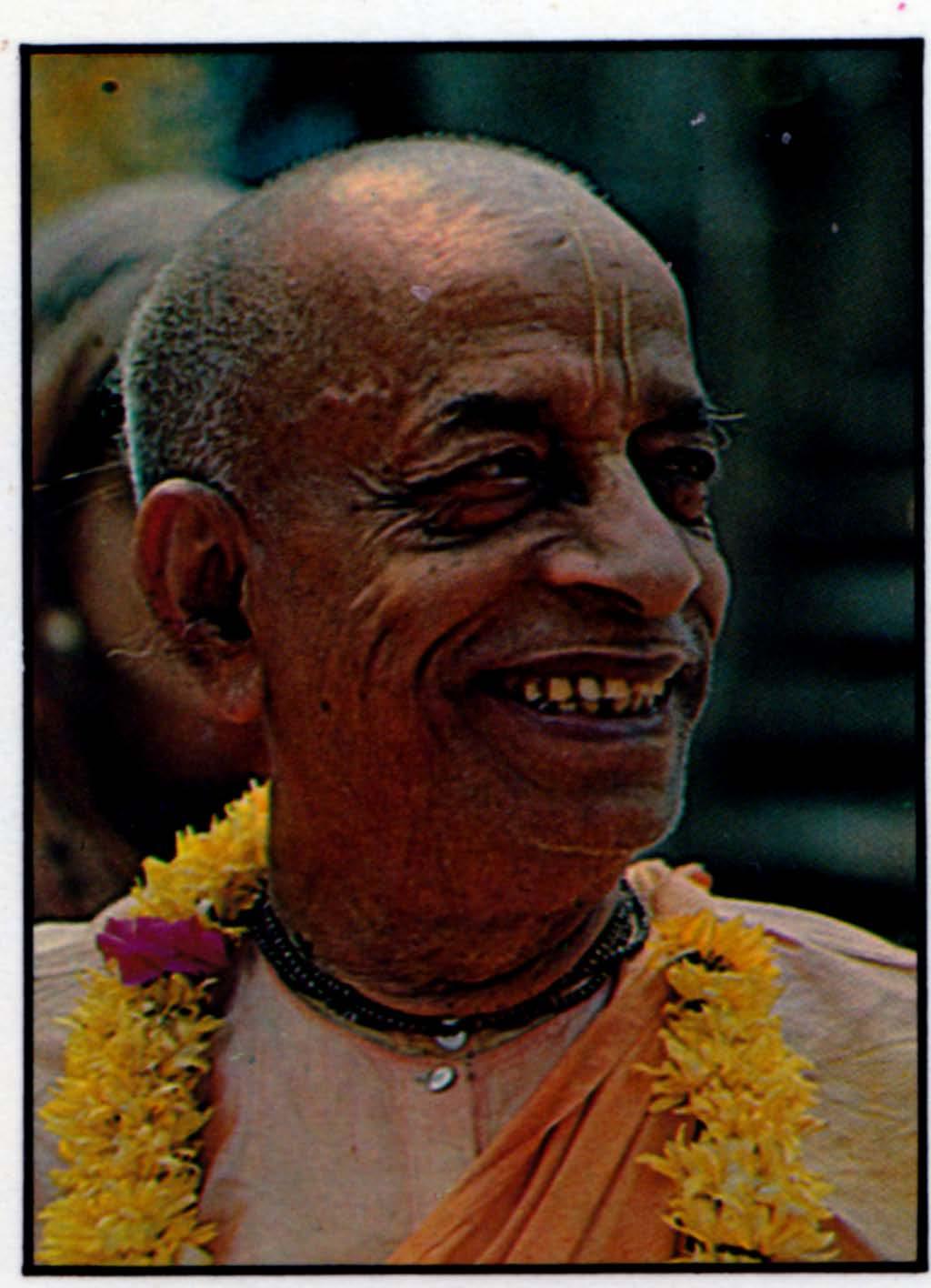
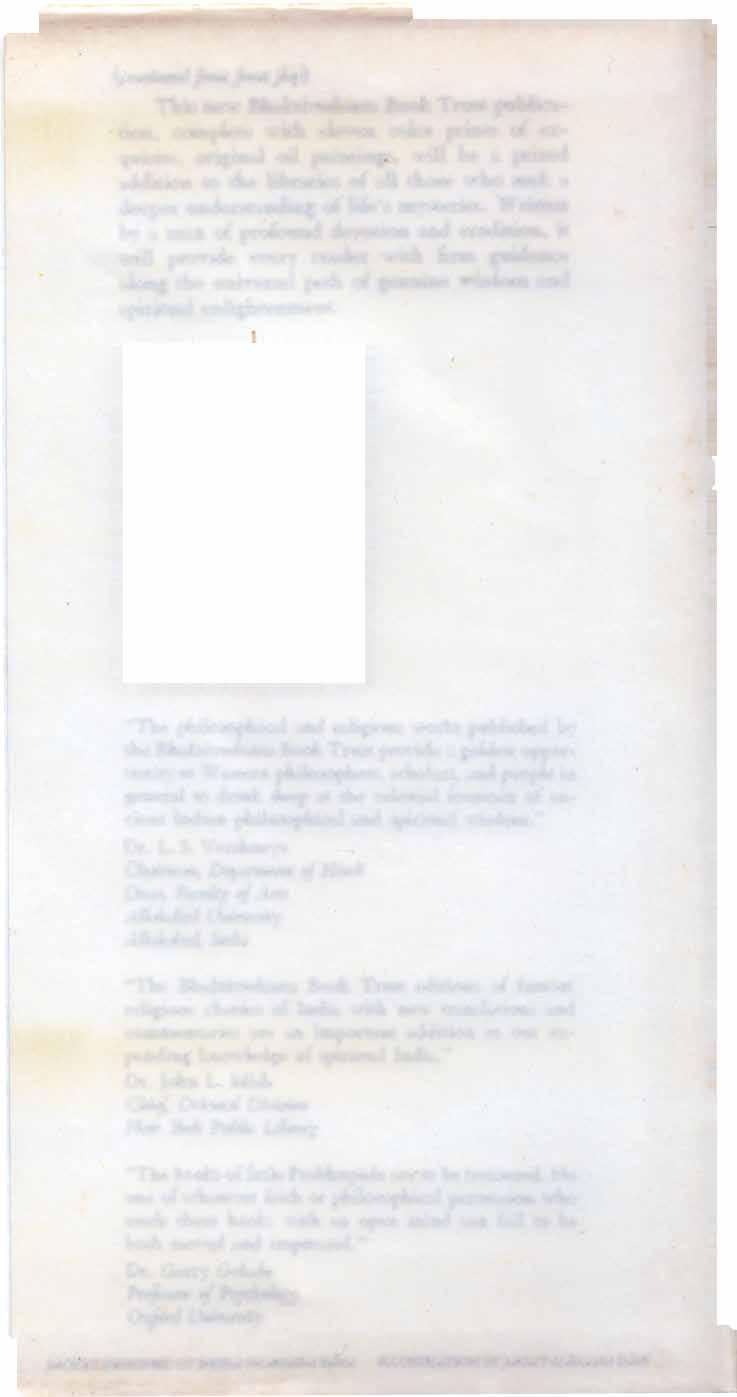
"The philosophical and religious works published by the Bhaktivedanta BookTrust provide agolden opportunityto Western philosophers, scholars, andpeople in general to drink deep at the celestial fountain of ancient Indian philosophical and spiritual wisdom."
Dr. L. S. Varshneya Chairman, Department of Hindi Dean, Faculty of
Arts

Allahabad University
Allahabad, India
"The Bhaktivedanta Book Trust editions of famous religious classics of India with new translations and . commentaries are an important addition to our expanding knowledge of spiritual India."
Dr. John L. Mish Chief, Oriental Division New York Public Library
"ThebooksofSrilaPrabhupadaareto
 Dr. Garry
Professor of Psychology Oxford University
Dr. Garry
Professor of Psychology Oxford University
�
..
betreasured.No one of whatever faith or philosophical persuasion who reads these books with an open mind can fail to be both moved and impressed."
JACKETDESIGNED BY INDIU PIUMADA DA.sA ILLUSTilATION BY]AGAT-KARili\IA DAs/
Gelade
UEEN KUNTl, a tragic and heroic figure, emerges from an explosive era in the history ofancient India. She was a centralfigure in a complex political drama that led to a bloodyfratricidal warfor the Indian throne. �t through all her sufferings shefound an inner wisdom and strength that carried her people through the time ofcrisis.
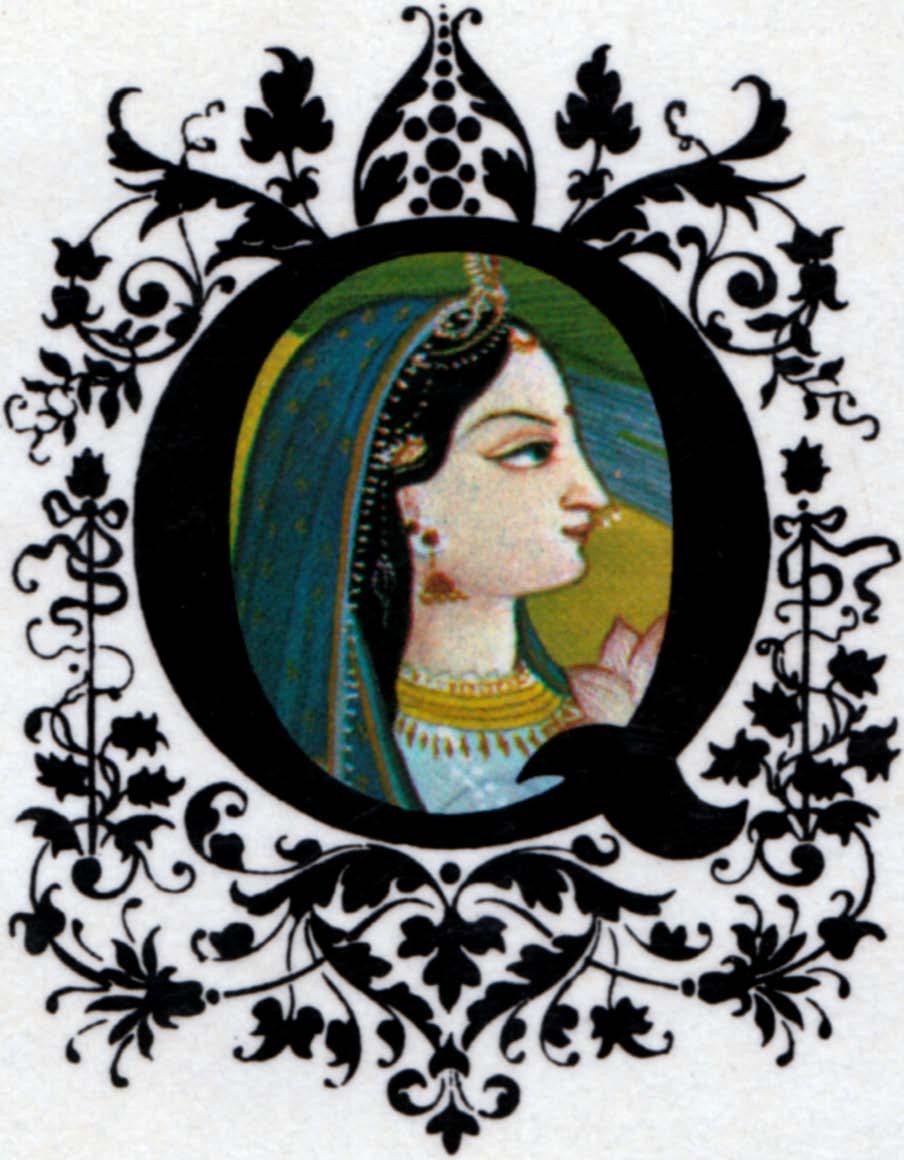
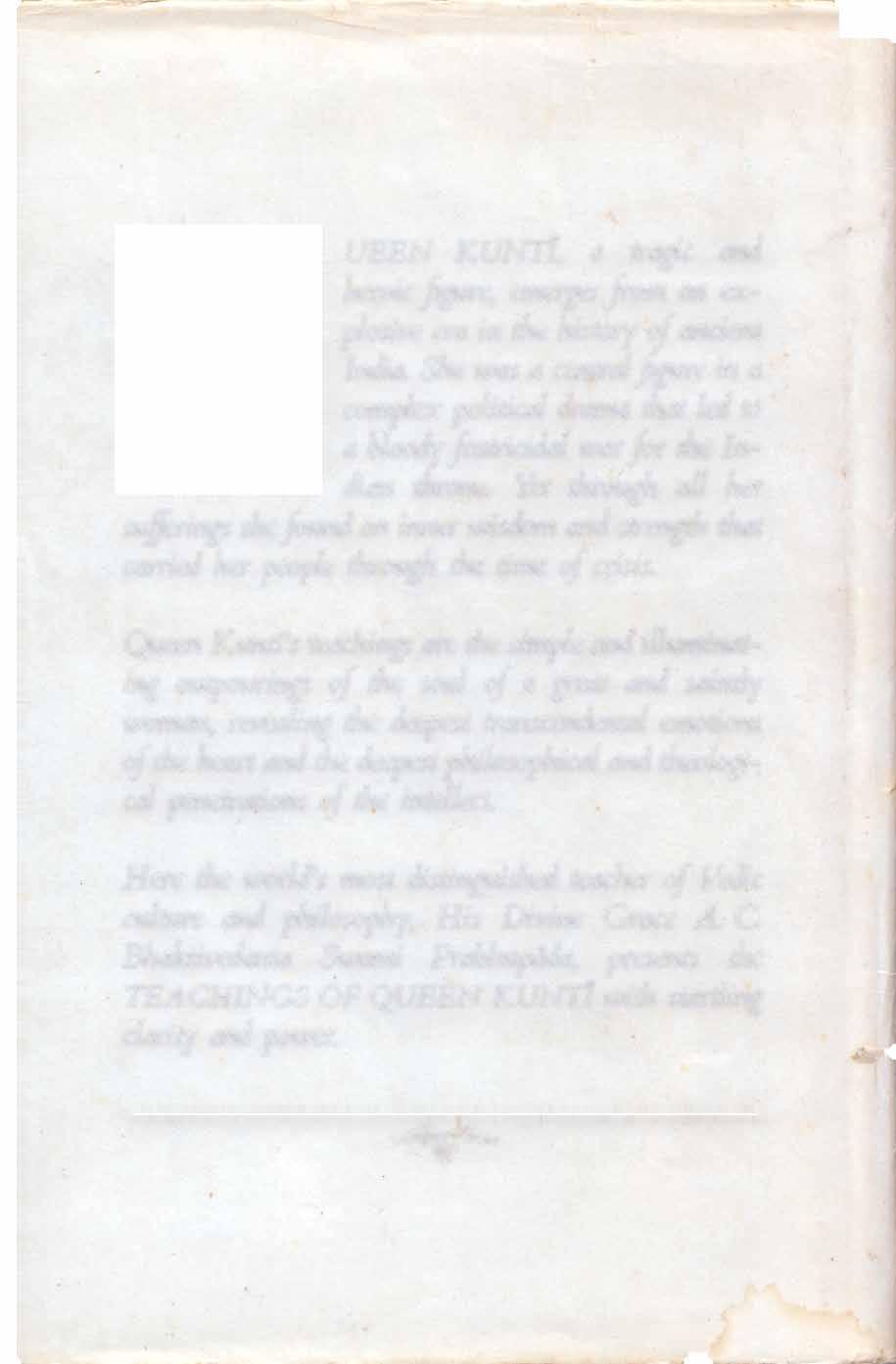
Queen Kunti's teachings are the simple and illuminating outpourings of the soul of a great and saintly woman, revealing the deepest transcendental emotions ofthe heart and the deepest philosophical and theological penetrations of the intellect




Here the world's most distinguished teacher of Vedic culture and philosophy, His Divine Grace A. C. Bhaktivedanta Swami Prabhupada, presents the TEACHINGS OF QUEEN KUNTi with startling clarity and power.

� A • ..


















 A. C. Bhaktivedanta Swami Prabhupada
A. C. Bhaktivedanta Swami Prabhupada







































































































































 Dr. Garry
Professor of Psychology Oxford University
Dr. Garry
Professor of Psychology Oxford University




